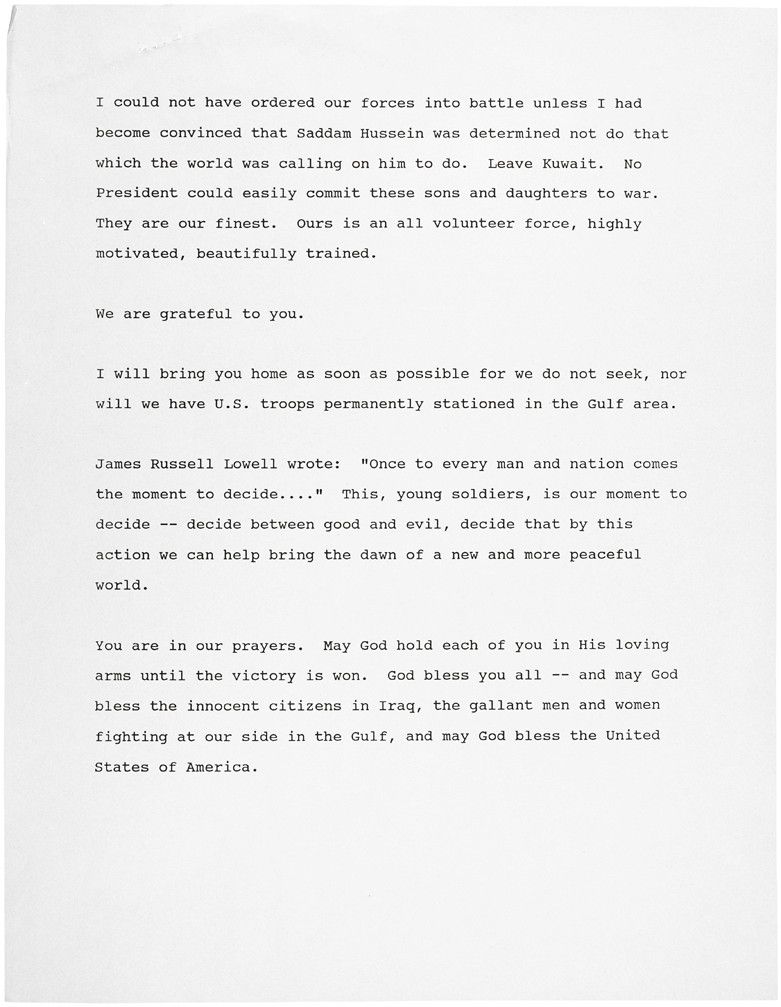Documenting Key Presidential Decisions
Mapping History
All documents and text associated with this activity are printed below, followed by a worksheet for student responses.Introduction
In this activity you will see documents related to key presidential decisions made by presidents while in office. Identify the president associated with each document. Then locate each President’s Library & Museum using the National Archives website. Place each document in the location of that President's Library.Name:
Class:
Class:
Worksheet
Documenting Key Presidential Decisions
Mapping History
Examine the documents and text included in this activity. Consider how each document or piece of text relates to the image shown below. Write the corresponding document or text number on the image where you think it belongs. (Some may be placed for you already.) Write your conclusion response in the space provided.
1
Activity Element
Herbert Hoover Analyzes Five Periods in the Development of the History of the Depression
Page 1
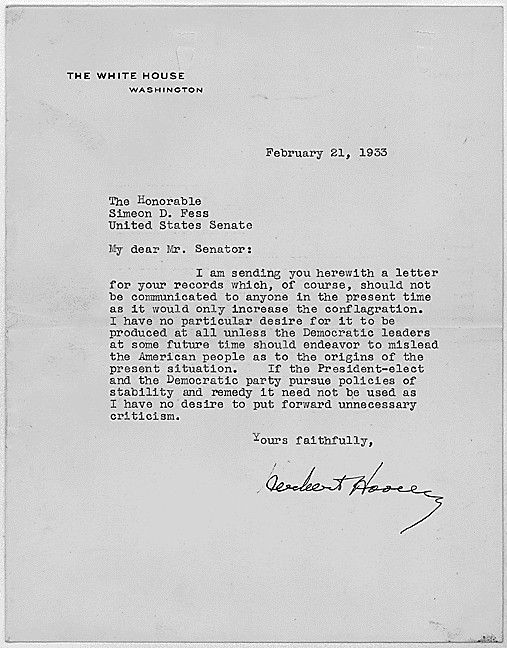
2
Activity Element
Annotated Draft of Proposed Message to Congress Requesting Declaration of War Against Japan
Page 1
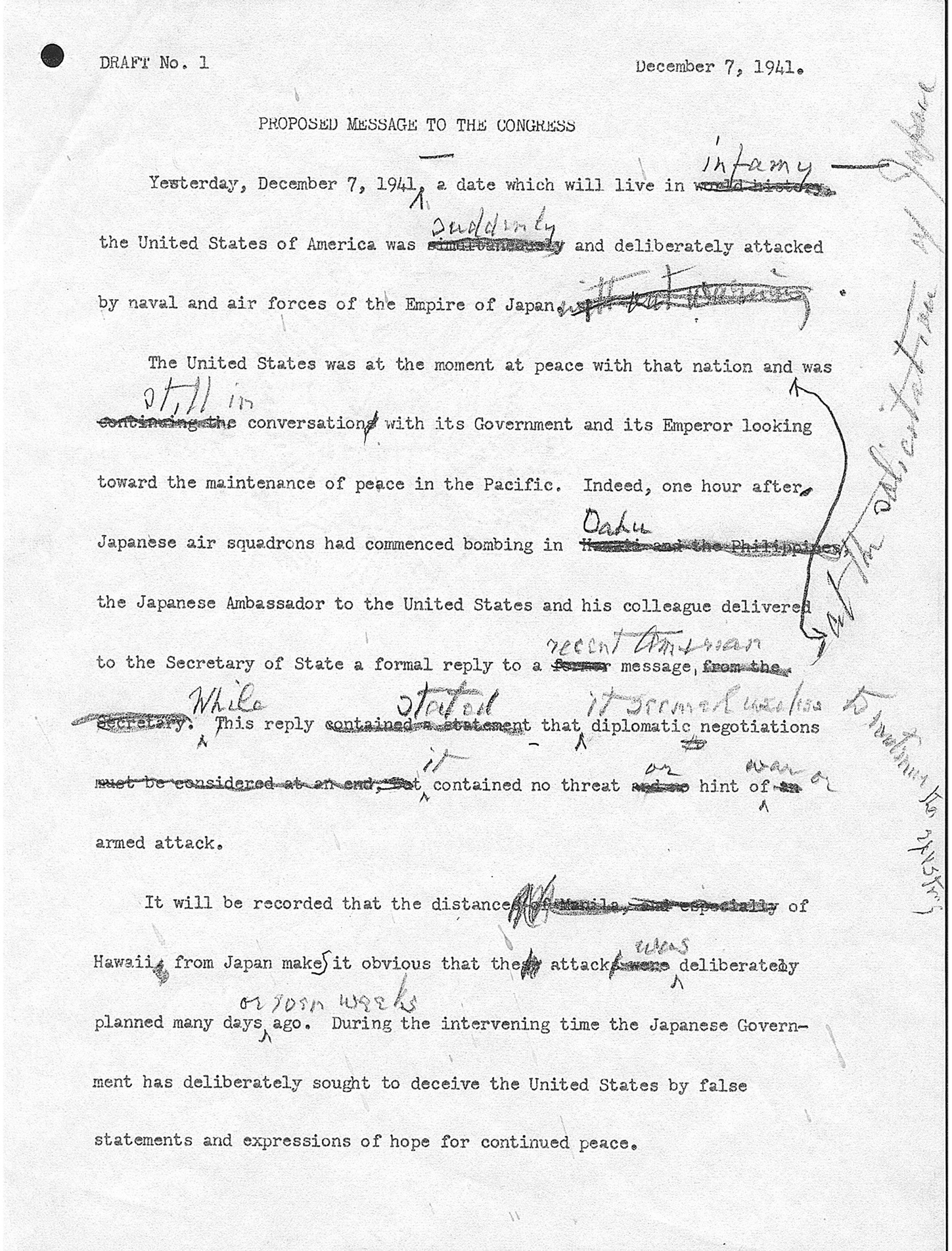
3
Activity Element
Letter from Secretary of War Henry Stimson to President Harry S. Truman
Page 2
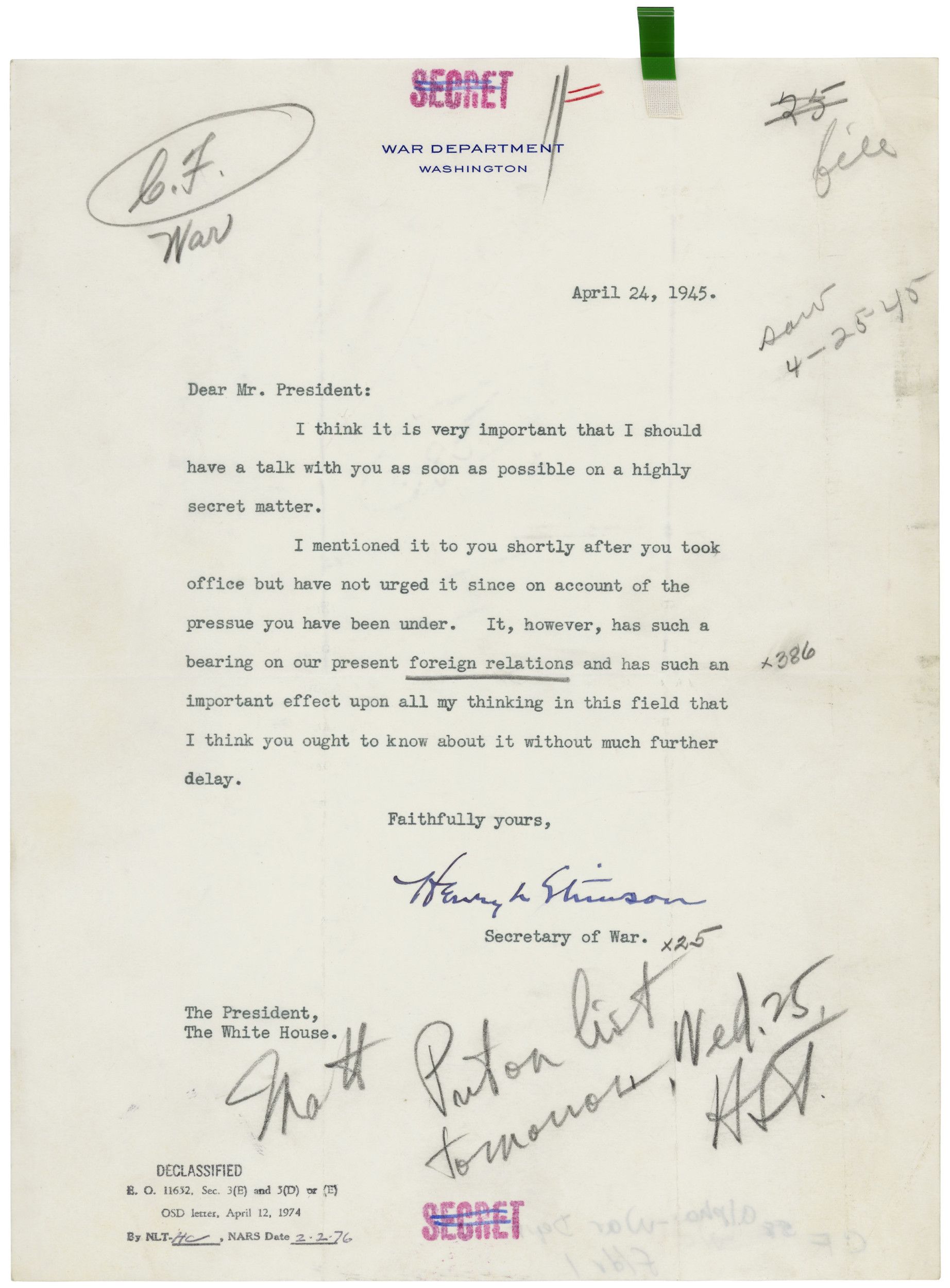
4
Activity Element
President Dwight D. Eisenhower's Farewell Address
Page 1
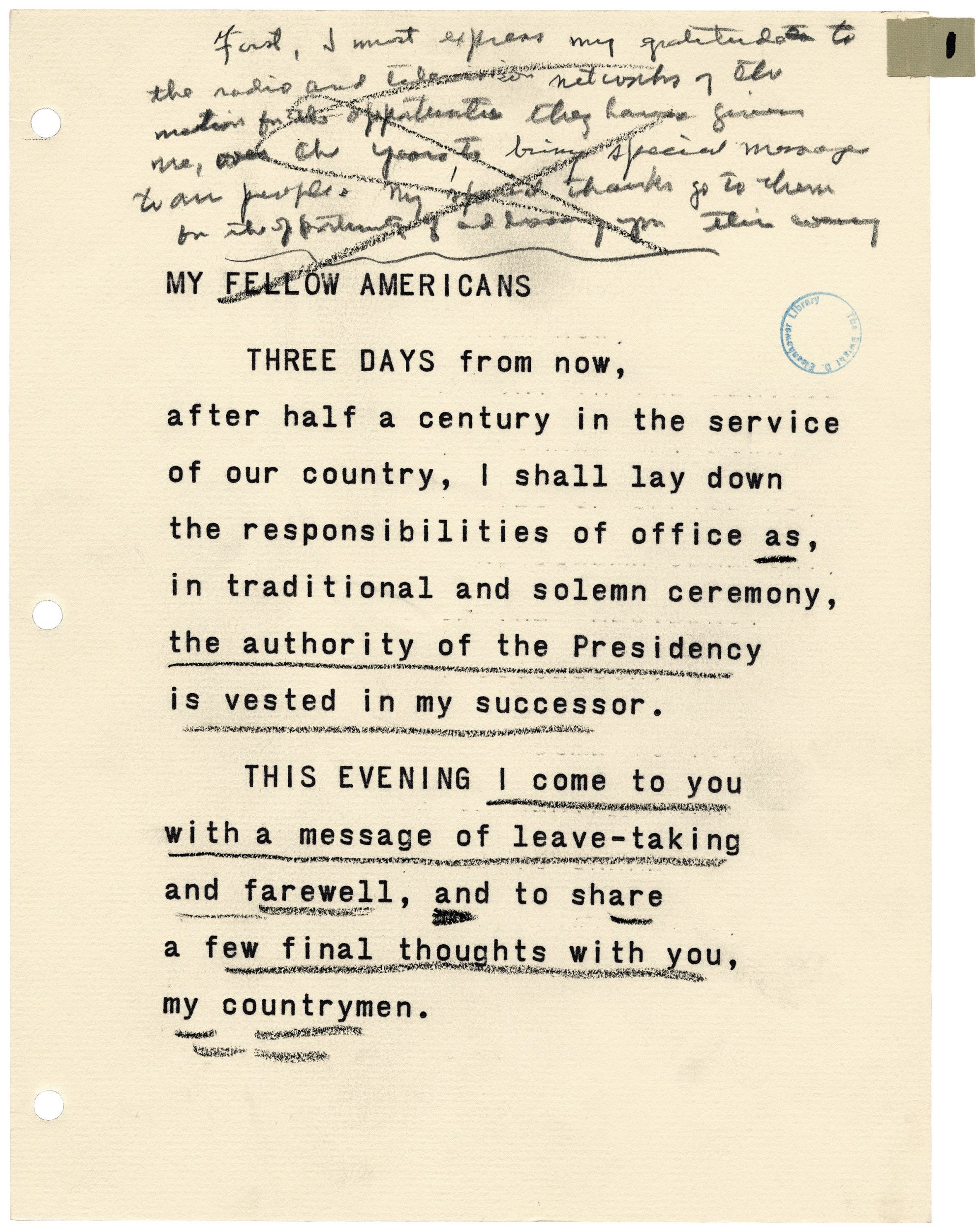
5
Activity Element
Executive Order 10924 dated March 1, 1961, in which President John F. Kennedy establishes the Peace Corps
Page 1
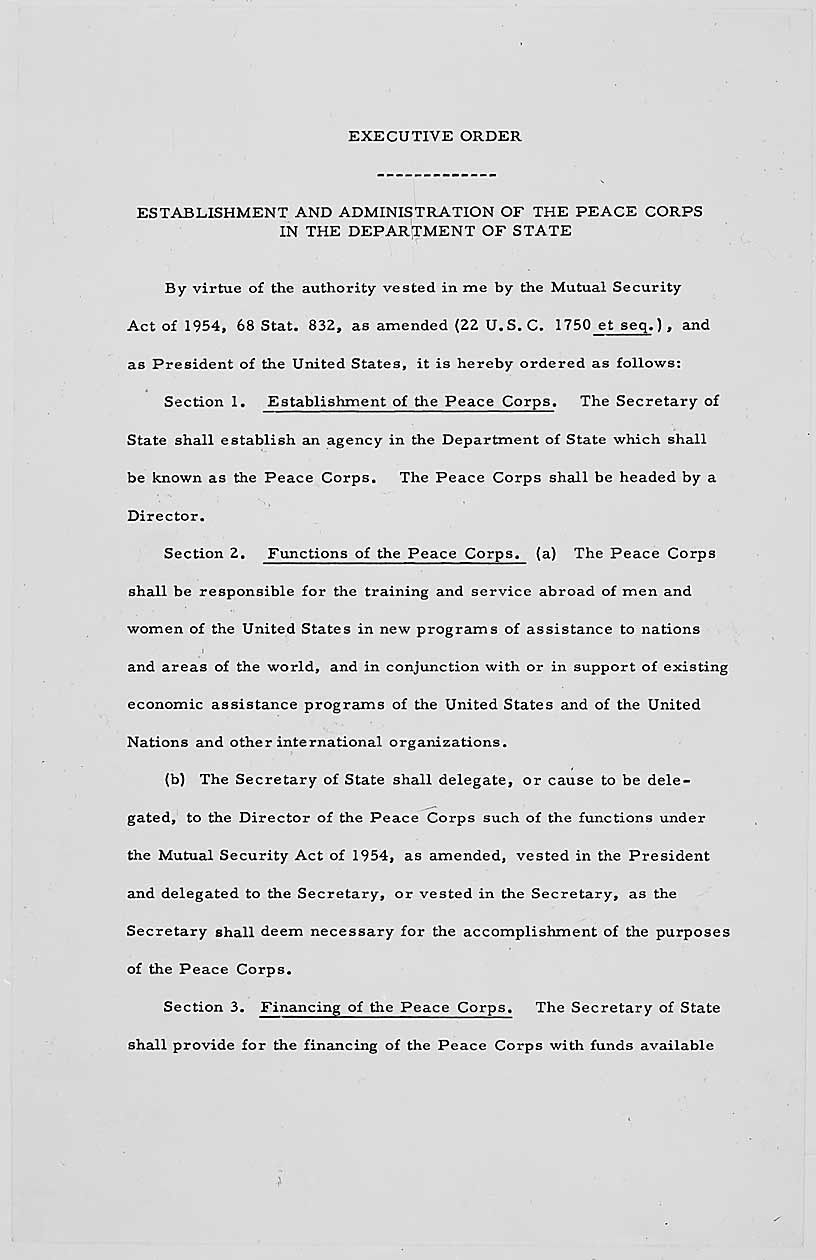
6
Activity Element
Civil Rights Act of 1964
Page 1
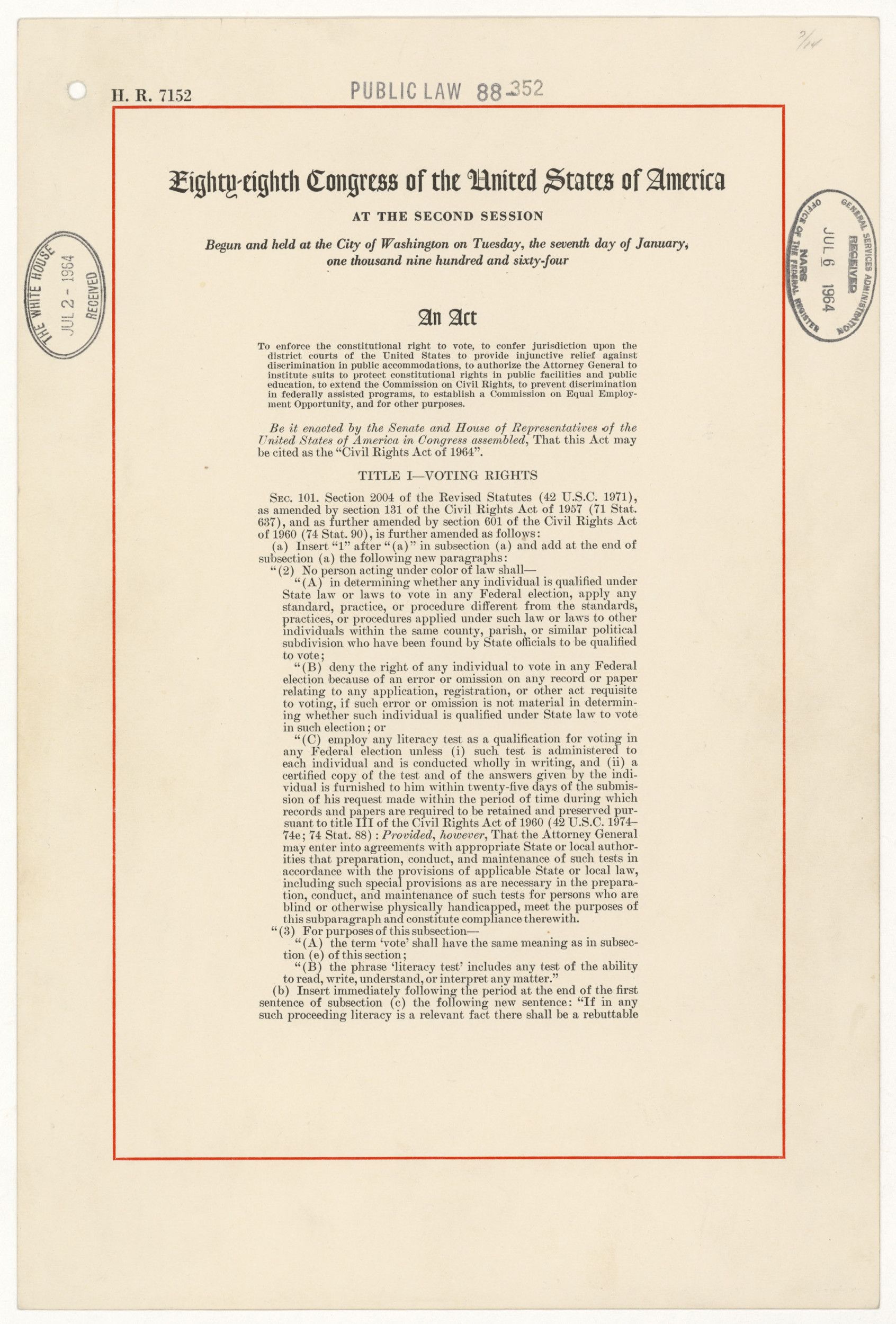
7
Activity Element
Menu from Dinner Given During President Nixon's Visit to Peking, China
Page 1

8
Activity Element
Presidential Proclamation 4311 of September 8, 1974, by President Gerald R. Ford granting a pardon to Richard M. Nixon.
Page 2
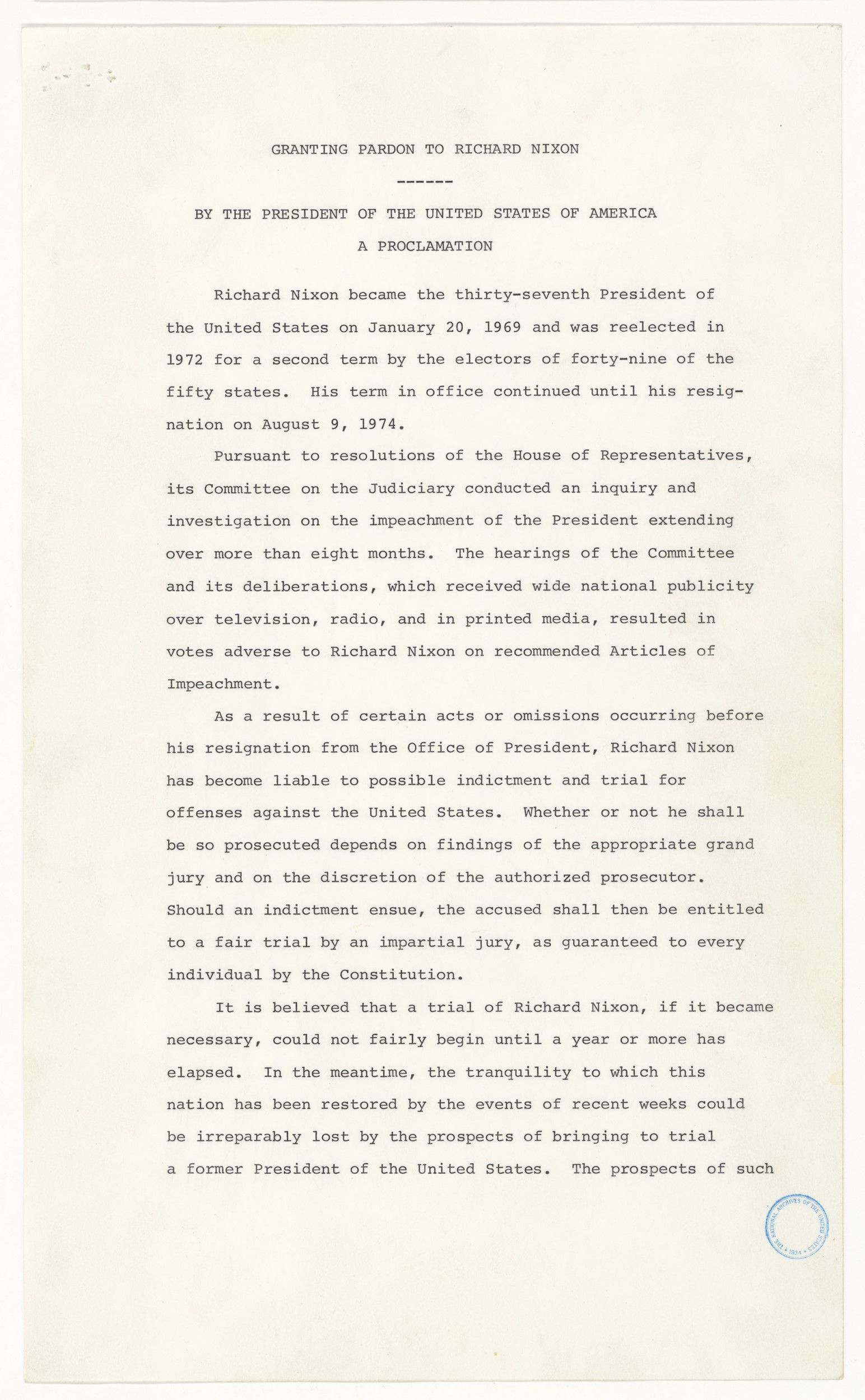
9
Activity Element
Anwar Sadat, Jimmy Carter and Menahem Begin at the Camp David Accords Signing Ceremony
Page 2
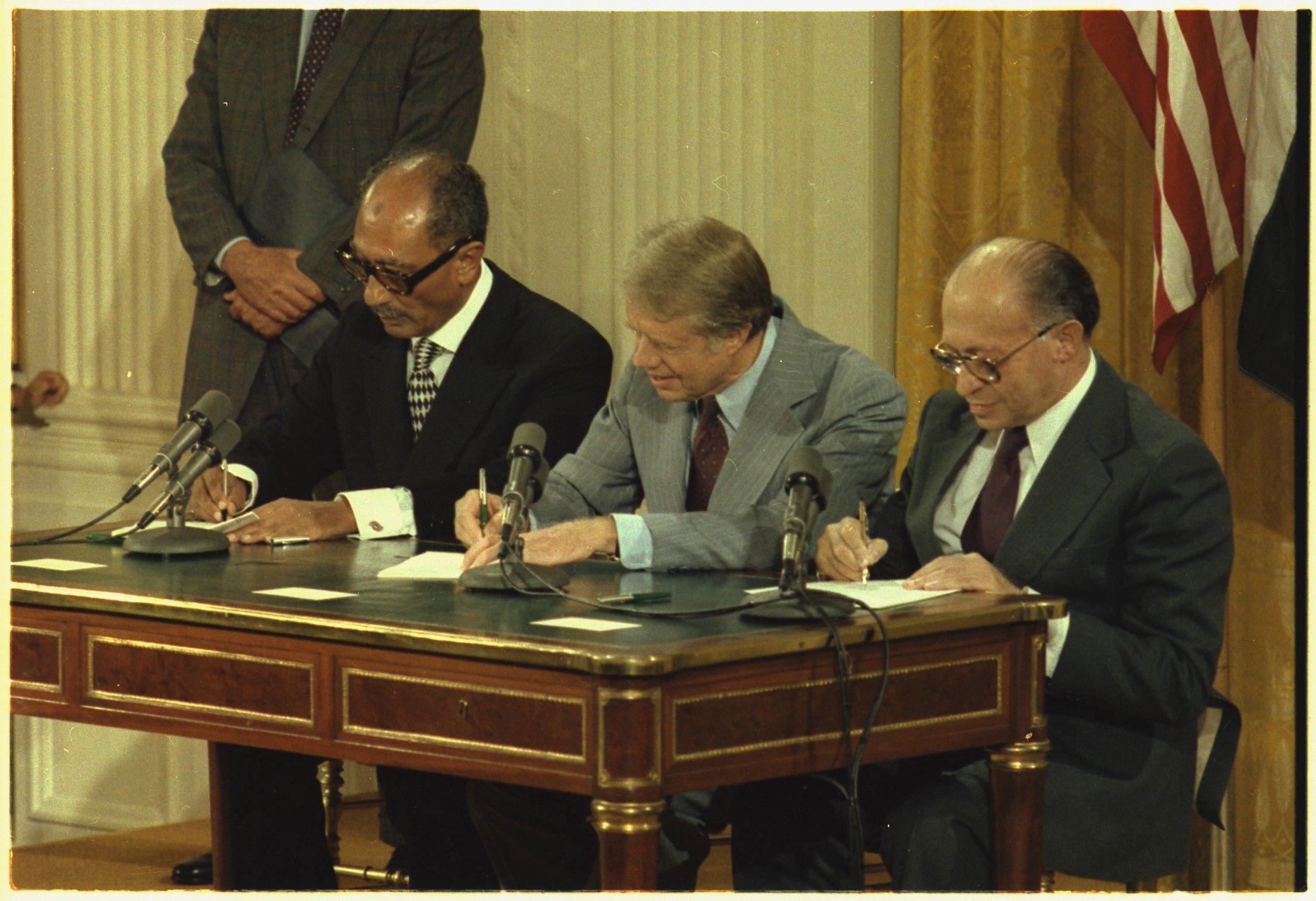
10
Activity Element
Remarks at Brandenberg Gate, Berlin, Germany [President's Speaking Copy]
Page 1
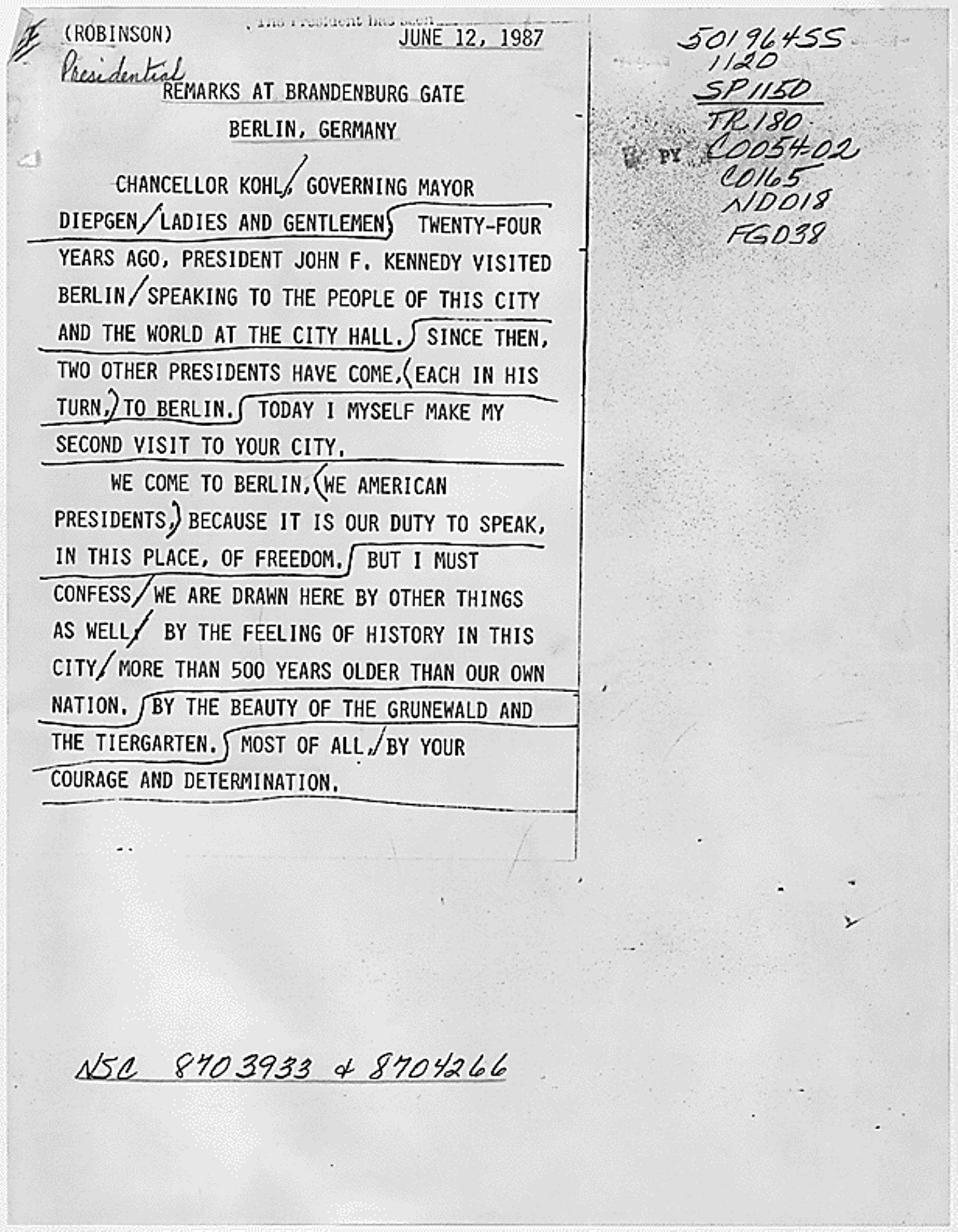
11
Activity Element
Second Draft of the Address to the Nation on the Gulf War
Page 1
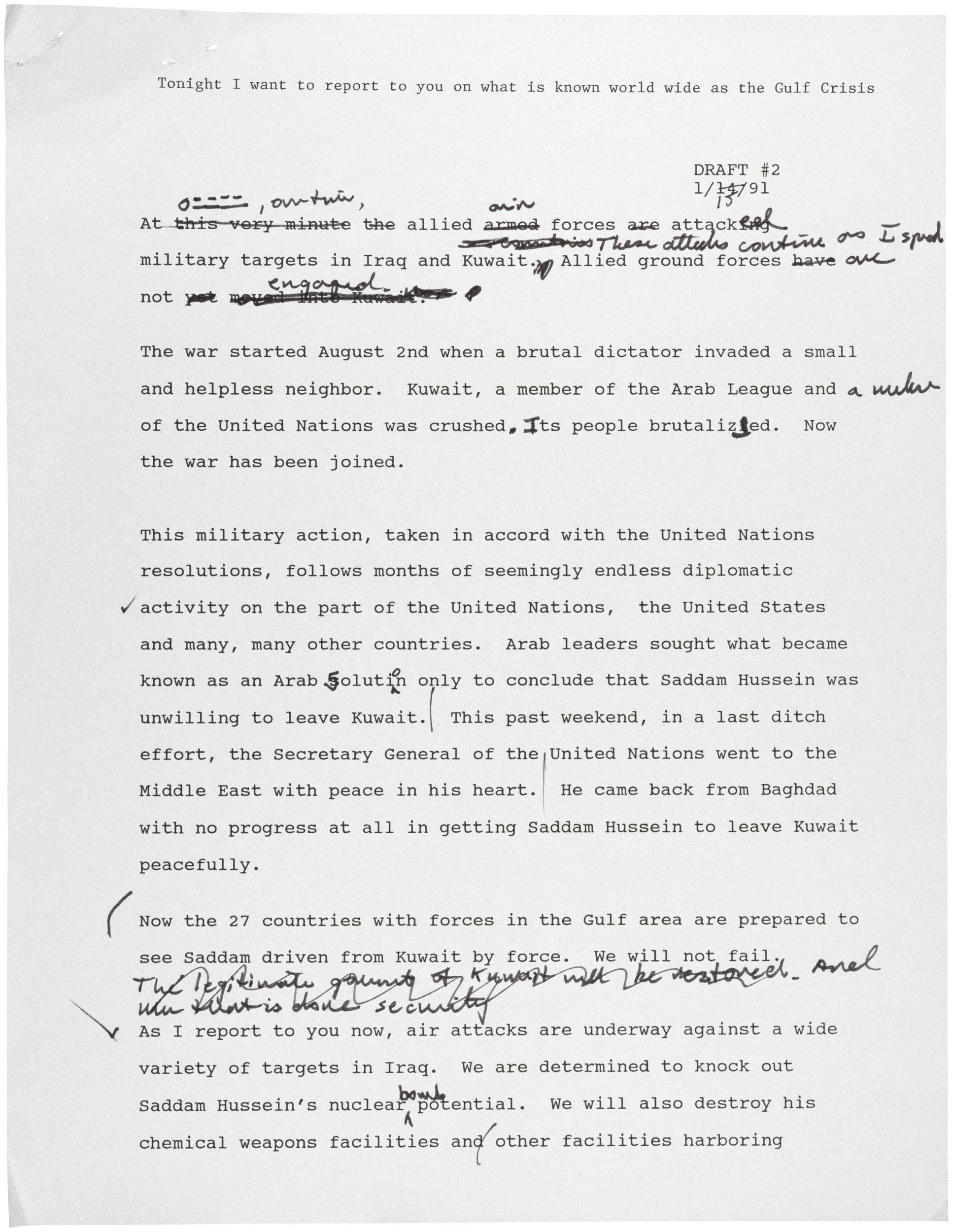
12
Activity Element
Message to President Bill Clinton from Senator John Glenn
Page 1
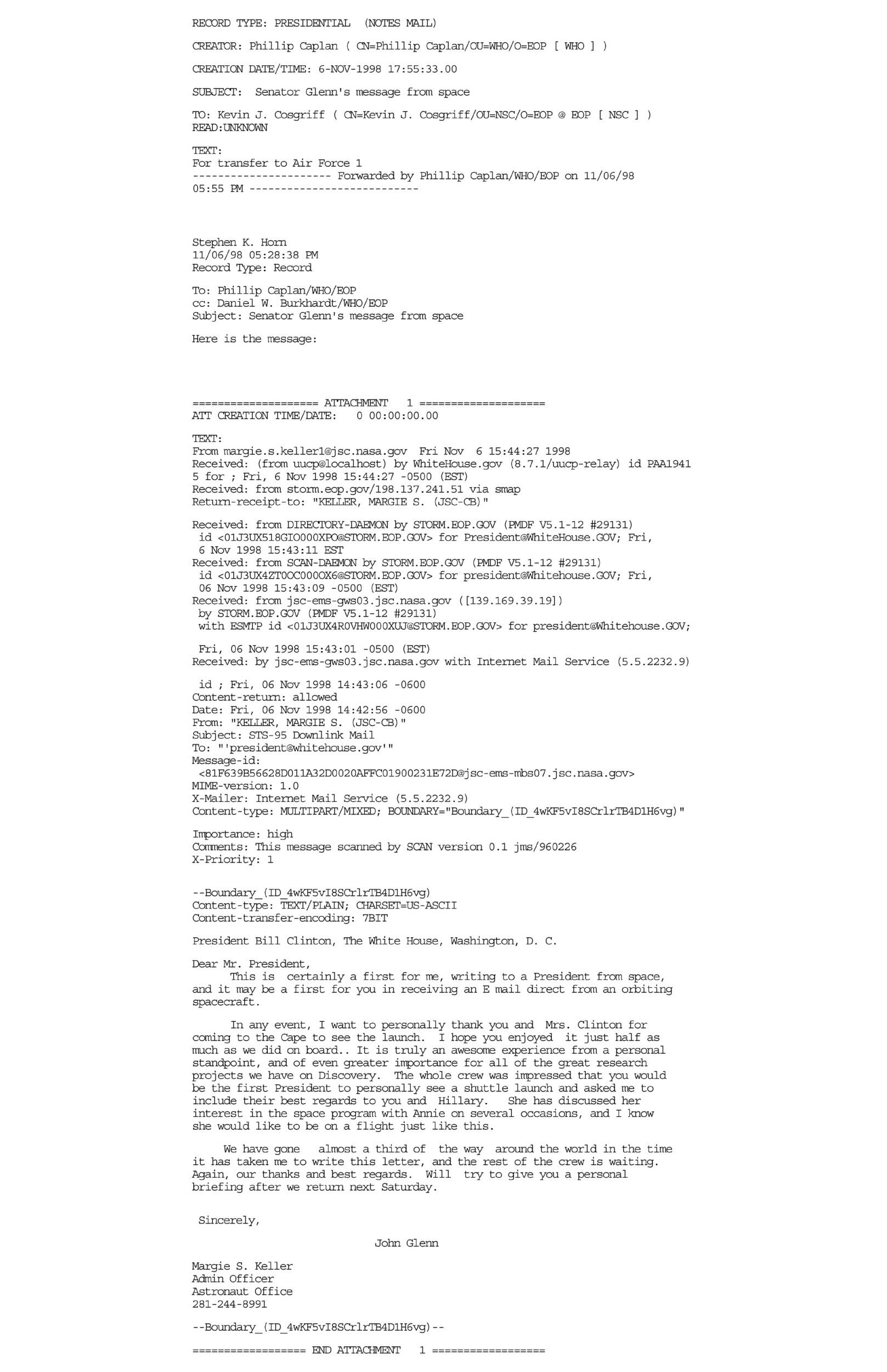
Conclusion
Documenting Key Presidential Decisions
Mapping History
You have found the locations of the Presidential Libraries and Museums across the United States and seen documents relating to each president.Now use the events described in these documents to make a list of key events from 1928 to the present. You will use your list to construct a timeline.
Your Response
Document
Annotated Draft of Proposed Message to Congress Requesting Declaration of War Against Japan
12/7/1941
After Pearl Harbor was bombed on December 7, 1941, President Franklin D. Roosevelt appeared before Congress and asked for a declaration of war against Japan. This is his annotated draft of the speech.
The speech was dictated by Roosevelt on December 7, 1941, in the hours following the Japanese attack on Pearl Harbor. The handwritten notations are Roosevelt's modifications and corrections to the typewritten first draft. The final version of the speech incorporating Roosevelt's annotations was delivered by the President to a Joint Session of Congress on December 8, 1941.
The speech was dictated by Roosevelt on December 7, 1941, in the hours following the Japanese attack on Pearl Harbor. The handwritten notations are Roosevelt's modifications and corrections to the typewritten first draft. The final version of the speech incorporating Roosevelt's annotations was delivered by the President to a Joint Session of Congress on December 8, 1941.
This primary source comes from the Collection FDR-FDRMSF: Franklin D. Roosevelt Master Speech Files.
National Archives Identifier: 593345
Full Citation: Annotated Draft of Proposed Message to Congress Requesting Declaration of War Against Japan; 12/7/1941; Franklin D. Roosevelt Master Speech Files, 1/19/1898 - 4/13/1945; Collection FDR-FDRMSF: Franklin D. Roosevelt Master Speech Files, ; Franklin D. Roosevelt Library, Hyde Park, NY. [Online Version, https://docsteach.org/documents/document/annotated-draft-requesting-war-against-japan, April 25, 2024]Annotated Draft of Proposed Message to Congress Requesting Declaration of War Against Japan
Page 1

Annotated Draft of Proposed Message to Congress Requesting Declaration of War Against Japan
Page 2
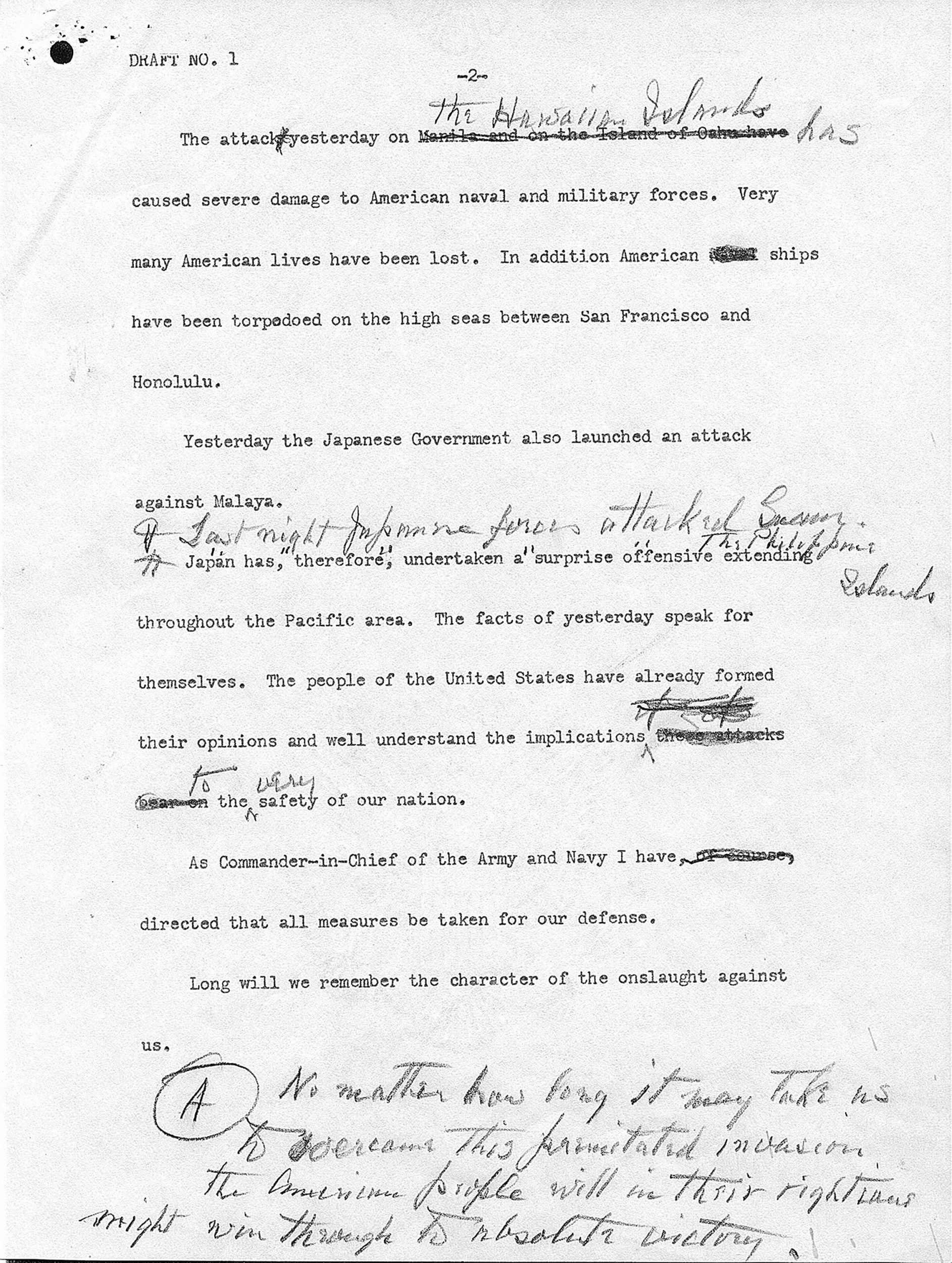
Annotated Draft of Proposed Message to Congress Requesting Declaration of War Against Japan
Page 3
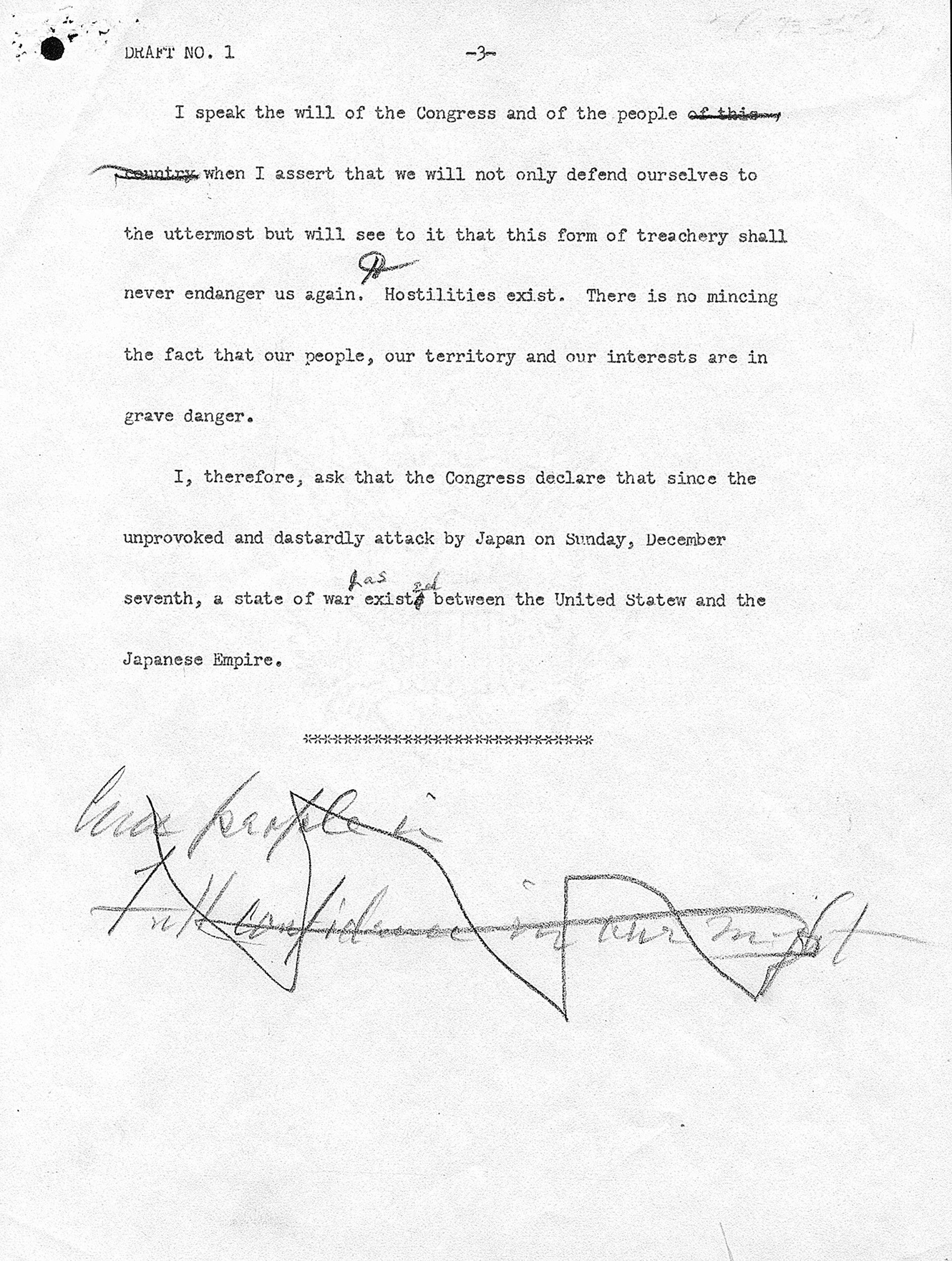
Document
Anwar Sadat, Jimmy Carter and Menahem Begin at the Camp David Accords Signing Ceremony
9/17/1978
This primary source comes from the Collection JC-WHSP: Carter White House Photographs Collection.
National Archives Identifier: 181392
Full Citation: Anwar Sadat, Jimmy Carter and Menahem Begin at the Camp David Accords Signing Ceremony; 9/17/1978; Collection JC-WHSP: Carter White House Photographs Collection, . [Online Version, https://docsteach.org/documents/document/anwar-sadat-jimmy-carter-and-menahem-begin-at-the-camp-david-accords-signing-ceremony, April 25, 2024]Anwar Sadat, Jimmy Carter and Menahem Begin at the Camp David Accords Signing Ceremony
Page 2
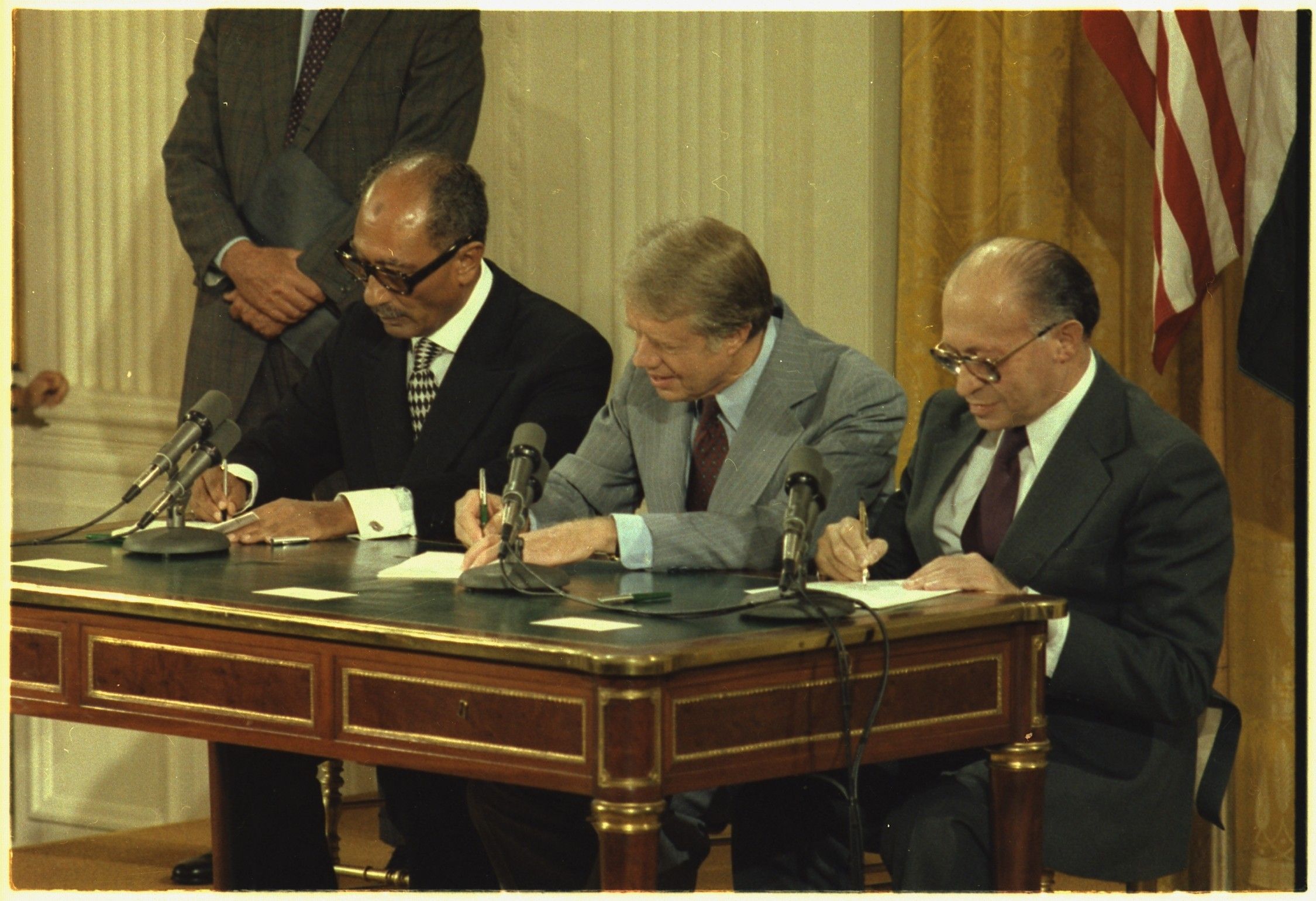
Document
Civil Rights Act of 1964
7/2/1964
This act, signed into law by President Lyndon Johnson on July 2, 1964, prohibited discrimination in public places, provided for the integration of schools and other public facilities, made employment discrimination illegal, and enforced the constitutional right to vote. It was the most sweeping civil rights legislation since Reconstruction.
In a nationally televised address on June 6, 1963, President John F. Kennedy had urged the nation to take action toward guaranteeing equal treatment of every American regardless of race. Soon after, Kennedy proposed that Congress consider civil rights legislation that would address voting rights, public accommodations, school desegregation, nondiscrimination in federally assisted programs, and more.
Despite Kennedy’s assassination in November of 1963, his proposal culminated in the Civil Rights Act of 1964, signed into law by President Johnson just a few hours after House approval. The act outlawed segregation in businesses such as theaters, restaurants, and hotels. It banned discriminatory practices in employment and ended segregation in public places such as swimming pools, libraries, and public schools. It also extended the Commission on Civil Rights, prevented discrimination in federally assisted programs, and established a Commission on Equal Employment Opportunity.
Passage of the act was not easy. House opposition bottled up the bill in the House Rules Committee. In the Senate, Southern Democratic opponents attempted to talk the bill to death in a filibuster. In early 1964, House supporters overcame the Rules Committee obstacle by threatening to send the bill to the floor without committee approval. The Senate filibuster was overcome through the floor leadership of Senator Hubert Humphrey of Minnesota, the considerable support of President Lyndon Johnson, and the efforts of Senate Minority Leader Everett Dirksen of Illinois, who convinced enough Republicans to support the bill over Democratic opposition.
In a nationally televised address on June 6, 1963, President John F. Kennedy had urged the nation to take action toward guaranteeing equal treatment of every American regardless of race. Soon after, Kennedy proposed that Congress consider civil rights legislation that would address voting rights, public accommodations, school desegregation, nondiscrimination in federally assisted programs, and more.
Despite Kennedy’s assassination in November of 1963, his proposal culminated in the Civil Rights Act of 1964, signed into law by President Johnson just a few hours after House approval. The act outlawed segregation in businesses such as theaters, restaurants, and hotels. It banned discriminatory practices in employment and ended segregation in public places such as swimming pools, libraries, and public schools. It also extended the Commission on Civil Rights, prevented discrimination in federally assisted programs, and established a Commission on Equal Employment Opportunity.
Passage of the act was not easy. House opposition bottled up the bill in the House Rules Committee. In the Senate, Southern Democratic opponents attempted to talk the bill to death in a filibuster. In early 1964, House supporters overcame the Rules Committee obstacle by threatening to send the bill to the floor without committee approval. The Senate filibuster was overcome through the floor leadership of Senator Hubert Humphrey of Minnesota, the considerable support of President Lyndon Johnson, and the efforts of Senate Minority Leader Everett Dirksen of Illinois, who convinced enough Republicans to support the bill over Democratic opposition.
Transcript
An ActTo enforce the constitutional right to vote, to confer jurisdiction upon the district courts of the United States to provide injunctive relief against discrimination in public accommodations, to authorize the Attorney General to institute suits to protect constitutional rights in public facilities and public education, to extend the Commission on Civil Rights, to prevent discrimination in federally assisted programs, to establish a Commission on Equal Employment Opportunity, and for other purposes.
Be it enacted by the Senate and House of Representatives of the United States of America in Congress assembled, That this Act may be cited as the "Civil Rights Act of 1964".
TITLE I--VOTING RIGHTS
SEC. 101. Section 2004 of the Revised Statutes (42 U.S.C. 1971), as amended by section 131 of the Civil Rights Act of 1957 (71 Stat. 637), and as further amended by section 601 of the Civil Rights Act of 1960 (74 Stat. 90), is further amended as follows:
(a) Insert "1" after "(a)" in subsection (a) and add at the end of subsection (a) the following new paragraphs:
"(2) No person acting under color of law shall--
"(A) in determining whether any individual is qualified under State law or laws to vote in any Federal election, apply any standard, practice, or procedure different from the standards, practices, or procedures applied under such law or laws to other individuals within the same county, parish, or similar political subdivision who have been found by State officials to be qualified to vote;
"(B) deny the right of any individual to vote in any Federal election because of an error or omission on any record or paper relating to any application, registration, or other act requisite to voting, if such error or omission is not material in determining whether such individual is qualified under State law to vote in such election; or
"(C) employ any literacy test as a qualification for voting in any Federal election unless (i) such test is administered to each individual and is conducted wholly in writing, and (ii) a certified copy of the test and of the answers given by the individual is furnished to him within twenty-five days of the submission of his request made within the period of time during which records and papers are required to be retained and preserved pursuant to title III of the Civil Rights Act of 1960 (42 U.S.C. 1974--74e; 74 Stat. 88): Provided, however, That the Attorney General may enter into agreements with appropriate State or local authorities that preparation, conduct, and maintenance of such tests in accordance with the provisions of applicable State or local law, including such special provisions as are necessary in the preparation, conduct, and maintenance of such tests for persons who are blind or otherwise physically handicapped, meet the purposes of this subparagraph and constitute compliance therewith.
"(3) For purposes of this subsection--
"(A) the term 'vote' shall have the same meaning as in subsection (e) of this section;
"(B) the phrase 'literacy test' includes any test of the ability to read, write, understand, or interpret any matter."
(b) Insert immediately following the period at the end of the first sentence of subsection (c) the following new sentence: "If in any such proceeding literacy is a relevant fact there shall be a rebuttable
presumption that any person who has not been adjudged an incompetent and who has completed the sixth grade in a public school in, or a private school accredited by, any State or territory, the District of Columbia, or the Commonwealth of Puerto Rico where instruction is carried on predominantly in the English language, possesses sufficient literacy, comprehension, and intelligence to vote in any Federal election."
(c) Add the following subsection "(f)" and designate the present subsection "(f)" as subsection "(g)": "(f) When used in subsection (a) or (c) of this section, the words 'Federal election' shall mean any general, special, or primary election held solely or in part for the purpose of electing or selecting any candidate for the office of President, Vice President, presidential elector, Member of the Senate, or Member of the House of Representatives."
(d) Add the following subsection "(h)":
"(h) In any proceeding instituted by the United States in any district court of the United States under this section in which the Attorney General requests a finding of a pattern or practice of discrimination pursuant to subsection (e) of this section the Attorney General, at the time he files the complaint, or any defendant in the proceeding, within twenty days after service upon him of the complaint, may file with the clerk of such court a request that a court of three judges be convened to hear and determine the entire case. A copy of the request for a three-judge court shall be immediately furnished by such clerk to the chief judge of the circuit (or in his absence, the presiding circuit judge of the circuit) in which the case is pending. Upon receipt of the copy of such request it shall be the duty of the chief justice of the circuit or the presiding circuit judge, as the case may be, to designate immediately three judges in such circuit, of whom at least one shall be a circuit judge and another of whom shall be a district judge of the court in which the proceeding was instituted, to hear and determine such case, and it shall be the duty of the judges so designated to assign the case for hearing at the earliest practicable date, to participate in the hearing and determination thereof, and to cause the case to be in every way expedited.
An appeal from the final judgment of such court will lie to the Supreme Court.
"In any proceeding brought under subsection (c) of this section to enforce subsection (b) of this section, or in the event neither the Attorney General nor any defendant files a request for a three-judge court in any proceeding authorized by this subsection, it shall be the duty of the chief judge of the district (or in his absence, the acting chief judge) in which the case is pending immediately to designate a judge in such district to hear and determine the case. In the event that no judge in the district is available to hear and determine the case, the chief judge of the district, or the acting chief judge, as the case may be, shall certify this fact to the chief judge of the circuit (or, in his absence, the acting chief judge) who shall then designate a district or circuit judge of the circuit to hear and determine the case.
"It shall be the duty of the judge designated pursuant to this section to assign the case for hearing at the earliest practicable date and to cause the case to be in every way expedited."
TITLE II--INJUNCTIVE RELIEF AGAINST DISCRIMINATION IN PLACES OF PUBLIC ACCOMMODATION
SEC. 201. (a) All persons shall be entitled to the full and equal enjoyment of the goods, services, facilities, and privileges, advantages, and accommodations of any place of public accommodation, as defined in this section, without discrimination or segregation on the ground of race, color, religion, or national origin.
(b) Each of the following establishments which serves the public is a place of public accommodation within the meaning of this title if its operations affect commerce, or if discrimination or segregation by it is supported by State action:
(1) any inn, hotel, motel, or other establishment which provides lodging to transient guests, other than an establishment located within a building which contains not more than five rooms for rent or hire and which is actually occupied by the proprietor of such establishment as his residence;
(2) any restaurant, cafeteria, lunchroom, lunch counter, soda fountain, or other facility principally engaged in selling food for consumption on the premises, including, but not limited to, any such facility located on the
premises of any retail establishment; or any gasoline station;
(3) any motion picture house, theater, concert hall, sports arena, stadium or other place of exhibition or entertainment; and
(4) any establishment (A)(i) which is physically located within the premises of any establishment otherwise covered by this subsection, or (ii) within the premises of which is physically located any such covered establishment, and (B) which holds itself out as serving patrons of such covered establishment.
(c) The operations of an establishment affect commerce within the meaning of this title if (1) it is one of the establishments described in paragraph (1) of subsection (b); (2) in the case of an establishment described in paragraph (2) of subsection (b), it serves or offers to serve interstate travelers or a substantial portion of the food which it serves, or gasoline or other products which it sells, has moved in commerce; (3) in the case of an establishment described in paragraph (3) of subsection (b), it customarily presents films, performances, athletic teams, exhibitions, or other sources of entertainment which move in commerce; and (4) in the case of an establishment described in paragraph (4) of subsection (b), it is physically located within the premises of, or there is physically located within its premises, an establishment the operations of which affect commerce within the meaning of this subsection. For purposes of this section, "commerce" means travel, trade, traffic, commerce, transportation, or communication among the several States, or between the District of Columbia and any State, or between any foreign country or any territory or possession and any State or the District of Columbia, or between points in the same State but through any other State or the District of Columbia or a foreign country.
(d) Discrimination or segregation by an establishment is supported by State action within the meaning of this title if such discrimination or segregation (1) is carried on under color of any law, statute, ordinance, or regulation; or (2) is carried on under color of any custom or usage required or enforced by officials of the State or political subdivision thereof; or (3) is required by action of the State or political subdivision thereof.
(e) The provisions of this title shall not apply to a private club or other establishment not in fact open to the public, except to the extent that the facilities of such establishment are made available
to the customers or patrons of an establishment within the scope of subsection (b).
SEC. 202. All persons shall be entitled to be free, at any establishment or place, from discrimination or segregation of any kind on the ground of race, color, religion, or national origin, if such discrimination or segregation is or purports to be required by any law, statute, ordinance, regulation, rule, or order of a State or any agency or political subdivision thereof.
SEC. 203. No person shall (a) withhold, deny, or attempt to withhold or deny, or deprive or attempt to deprive, any person of any right or privilege secured by section 201 or 202, or (b) intimidate, threaten, or coerce, or attempt to intimidate, threaten, or coerce any person with the purpose of interfering with any right or privilege secured by section 201 or 202, or (c) punish or attempt to punish any person for exercising or attempting to exercise any right or privilege secured by section 201 or 202.
SEC. 204. (a) Whenever any person has engaged or there are reasonable grounds to believe that any person is about to engage in any act or practice prohibited by section 203, a civil action for preventive relief, including an application for a permanent or temporary injunction, restraining order, or other order, may be instituted by the person aggrieved and, upon timely application, the court may, in its discretion, permit the Attorney General to intervene in such civil action if he certifies that the case is of general public importance. Upon application by the complainant and in such circumstances as the court may deem just, the court may appoint an attorney for such complainant and may authorize the commencement of the civil action without the payment of fees, costs, or security.
(b) In any action commenced pursuant to this title, the court, in its discretion, may allow the prevailing party, other than the United States, a reasonable attorney's fee as part of the costs, and the United States shall be liable for costs the same as a private person.
(c) In the case of an alleged act or practice prohibited by this title which occurs in a State, or political subdivision of a State, which has a State or local law prohibiting such act or practice and establishing or authorizing a State or local authority to grant or seek relief from such practice or to institute criminal proceedings with respect thereto upon receiving notice thereof, no civil action may be brought under subsection (a) before the expiration of thirty days after written notice of such alleged act or practice has been given to the appropriate State or local authority by registered mail or in person, provided that the court may stay proceedings in such civil action pending the termination of State or local enforcement proceedings.
(d) In the case of an alleged act or practice prohibited by this title which occurs in a State, or political subdivision of a State, which has no State or local law prohibiting such act or practice, a civil action may be brought under subsection (a): Provided, That the court may refer the matter to the Community Relations Service established by title X of this Act for as long as the court believes there is a reasonable possibility of obtaining voluntary compliance, but for not more than sixty days: Provided further, That upon expiration of such sixty-day period, the court may extend such period for an additional period, not to exceed a cumulative total of one hundred and twenty days, if it believes there then exists a reasonable possibility of securing voluntary compliance.
SEC. 205. The Service is authorized to make a full investigation of any complaint referred to it by the court under section 204(d) and may hold such hearings with respect thereto as may be necessary.
The Service shall conduct any hearings with respect to any such complaint in executive session, and shall not release any testimony given therein except by agreement of all parties involved in the complaint with the permission of the court, and the Service shall endeavor to bring about a voluntary settlement between the parties.
SEC. 206. (a) Whenever the Attorney General has reasonable cause to believe that any person or group of persons is engaged in a pattern or practice of resistance to the full enjoyment of any of the rights secured by this title, and that the pattern or practice is of such a nature and is intended to deny the full exercise of the rights herein described, the Attorney General may bring a civil action in the appropriate district court of the United States by filing with it a complaint (1) signed by him (or in his absence the Acting Attorney General), (2) setting forth facts pertaining to such pattern or practice, and (3) requesting such preventive relief, including an application for a permanent or temporary injunction, restraining order or other order against the
person or persons responsible for such pattern or practice, as he deems necessary to insure the full enjoyment of the rights herein described.
(b) In any such proceeding the Attorney General may file with the clerk of such court a request that a court of three judges be convened to hear and determine the case. Such request by the Attorney General shall be accompanied by a certificate that, in his opinion, the case is of general public importance. A copy of the certificate and request for a three-judge court shall be immediately furnished by such clerk to the chief judge of the circuit (or in his absence, the presiding circuit judge of the circuit) in which the case is pending. Upon receipt of the copy of such request it shall be the duty of the chief judge of the circuit or the presiding circuit judge, as the case may be, to designate immediately three judges in such circuit, of whom at least one shall be a circuit judge and another of whom shall be a district judge of the court in which the proceeding was instituted, to hear and determine such case, and it shall be the duty of the judges so designated to assign the case for hearing at the earliest practicable date, to participate in the hearing and determination thereof, and to cause the case to be in every way expedited. An appeal from the final judgment of such court will lie to the Supreme Court.
In the event the Attorney General fails to file such a request in any such proceeding, it shall be the duty of the chief judge of the district (or in his absence, the acting chief judge) in which the case is pending immediately to designate a judge in such district to hear and determine the case. In the event that no judge in the district is available to hear and determine the case, the chief judge of the district, or the acting chief judge, as the case may be, shall certify this fact to the chief judge of the circuit (or in his absence, the acting chief judge) who shall then designate a district or circuit judge of the circuit to hear and determine the case.
It shall be the duty of the judge designated pursuant to this section to assign the case for hearing at the earliest practicable date and to cause the case to be in every way expedited.
SEC. 207. (a) The district courts of the United States shall have jurisdiction of proceedings instituted pursuant to this title and shall exercise the same without regard to whether the aggrieved party shall have exhausted any administrative or other remedies that may be provided by law.
(b) The remedies provided in this title shall be the exclusive means of enforcing the rights based on this title, but nothing in this title shall preclude any individual or any State or local agency from asserting any right based on any other Federal or State law not inconsistent with this title, including any statute or ordinance requiring nondiscrimination in public establishments or accommodations, or from pursuing any remedy, civil or criminal, which may be available for the vindication or enforcement of such right.
TITLE III--DESEGREGATION OF PUBLIC FACILITIES
SEC. 301. (a) Whenever the Attorney General receives a complaint in writing signed by an individual to the effect that he is being deprived of or threatened with the loss of his right to the equal protection of the laws, on account of his race, color, religion, or national origin, by being denied equal utilization of any public facility which is owned, operated, or managed by or on behalf of any State or subdivision thereof, other than a public school or public college as defined in section 401 of title IV hereof, and the Attorney General believes the complaint is meritorious and certifies that the signer or signers of such complaint are unable, in his judgment, to initiate and maintain appropriate legal proceedings for relief and that the institution of an action will materially further the orderly progress of desegregation in public facilities, the Attorney General is authorized to institute for or in the name of the United States a civil action in any appropriate district court of the United States against such parties and for such relief as may be appropriate, and such court shall have and shall exercise jurisdiction of proceedings instituted pursuant to this section. The Attorney General may implead as defendants such additional parties as are or become necessary to the grant of effective relief hereunder.
(b) The Attorney General may deem a person or persons unable to initiate and maintain appropriate legal proceedings within the meaning of subsection
(a) of this section when such person or persons are unable, either directly or through other interested persons or organizations, to bear the expense of the litigation or to obtain effective legal representation; or whenever he is satisfied that the institution of such litigation would jeopardize the personal safety, employment, or economic standing of such person or persons, their families, or their property.
SEC. 302. In any action or proceeding under this title the United States shall be liable for costs, including a reasonable attorney's fee, the same as a private person.
SEC. 303. Nothing in this title shall affect adversely the right of any person to sue for or obtain relief in any court against discrimination in any facility covered by this title.
SEC. 304. A complaint as used in this title is a writing or document within the meaning of section 1001, title 18, United States Code.
TITLE IV--DESEGREGATION OF PUBLIC EDUCATION
DEFINITIONS
SEC. 401. As used in this title--
(a) "Commissioner" means the Commissioner of Education.
(b) "Desegregation" means the assignment of students to public schools and within such schools without regard to their race, color, religion, or national origin, but "desegregation" shall not mean the assignment of students to public schools in order to overcome racial imbalance.
(c) "Public school" means any elementary or secondary educational institution, and "public college" means any institution of higher education or any technical or vocational school above the secondary school level, provided that such public school or public college is operated by a State, subdivision of a State, or governmental agency within a State, or operated wholly or predominantly from or through the use of governmental funds or property, or funds or property derived from a governmental source.
(d) "School board" means any agency or agencies which administer a system of one or more public schools and any other agency which is responsible for the assignment of students to or within such system.
SURVEY AND REPORT OF EDUCATIONAL OPPORTUNITIES
SEC. 402. The Commissioner shall conduct a survey and make a report to the President and the Congress, within two years of the enactment of this title, concerning the lack of availability of equal educational opportunities for individuals by reason of race, color, religion, or national origin in public educational institutions at all levels in the United States, its territories and possessions, and the District of Columbia.
TECHNICAL ASSISTANCE
SEC. 403. The Commissioner is authorized, upon the application of any school board, State, municipality, school district, or other governmental unit legally responsible for operating a public school or schools, to render technical assistance to such applicant in the preparation, adoption, and implementation of plans for the desegregation of public schools. Such technical assistance may, among other activities, include making available to such agencies information regarding effective methods of coping with special educational problems occasioned by desegregation, and making available to such agencies personnel of the Office of Education or other persons specially equipped to advise and assist them in coping with such problems.
TRAINING INSTITUTES
SEC. 404. The Commissioner is authorized to arrange, through grants or contracts, with institutions of higher education for the operation of short-term or regular session institutes for special training designed to improve the ability of teachers, supervisors, counselors, and other elementary or secondary school personnel to deal effectively with special educational problems occasioned by desegregation. Individuals who attend such an institute on a full-time basis may be paid stipends for the period of their attendance at such institute in amounts specified by the Commissioner in regulations, including allowances for travel to attend such institute.
GRANTS
SEC. 405. (a) The Commissioner is authorized, upon application of a school board, to make grants to such board to pay, in whole or in part, the cost of--
(1) giving to teachers and other school personnel inservice training in dealing with problems incident to desegregation, and
(2) employing specialists to advise in problems incident to desegregation.
(b) In determining whether to make a grant, and in fixing the amount thereof and the terms and conditions on which it will be made, the Commissioner shall take into consideration the amount available
for grants under this section and the other applications which are pending before him; the financial condition of the applicant and the other resources available to it; the nature, extent, and gravity of its problems incident to desegregation; and such other factors as he finds relevant.
PAYMENTS
SEC. 406. Payments pursuant to a grant or contract under this title may be made (after necessary adjustments on account of previously made overpayments or underpayments) in advance or by way of reimbursement, and in such installments, as the Commissioner may determine.
SUITS BY THE ATTORNEY GENERAL
SEC. 407. (a) Whenever the Attorney General receives a complaint in writing--
(1) signed by a parent or group of parents to the effect that his or their minor children, as members of a class of persons similarly situated, are being deprived by a school board of the equal protection of the laws, or
(2) signed by an individual, or his parent, to the effect that he has been denied admission to or not permitted to continue in attendance at a public college by reason of race, color, religion, or national origin, and the Attorney General believes the complaint is meritorious and certifies that the signer or signers of such complaint are unable, in his judgment, to initiate and maintain appropriate legal proceedings for relief and that the institution of an action will materially further the orderly achievement of desegregation in public education, the Attorney General is authorized, after giving notice of such complaint to the appropriate school board or college authority and after certifying that he is satisfied that such board or authority has had a reasonable time to adjust the conditions alleged in such complaint, to institute for or in the name of the United States a civil action in any appropriate district court of the United States against such parties and for such relief as may be appropriate, and such court shall have and shall exercise jurisdiction of proceedings instituted pursuant to this section, provided that nothing herein shall empower any official or court of the United States to issue any order seeking to achieve a racial balance in any school by requiring the transportation of pupils or students from one school to another or one school district to another in order to achieve such racial balance, or otherwise enlarge the existing power of the court to insure compliance with constitutional standards. The Attorney General may implead as defendants such additional parties as are or become necessary to the grant of effective relief hereunder.
(b) The Attorney General may deem a person or persons unable to initiate and maintain appropriate legal proceedings within the meaning of subsection
(a) of this section when such person or persons are unable, either directly or through other interested persons or organizations, to bear the expense of the litigation or to obtain effective legal representation; or whenever he is satisfied that the institution of such litigation would jeopardize the personal safety, employment, or economic standing of such person or persons, their families, or their property.
(c) The term "parent" as used in this section includes any person standing in loco parentis. A "complaint" as used in this section is a writing or document within the meaning of section 1001, title 18, United States Code.
SEC. 408. In any action or proceeding under this title the United States shall be liable for costs the same as a private person.
SEC. 409. Nothing in this title shall affect adversely the right of any person to sue for or obtain relief in any court against discrimination in public education.
SEC. 410. Nothing in this title shall prohibit classification and assignment for reasons other than race, color, religion, or national origin.
TITLE V--COMMISSION ON CIVIL RIGHTS
SEC. 501. Section 102 of the Civil Rights Act of 1957 (42 U.S.C. 1975a; 71
Stat. 634) is amended to read as follows:
"RULES OF PROCEDURE OF THE COMMISSION HEARINGS
"SEC. 102. (a) At least thirty days prior to the commencement of any hearing, the Commission shall cause to be published in the Federal Register notice of the date on which such hearing is to commence, the place at which it is to be held and the subject of the hearing. The Chairman, or one designated by him to act as Chairman at a hearing of the Commission, shall announce in an opening statement the subject of the hearing.
"(b) A copy of the Commission's rules shall be made available to any witness before the Commission, and a witness compelled to appear before the Commission or required to produce written or other matter shall be served with a copy of the Commission's rules at the time of service of the subpoena.
"(c) Any person compelled to appear in person before the Commission shall be accorded the right to be accompanied and advised by counsel, who shall have the right to subject his client to reasonable examination, and to make objections on the record and to argue briefly the basis for such objections. The Commission shall proceed with reasonable dispatch to conclude any hearing in which it is engaged. Due regard shall be had for the convenience and necessity of witnesses.
"(d) The Chairman or Acting Chairman may punish breaches of order and decorum by censure and exclusion from the hearings.
"(e) If the Commission determines that evidence or testimony at any hearing may tend to defame, degrade, or incriminate any person, it shall receive such evidence or testimony or summary of such evidence o testimony in executive session. The Commission shall afford any person defamed, degraded, or incriminated by such evidence or testimony an opportunity to appear and be heard in executive session, with a reasonable number of additional witnesses requested by him, before deciding to use such evidence or testimony. In the event the Commission determines to release or use such evidence or testimony in such manner as to reveal publicly the identity of the person defamed, degraded, or incriminated, such evidence or testimony, prior to such public release or use, shall be given at a public session, and the Commission shall afford such person an opportunity to appear as a voluntary witness or to file a sworn statement in his behalf and to submit brief and pertinent sworn statements of others. The Commission shall receive and dispose of requests from such person to subpoena additional witnesses.
"(f) Except as provided in sections 102 and 105 (f) of this Act, the Chairman shall receive and the Commission shall dispose of requests to subpoena additional witnesses.
"(g) No evidence or testimony or summary of evidence or testimony taken in executive session may be released or used in public
sessions without the consent of the Commission. Whoever releases or uses in public without the consent of the Commission such evidence or testimony taken in executive session shall be fined not more than $1,000, or imprisoned for not more than one year.
"(h) In the discretion of the Commission, witnesses may submit brief and pertinent sworn statements in writing for inclusion in the record. The Commission shall determine the pertinency of testimony and evidence adduced at its hearings.
"(i) Every person who submits data or evidence shall be entitled to retain or, on payment of lawfully prescribed costs, procure a copy or transcript thereof, except that a witness in a hearing held in executive session may for good cause be limited to inspection of the official transcript of his testimony. Transcript copies of public sessions may be obtained by the public upon the payment of the cost thereof. An accurate transcript shall be made of the testimony of all witnesses at all hearings, either public or executive sessions, of the Commission or of any subcommittee thereof.
"(j) A witness attending any session of the Commission shall receive $6 for each day's attendance and for the time necessarily occupied in going to and returning from the same, and 10 cents per mile for going from and returning to his place of residence. Witnesses who attend at points so far removed from their respective residences as to prohibit return thereto from day to day shall be entitled to an additional allowance of $10 per day for expenses of subsistence including the time necessarily occupied in going to and returning from the place of attendance. Mileage payments shall be tendered to the witness upon service of a subpoena issued on behalf of the Commission or any subcommittee thereof.
"(k) The Commission shall not issue any subpoena for the attendance and testimony of witnesses or for the production of written or other matter which would require the presence of the party subpoenaed at a hearing to be held outside of the State wherein the witness is found or resides or is domiciled or transacts business, or has appointed an agent for receipt of service of process except that, in any event, the Commission may issue subpoenas for the attendance and testimony of witnesses and the production of written or other matter at a hearing held within fifty miles of the place where the witness is found or resides or is domiciled or transacts business or has appointed an agent for receipt of service of process.
"(l) The Commission shall separately state and currently publish in the Federal Register (1) descriptions of its central and field organization including the established places at which, and methods whereby, the public may secure information or make requests; (2) statements of the general course and method by which its functions are channeled and determined, and (3) rules adopted as authorized by law. No person shall in any manner be subject to or required to resort to rules, organization, or procedure not so published."
SEC. 502. Section 103(a) of the Civil Rights Act of 1957 (42 U.S.C.
1975b(a); 71 Stat. 634) is amended to read as follows:
"SEC. 103. (a) Each member of the Commission who is not otherwise in the service of the Government of the United States shall receive the sum of $75 per day for each day spent in the work of the Commission, shall be paid actual travel expenses, and per diem in lieu of subsistence expenses when away from his usual place of residence, in accordance with section 5 of the Administrative Expenses Act of 1946, as amended (5 U.S.C 73b-2; 60 Stat. 808)."
SEC. 503. Section 103(b) of the Civil Rights Act of 1957 (42 U.S.C.
1975(b); 71 Stat. 634) is amended to read as follows:
"(b) Each member of the Commission who is otherwise in the service of the Government of the United States shall serve without compensation in addition to that received for such other service, but while engaged in the work of the Commission shall be paid actual travel expenses, and per diem in lieu of subsistence expenses when away from his usual place of residence, in accordance with the provisions of the Travel Expenses Act of 1949, as amended
(5 U.S.C. 835--42; 63 Stat. 166)."
SEC. 504. (a) Section 104(a) of the Civil Rights Act of 1957 (42 U.S.C. 1975c(a); 71 Stat. 635), as amended, is further amended to read as follows:
"DUTIES OF THE COMMISSION
"SEC. 104. (a) The Commission shall--
"(1) investigate allegations in writing under oath or affirmation that certain citizens of the United States are being deprived of their right to vote and have that vote counted by reason of their color, race, religion, or national origin; which writing, under oath or affirmation, shall set forth the facts upon which such belief or beliefs are based;
"(2) study and collect information concerning legal developments constituting a denial of equal protection of the laws under the Constitution because of race, color, religion or national origin or in the administration of justice;
"(3) appraise the laws and policies of the Federal Government with respect to denials of equal protection of the laws under the Constitution because of race, color, religion or national origin or in the administration of justice;
"(4) serve as a national clearinghouse for information in respect to denials of equal protection of the laws because of race, color, religion or national origin, including but not limited to the fields of voting, education, housing, employment, the use of public facilities, and transportation, or in the administration of justice;
"(5) investigate allegations, made in writing and under oath or affirmation, that citizens of the United States are unlawfully being accorded or denied the right to vote, or to have their votes properly counted, in any election of presidential electors, Members of the United States Senate, or of the House of Representatives, as a result of any patterns or practice of fraud or discrimination in the conduct of such election; and
"(6) Nothing in this or any other Act shall be construed as authorizing the Commission, its Advisory Committees, or any person under its supervision or control to inquire into or investigate any membership practices or internal operations of any fraternal organization, any college or university fraternity or sorority, any private club or any religious organization."
(b) Section 104(b) of the Civil Rights Act of 1957 (42 U.S.C. 1975c(b); 71 Stat. 635), as amended, is further amended by striking out the present subsection "(b)" and by substituting therefor:
"(b) The Commission shall submit interim reports to the President and to the Congress at such times as the Commission, the Congress or the President shall deem desirable, and shall submit to the President and to the Congress a final report of its activities, findings, and recommendations not later than January 31, 1968."
SEC. 505. Section 105(a) of the Civil Rights Act of 1957 (42 U.S.C. 1975d(a); 71 Stat. 636) is amended by striking out in the last sentence thereof "$50 per diem" and inserting in lieu thereof "$75 per diem."
SEC. 506. Section 105(f) and section 105(g) of the Civil Rights Act of 1957 (42 U.S.C. 1975d (f) and (g); 71 Stat. 636) are amended to read as follows:
"(f) The Commission, or on the authorization of the Commission any subcommittee of two or more members, at least one of whom shall be of each major political party, may, for the purpose of carrying out the provisions of this Act, hold such hearings and act at such times and places as the Commission or such authorized subcommittee may deem advisable. Subpoenas for the attendance and testimony of witnesses or the production of written or other matter may be issued in accordance with the rules of the Commission as contained in section 102 (j) and (k) of this Act, over the signature of the Chairman of the Commission or of such subcommittee, and may be served by any person designated by such Chairman. The holding of hearings by the Commission, or the appointment of a subcommittee to hold hearings pursuant to this subparagraph, must be approved by a majority of the Commission, or by a majority of the members present at a meeting at which at least a quorum of four members is present.
"(g) In case of contumacy or refusal to obey a subpoena, any district court of the United States or the United States court of any territory or possession, or the District Court of the United States for the District of Columbia, within the jurisdiction of which the inquiry is carried on or within the jurisdiction of which said person guilty of contumacy or refusal to obey is found or resides or is domiciled or transacts business, or has appointed an agent for receipt of service of process, upon application by the Attorney General of the United States shall have jurisdiction to issue to such person an order requiring such person to appear before the Commission or a subcommittee thereof, there to produce pertinent, relevant and nonprivileged evidence if so ordered, or there to give testimony touching the matter under investigation; and any failure to obey such order of the court may be punished by said court as a contempt thereof."
SEC. 507. Section 105 of the Civil Rights Act of 1957 (42 U.S.C. 1975d; 71 Stat. 636), as amended by section 401 of the Civil Rights Act of 1960 (42 U.S.C. 1975d(h); 74 Stat. 89), is further amended by adding a new subsection at the end to read as follows:
"(i) The Commission shall have the power to make such rules and regulations as are necessary to carry out the purposes of this Act."
TITLE VI--NONDISCRIMINATION IN FEDERALLY ASSISTED PROGRAMS
SEC. 601. No person in the United States shall, on the ground of race, color, or national origin, be excluded from participation in, be denied the benefits of, or be subjected to discrimination under any program or activity receiving Federal financial assistance.
SEC. 602. Each Federal department and agency which is empowered to extend Federal financial assistance to any program or activity, by way of grant, loan, or contract other than a contract of insurance or guaranty, is authorized and directed to effectuate the provisions of section 601 with respect to such program or activity by issuing rules, regulations, or orders of general applicability which shall be consistent with achievement of the objectives of the statute authorizing the financial assistance in connection with which the action is taken. No such rule, regulation, or order shall become effective unless and until approved by the President. Compliance with any requirement adopted pursuant to this section may be effected (1) by the termination of or refusal to grant or to continue assistance under such program or activity to any recipient as to whom there has been an express on the record, after opportunity for hearing, of a failure to comply with such requirement, but such termination or refusal shall be limited to the particular political entity, or part thereof, or other recipient as to whom such a finding has been made and, shall be limited in its effect to the particular program, or part thereof, in which such non-compliance has been so found, or (2) by any other means authorized by law: Provided, however, That no such action shall be taken until the department or agency concerned has advised the appropriate person or persons of the failure to comply with the requirement and has determined that compliance cannot be secured by voluntary means. In the case of any action terminating, or refusing to grant or continue, assistance because of failure to comply with a requirement imposed pursuant to this section, the head of the federal department or agency shall file with the committees of the House and Senate having legislative jurisdiction over the program or activity involved a full written report of the circumstances and the grounds for such action. No such action shall become effective until thirty days have elapsed after the filing of such report.
SEC. 603. Any department or agency action taken pursuant to section 602 shall be subject to such judicial review as may otherwise be provided by law for similar action taken by such department or agency on other grounds. In the case of action, not otherwise subject to judicial review, terminating or refusing to grant or to continue financial assistance upon a finding of failure to comply with any requirement imposed pursuant to section 602, any person aggrieved (including any State or political subdivision thereof and any agency of either) may obtain judicial review of such action in accordance with section 10 of the Administrative Procedure Act, and such action shall not be deemed committed to unreviewable agency discretion within the meaning of that section.
SEC. 604. Nothing contained in this title shall be construed to authorize action under this title by any department or agency with respect to any employment practice of any employer, employment agency, or labor organization except where a primary objective of the Federal financial assistance is to provide employment.
SEC. 605. Nothing in this title shall add to or detract from any existing authority with respect to any program or activity under which Federal financial assistance is extended by way of a contract of insurance or guaranty.
TITLE VII--EQUAL EMPLOYMENT OPPORTUNITY
DEFINITIONS
SEC. 701. For the purposes of this title--
(a) The term "person" includes one or more individuals, labor unions, partnerships, associations, corporations, legal representatives, mutual companies, joint-stock companies, trusts, unincorporated organizations, trustees, trustees in bankruptcy, or receivers.
(b) The term "employer" means a person engaged in an industry affecting commerce who has twenty-five or more employees for each working day in each of twenty or more calendar weeks in the current or preceding calendar year, and any agent of such a person, but such term does not include (1) the United States, a corporation wholly owned by the Government of the United States, an Indian tribe, or a State or political subdivision thereof, (2) a bona fide private membership club (other than a labor organization) which is exempt from taxation under section 501(c) of the Internal Revenue Code of 1954: Provided, That during the first year after the effective date prescribed in subsection (a) of section 716, persons having fewer than one
hundred employees (and their agents) shall not be considered employers, and, during the second year after such date, persons having fewer than seventy-five employees (and their agents) shall not be considered employers, and, during the third year after such date, persons having fewer than fifty employees (and their agents) shall not be considered employers: Provided further, That it shall be the policy of the United States to insure equal employment opportunities for Federal employees without discrimination because of race, color, religion, sex or national origin and the President shall utilize his existing authority to effectuate this policy.
(c) The term "employment agency" means any person regularly undertaking with or without compensation to procure employees for an employer or to procure for employees opportunities to work for an employer and includes an agent of such a person; but shall not include an agency of the United States, or an agency of a State or political subdivision of a State, except that such term shall include the United States Employment Service and the system of State and local employment services receiving Federal assistance.
(d) The term "labor organization" means a labor organization engaged in an
industry affecting commerce, and any agent of such an organization, and includes any organization of any kind, any agency, or employee representation committee, group, association, or plan so engaged in which employees participate and which exists for the purpose, in whole or in part, of dealing with employers concerning grievances, labor disputes, wages, rates of pay, hours, or other terms or conditions of employment, and any conference, general committee, joint or system board, or joint council so engaged which is subordinate to a national or international labor organization.
(e) A labor organization shall be deemed to be engaged in an industry affecting commerce if (1) it maintains or operates a hiring hall or hiring office which procures employees for an employer or procures for employees opportunities to work for an employer, or (2) the number of its members (or, where it is a labor organization composed of other labor organizations or their representatives, if the aggregate number of the members of such other labor organization) is (A) one hundred or more during the first year after the effective date prescribed in subsection (a) of section 716, (B) seventy-five or more during the second year after such date or fifty or more during the third year, or (C) twenty-five or more thereafter, and such labor organization--
(1) is the certified representative of employees under the provisions of the National Labor Relations Act, as amended, or the Railway Labor Act, as amended;
(2) although not certified, is a national or international labor organization or a local labor organization recognized or acting as the representative of employees of an employer or employers engaged in an industry affecting commerce; or
(3) has chartered a local labor organization or subsidiary body which is representing or actively seeking to represent employees of employers within the meaning of paragraph (1) or (2); or
(4) has been chartered by a labor organization representing or actively seeking to represent employees within the meaning of paragraph (1) or (2) as the local or subordinate body through which such employees may enjoy membership or become affiliated with such labor organization; or
(5) is a conference, general committee, joint or system board, or joint council subordinate to a national or international labor organization, which includes a labor organization engaged in an industry affecting commerce within the meaning of any of the preceding paragraphs of this subsection.
(f) The term "employee" means an individual employed by an employer.
(g) The term "commerce" means trade, traffic, commerce, transportation, transmission, or communication among the several States; or between a State and any place outside thereof; or within the District of Columbia, or a possession of the United States; or between points in the same State but through a point outside thereof.
(h) The term "industry affecting commerce" means any activity, business, or industry in commerce or in which a labor dispute would hinder or obstruct commerce or the free flow of commerce and includes any activity or industry "affecting commerce" within the meaning of the Labor-Management Reporting and Disclosure Act of 1959.
(i) The term "State" includes a State of the United States, the District of Columbia, Puerto Rico, the Virgin Islands, American Samoa, Guam, Wake Island, The Canal Zone, and Outer Continental Shelf lands defined in the Outer Continental Shelf Lands Act.
EXEMPTION
SEC. 702. This title shall not apply to an employer with respect to the employment of aliens outside any State, or to a religious corporation, association, or society with respect to the employment of individuals of a particular religion to perform work connected with the carrying on by such corporation, association, or society of its religious activities or to an educational institution with respect to the employment of individuals to perform work connected with the educational activities of such institution.
DISCRIMINATION BECAUSE OF RACE, COLOR, RELIGION, SEX, OR NATIONAL ORIGIN
SEC. 703. (a) It shall be an unlawful employment practice for an employer--
(1) to fail or refuse to hire or to discharge any individual, or otherwise to discriminate against any individual with respect to his compensation, terms, conditions, or privileges of employment, because of such individual's race, color, religion, sex, or national origin; or
(2) to limit, segregate, or classify his employees in any way which would deprive or tend to deprive any individual of employment opportunities or otherwise adversely affect his status as an employee, because of such individual's race, color, religion, sex, or national origin.
(b) It shall be an unlawful employment practice for an employment agency to fail or refuse to refer for employment, or otherwise to discriminate against, any individual because of his race, color, religion, sex, or national origin, or to classify or refer for employment any individual on the basis of his race, color, religion, sex, or national origin.
(c) It shall be an unlawful employment practice for a labor organization--
(1) to exclude or to expel from its membership, or otherwise to discriminate against, any individual because of his race, color, religion, sex, or national origin;
(2) to limit, segregate, or classify its membership, or to classify or fail or refuse to refer for employment any individual, in any
way which would deprive or tend to deprive any individual of employment opportunities, or would limit such employment opportunities or otherwise adversely affect his status as an employee or as an applicant for employment, because of such individual's race, color, religion, sex, or national origin; or
(3) to cause or attempt to cause an employer to discriminate against an individual in violation of this section.
(d) It shall be an unlawful employment practice for any employer, labor organization, or joint labor-management committee controlling apprenticeship or other training or retraining, including on-the-job training programs to discriminate against any individual because of his race, color, religion, sex, or national origin in admission to, or employment in, any program established to provide apprenticeship or other training.
(e) Notwithstanding any other provision of this title, (1) it shall not be an unlawful employment practice for an employer to hire and employ employees, for an employment agency to classify, or refer for employment any individual, for a labor organization to classify its membership or to classify or refer for employment any individual, or for an employer, labor organization, or joint labor-management committee controlling apprenticeship or other training or retraining programs to admit or employ any individual in any such program, on the basis of his religion, sex, or national origin in those certain instances where religion, sex, or national origin is a bona fide occupational qualification reasonably necessary to the normal operation of that particular business or enterprise, and (2) it shall not be an unlawful employment practice for a school, college, university, or other educational institution or institution of learning to hire and employ employees of a particular religion if such school, college, university, or other educational institution or institution of learning is, in whole or in substantial part, owned, supported, controlled, or managed by a particular religion or by a particular religious corporation, association, or society, or if the curriculum of such school, college, university, or other educational institution or institution of learning is directed toward the propagation of a particular religion.
(f) As used in this title, the phrase "unlawful employment practice" shall not be deemed to include any action or measure taken by an employer, labor organization, joint labor-management committee, or employment agency with respect to an individual who is a member of the Communist Party of the United States or of any other organization required to register as a Communist-action or Communist-front organization by final order of the Subversive Activities Control Board pursuant to the Subversive Activities Control Act of 1950.
(g) Notwithstanding any other provision of this title, it shall not be an unlawful employment practice for an employer to fail or refuse to hire and employ any individual for any position, for an employer to discharge any individual from any position, or for an employment agency to fail or refuse to refer any individual for employment in any position, or for a labor organization to fail or refuse to refer any individual for employment in any position, if--
(1) the occupancy of such position, or access to the premises in or upon which any part of the duties of such position is performed or is to be performed, is subject to any requirement imposed in the interest of the national security of the United States under any security program in effect pursuant to or administered under any statute of the United States or any Executive order of the President; and
(2) such individual has not fulfilled or has ceased to fulfill that requirement.
(h) Notwithstanding any other provision of this title, it shall not be an unlawful employment practice for an employer to apply different standards of compensation, or different terms, conditions, or privileges of employment pursuant to a bona fide seniority or merit system, or a system which measures earnings by quantity or quality of production or to employees who work in different locations, provided that such differences are not the result of an intention to discriminate because of race, color, religion, sex, or national origin, nor shall it be an unlawful employment practice for an employer to give and to act upon the results of any professionally developed ability test provided that such test, its administration or action upon the results is not designed, intended or used to discriminate because of race, color, religion, sex or national origin. It shall not be an unlawful employment practice under this title for any employer to differentiate upon the basis of sex in determining the amount of the wages or compensation paid or to be paid to employees of such employer if such differentiation is authorized by the provisions of section 6(d) of the Fair Labor Standards Act of 1938, as amended (29 U.S.C. 206(d)).
(i) Nothing contained in this title shall apply to any business or enterprise on or near an Indian reservation with respect to any publicly announced employment practice of such business or enterprise under which a preferential treatment is given to any individual because he is an Indian living on or near a reservation.
(j) Nothing contained in this title shall be interpreted to require any employer, employment agency, labor organization, or joint labor-management committee subject to this title to grant preferential treatment to any individual or to any group because of the race, color, religion, sex, or national origin of such individual or group on account of an imbalance which may exist with respect to the total number or percentage of persons of any race, color, religion, sex, or national origin employed by any employer, referred or classified for employment by any employment agency or labor organization, admitted to membership or classified by any labor organization, or admitted to, or employed in, any apprenticeship or other training program, in comparison with the total number or percentage of persons of such race, color, religion, sex, or national origin in any community, State, section, or other area, or in the available work force in any community, State, section, or other area.
OTHER UNLAWFUL EMPLOYMENT PRACTICES
SEC. 704. (a) It shall be an unlawful employment practice for an employer to discriminate against any of his employees or applicants for employment, for an employment agency to discriminate against any individual, or for a labor organization to discriminate against any member thereof or applicant for membership, because he has opposed, any practice made an unlawful employment practice by this title, or because he has made a charge, testified, assisted, or participated in any manner in an investigation, proceeding, or hearing under this title.
(b) It shall be an unlawful employment practice for an employer, labor organization, or employment agency to print or publish or cause to be printed or published any notice or advertisement relating to employment by such an employer or membership in or any classification or referral for employment by such a labor organization, or relating to any classification or referral for employment by such an employment agency, indicating any preference, limitation, specification, or discrimination, based on race, color, religion, sex, or national origin, except that such a notice or advertisement may indicate a preference, limitation, specification, or discrimination based on , sex, or national origin when religion, sex, or national origin is a bona fide occupational qualification for employment.
EQUAL EMPLOYMENT OPPORTUNITY COMMISSION
SEC. 705. (a) There is hereby created a Commission to be known as the Equal Employment Opportunity Commission, which shall be composed of five members, not more than three of whom shall be members of the same political party, who shall be appointed by the President by and with the advice and consent of the Senate. One of the original members shall be appointed for a term of one year, one for a term of two years, one for a term of three years, one for a term of four years, and one for a term of five years, beginning from the date of enactment of this title, but their successors shall be appointed for terms of five years each, except that any individual chosen to fill a vacancy shall be appointed only for the unexpired term of the member whom he shall succeed. The President shall designate one member to serve as Chairman of the Commission, and one member to serve as Vice Chairman. The Chairman shall be responsible on behalf of the Commission for the administrative operations of the Commission, and shall appoint, in accordance with the civil service laws, such officers, agents, attorneys, and employees as it deems necessary to assist it in the performance of its functions and to fix their compensation in accordance with the Classification Act of 1949, as amended. The Vice Chairman shall act as Chairman in the absence or disability of the Chairman or in the event of a vacancy in that office.
(b) A vacancy in the Commission shall not impair the right of the remaining members to exercise all the powers of the Commission and three members thereof shall constitute a quorum.
(c) The Commission shall have an official seal which shall be judicially noticed.
(d) The Commission shall at the close of each fiscal year report to the Congress and to the President concerning the action it has taken; the names, salaries, and duties of all individuals in its employ and the moneys it has disbursed; and shall make such further reports on the cause of and means of eliminating discrimination and such recommendations for further legislation as may appear desirable.
(e) The Federal Executive Pay Act of 1956, as amended (5 U.S.C. 2201-2209), is further amended--
(1) by adding to section 105 thereof (5 U.S.C. 2204) the following clause:
"(32) Chairman, Equal Employment Opportunity Commission"; and
(2) by adding to clause (45) of section 106(a) thereof (5 U.S.C. 2205(a)) the following: "Equal Employment Opportunity Commission (4)."
(f) The principal office of the Commission shall be in or near the District of Columbia, but it may meet or exercise any or all its powers at any other place. The Commission may establish such regional or State offices as it deems necessary to accomplish the purpose of this title.
(g) The Commission shall have power--
(1) to cooperate with and, with their consent, utilize regional, State, local, and other agencies, both public and private, and individuals;
(2) to pay to witnesses whose depositions are taken or who are summoned before the Commission or any of its agents the same witness and mileage fees as are paid to witnesses in the courts of the United States;
(3) to furnish to persons subject to this title such technical assistance as they may request to further their compliance with this title or an order issued thereunder;
(4) upon the request of (i) any employer, whose employees or some of them, or (ii) any labor organization, whose members or some of them, refuse or threaten to refuse to cooperate in effectuating the provisions of this title, to assist in such effectuation by conciliation or such other remedial action as is provided by this title;
(5) to make such technical studies as are appropriate to effectuate the purposes and policies of this title and to make the results of such studies available to the public;
(6) to refer matters to the Attorney General with recommendations for intervention in a civil action brought by an aggrieved party under section 706, or for the institution of a civil action by the Attorney General under section 707, and to advise, consult, and assist the Attorney General on such matters.
(h) Attorneys appointed under this section may, at the direction of the Commission, appear for and represent the Commission in any case in court.
(i) The Commission shall, in any of its educational or promotional activities, cooperate with other departments and agencies in the performance of such educational and promotional activities.
(j) All officers, agents, attorneys, and employees of the Commission shall be subject to the provisions of section 9 of the Act of August 2, 1939, as amended (the Hatch Act), notwithstanding any exemption contained in such section.
PREVENTION OF UNLAWFUL EMPLOYMENT PRACTICES
SEC. 706. (a) Whenever it is charged in writing under oath by a person claiming to be aggrieved, or a written charge has been filed by a member of the Commission where he has reasonable cause to believe a violation of this title has occurred (and such charge sets forth the facts upon which it is based) that an employer, employment agency, or labor organization has engaged in an unlawful employment practice, the Commission shall furnish such employer, employment agency, or labor organization (hereinafter referred to as the "respondent") with a copy of such charge and shall make an investigation of such charge, provided that such charge shall not be made public by the Commission. If the Commission shall determine, after such investigation, that there is reasonable cause to believe that the charge is true, the Commission shall endeavor to eliminate any such alleged unlawful employment practice by informal methods of conference, conciliation, and persuasion. Nothing said or done during and as a part of such endeavors may be made public by the Commission without the written consent of the parties, or used as evidence in a subsequent proceeding. Any officer or employee of the Commission, who shall make public in any manner whatever any information in violation of this subsection shall be deemed guilty of a misdemeanor and upon conviction thereof shall be fined not more than $1,000 or imprisoned not more than one year.
(b) In the case of an alleged unlawful employment practice occurring in a State, or political subdivision of a State, which has a State or local law prohibiting the unlawful employment practice alleged and establishing or authorizing a State or local authority to grant or seek relief from such practice or to institute criminal proceedings with respect thereto upon receiving notice thereof, no charge may be filed under subsection (a) by the person aggrieved before the expira-
tion of sixty days after proceedings have been commenced under the State or local law, unless such proceedings have been earlier terminated, provided that such sixty-day period shall be extended to one hundred and twenty days during the first year after the effective date of such State or local law. If any requirement for the commencement of such proceedings is imposed by a State or local authority other than a requirement of the filing of a written and signed statement of the facts upon which the proceeding is based, the proceeding shall be deemed to have been commenced for the purposes of this subsection at the time such statement is sent by registered mail to the appropriate State or local authority.
(c) In the case of any charge filed by a member of the Commission alleging an unlawful employment practice occurring in a State or political subdivision of a State, which has a State or local law prohibiting the practice alleged and establishing or authorizing a State or local authority to grant or seek relief from such practice or to institute criminal proceedings with respect thereto upon receiving notice thereof, the Commission shall, before taking any action with respect to such charge, notify the appropriate State or local officials and, upon request, afford them a reasonable time, but not less than sixty days (provided that such sixty-day period shall be extended to one hundred and twenty days during the first year after the effective day of such State or local law), unless a shorter period is requested, to act under such State or local law to remedy the practice alleged.
(d) A charge under subsection (a) shall be filed within ninety days after the alleged unlawful employment practice occurred, except that in the case of an unlawful employment practice with respect to which the person aggrieved has followed the procedure set out in subsection (b), such charge shall be filed by the person aggrieved within two hundred and ten days after the alleged unlawful employment practice occurred, or within thirty days after receiving notice that the State or local agency has terminated the proceedings under the State or local, law, whichever is earlier, and a copy of such charge shall be filed by the Commission with the State or local agency.
(e) If within thirty days after a charge is filed with the Commission or within thirty days after expiration of any period of reference under subsection (c) (except that in either case such period may be extended to not more than sixty days upon a determination by the Commission that further efforts to secure voluntary compliance are warranted), the Commission has been unable to obtain voluntary compliance with this title, the Commission shall so notify the person aggrieved and a civil action may, within thirty days thereafter, be brought against the respondent named in the charge (1) by the person claiming to be aggrieved, or (2) if such charge was filed by a member of the Commission, by any person whom the charge alleges was aggrieved by the alleged unlawful employment practice. Upon application by the complainant and in such circumstances as the court may deem just, the court may appoint an attorney for such complainant and may authorize the commencement of the action without the payment of fees, costs, or security. Upon timely application, the court may, in its discretion, permit the Attorney General to intervene in such civil action if he certifies that the case is of general public importance. Upon request, the court may, in its discretion, stay further proceedings for not more than sixty days pending the termination of State or local proceedings described in subsection (b) or the efforts of the Commission to obtain voluntary compliance.
(f) Each United States district court and each United States court of a place subject to the jurisdiction of the United States shall
have jurisdiction of actions brought under this title. Such an action may be brought in any judicial district in the State in which the unlawful employment practice is alleged to have been committed, in the judicial district in which the employment records relevant to such practice are maintained and administered, or in the judicial district in which the plaintiff would have worked but for the alleged unlawful employment practice, but if the respondent is not found within any such district, such an action may be brought within the judicial district in which the respondent has his principal office. For purposes of sections 1404 and 1406 of title 28 of the United States Code, the judicial district in which the respondent has his principal office shall in all cases be considered a district in which the action might have been brought.
(g) If the court finds that the respondent has intentionally engaged in or is intentionally engaging in an unlawful employment practice charged in the complaint, the court may enjoin the respondent from engaging in such unlawful employment practice, and order such affirmative action as may be appropriate, which may include reinstatement or hiring of employees, with or without back pay (payable by the employer, employment agency, or labor organization, as the case may be, responsible for the unlawful employment practice). Interim earnings or amounts earnable with reasonable diligence by the person or persons discriminated against shall operate to reduce the back pay otherwise allowable. No order of the court shall require the admission or reinstatement of an individual as a member of a union or the hiring, reinstatement, or promotion of an individual as an employee, or the payment to him of any back pay, if such individual was refused admission, suspended, or expelled or was refused employment or advancement or was suspended or discharged for any reason other than discrimination on account of race, color, religion, sex or national origin or in violation of section 704(a).
(h) The provisions of the Act entitled "An Act to amend the Judicial Code and to define and limit the jurisdiction of courts sitting in equity, and for other purposes," approved March 23, 1932 (29 U.S.C. 101-115), shall not apply with respect to civil actions brought under this section.
(i) In any case in which an employer, employment agency, or labor organization fails to comply with an order of a court issued in a civil action brought under subsection (e), the Commission may commence proceedings to compel compliance with such order.
(j) Any civil action brought under subsection (e) and any proceedings brought under subsection (i) shall be subject to appeal as provided in sections 1291 and 1292, title 28, United States Code.
(k) In any action or proceeding under this title the court, in its discretion, may allow the prevailing party, other than the Commission or the United States, a reasonable attorney's fee as part of the costs, and the Commission and the United States shall be liable for costs the same as a private person.
SEC. 707. (a) Whenever the Attorney General has reasonable cause to believe that any person or group of persons is engaged in a pattern or practice of resistance to the full enjoyment of any of the rights secured by this title, and that the pattern or practice is of such a nature and is intended to deny the full exercise of the rights herein described, the Attorney General may bring a civil action in the appropriate district court of the United States by filing with it a complaint (1) signed by him (or in his absence the Acting Attorney General), (2) setting forth facts pertaining to such pattern or practice, and (3) requesting such relief, including an application for a permanent or temporary injunction, restraining order or other order against the
person or persons responsible for such pattern or practice, as he deems necessary to insure the full enjoyment of the rights herein described.
(b) The district courts of the United States shall have and shall exercise jurisdiction of proceedings instituted pursuant to this section, and in any such proceeding the Attorney General may file with the clerk of such court a request that a court of three judges be convened to hear and determine the case. Such request by the Attorney General shall be accompanied by a certificate that, in his opinion, the case is of general public importance. A copy of the certificate and request for a three-judge court shall be immediately furnished by such clerk to the chief judge of the circuit (or in his absence, the presiding circuit judge of the circuit) in which the case is pending. Upon receipt of such request it shall be the duty of the chief judge of the circuit or the presiding circuit judge, as the case may be, to designate immediately three judges in such circuit, of whom at least one shall be a circuit judge and another of whom shall be a district judge of the court in which the proceeding was instituted, to hear and determine such case, and it shall be the duty of the judges so designated to assign the case for hearing at the earliest practicable date, to participate in the hearing and determination thereof, and to cause the case to be in every way expedited. An appeal from the final judgment of such court will lie to the Supreme Court.
In the event the Attorney General fails to file such a request in any such proceeding, it shall be the duty of the chief judge of the district (or in his absence, the acting chief judge) in which the case is pending immediately to designate a judge in such district to hear and determine the case. In the event that no judge in the district is available to hear and determine the case, the chief judge of the district, or the acting chief judge, as the case may be, shall certify this fact to the chief judge of the circuit (or in his absence, the acting chief judge) who shall then designate a district or circuit judge of the circuit to hear and determine the case.
It shall be the duty of the judge designated pursuant to this section to assign the case for hearing at the earliest practicable date and to cause the case to be in every way expedited.
EFFECT ON STATE LAWS
SEC. 708. Nothing in this title shall be deemed to exempt or relieve any person from any liability, duty, penalty, or punishment provided by any present or future law of any State or political subdivision of a State, other than any such law which purports to require or permit the doing of any act which would be an unlawful employment practice under this title.
INVESTIGATIONS, INSPECTIONS, RECORDS, STATE AGENCIES
SEC. 709. (a) In connection with any investigation of a charge filed under section 706, the Commission or its designated representative shall at all reasonable times have access to, for the purposes of examination, and the right to copy any evidence of any person being investigated or proceeded against that relates to unlawful employment practices covered by this title and is relevant to the charge under investigation.
(b) The Commission may cooperate with State and local agencies charged with the administration of State fair employment practices laws and, with the consent of such agencies, may for the purpose of carrying out its functions and duties under this title and within the limitation of funds appropriated specifically for such purpose, utilize the services of such agencies and their employees and, notwithstand-
ing any other provision of law, may reimburse such agencies and their employees for services rendered to assist the Commission in carrying out this title. In furtherance of such cooperative efforts, the Commission may enter into written agreements with such State or local agencies and such agreements may include provisions under which the Commission shall refrain from processing a charge in any cases or class of cases specified in such agreements and under which no person may bring a civil action under section 706 in any cases or class of cases so specified, or under which the Commission shall relieve any person or class of persons in such State or locality from requirements imposed under this section. The Commission shall rescind any such agreement whenever it determines that the agreement no longer serves the interest of effective enforcement of this title.
(c) Except as provided in subsection (d), every employer, employment agency, and labor organization subject to this title shall (1) make and keep such records relevant to the determinations of whether unlawful employment practices have been or are being committed, (2) preserve such records for such periods, and (3) make such reports therefrom, as the Commission shall prescribe by regulation or order, after public hearing, as reasonable, necessary, or appropriate for the enforcement of this title or the regulations or orders thereunder. The Commission shall, by regulation, require each employer, labor organization, and joint labor-management committee subject to this title which controls an apprenticeship or other training program to maintain such records as are reasonably necessary to carry out the purpose of this title, including, but not limited to, a list of applicants who wish to participate in such program, including the chronological order in which such applications were received, and shall furnish to the Commission, upon request, a detailed description of the manner in which persons are selected to participate in the apprenticeship or other training program. Any employer, employment agency, labor organization, or joint labor-management committee which believes that the application to it of any regulation or order issued under this section would result in undue hardship may (1) apply to the Commission for an exemption from the application of such regulation or order, or (2) bring a civil action in the United States district court for the district where such records are kept. If the Commission or the court, as the case may be, finds that the application of the regulation or order to the employer, employment agency, or labor organization in question would impose an undue hardship, the Commission or the court, as the case may be, may grant appropriate relief.
(d) The provisions of subsection (c) shall not apply to any employer, employment agency, labor organization, or joint labor-management committee with respect to matters occurring in any State or political subdivision thereof which has a fair employment practice law during any period in which such employer, employment agency, labor organization, or joint labor-management committee is subject to such law, except that the Commission may require such notations on records which such employer, employment agency, labor organization, or joint labor-management committee keeps or is required to keep as are necessary because of differences in coverage or methods of enforcement between the State or local law and the provisions of this title. Where an employer is required by Executive Order 10925, issued March 6, 1961, or by any other Executive order prescribing fair employment practices for Government contractors and subcontractors, or by rules or regulations issued thereunder, to file reports relating to his employment practices with any Federal agency or committee, and he is substantially in compliance with such requirements, the Commission shall not require him to file additional reports pursuant to subsection (c) of this section.
(e) It shall be unlawful for any officer or employee of the Commission to make public in any manner whatever any information obtained by the Commission pursuant to its authority under this section prior to the institution of any proceeding under this title involving such information. Any officer or employee of the Commission who shall make public in any manner whatever any information in violation of this subsection shall be guilty of a misdemeanor and upon conviction thereof, shall be fined not more than $1,000, or imprisoned not more than one year.
INVESTIGATORY POWERS
SEC. 710. (a) For the purposes of any investigation of a charge filed under the authority contained in section 706, the Commission shall have authority to examine witnesses under oath and to require the production of documentary evidence relevant or material to the charge under investigation.
(b) If the respondent named in a charge filed under section 706 fails or refuses to comply with a demand of the Commission for permission to examine or to copy evidence in conformity with the provisions of section 709(a), or if any person required to comply with the provisions of section 709 (c) or (d) fails or refuses to do so, or if any person fails or refuses to comply with a demand by the Commission to give testimony under oath, the United States district court for the district in which such person is found, resides, or transacts business, shall, upon application of the Commission, have jurisdiction to issue to such person an order requiring him to comply with the provisions of section 709 (c) or (d) or to comply with the demand of the Commission, but the attendance of a witness may not be required outside the State where he is found, resides, or transacts business and the production of evidence may not be required outside the State where such evidence is kept.
(c) Within twenty days after the service upon any person charged under section 706 of a demand by the Commission for the production of documentary evidence or for permission to examine or to copy evidence in conformity with the provisions of section 709(a), such person may file in the district court of the United States for the judicial district in which he resides, is found, or transacts business, and serve upon the Commission a petition for an order of such court modifying or setting aside such demand. The time allowed for compliance with the demand in whole or in part as deemed proper and ordered by the court shall not run during the pendency of such petition in the court. Such petition shall specify each ground upon which the petitioner relies in seeking such relief, and may be based upon any failure of such demand to comply with the provisions of this title or with the limitations generally applicable to compulsory process or upon any constitutional or other legal right or privilege of such person. No objection which is not raised by such a petition may be urged in the defense to a proceeding initiated by the Commission under subsection (b) for enforcement of such a demand unless such proceeding is commenced by the Commission prior to the expiration of the twenty-day period, or unless the court determines that the defendant could not reasonably have been aware of the availability of such ground of objection.
(d) In any proceeding brought by the Commission under subsection (b), except as provided in subsection (c) of this section, the defendant may petition the court for an order modifying or setting aside the demand of the Commission.
SEC. 711. (a) Every employer, employment agency, and labor organization, as the case may be, shall post and keep posted in conspicuous places upon its premises where notices to employees, applicants for employment, and members are customarily posted a notice to be prepared or approved by the Commission setting forth excerpts from or, summaries of, the pertinent provisions of this title and information pertinent to the filing of a complaint.
(b) A willful violation of this section shall be punishable by a fine of not more than $100 for each separate offense.
VETERANS' PREFERENCE
SEC. 712. Nothing contained in this title shall be construed to repeal or modify any Federal, State, territorial, or local law creating special rights or preference for veterans.
RULES AND REGULATIONS
SEC. 713. (a) The Commission shall have authority from time to time to issue, amend, or rescind suitable procedural regulations to carry out the provisions of this title. Regulations issued under this section shall be in conformity with the standards and limitations of the Administrative Procedure Act.
(b) In any action or proceeding based on any alleged unlawful employment practice, no person shall be subject to any liability or punishment for or on account of (1) the commission by such person of an unlawful employment practice if he pleads and proves that the act or omission complained of was in good faith, in conformity with, and in reliance on any written interpretation or opinion of the Commission, or (2) the failure of such person to publish and file any information required by any provision of this title if he pleads and proves that he failed to publish and file such information in good faith, in conformity with the instructions of the Commission issued under this title regarding the filing of such information. Such a defense, if established, shall be a bar to the action or proceeding, notwithstanding that (A) after such act or omission, such interpretation or opinion is modified or rescinded or is determined by judicial authority to be invalid or of no legal effect, or (B) after publishing or filing the description and annual reports, such publication or filing is determined by judicial authority not to be in conformity with the requirements of this title.
FORCIBLY RESISTING THE COMMISSION OR ITS REPRESENTATIVES
SEC. 714. The provisions of section 111, title 18, United States Code, shall apply to officers, agents, and employees of the Commission in the performance of their official duties.
SPECIAL STUDY BY SECRETARY OF LABOR
SEC. 715. The Secretary of Labor shall make a full and complete study of the factors which might tend to result in discrimination in employment because of age and of the consequences of such discrimination on the economy and individuals affected. The Secretary of Labor shall make a report to the Congress not later than June 30, 1965, containing the results of such study and shall include in such report such recommendations for legislation to prevent arbitrary discrimination in employment because of age as he determines advisable.
EFFECTIVE DATE
SEC. 716. (a) This title shall become effective one year after the date of its enactment.
(b) Notwithstanding subsection (a), sections of this title other than sections 703, 704, 706, and 707 shall become effective immediately.
(c) The President shall, as soon as feasible after the enactment of this title, convene one or more conferences for the purpose of enabling the leaders of groups whose members will be affected by this title to become familiar with the rights afforded and obligations imposed by its provisions, and for the purpose of making plans which will result in the fair and effective administration of this title when all of its provisions become effective. The President shall invite the participation in such conference or conferences of (1) the members of the President's Committee on Equal Employment Opportunity, (2) the members of the Commission on Civil Rights, (3) representatives of State and local agencies engaged in furthering equal employment opportunity, (4) representatives of private agencies engaged in furthering equal employment opportunity, and (5) representatives of employers, labor organizations, and employment agencies who will be subject to this title.
TITLE VIII--REGISTRATION AND VOTING STATISTICS
SEC. 801. The Secretary of Commerce shall promptly conduct a survey to compile registration and voting statistics in such geographic areas as may be recommended by the Commission on Civil Rights. Such a survey and compilation shall, to the extent recommended by the Commission on Civil Rights, only include a count of persons of voting age by race, color, and national origin, and determination of the extent to which such persons are registered to vote, and have voted in any statewide primary or general election in which the Members of the United States House of Representatives are nominated or elected, since January 1, 1960. Such information shall also be collected and compiled in connection with the Nineteenth Decennial Census, and at such other times as the Congress may prescribe. The provisions of section 9 and chapter 7 of title 13, United States Code, shall apply to any survey, collection, or compilation of registration and voting statistics carried out under this title: Provided, however, That no person shall be compelled to disclose his race, color, national origin, or questioned about his political party affiliation, how he voted, or the reasons therefore, nor shall any penalty be imposed for his failure or refusal to make such disclosure. Every person interrogated orally, by written survey or questionnaire or by any other means with respect to such information shall be fully advised with respect to his right to fail or refuse to furnish such information.
TITLE IX--INTERVENTION AND PROCEDURE AFTER REMOVAL IN CIVIL RIGHTS CASES
SEC. 901. Title 28 of the United States Code, section 1447(d), is amended to read as follows:
"An order remanding a case to the State court from which it was removed is not reviewable on appeal or otherwise, except that an order remanding a case to the State court from which it was removed pursuant to section 1443 of this title shall be reviewable by appeal or otherwise."
SEC. 902. Whenever an action has been commenced in any court of the United States seeking relief from the denial of equal protection of the laws under the fourteenth amendment to the Constitution on ac-
count of race, color, religion, or national origin, the Attorney General for or in the name of the United States may intervene in such action upon timely application if the Attorney General certifies that the case is of general public importance. In such action the United States shall be entitled to the same relief as if it had instituted the action.
TITLE X--ESTABLISHMENT OF COMMUNITY RELATIONS SERVICE
SEC. 1001. (a) There is hereby established in and as a part of the Department of Commerce a Community Relations Service (hereinafter referred to as the "Service"), which shall be headed by a Director who shall be appointed by the President with the advice and consent of the Senate for a term of four years. The Director is authorized to appoint, subject to the civil service laws and regulations, such other personnel as may be necessary to enable the Service to carry out its functions and duties, and to fix their compensation in accordance with the Classification Act of 1949, as amended. The Director is further authorized to procure services as authorized by section 15 of the Act of August 2, 1946 (60 Stat. 810; 5 U.S.C. 55(a)), but at rates for individuals not in excess of $75 per diem.
(b) Section 106(a) of the Federal Executive Pay Act of 1956, as amended (5 U.S.C. 2205(a)), is further amended by adding the following clause thereto:
"(52) Director, Community Relations Service."
SEC. 1002. It shall be the function of the Service to provide assistance to communities and persons therein in resolving disputes, disagreements, or difficulties relating to discriminatory practices based on race, color, or national origin which impair the rights of persons in such communities under the Constitution or laws of the United States or which affect or may affect interstate commerce. The Service may offer its services in cases of such disputes, disagreements, or difficulties whenever, in its judgment, peaceful relations among the citizens of the community involved are threatened thereby, and it may offer its services either upon its own motion or upon the request of an appropriate State or local official or other interested person.
SEC. 1003. (a) The Service shall, whenever possible, in performing its functions, seek and utilize the cooperation of appropriate State or local, public, or private agencies.
(b) The activities of all officers and employees of the Service in providing conciliation assistance shall be conducted in confidence and without publicity, and the Service shall hold confidential any information acquired in the regular performance of its duties upon the understanding that it would be so held. No officer or employee of the Service shall engage in the performance of investigative or prosecuting functions of any department or agency in any litigation arising out of a dispute in which he acted on behalf of the Service. Any officer or other employee of the Service, who shall make public in any manner whatever any information in violation of this subsection, shall be deemed guilty of a misdemeanor and, upon conviction thereof, shall be fined not more than $1,000 or imprisoned not more than one year.
SEC. 1004. Subject to the provisions of sections 205 and 1003(b), the Director shall, on or before January 31 of each year, submit to the Congress a report of the activities of the Service during the preceding fiscal year.
TITLE XI--MISCELLANEOUS
SEC. 1101. In any proceeding for criminal contempt arising under title II, III, IV, V, VI, or VII of this Act, the accused, upon demand therefor, shall be entitled to a trial by jury, which shall conform as near as may be to the practice in criminal cases. Upon conviction, the accused shall not be fined more than $1,000 or imprisoned for more than six months.
This section shall not apply to contempts committed in the presence of the court, or so near thereto as to obstruct the administration of justice, nor to the misbehavior, misconduct, or disobedience of any officer of the court in respect to writs, orders, or process of the court. No person shall be convicted of criminal contempt hereunder unless the act or omission constituting such contempt shall have been intentional, as required in other cases of criminal contempt.
Nor shall anything herein be construed to deprive courts of their power, by civil contempt proceedings, without a jury, to secure compliance with or to prevent obstruction of, as distinguished from punishment for violations of, any lawful writ, process, order, rule, decree, or command of the court in accordance with the prevailing usages of law and equity, including the power of detention.
SEC. 1102. No person should be put twice in jeopardy under the laws of the United States for the same act or omission. For this reason, an acquittal or conviction in a prosecution for a specific crime under the laws of the United States shall bar a proceeding for criminal contempt, which is based upon the same act or omission and which arises under the provisions of this Act; and an acquittal or conviction in a proceeding for criminal contempt, which arises under the provisions of this Act, shall bar a prosecution for a specific crime under the laws of the United States based upon the same act or omission.
SEC. 1103. Nothing in this Act shall be construed to deny, impair, or otherwise affect any right or authority of the Attorney General or of the United States or any agency or officer thereof under existing law to institute or intervene in any action or proceeding.
SEC. 1104. Nothing contained in any title of this Act shall be construed as indicating an intent on the part of Congress to occupy the field in which any such title operates to the exclusion of State laws on the same subject matter, nor shall any provision of this Act be construed as invalidating any provision of State law unless such provision is inconsistent with any of the purposes of this Act, or any provision thereof.
SEC. 1105. There are hereby authorized to be appropriated such sums as are necessary to carry out the provisions of this Act.
SEC. 1106. If any provision of this Act or the application thereof to any person or circumstances is held invalid, the remainder of the Act and the application of the provision to other persons not similarly situated or to other circumstances shall not be affected thereby.
[signature of John W. McCormack]
Speaker of the House of Representatives.
[signature of Carl Hayden]
President pro tempore of the Senate.
[signed]
Lyndon B. Johnson
Approved July 2, 1964.
Washington, D.C.
This primary source comes from the General Records of the United States Government.
National Archives Identifier: 299891
Full Citation: Civil Rights Act of 1964 ; 7/2/1964; Enrolled Acts and Resolutions of Congress, 1789 - 2011; General Records of the United States Government, ; National Archives Building, Washington, DC. [Online Version, https://docsteach.org/documents/document/civil-rights-act-of-1964, April 25, 2024]Civil Rights Act of 1964
Page 1
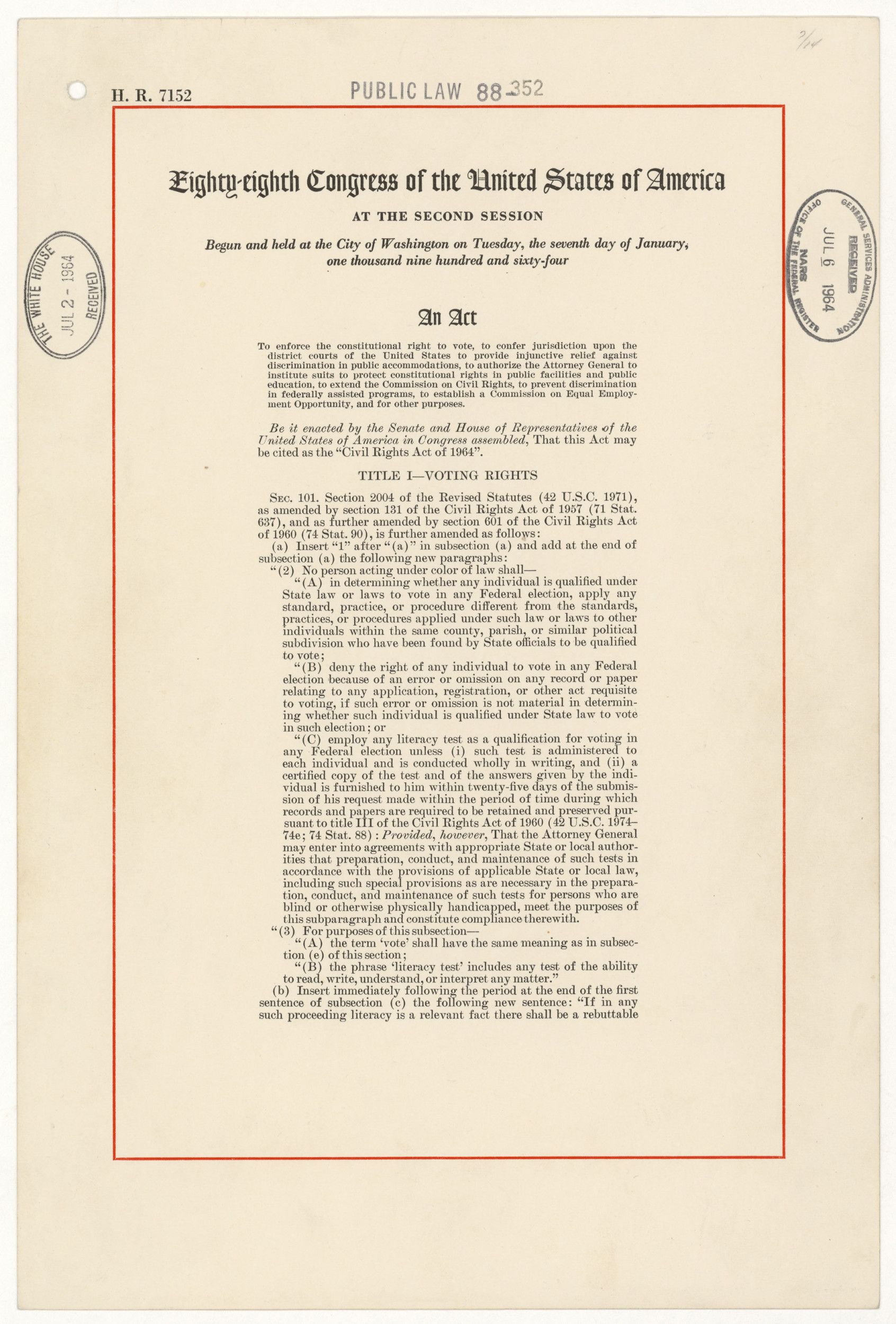
Civil Rights Act of 1964
Page 2
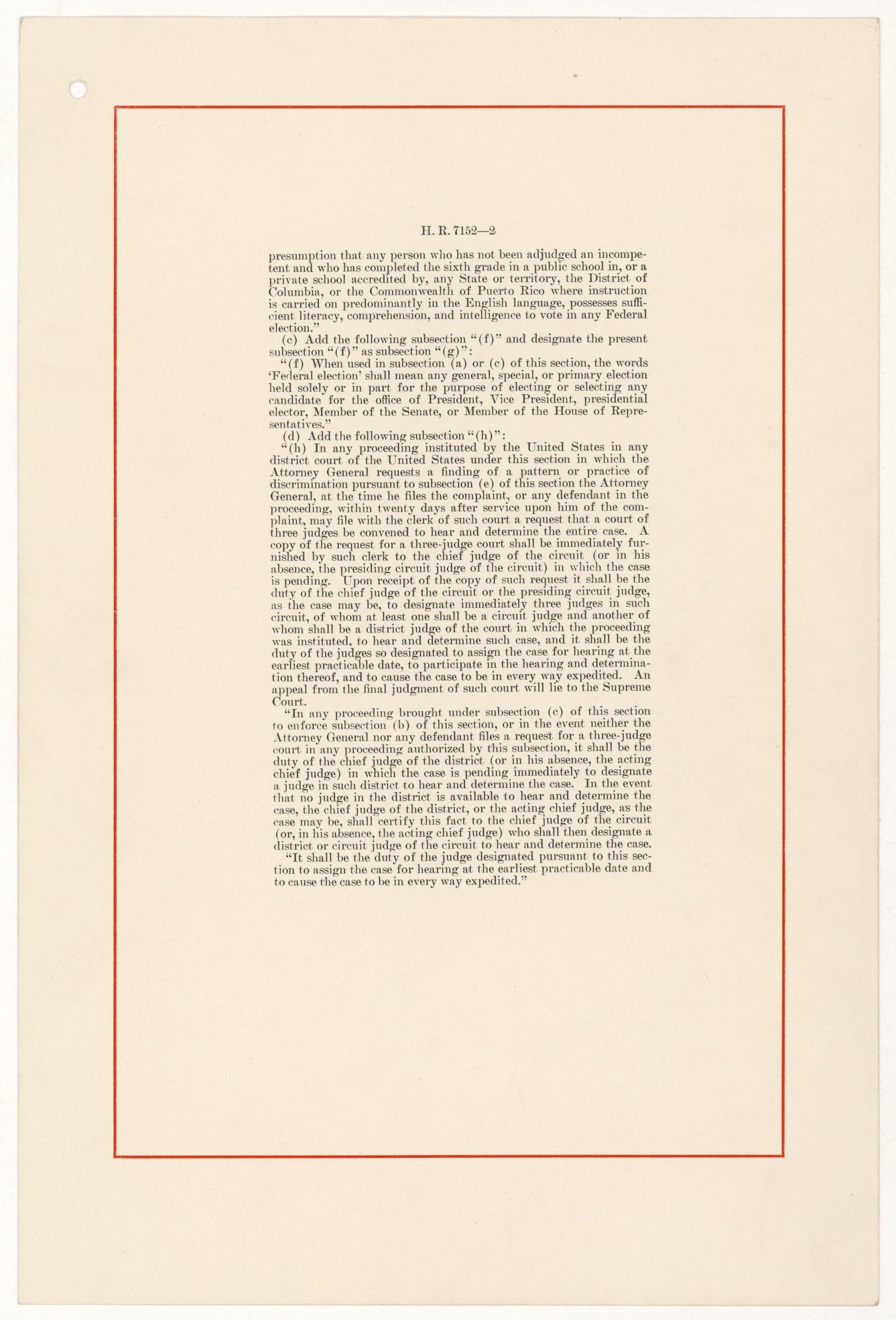
Civil Rights Act of 1964
Page 3
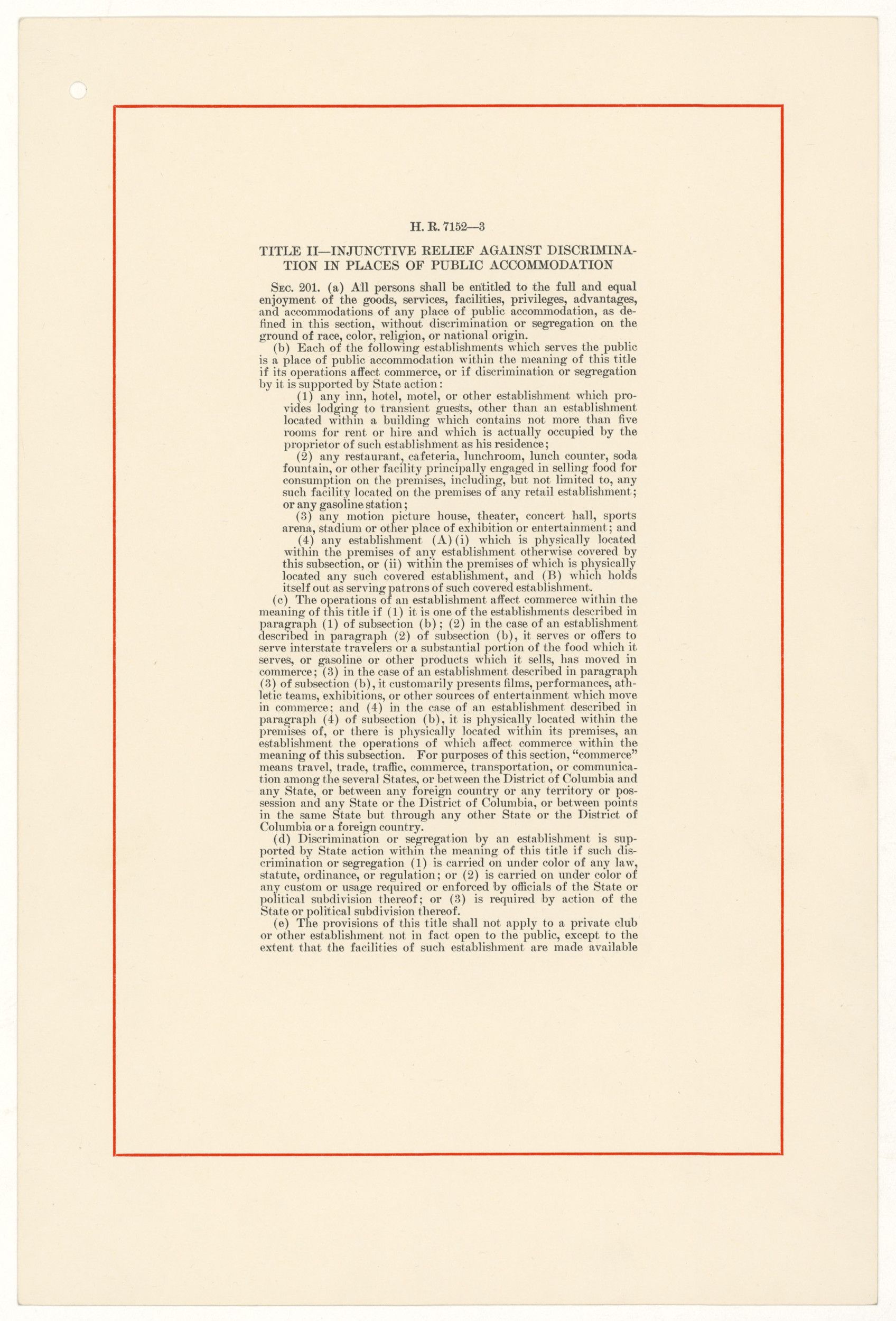
Civil Rights Act of 1964
Page 4
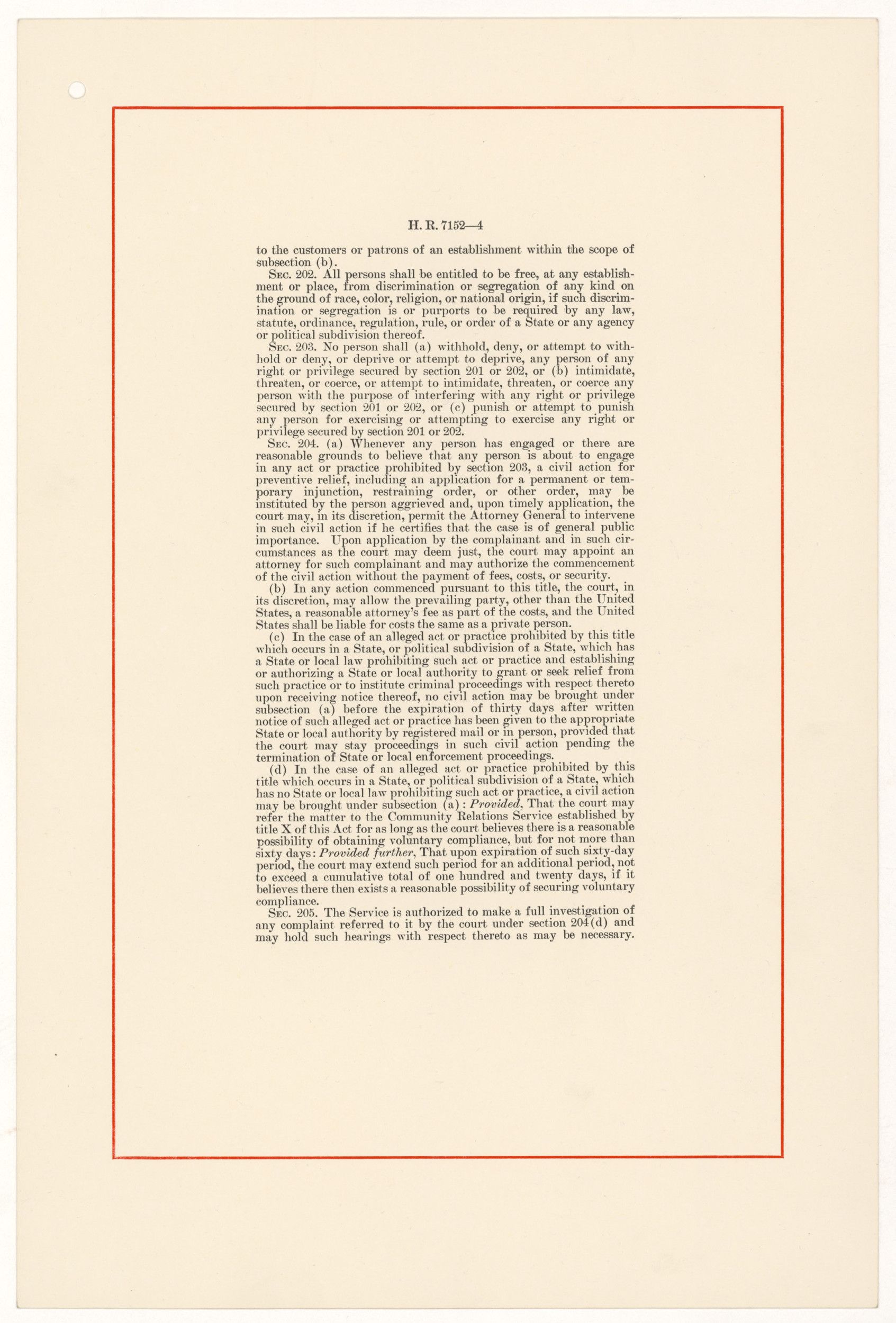
Civil Rights Act of 1964
Page 5
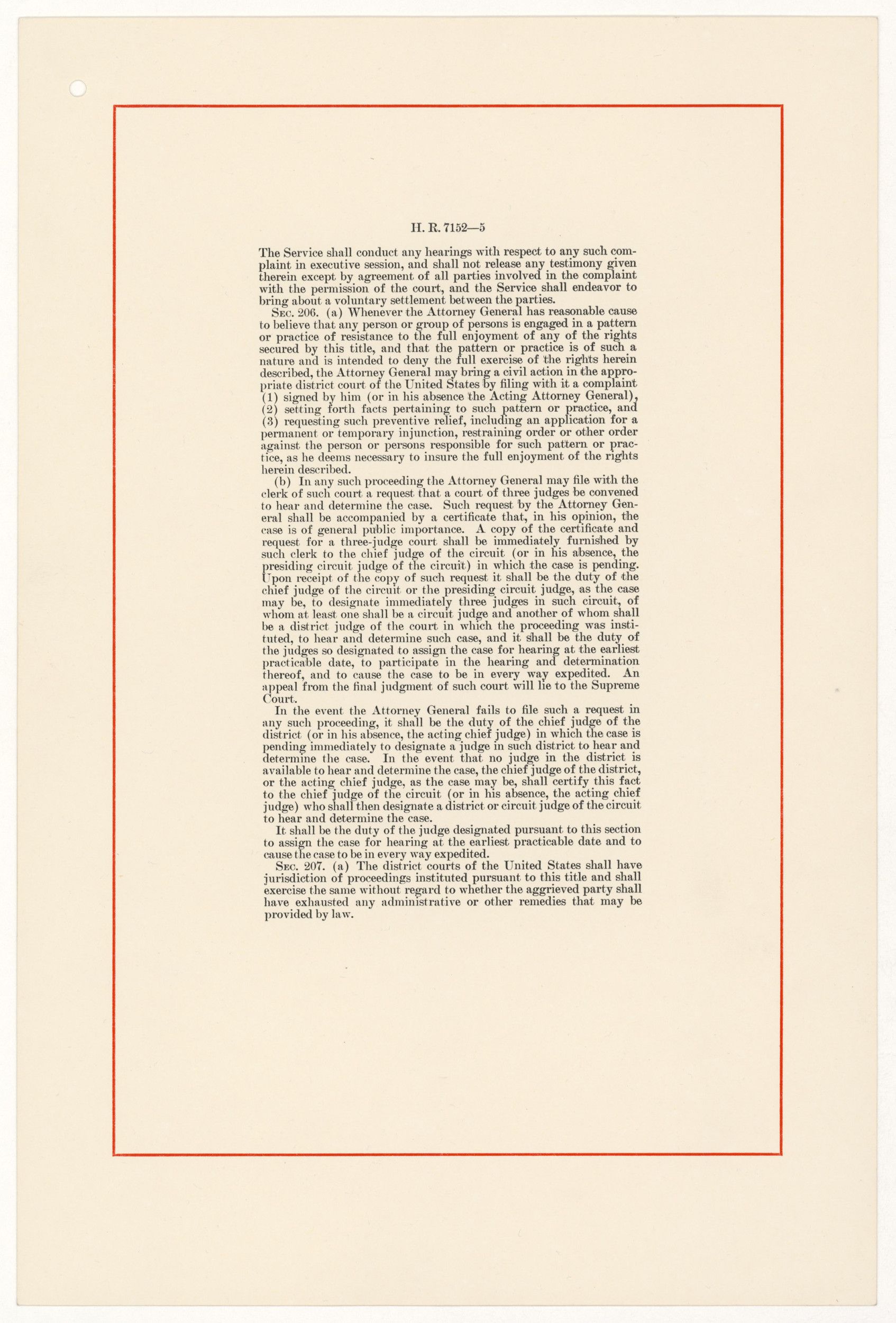
Civil Rights Act of 1964
Page 6
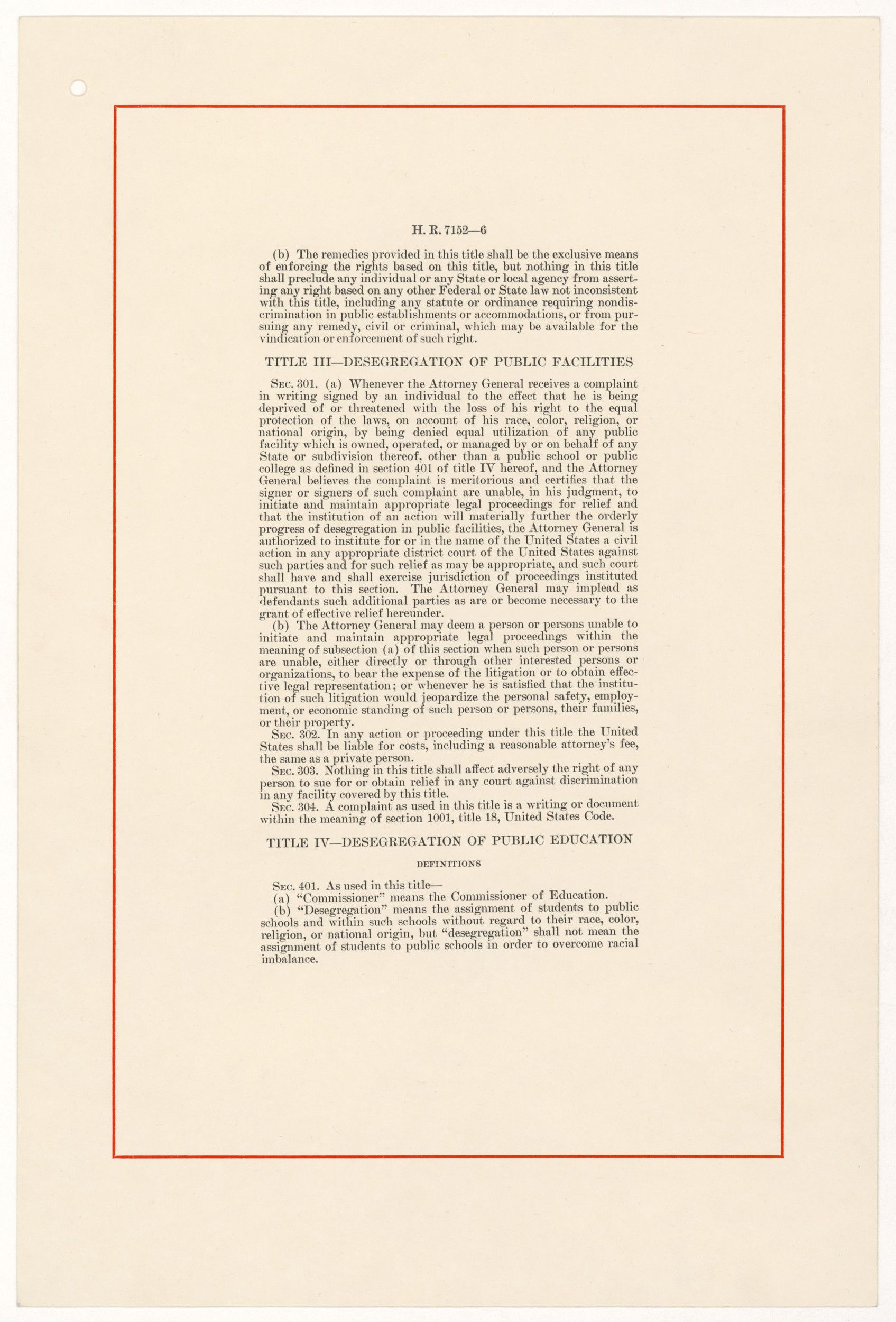
Civil Rights Act of 1964
Page 7
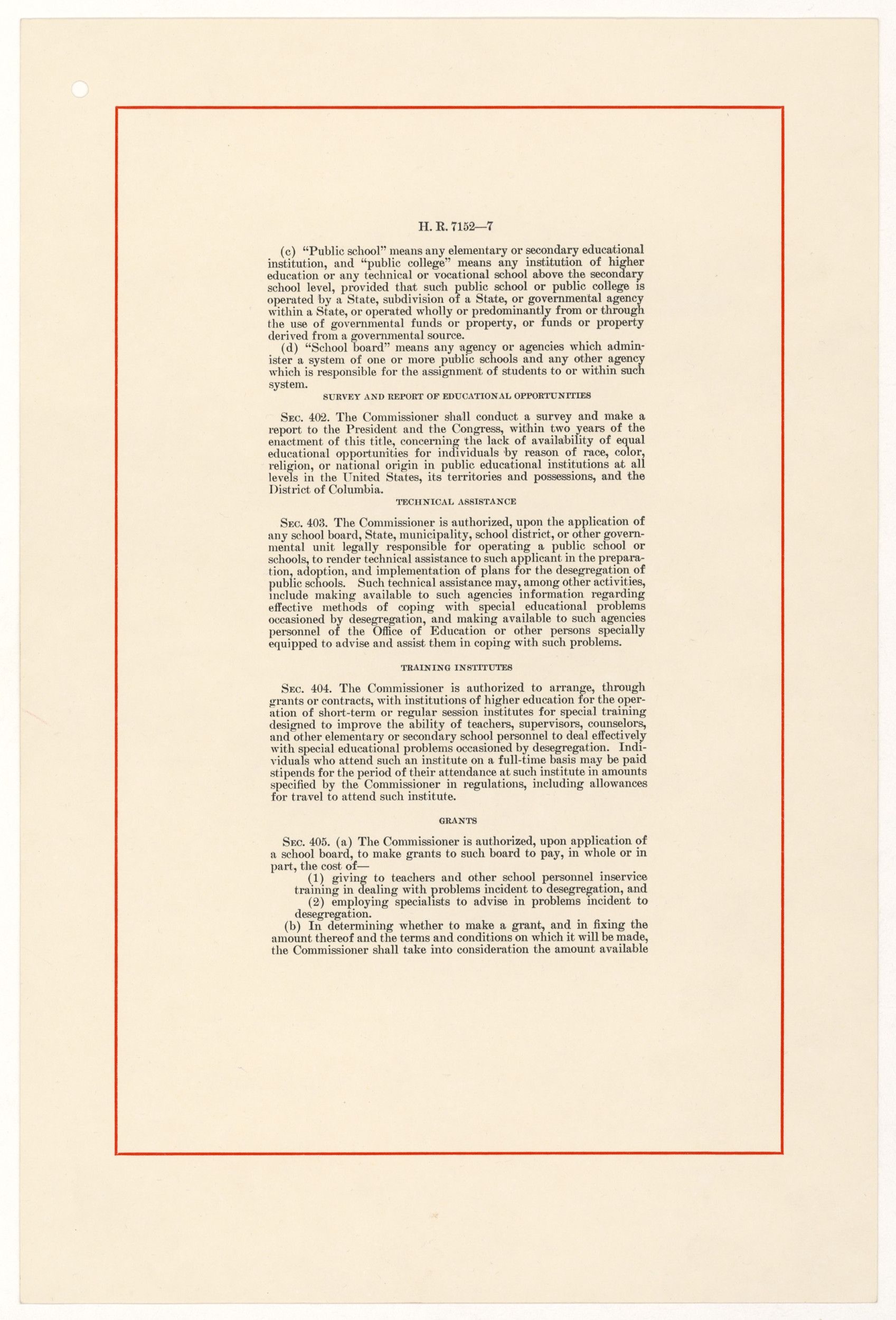
Civil Rights Act of 1964
Page 8
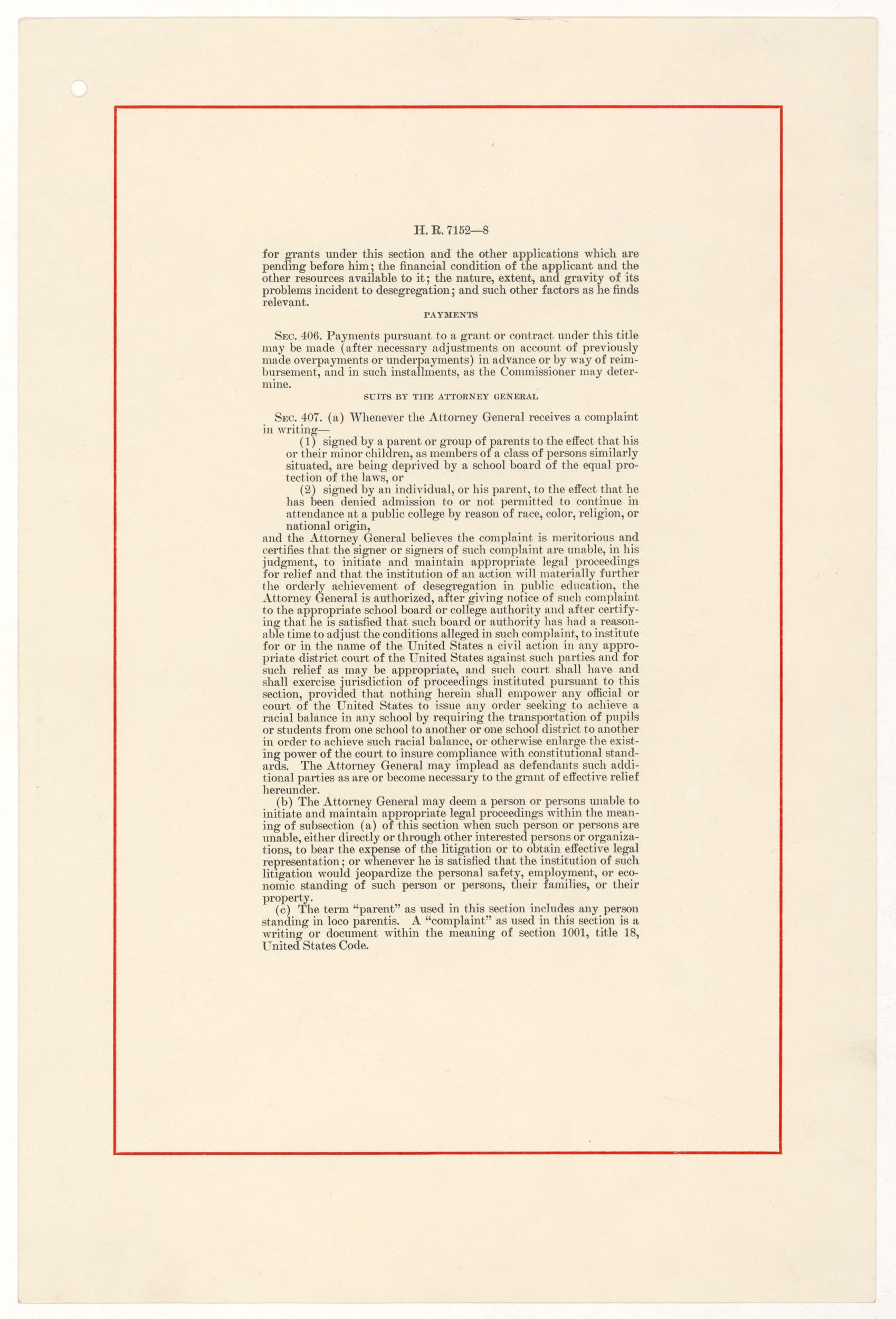
Civil Rights Act of 1964
Page 9
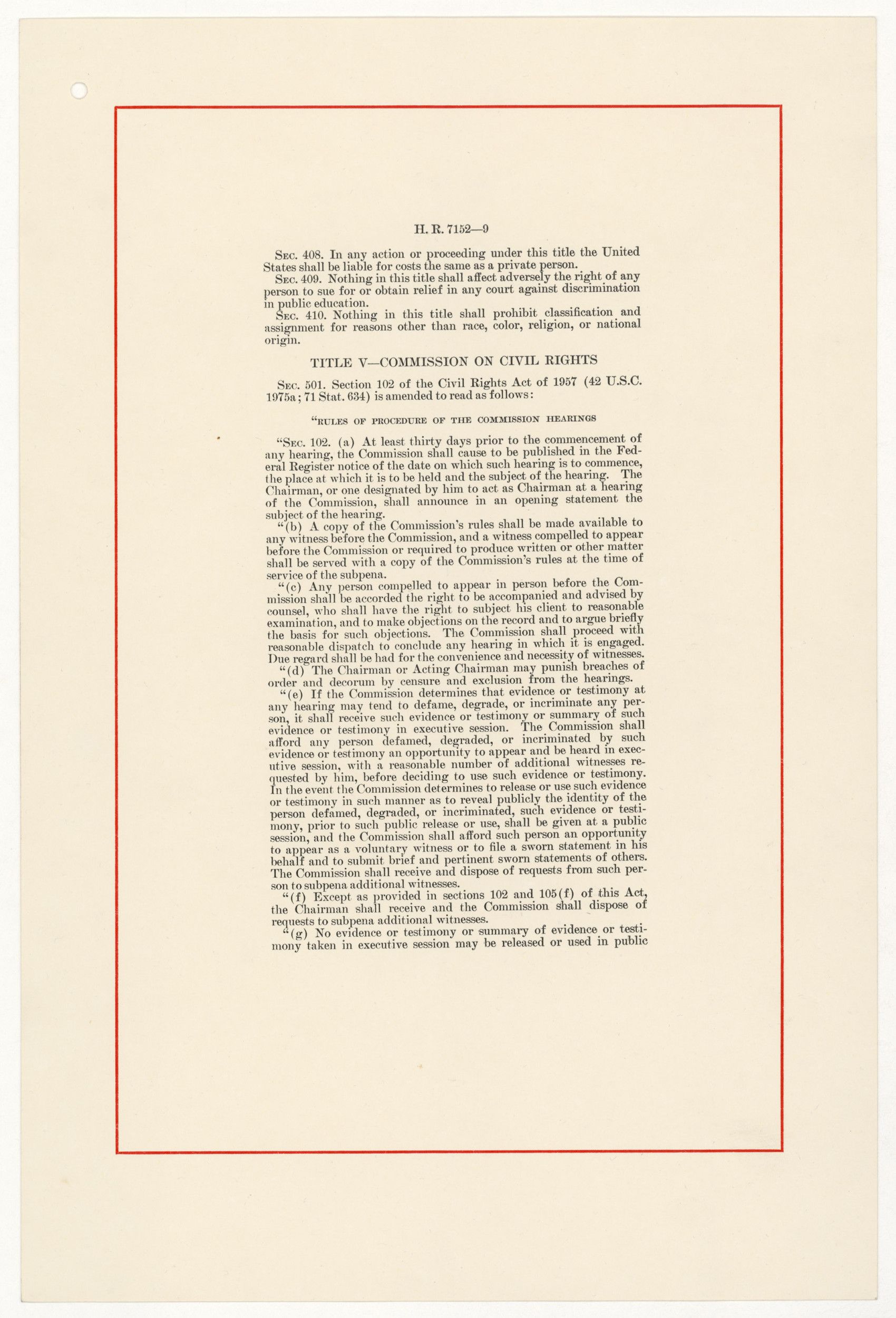
Civil Rights Act of 1964
Page 10
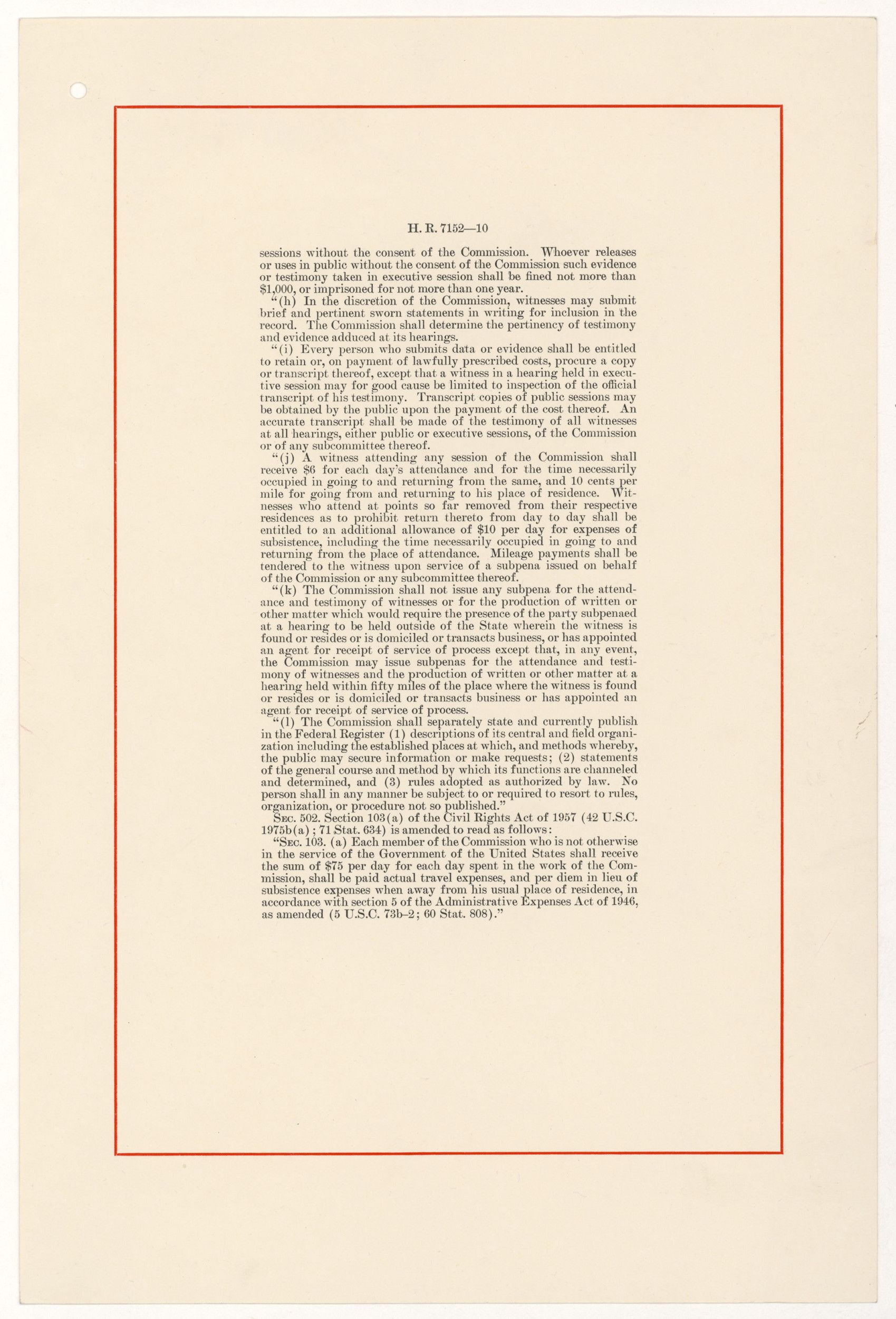
Civil Rights Act of 1964
Page 11
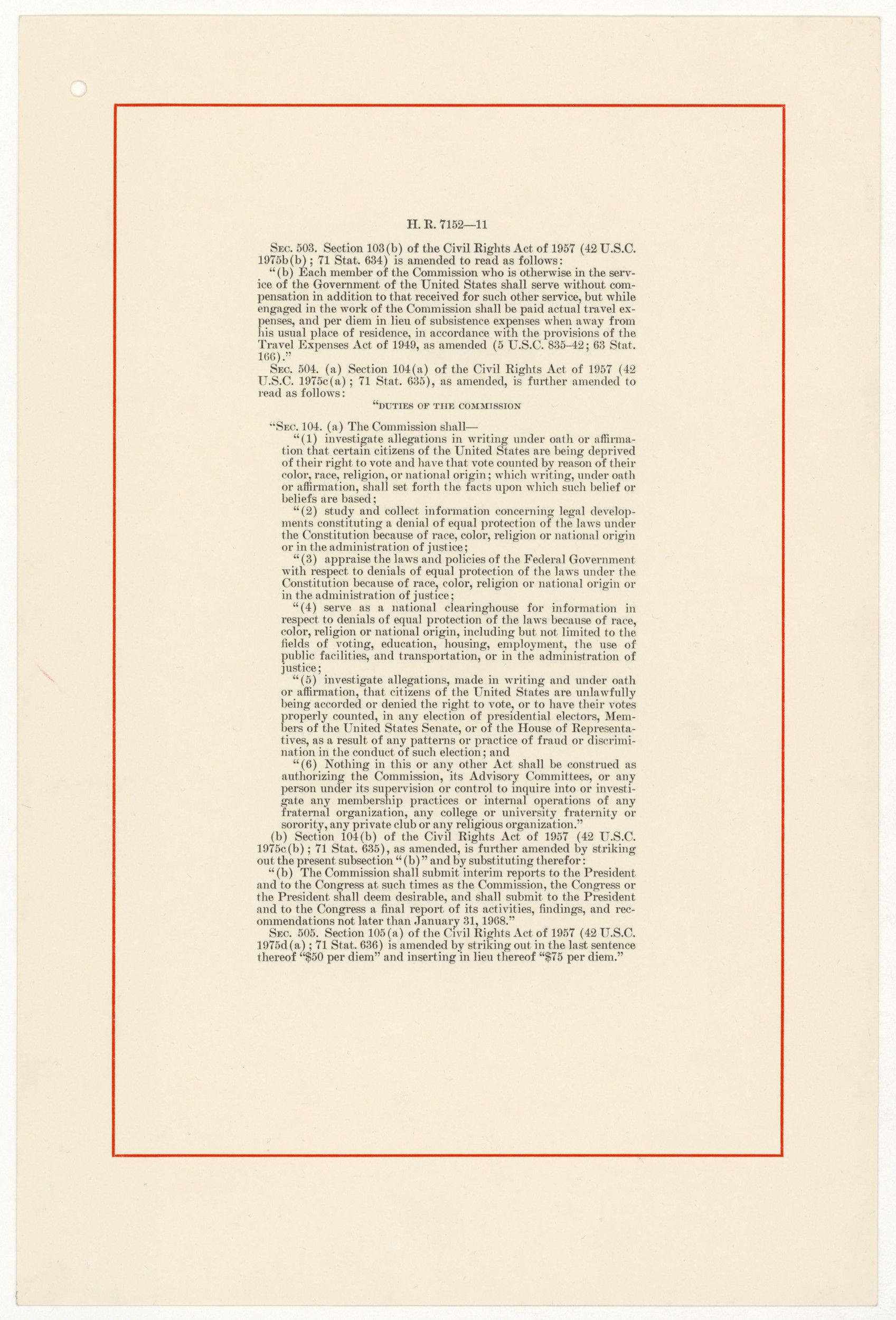
Civil Rights Act of 1964
Page 12
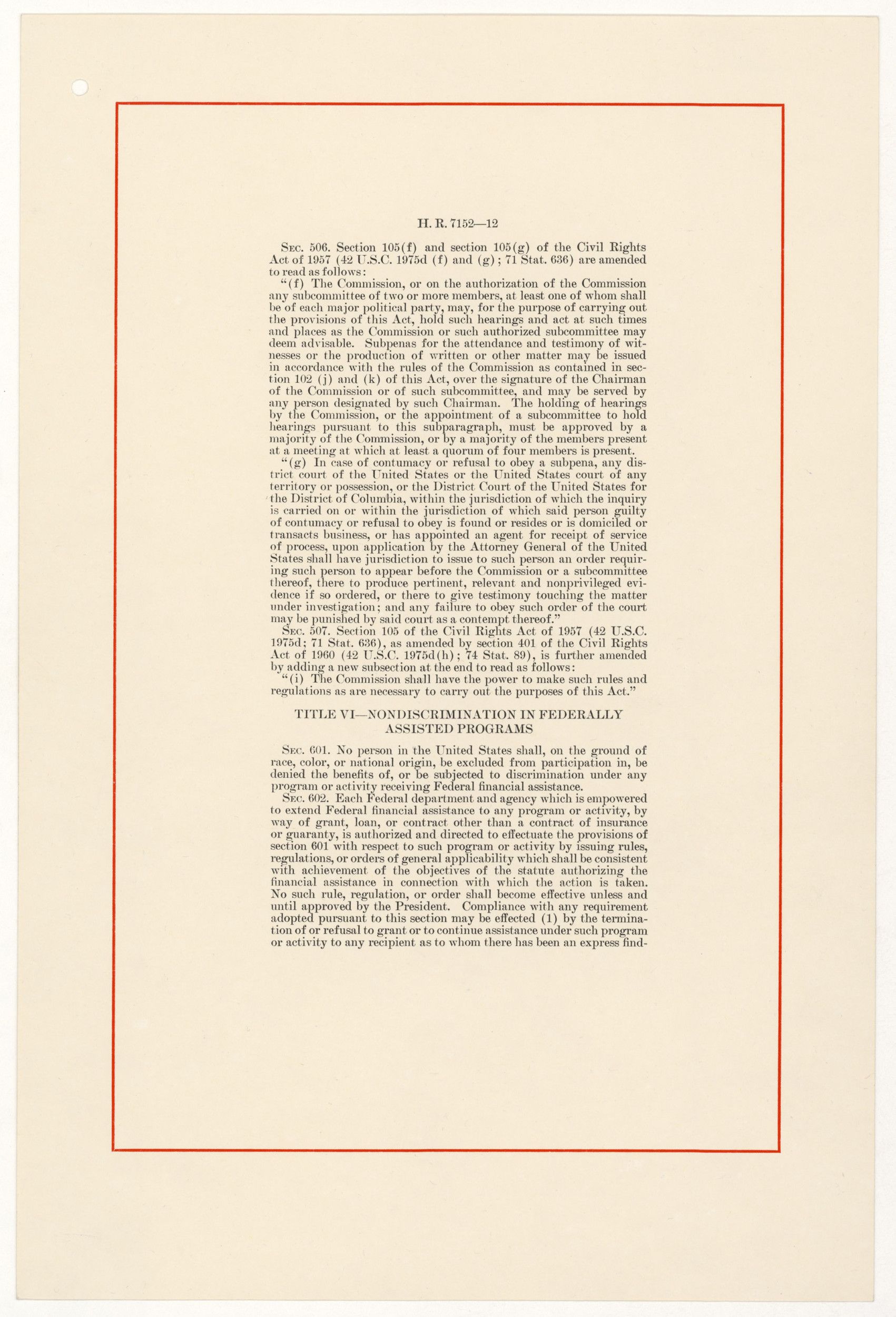
Civil Rights Act of 1964
Page 13
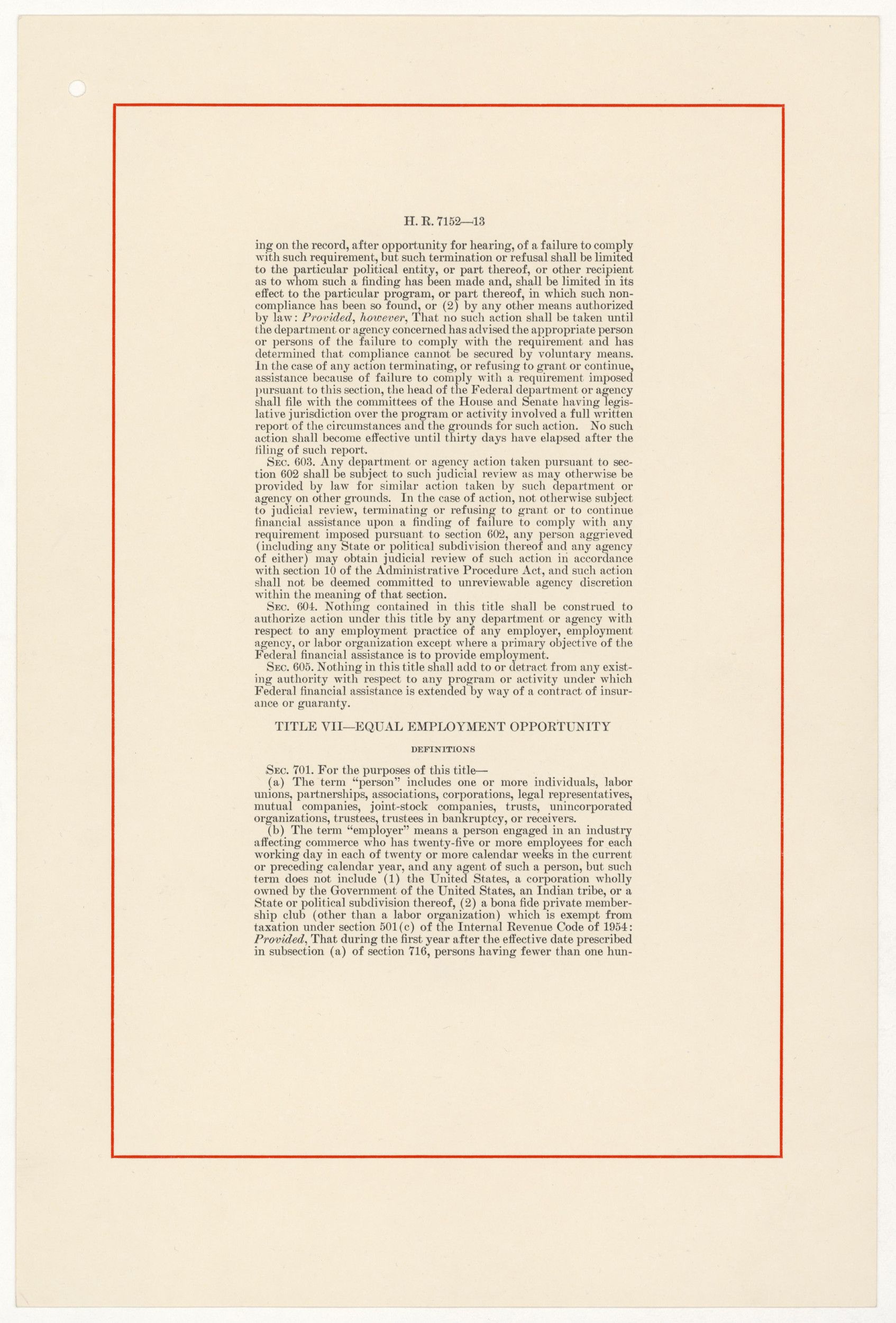
Civil Rights Act of 1964
Page 14
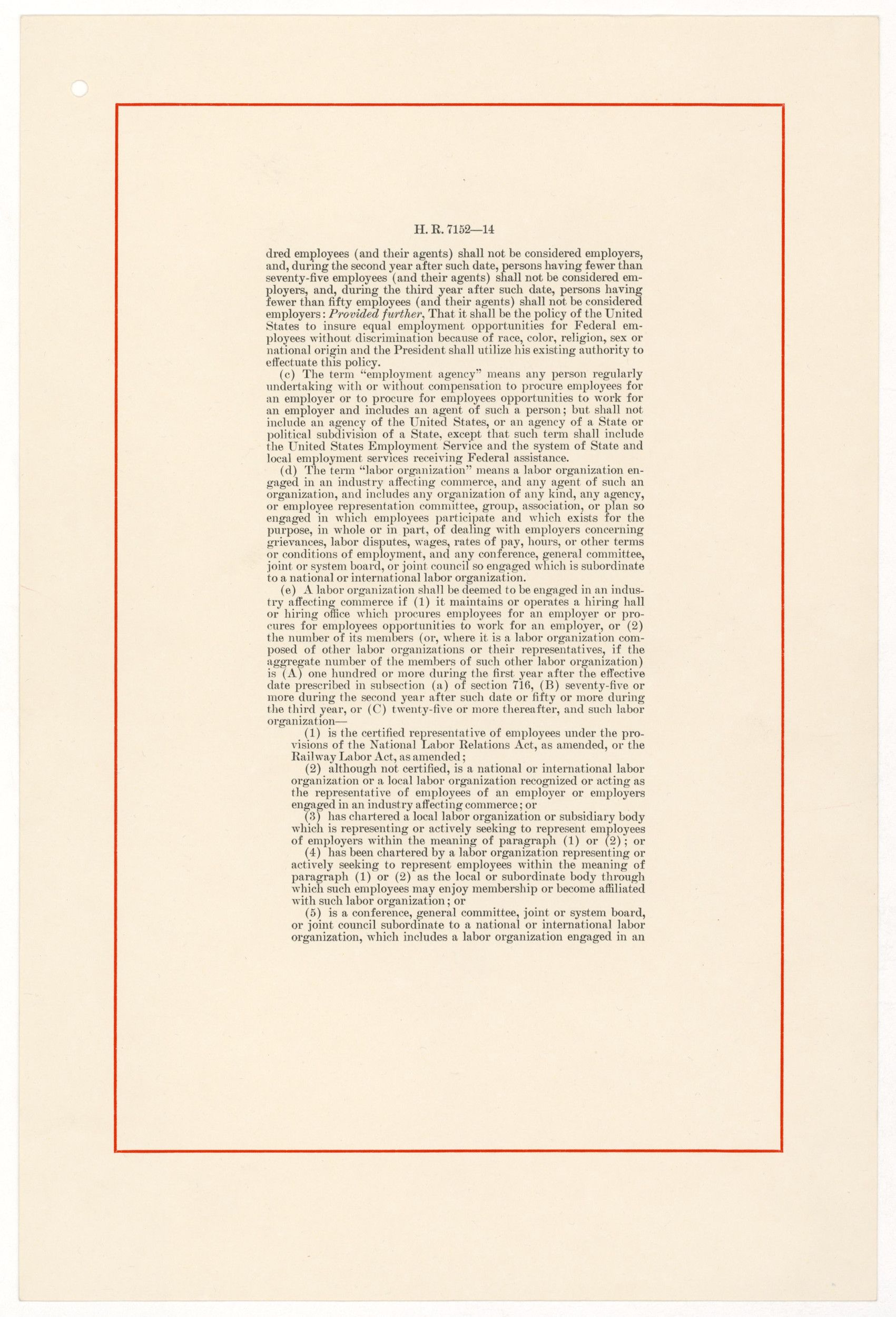
Civil Rights Act of 1964
Page 15
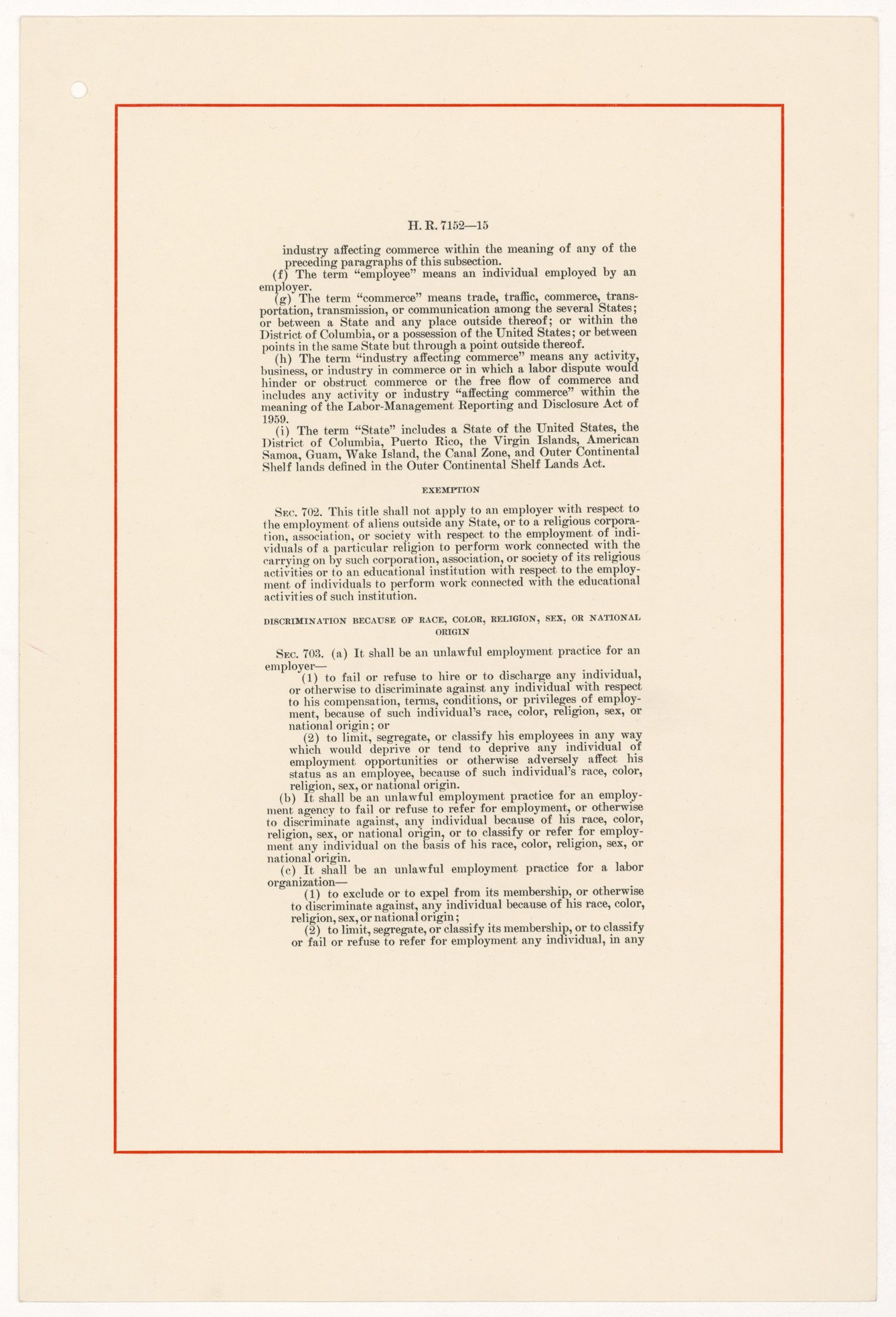
Civil Rights Act of 1964
Page 16
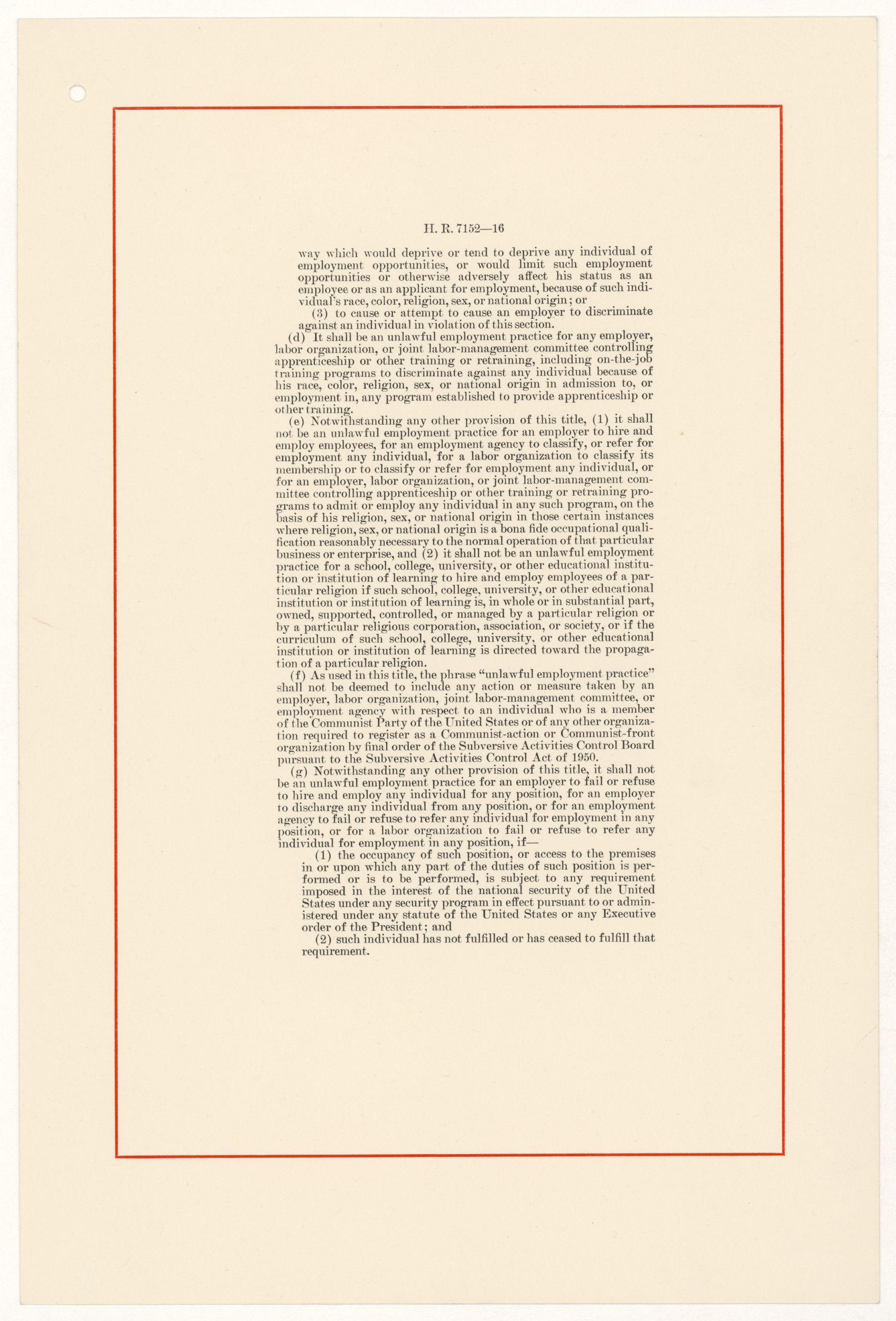
Civil Rights Act of 1964
Page 17
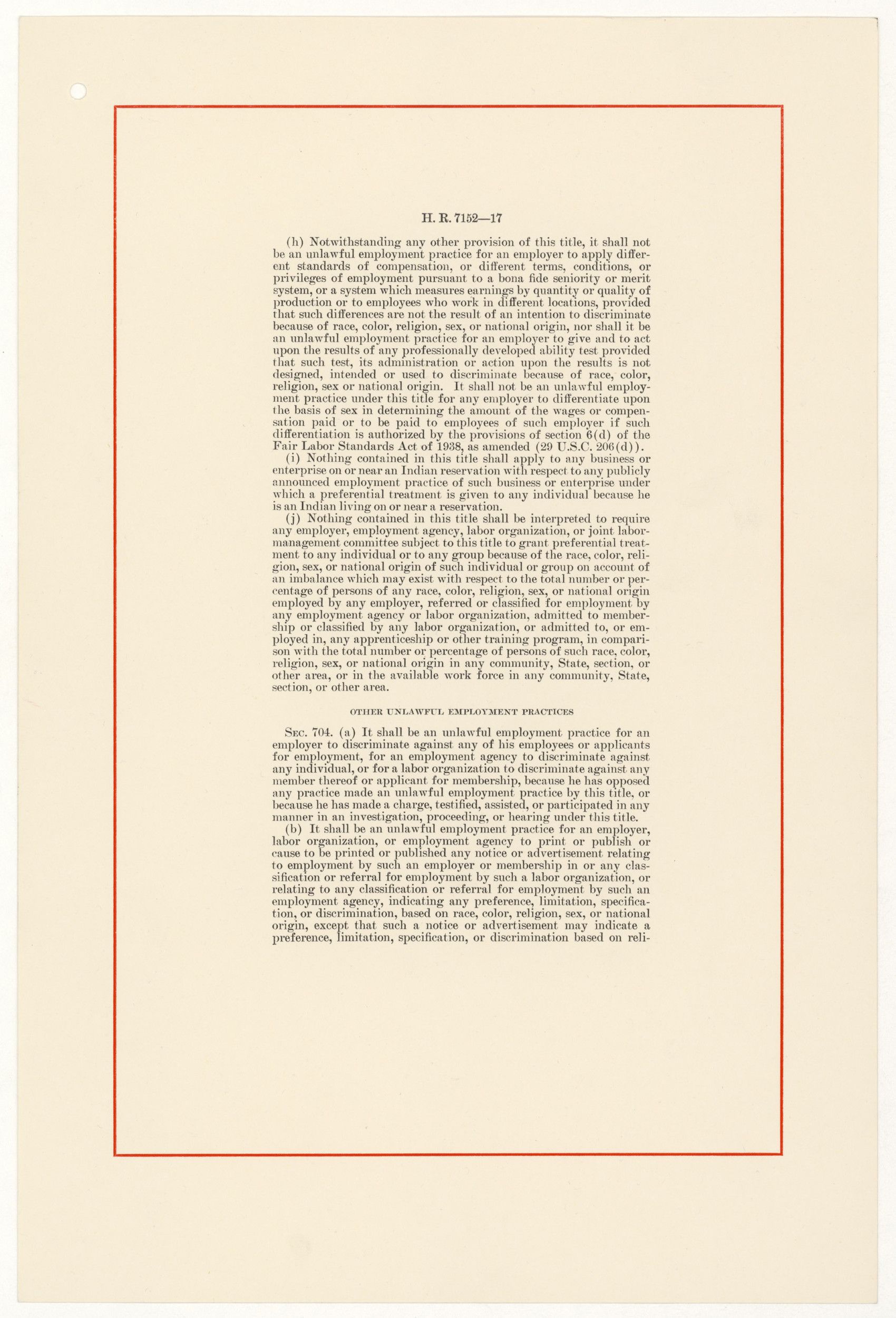
Civil Rights Act of 1964
Page 18
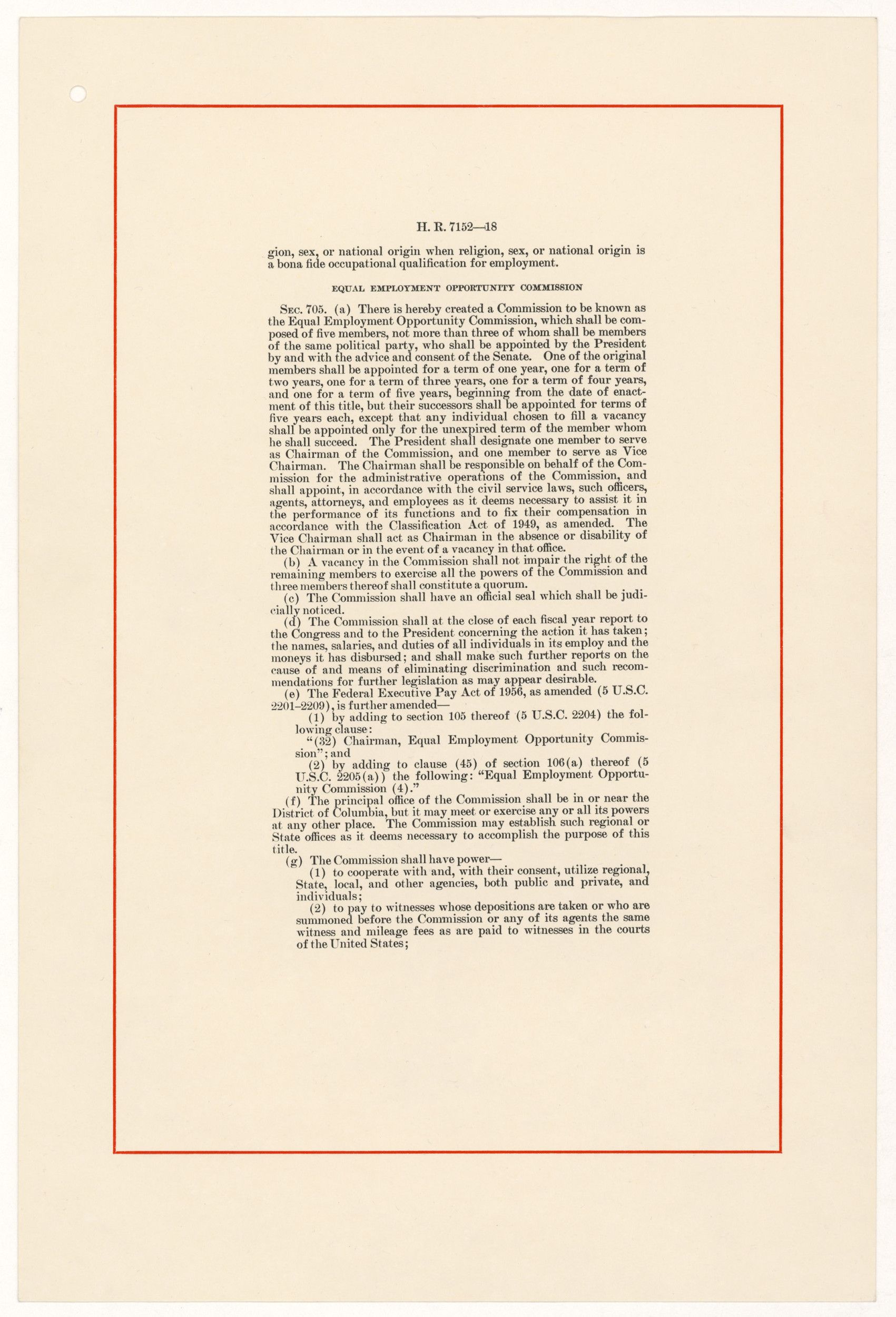
Civil Rights Act of 1964
Page 19
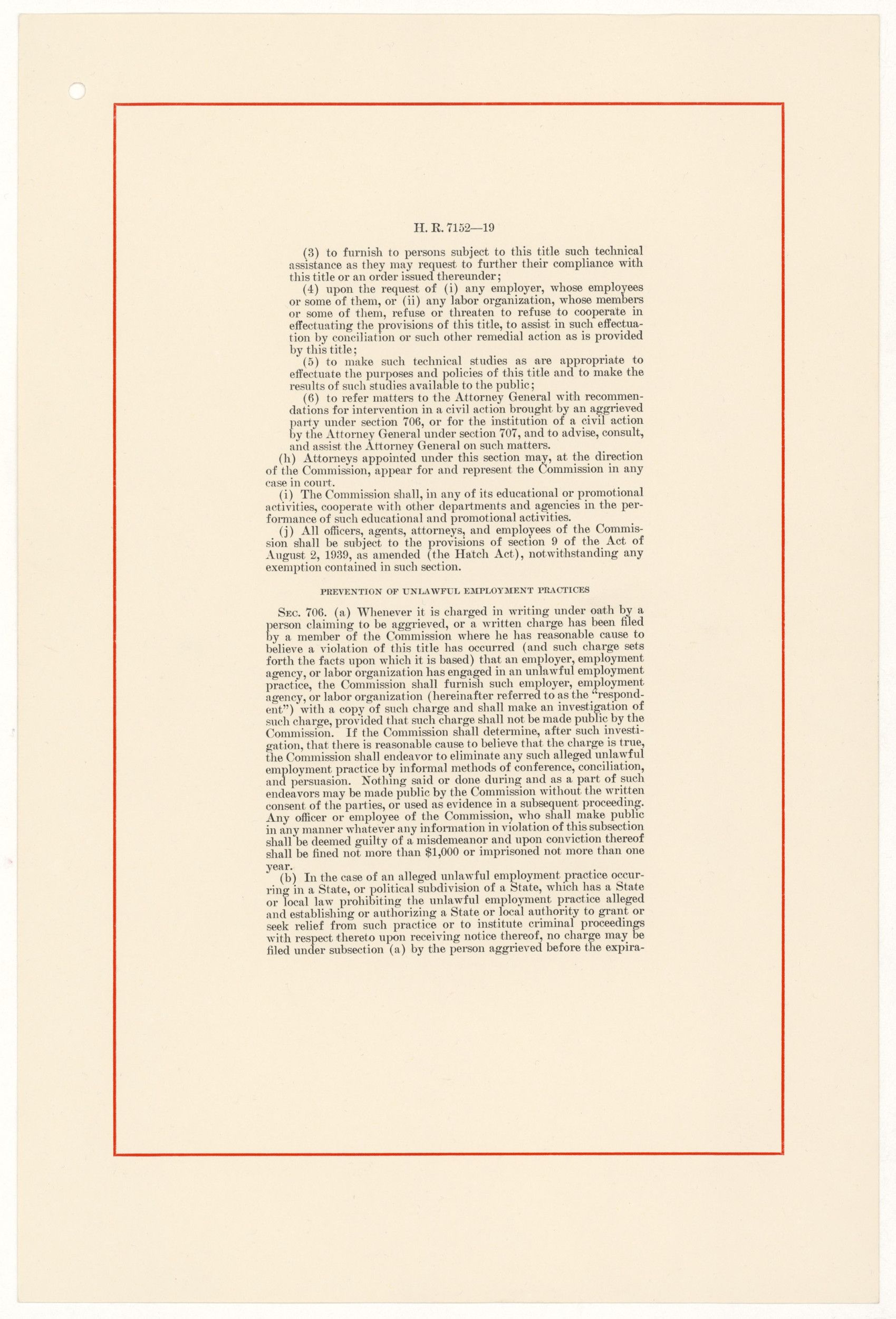
Civil Rights Act of 1964
Page 20
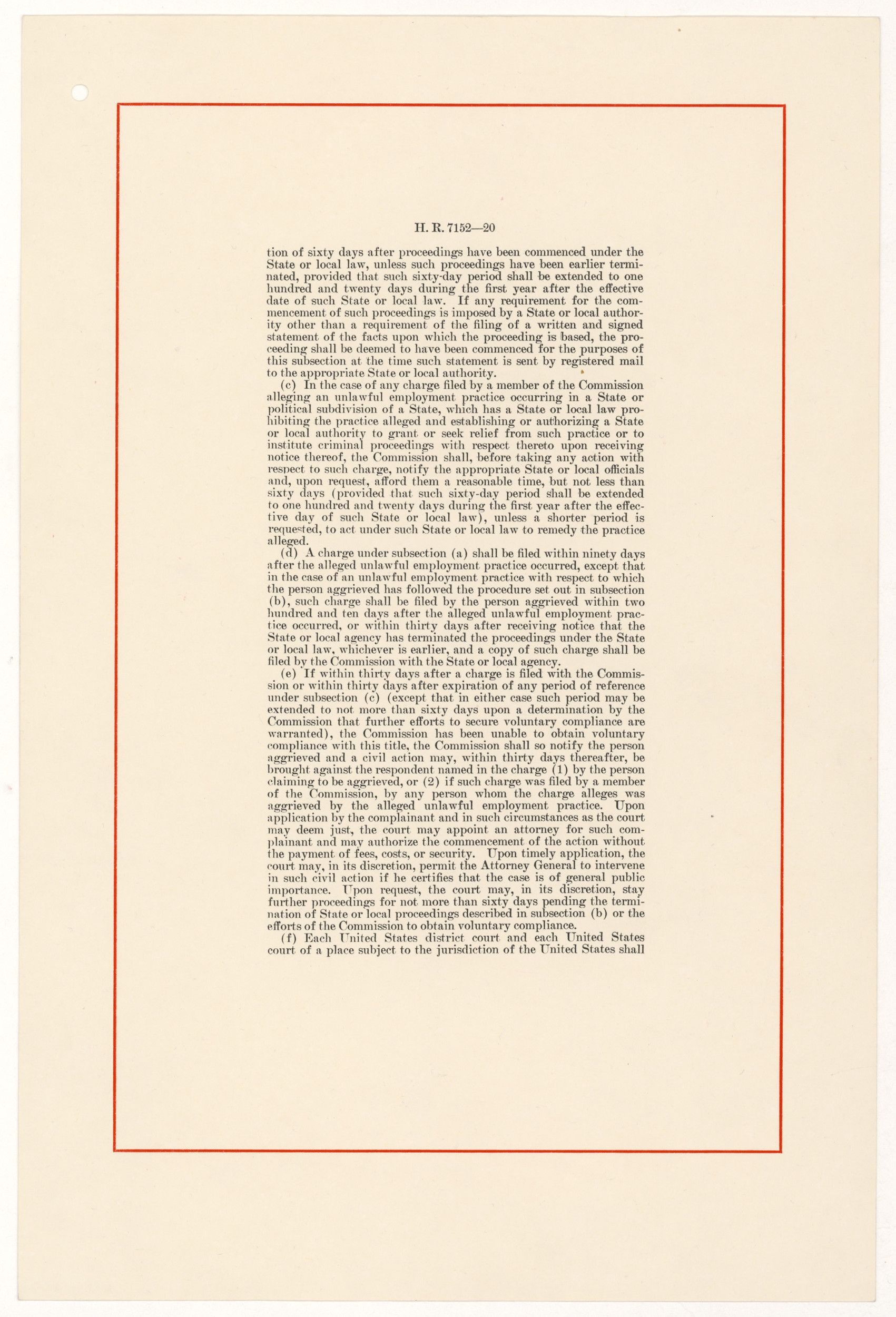
Civil Rights Act of 1964
Page 21
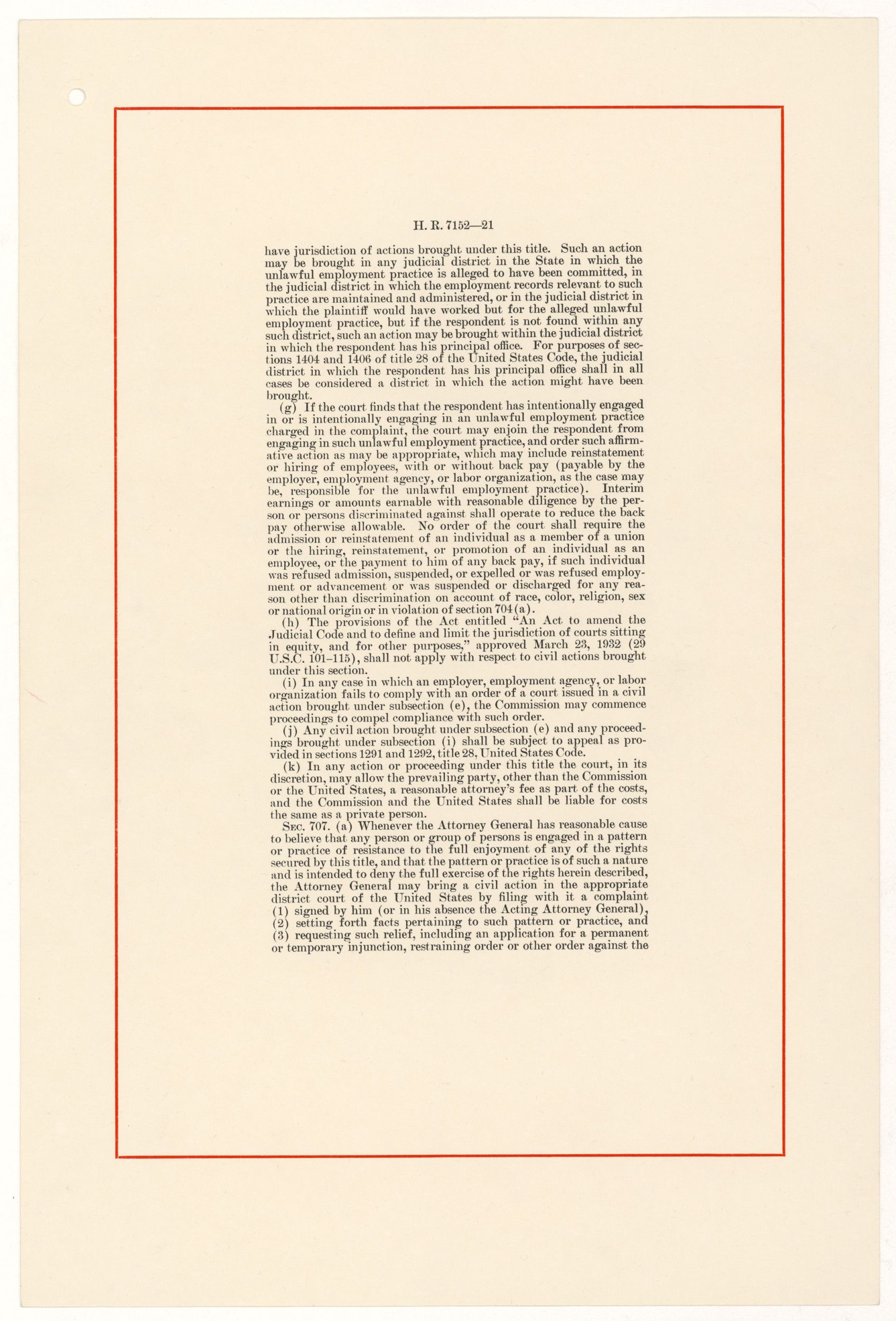
Civil Rights Act of 1964
Page 22
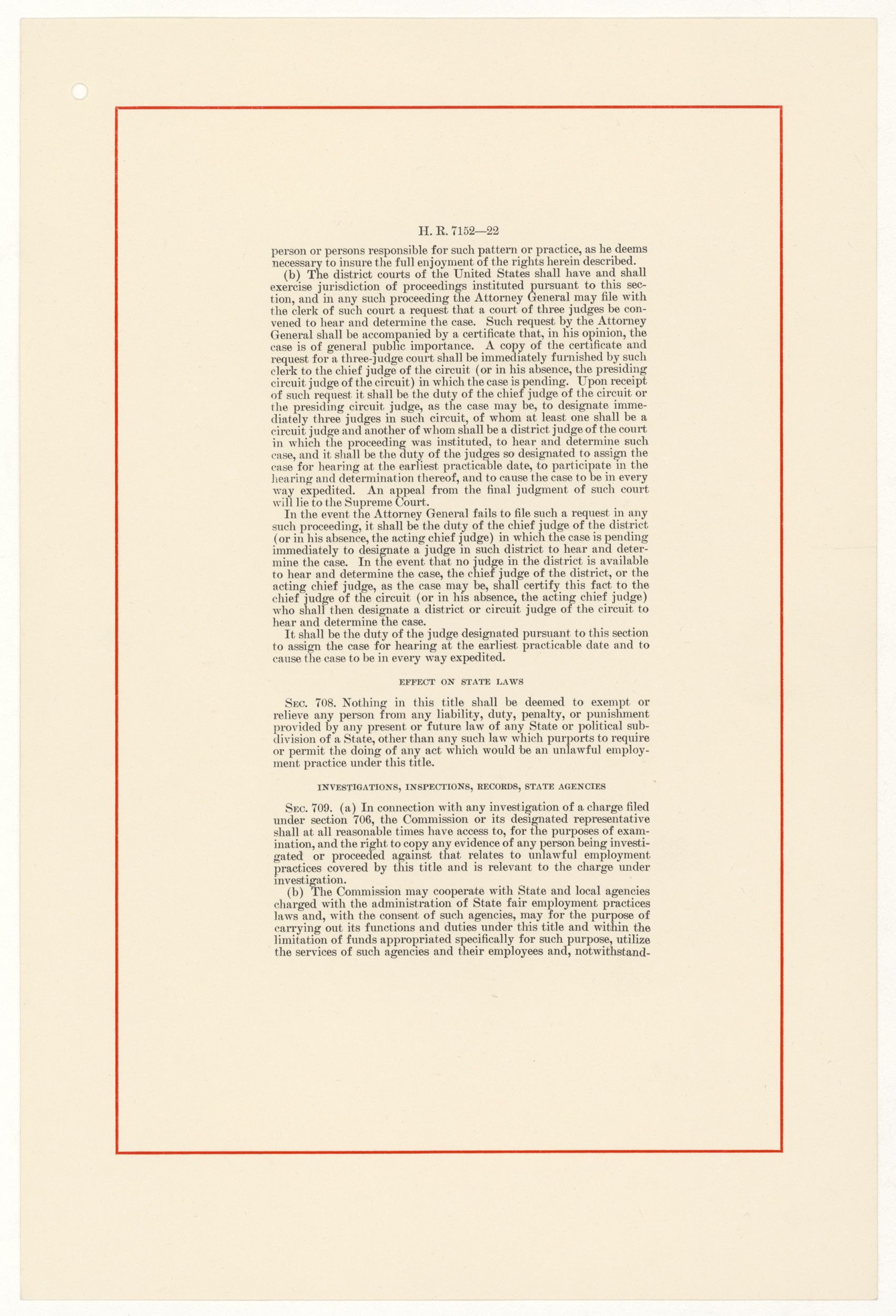
Civil Rights Act of 1964
Page 23
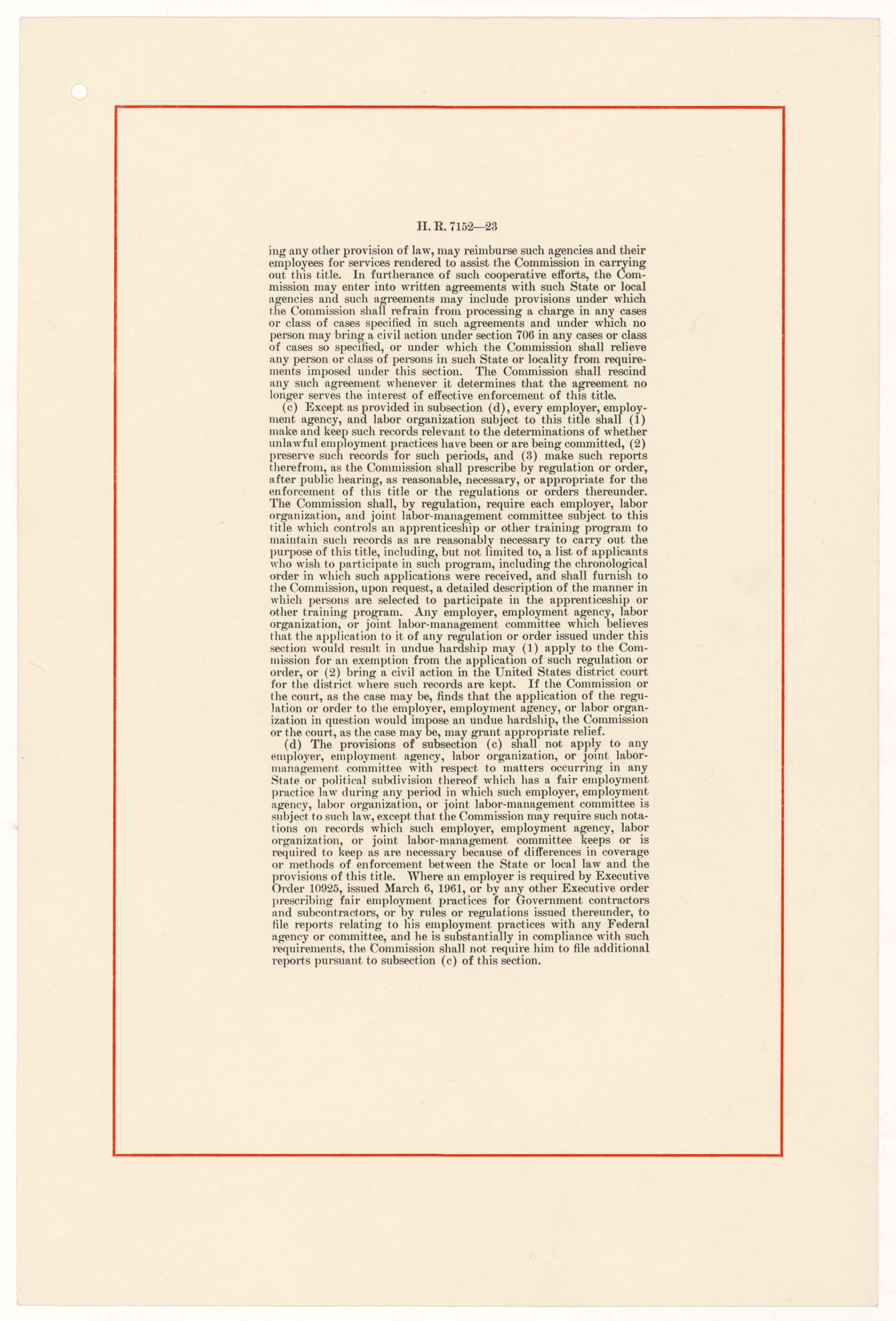
Civil Rights Act of 1964
Page 24
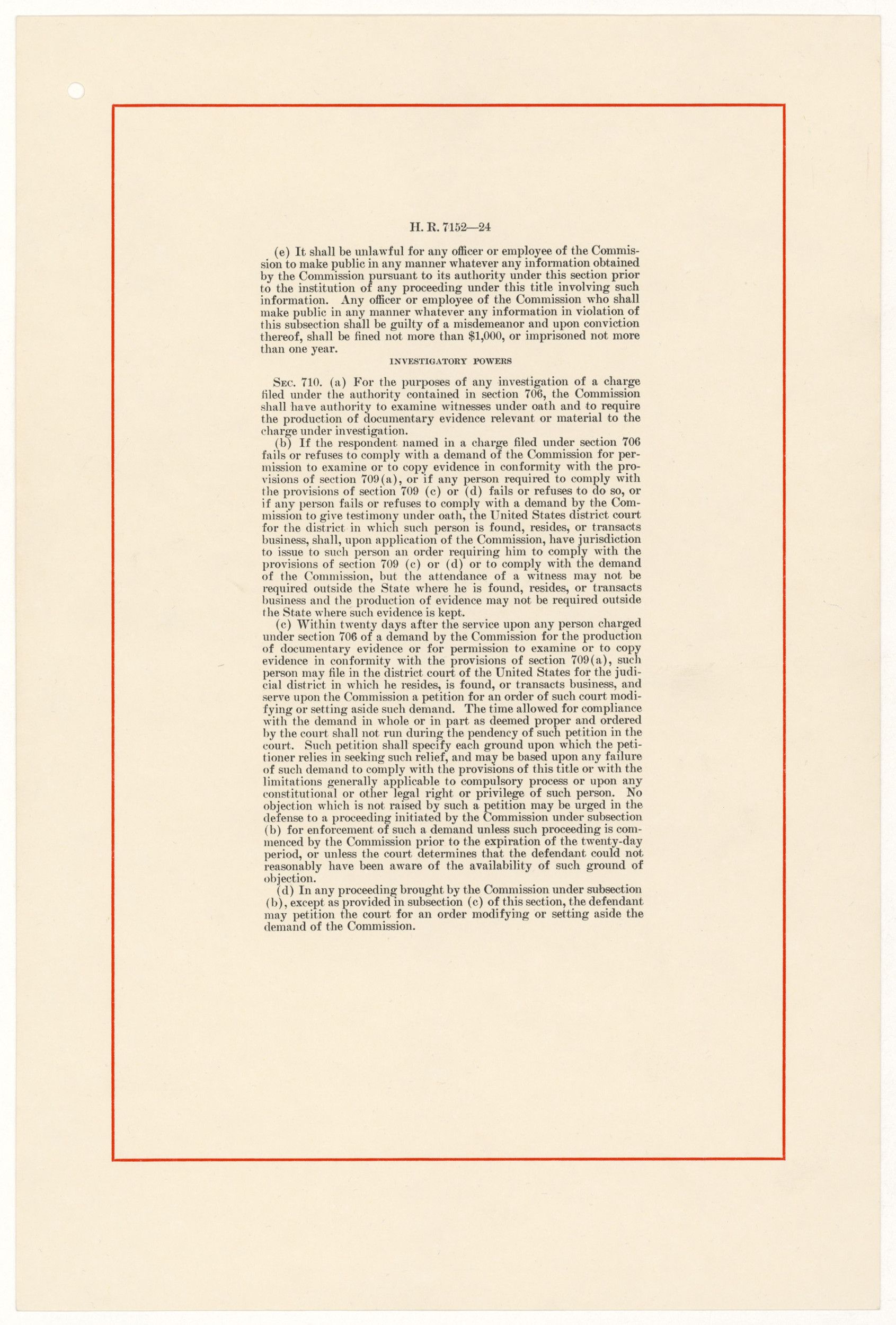
Civil Rights Act of 1964
Page 25
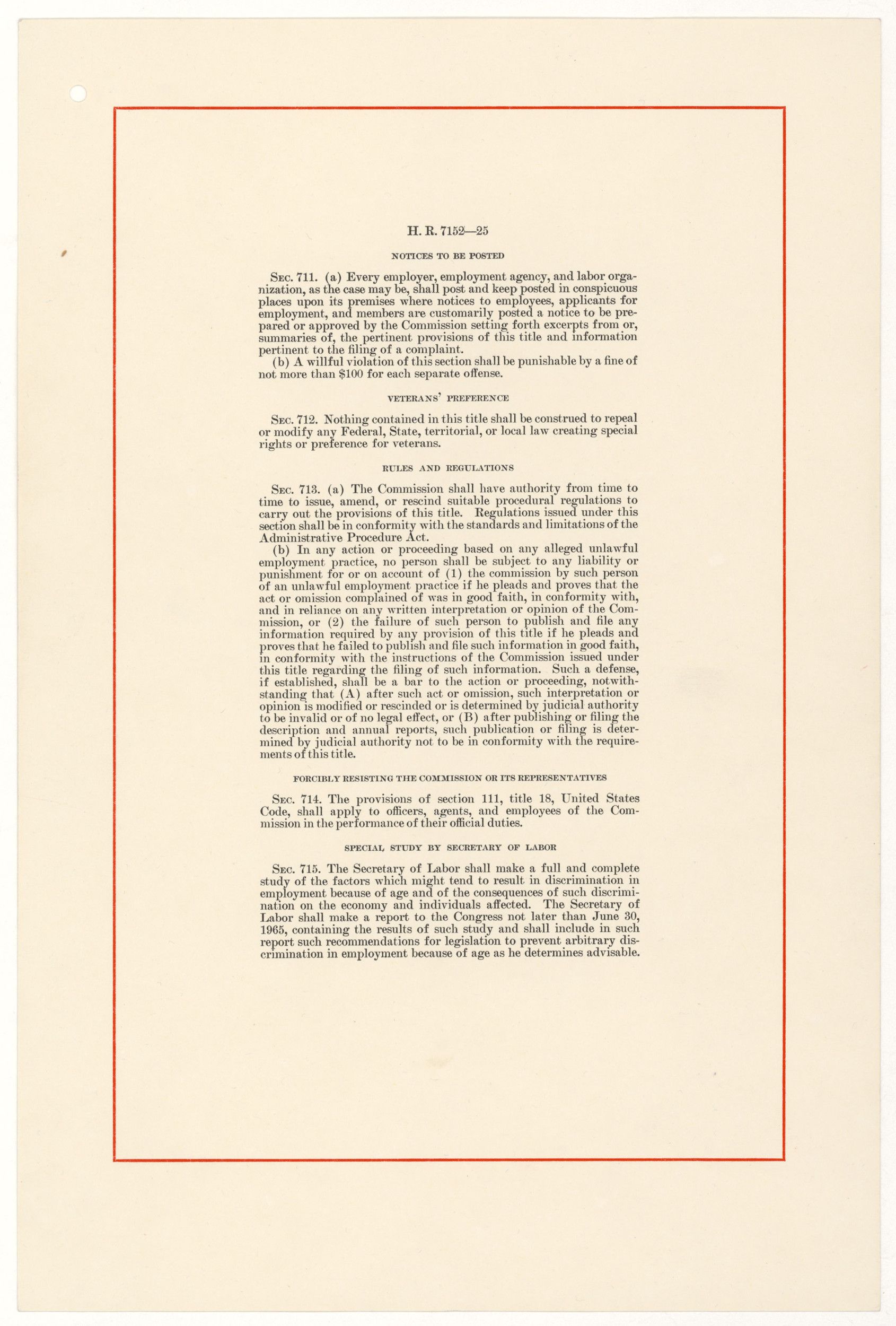
Civil Rights Act of 1964
Page 26
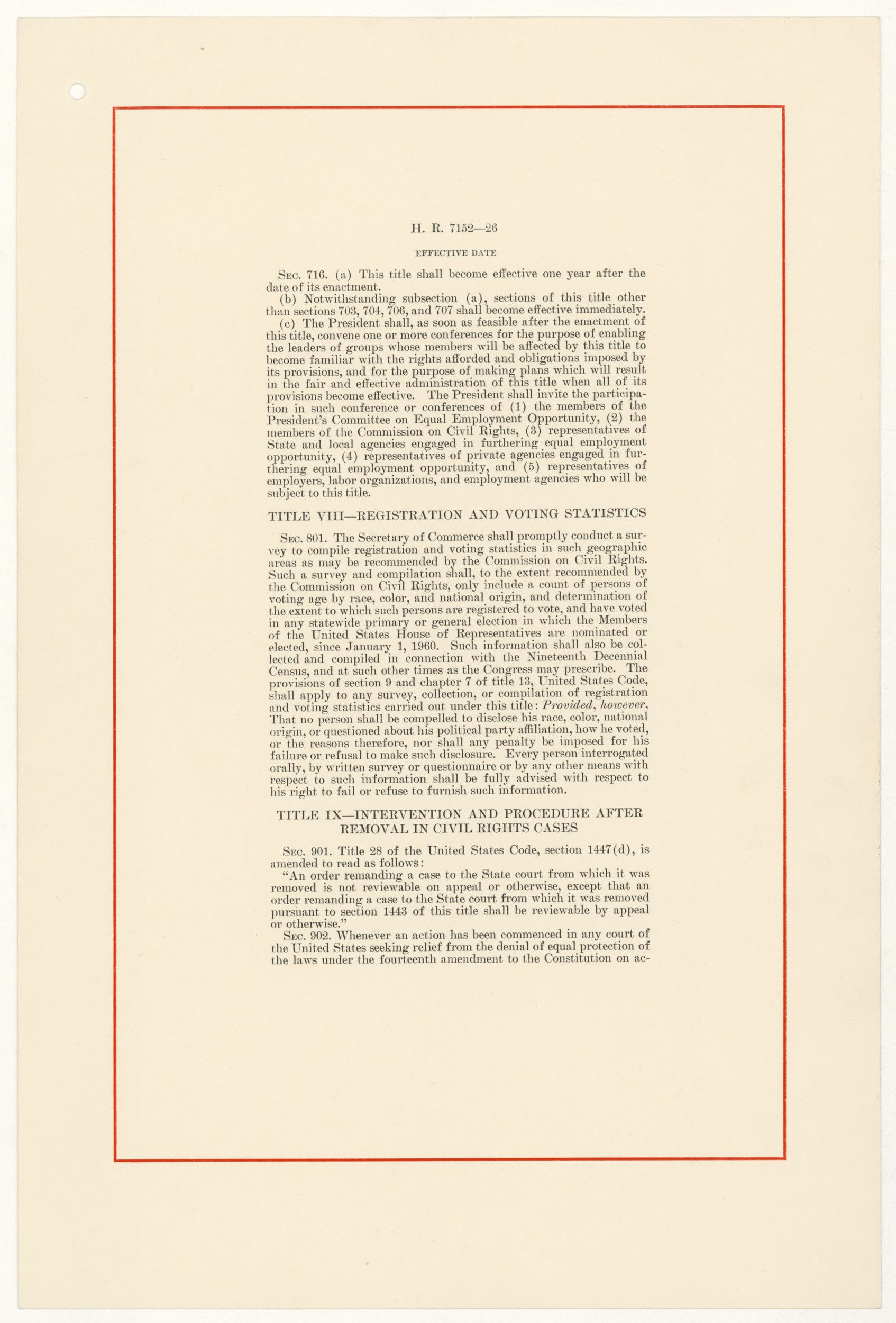
Civil Rights Act of 1964
Page 27
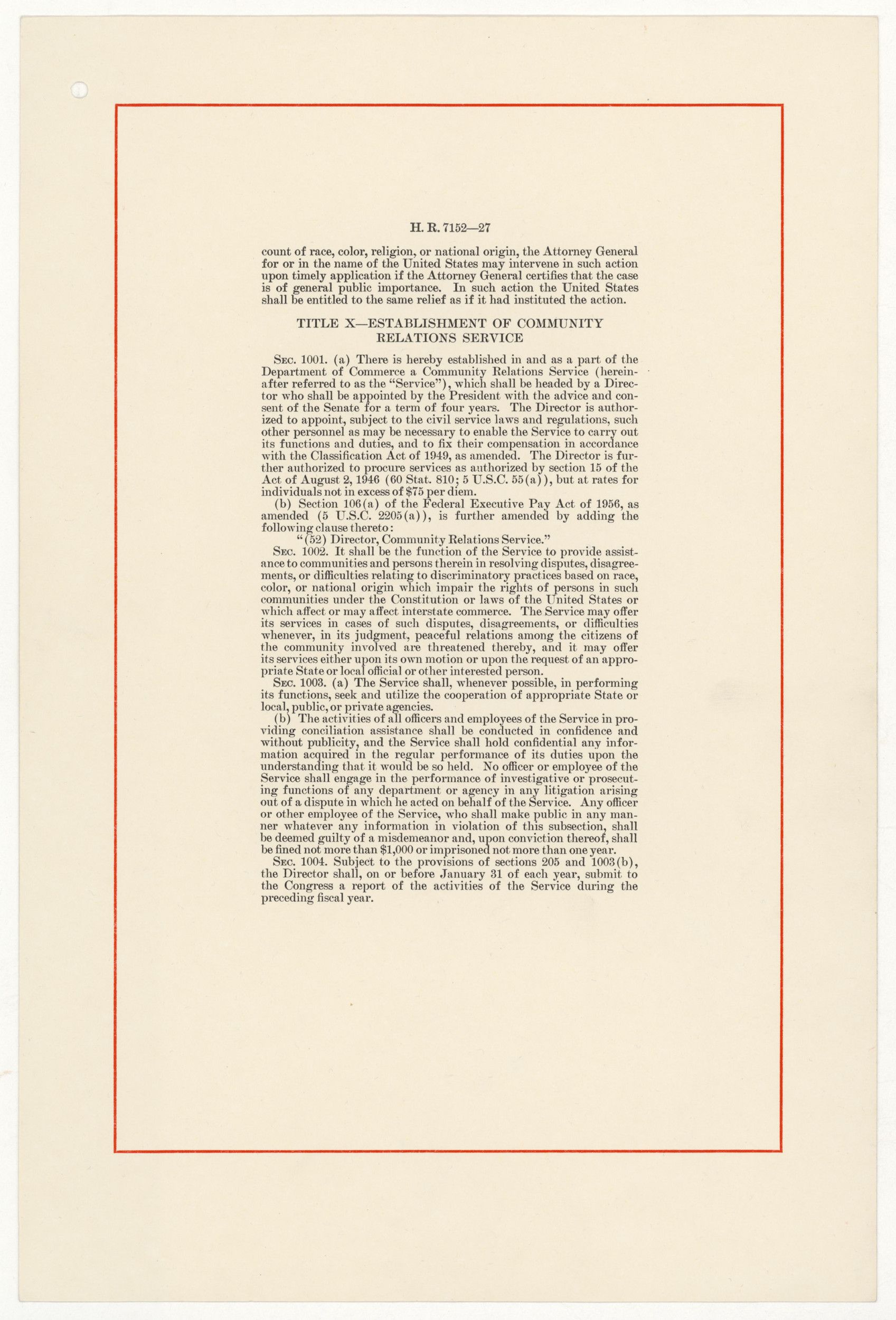
Civil Rights Act of 1964
Page 28
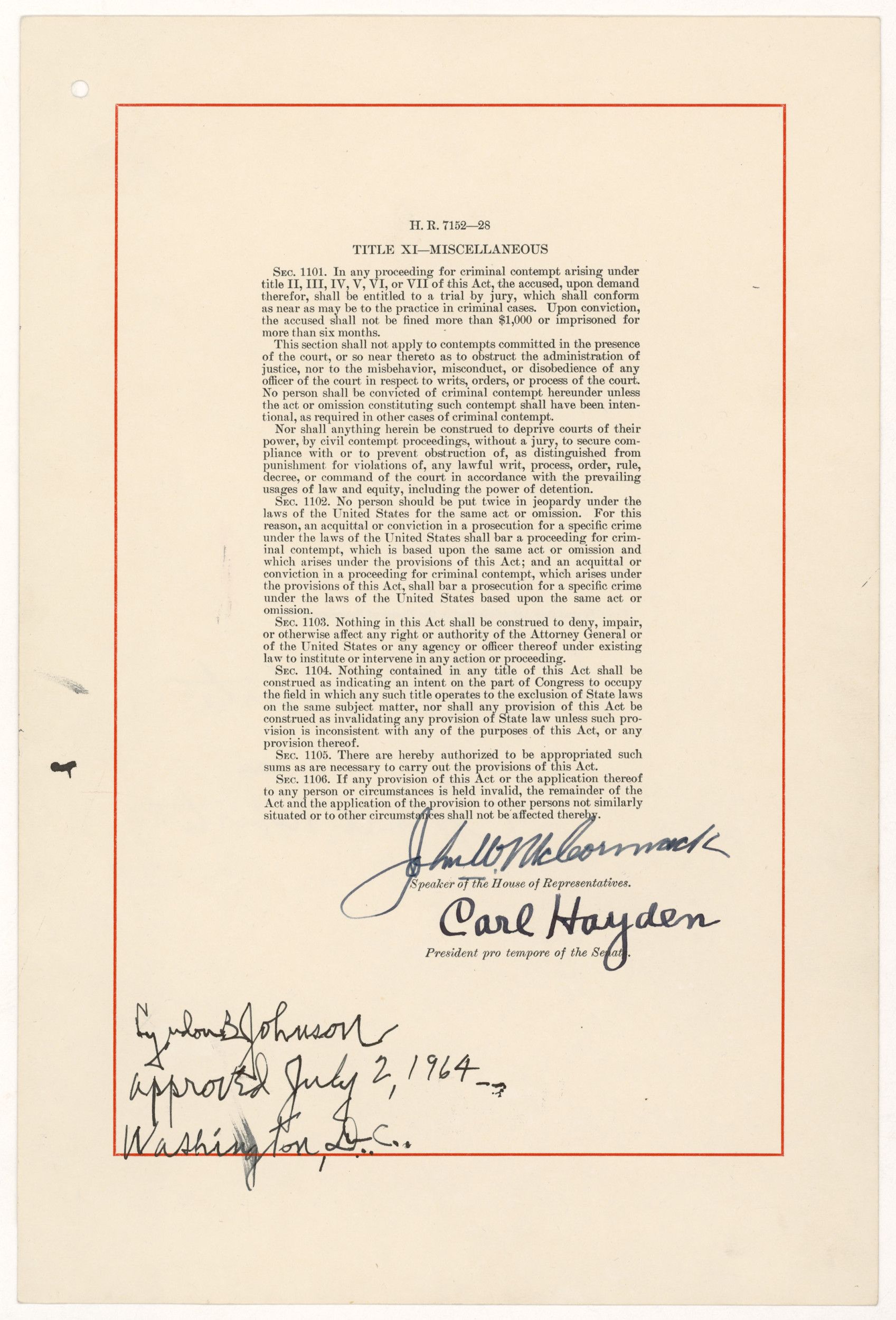
Civil Rights Act of 1964
Page 29
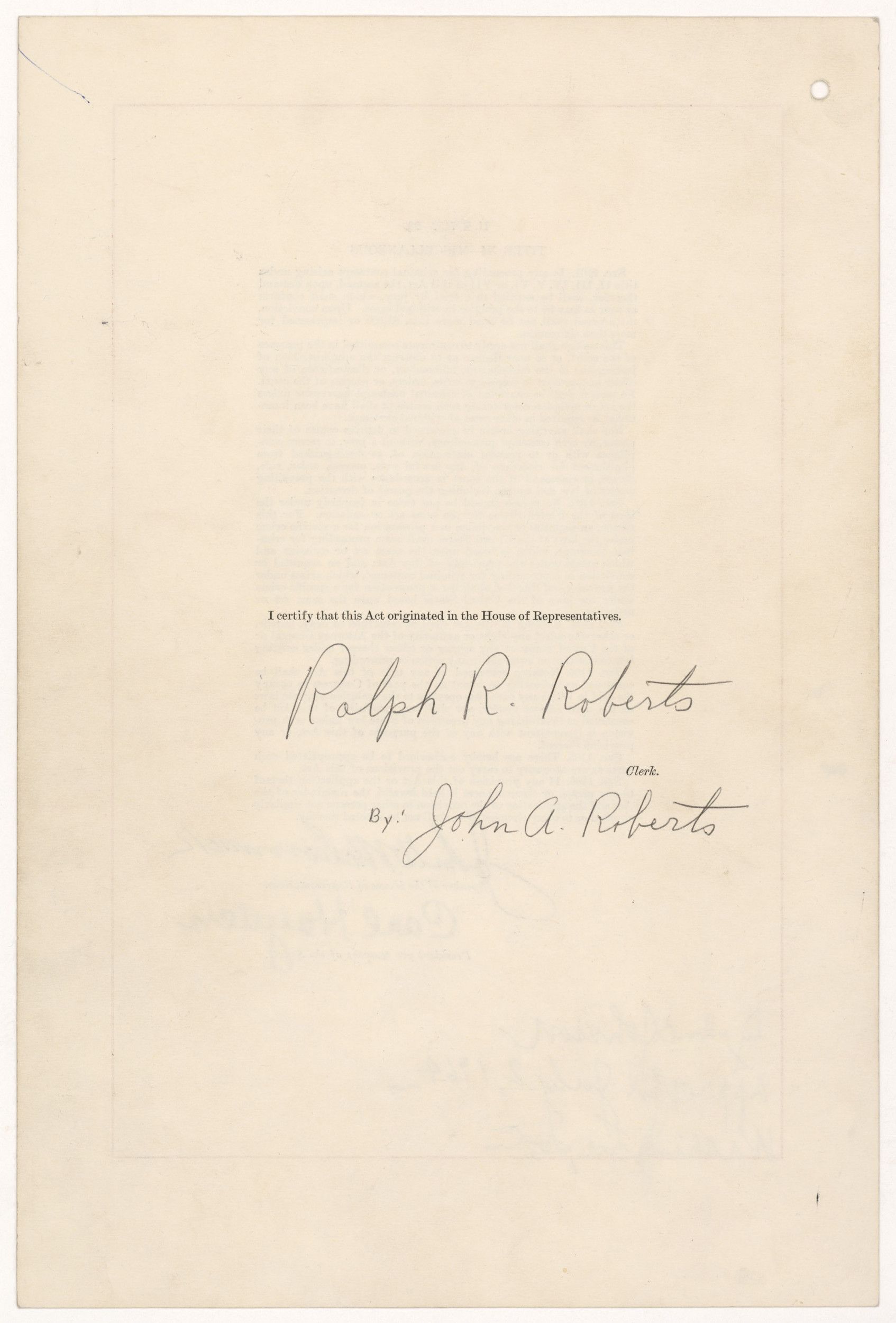
Document
Executive Order 10924 dated March 1, 1961, in which President John F. Kennedy establishes the Peace Corps
3/1/1961
On March 1, 1961, President Kennedy signed this executive order establishing the Peace Corps. On September 22, 1961, Congress approved the legislation that formally authorized the Peace Corps. Goals of the Peace Corps included: 1) helping the people of interested countries and areas meet their needs for trained workers; 2) helping promote a better understanding of Americans in countries where volunteers served; and 3) helping promote a better understanding of peoples of other nations on the part of Americans.
The founding of the Peace Corps is one of President John F. Kennedy's most enduring legacies. Yet it began in a fortuitous and unexpected moment. Kennedy, arriving late to speak to students at the University of Michigan on October 14, 1960, found himself thronged by a crowd of 10,000 students at 2 o'clock in the morning. Speaking extemporaneously, the Presidential candidate challenged American youth to devote a part of their lives to living and working in Asia, Africa, and Latin America.
Would students back his effort to form a Peace Corps? Their response was immediate: Within weeks, students organized a petition drive and gathered 1,000 signatures in support of the idea. Several hundred others pledged to serve. Enthusiastic letters poured into Democratic headquarters. This response was crucial to Kennedy's decision to make the founding of a Peace Corps a priority. Since then, hundreds of thousands of citizens of all ages and backgrounds have worked in more than 140 countries throughout the world as volunteers in such fields as health, teaching, agriculture, urban planning, skilled trades, forestry, sanitation, and technology.
By 1960 two bills had been introduced in Congress that were the direct forerunners of the Peace Corps. Representative Henry S. Reuss of Wisconsin proposed that the federal government study the idea, and Senator Hubert Humphrey of Minnesota asked for the establishment of a Peace Corps itself. These bills were not likely to pass Congress at the time, but they caught the attention of then-Senator Kennedy for several important reasons. In contrast to previous administrations, Kennedy foresaw a "New Frontier" inspired by Roosevelt's New Deal. The New Frontier envisioned programs to fight poverty, help cities, and expand governmental benefits to a wide array of Americans.
In foreign affairs, Kennedy was also more of an activist than his predecessor. He viewed the Presidency as "the vital center of action in our whole scheme of government." Concerned by what was then perceived to be the global threat of communism, Kennedy looked for creative as well as military solutions. He was eager to revitalize a program of economic aid and to counter negative images of the "Ugly American" and Yankee imperialism. He believed that sending idealistic Americans abroad to work at the grass-roots level would spread American goodwill into developing nations and help stem the growth of communism there.
Kennedy lost no time in actualizing his dream for a Peace Corps. Between his election and inauguration, he ordered Sargent Shriver, his brother-in-law, to do a feasibility study. Shriver remembered, "We received more letters from people offering to work in or to volunteer for the Peace Corps, which did not then exist, than for all other existing agencies."
Within two months of taking office, Kennedy issued an executive order establishing the Peace Corps within the State Department, using funds from mutual security appropriations. Shriver, as head of the new agency, assured its success by his fervent idealism and his willingness to improvise and take action.
To have permanency and eventual autonomy, though, the Peace Corps would have to be approved and funded by Congress. In September 1961, the 87th Congress passed Public Law 87-293 establishing a Peace Corps. By this time, because of Kennedy’s executive order and Shriver's leadership, Peace Corps volunteers were already in the field.
The founding of the Peace Corps is one of President John F. Kennedy's most enduring legacies. Yet it began in a fortuitous and unexpected moment. Kennedy, arriving late to speak to students at the University of Michigan on October 14, 1960, found himself thronged by a crowd of 10,000 students at 2 o'clock in the morning. Speaking extemporaneously, the Presidential candidate challenged American youth to devote a part of their lives to living and working in Asia, Africa, and Latin America.
Would students back his effort to form a Peace Corps? Their response was immediate: Within weeks, students organized a petition drive and gathered 1,000 signatures in support of the idea. Several hundred others pledged to serve. Enthusiastic letters poured into Democratic headquarters. This response was crucial to Kennedy's decision to make the founding of a Peace Corps a priority. Since then, hundreds of thousands of citizens of all ages and backgrounds have worked in more than 140 countries throughout the world as volunteers in such fields as health, teaching, agriculture, urban planning, skilled trades, forestry, sanitation, and technology.
By 1960 two bills had been introduced in Congress that were the direct forerunners of the Peace Corps. Representative Henry S. Reuss of Wisconsin proposed that the federal government study the idea, and Senator Hubert Humphrey of Minnesota asked for the establishment of a Peace Corps itself. These bills were not likely to pass Congress at the time, but they caught the attention of then-Senator Kennedy for several important reasons. In contrast to previous administrations, Kennedy foresaw a "New Frontier" inspired by Roosevelt's New Deal. The New Frontier envisioned programs to fight poverty, help cities, and expand governmental benefits to a wide array of Americans.
In foreign affairs, Kennedy was also more of an activist than his predecessor. He viewed the Presidency as "the vital center of action in our whole scheme of government." Concerned by what was then perceived to be the global threat of communism, Kennedy looked for creative as well as military solutions. He was eager to revitalize a program of economic aid and to counter negative images of the "Ugly American" and Yankee imperialism. He believed that sending idealistic Americans abroad to work at the grass-roots level would spread American goodwill into developing nations and help stem the growth of communism there.
Kennedy lost no time in actualizing his dream for a Peace Corps. Between his election and inauguration, he ordered Sargent Shriver, his brother-in-law, to do a feasibility study. Shriver remembered, "We received more letters from people offering to work in or to volunteer for the Peace Corps, which did not then exist, than for all other existing agencies."
Within two months of taking office, Kennedy issued an executive order establishing the Peace Corps within the State Department, using funds from mutual security appropriations. Shriver, as head of the new agency, assured its success by his fervent idealism and his willingness to improvise and take action.
To have permanency and eventual autonomy, though, the Peace Corps would have to be approved and funded by Congress. In September 1961, the 87th Congress passed Public Law 87-293 establishing a Peace Corps. By this time, because of Kennedy’s executive order and Shriver's leadership, Peace Corps volunteers were already in the field.
Transcript
Executive Order 10924ESTABLISHMENT AND ADMINISTRATION OF THE PEACE CORPS IN THE DEPARTMENT OF STATE
By virtue of the authority vested in me by the Mutual Security Act of 1954, 68 Stat. 832, as amended (22 U.S.C. 1750 et seq.), and as President of the United States, it is hereby ordered as follows:
SECTION 1. Establishment of the Peace Corps. The Secretary of State shall establish an agency in the Department of State which shall be known as the Peace Corps. The Peace Corps shall be headed by a Director.
SEC. 2. Functions of the Peace Corps. (a) The Peace Corps shall be responsible for the training and service abroad of men and women of the United States in new programs of assistance to nations and areas of the world, and in conjunction with or in support of existing economic assistance programs of the United States and of the United Nations and other international organizations.
(b) The Secretary of State shall delegate, or cause to be delegated, to the Director of the Peace Corps such of the functions under the Mutual Security Act of 1954, as amended, vested in the President and delegated to the Secretary, or vested in the Secretary, as the Secretary shall deem necessary for the accomplishment of the purposes of the Peace Corps.
SEC. 3. Financing of the Peace Corps. The Secretary of State shall provide for the flnancing of the Peace Corps with funds available
to the Secretary for the performance of functions under the Mutual Security Act of 1954, as amended.
SEC. 4. Relation to Executive Order No. 10893. This order shall not be deemed to supersede or derogate from any provision of Executive Order No. 10893 of November 8, 1960, as amended, and any delegation made by or pursuant to this order shall, unless otherwise specifioally provided therein, be deemed to be in addition to any delegation made by or pursuant to that order.
JOHN F. KENNEDY
THE WHITE HOUSE,
March 1, 1961.
This primary source comes from the General Records of the United States Government.
National Archives Identifier: 300010
Full Citation: Executive Order 10924 dated March 1, 1961, in which President John F. Kennedy establishes the Peace Corps; 3/1/1961; Executive Orders, 1862 - 2011; General Records of the United States Government, ; National Archives Building, Washington, DC. [Online Version, https://docsteach.org/documents/document/executive-order-10924, April 25, 2024]Executive Order 10924 dated March 1, 1961, in which President John F. Kennedy establishes the Peace Corps
Page 1
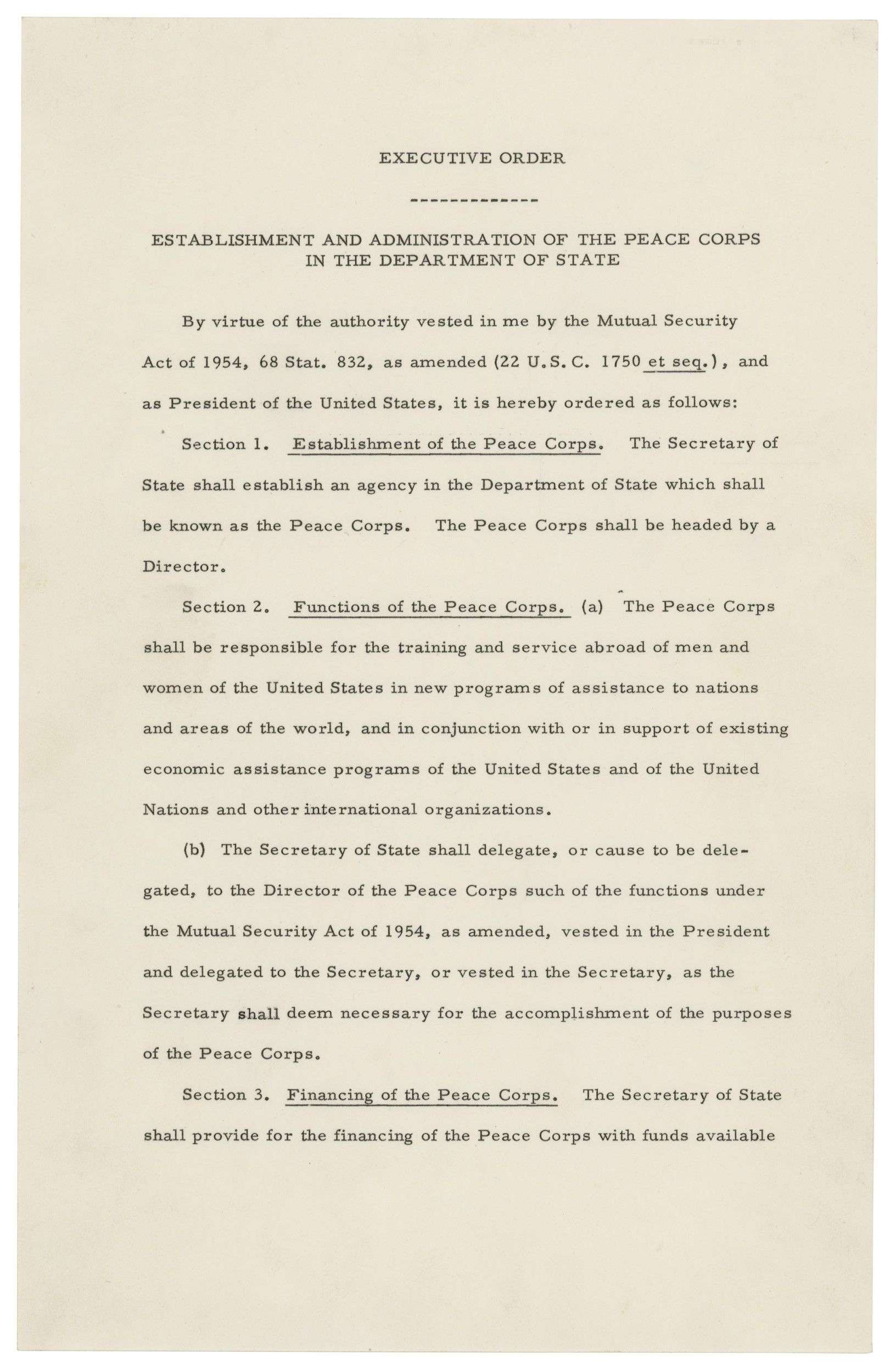
Executive Order 10924 dated March 1, 1961, in which President John F. Kennedy establishes the Peace Corps
Page 2
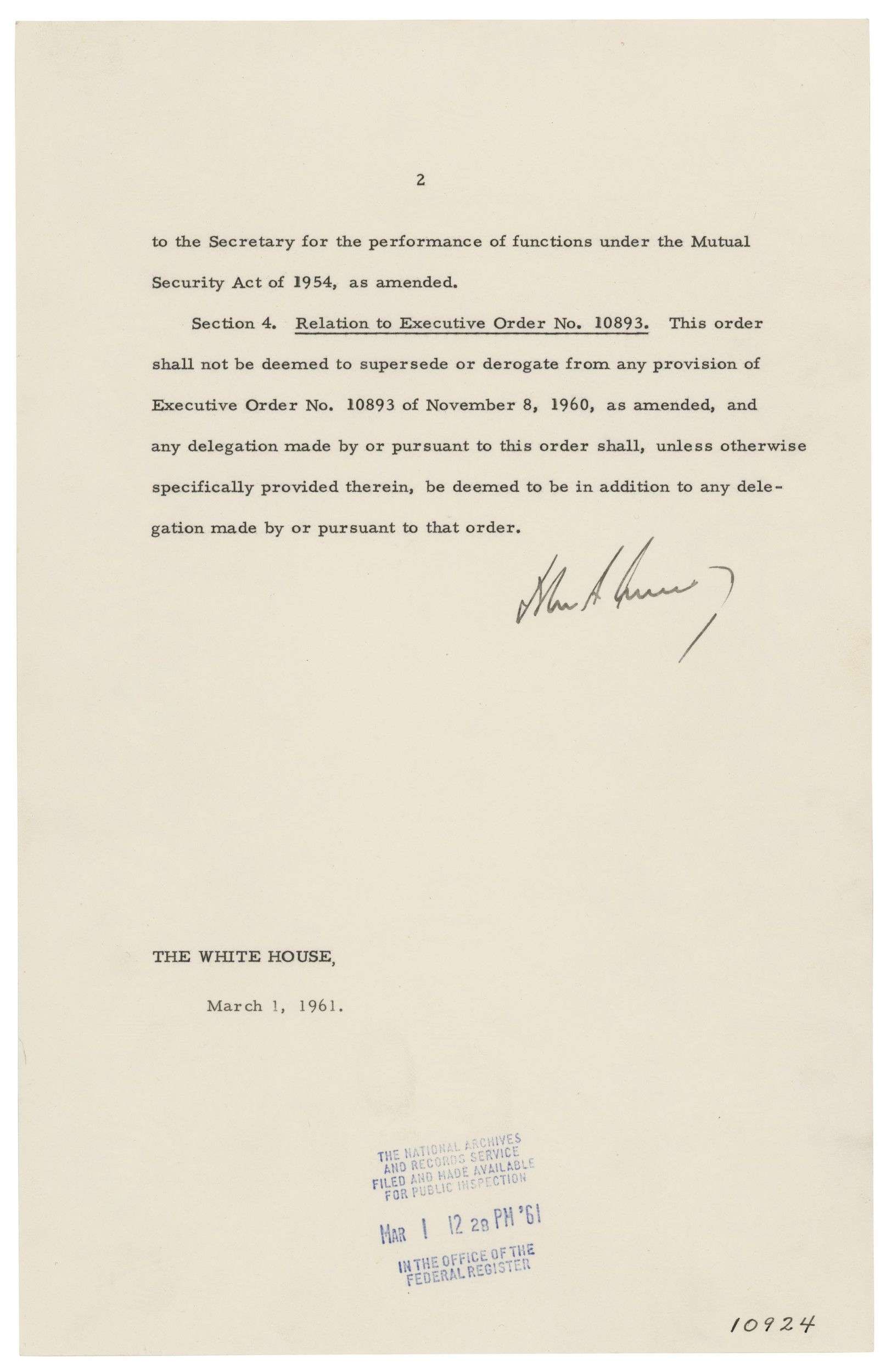
Document
Herbert Hoover Analyzes Five Periods in the Development of the History of the Depression
2/21/1933
This primary source comes from the Collection HH-FESS: Simeon D. Fess Papers.
National Archives Identifier: 187086
Full Citation: Herbert Hoover Analyzes Five Periods in the Development of the History of the Depression; 2/21/1933; Collection HH-FESS: Simeon D. Fess Papers, . [Online Version, https://docsteach.org/documents/document/herbert-hoover-analyzes-five-periods-in-the-development-of-the-history-of-the-depression, April 25, 2024]Herbert Hoover Analyzes Five Periods in the Development of the History of the Depression
Page 1
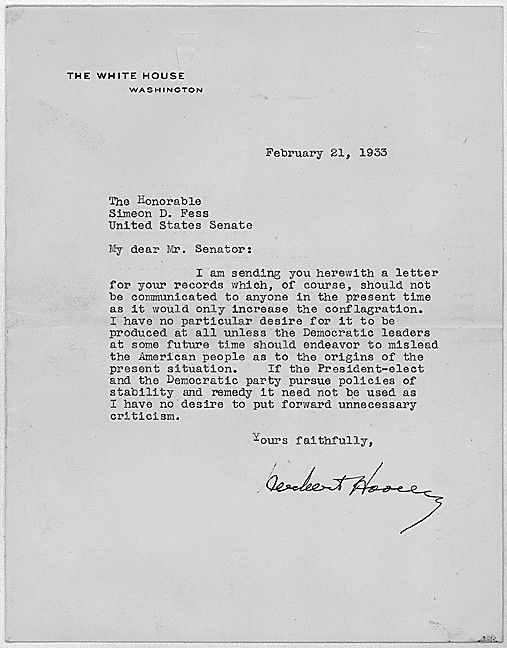
Herbert Hoover Analyzes Five Periods in the Development of the History of the Depression
Page 2
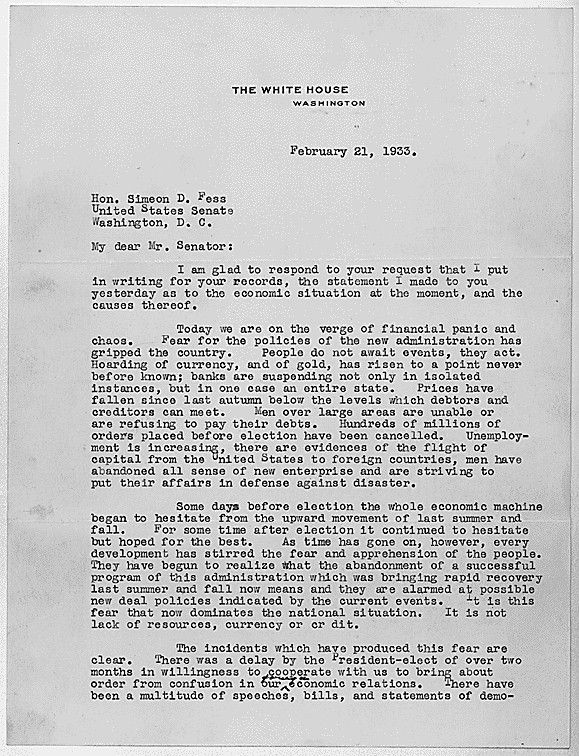
Herbert Hoover Analyzes Five Periods in the Development of the History of the Depression
Page 3
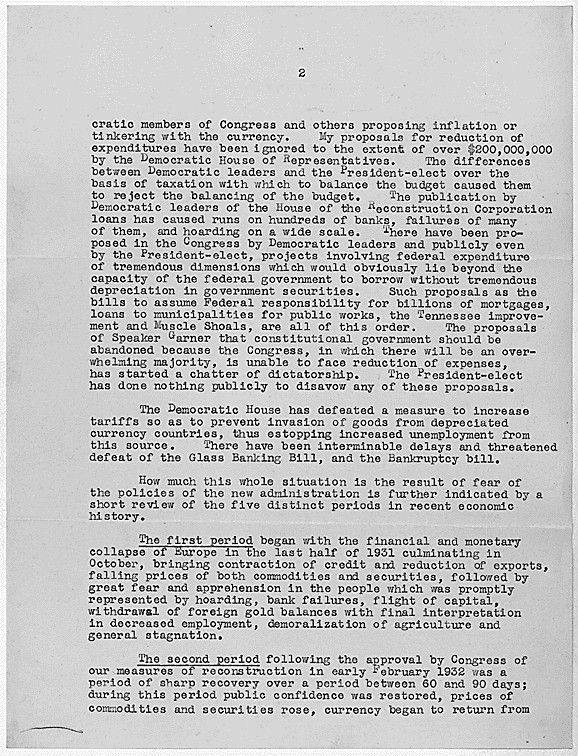
Herbert Hoover Analyzes Five Periods in the Development of the History of the Depression
Page 4
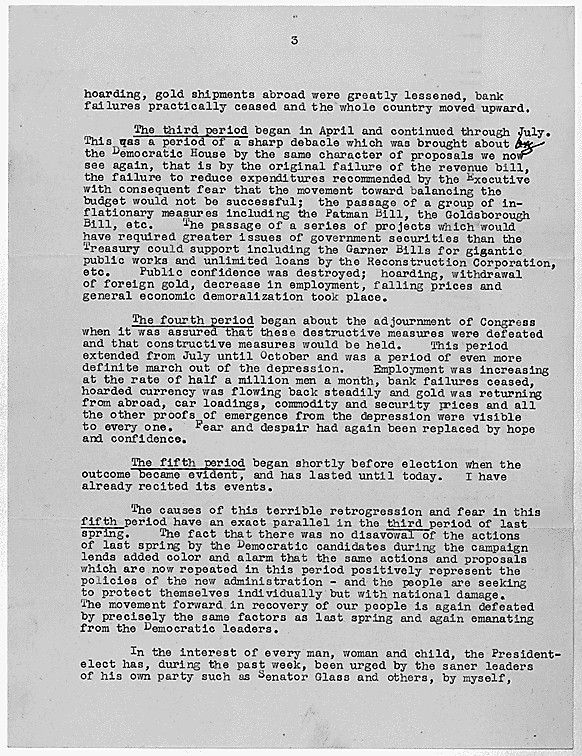
Herbert Hoover Analyzes Five Periods in the Development of the History of the Depression
Page 5
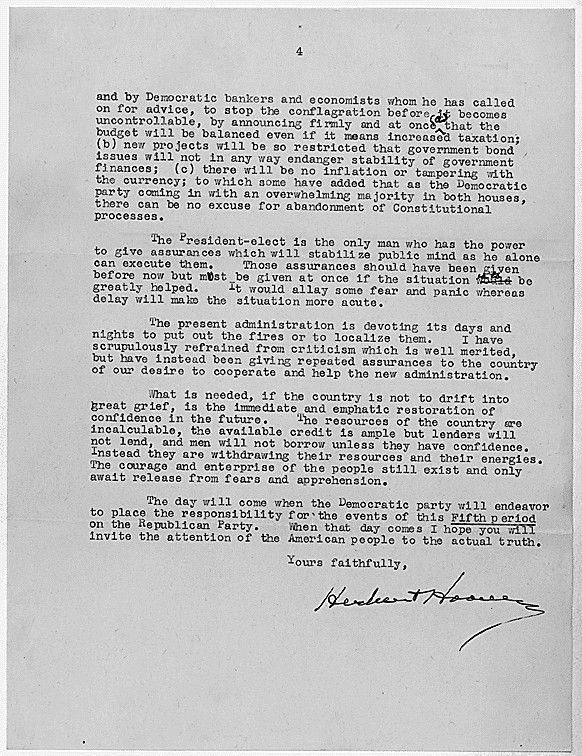
Document
Letter from Secretary of War Henry Stimson to President Harry S. Truman
4/24/1945
Secretary of War Henry Stimson wrote this letter to President Truman within two weeks of the death of President Franklin Roosevelt and Truman's swearing-in. Although Stimson does not mention it by name, the Manhattan Project is the highly secret matter he wished to discuss with the President.
Text adapted from “Connecting with the Past” in the November/December 2003 National Council for the Social Studies (NCSS) publication Social Education.
Text adapted from “Connecting with the Past” in the November/December 2003 National Council for the Social Studies (NCSS) publication Social Education.
This primary source comes from the Collection HST-CF: Confidential Files (Truman Administration).
National Archives Identifier: 4529713
Full Citation: Letter from Secretary of War Henry Stimson to President Harry S. Truman; 4/24/1945; War Department [1 of 5, 1945]; Confidential Subject Files, 1945 - 1953; Collection HST-CF: Confidential Files (Truman Administration), ; Harry S. Truman Library, Independence, MO. [Online Version, https://docsteach.org/documents/document/stimson-letter, April 25, 2024]Letter from Secretary of War Henry Stimson to President Harry S. Truman
Page 2
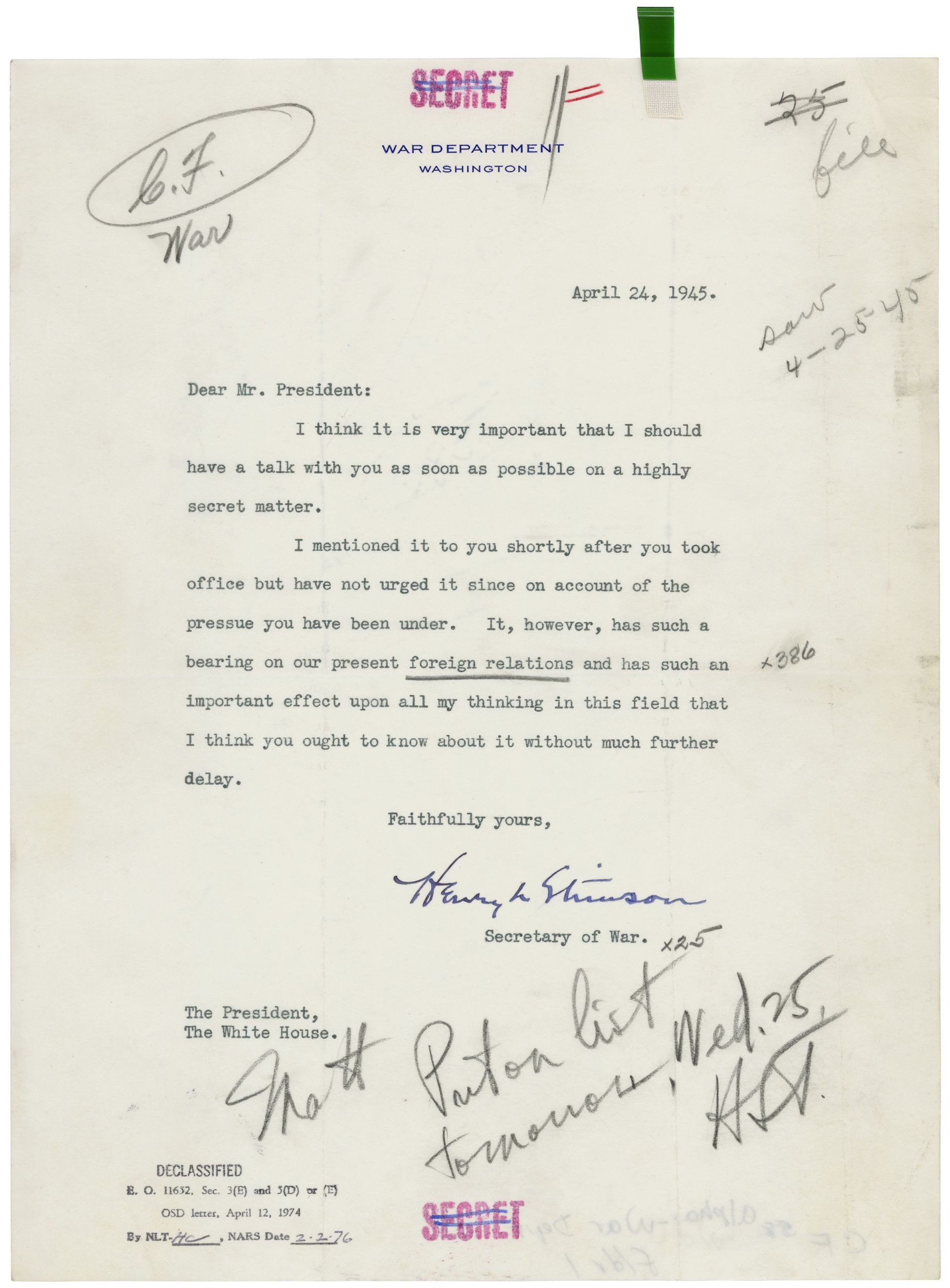
Document
Menu from Dinner Given During President Nixon's Visit to Peking, China
2/1972
This menu was printed for a formal dinner hosted by President Richard Nixon and Mrs. Nixon for Chinese Premier Chou En-lai during the President’s trip to Beijing in February 1972. The formal visit launched improved relations between the United States and China after decades of the Cold War.
This primary source comes from the Collection RN-SMOF: White House Staff Member and Office Files (Nixon Administration).
National Archives Identifier: 595300
Full Citation: Menu from Dinner Given During President Nixon's Visit to Peking, China; 2/1972; Collection RN-SMOF: White House Staff Member and Office Files (Nixon Administration), . [Online Version, https://docsteach.org/documents/document/menu-nixon-china, April 25, 2024]Menu from Dinner Given During President Nixon's Visit to Peking, China
Page 1

Document
Message to President Bill Clinton from Senator John Glenn
11/6/1998
On February 20, 1962, John Glenn became the first American to orbit the earth. In 1998, he returned to space at the age of 77, aboard the space shuttle Discovery. In the 36 years since his first orbit, both spacecraft and communication technology had advanced significantly – Senator Glenn could now communicate with the president via email directly from space.
This primary source comes from the Collection NLMS-0001: William J. Clinton Presidential Records.
National Archives Identifier: 595136
Full Citation: Message to President Bill Clinton from Senator John Glenn; 11/6/1998; Automated Records Management System (ARMS) Email from the White House Office (WHO) Bucket, 1/20/1993 - 1/20/1993; Collection NLMS-0001: William J. Clinton Presidential Records, ; William J. Clinton Library, Little Rock, AR. [Online Version, https://docsteach.org/documents/document/email-john-glenn, April 25, 2024]Message to President Bill Clinton from Senator John Glenn
Page 1
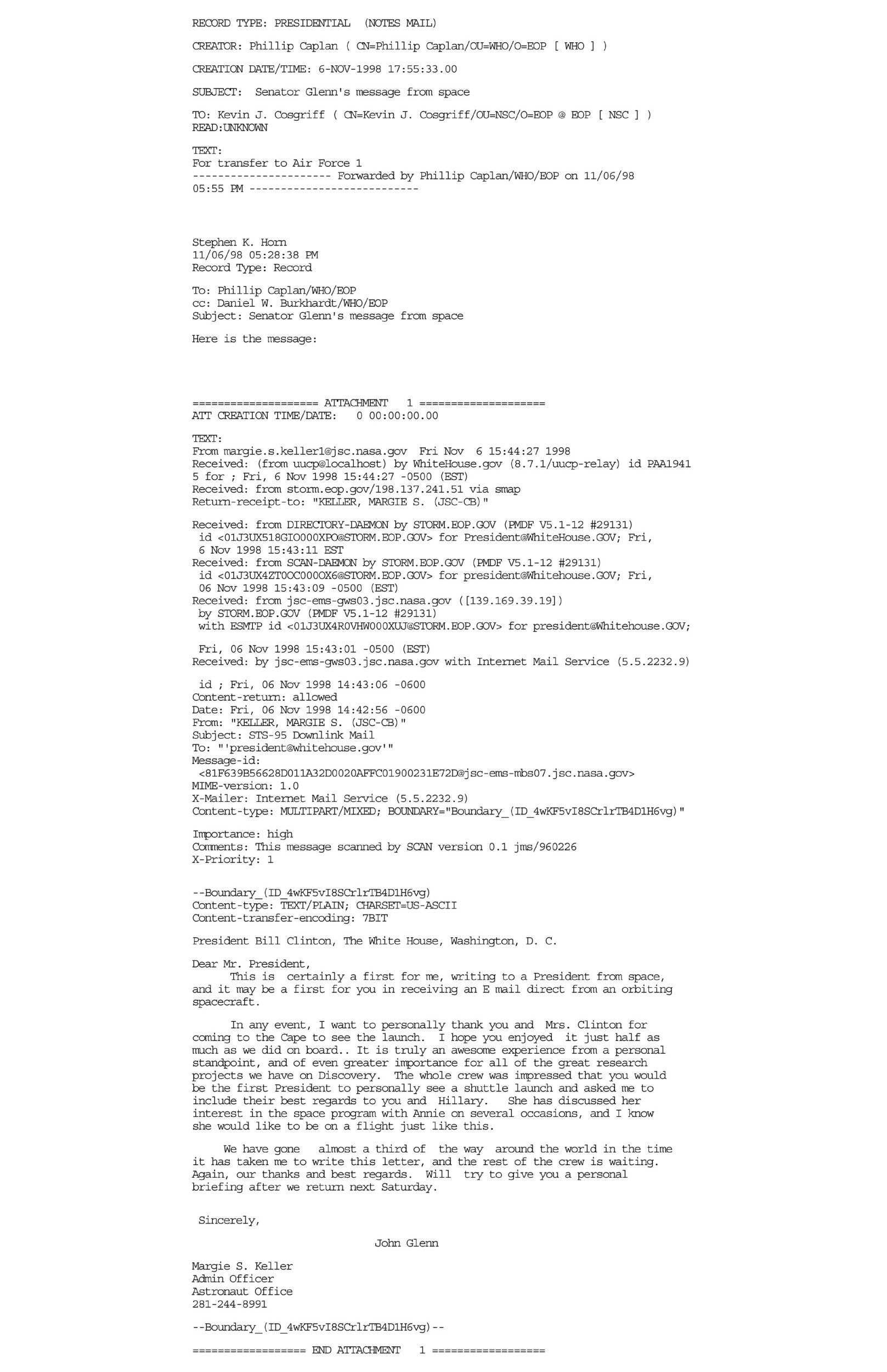
Document
President Dwight D. Eisenhower's Farewell Address
1/17/1961
President Dwight D. Eisenhower gave this radio and television farewell address from the White House at the end of his second term. With the Cold War arms race in mind, he warned the nation against the establishment of a "military-industrial complex." This is his reading copy.
In a speech of less than 10 minutes, Eisenhower delivered his political farewell to the American people on national television from the Oval Office of the White House. Those who expected the military leader and hero of World War II to depart his Presidency with a nostalgic, "old soldier" speech like Gen. Douglas MacArthur's, were surprised at his strong warnings about the dangers of the "military-industrial complex."
As President of the United States for two terms, Eisenhower had slowed the push for increased defense spending, despite pressure to build more military equipment during the Cold War’s arms race. Nonetheless, the American military services and the defense industry had expanded a great deal in the 1950s. Eisenhower thought this growth was needed to counter the Soviet Union, but it confounded him. Through he did not say so explicitly, his standing as a military leader helped give him the credibility to stand up to the pressures of this new, powerful interest group. He eventually described it as a necessary evil.
He said:
In a speech of less than 10 minutes, Eisenhower delivered his political farewell to the American people on national television from the Oval Office of the White House. Those who expected the military leader and hero of World War II to depart his Presidency with a nostalgic, "old soldier" speech like Gen. Douglas MacArthur's, were surprised at his strong warnings about the dangers of the "military-industrial complex."
As President of the United States for two terms, Eisenhower had slowed the push for increased defense spending, despite pressure to build more military equipment during the Cold War’s arms race. Nonetheless, the American military services and the defense industry had expanded a great deal in the 1950s. Eisenhower thought this growth was needed to counter the Soviet Union, but it confounded him. Through he did not say so explicitly, his standing as a military leader helped give him the credibility to stand up to the pressures of this new, powerful interest group. He eventually described it as a necessary evil.
He said:
A vital element in keeping the peace is our military establishment. Our arms must be might, ready for instant action, so that no potential aggressor may be tempted to risk his own destruction....American makers of plowshares could, with time and as required, make swords as well. But now we can no longer risk emergency improvisation of national defense; we have been compelled to create a permanent armaments industry of vast proportions....This conjunction of an immense military establishment and a large arms industry is new in the American experience....Yet we must not fail to comprehend its grave implications....In the councils of government, we must guard against the acquisition of unwarranted influence, whether sought or unsought, by the military-industrial complex. The potential for the disastrous rise of misplaced power exists and will persist.The end of Eisenhower’s term as President not only marked the end of the 1950s but also the end of an era in government. A new, younger generation was rising to national power that would set a more youthful, vigorous course. His farewell address was a warning to his successors of one of the many things they would have to be wary of in the coming years.
Transcript
[handwritten] Good evening –MY FELLOW AMERICANS
FIRST, I should like to [“must” crossed out] express my gratitude to the radio and television networks [“of the nation” crossed out] for the opportunities they have given me, over the years, to bring reports and [“special” crossed out] messages to our nation [“people” crossed out].
My special thanks go to them for the privilege [“opportunity” crossed out] of addressing you this evening.
[handwritten paragraph crossed out]
MY FELLOW AMERICANS
THREE DAYS from now, after half a century in the service of our country, I shall lay down the responsibilities of office as, in traditional and solemn ceremony, the authority of the Presidency is vested in my successor.
THIS EVENING I come to you with a message of leave-taking and farewell, and to share a few final thoughts with you, my countrymen.
2
LIKE EVERY OTHER CITIZEN, I wish the new President, and all who will labor with him, Godspeed.
I pray that the coming years will be blessed with peace and prosperity for all.
*****
OUR PEOPLE expect their President and the Congress to find essential agreement on issues of great moment, the wise resolution of which will better shape the future of the Nation.
3.
MY OWN RELATIONS with the Congress, which began on a remote and tenuous basis when, long ago, a member of the Senate appointed me to West Point, have since ranged to the intimate during the war and immediate post-war period, and, finally, to the mutually interdependent during these past eight years.
4
IN THIS FINAL RELATIONSHIP, the Congress and the Administration have, on most vital issues, cooperated well, to serve the national good rather than mere partisanship, and so have assured that the business of the Nation should go forward.
So, my official relationship with the Congress ends in a feeling, on my part, of gratitude that we have been able to do so much together.
*****
WE NOW STAND ten years past the midpoint of a century that has witnessed four major wars among great nations.
5
Three of these involved our own country.
Despite these holocausts America is today the strongest, the most influential and most productive nation in the world.
Understandably proud of this pre-eminence, we yet realize that America's leadership and prestige depend, not merely upon our unmatched material progress, riches and military strength, but on how we use our power in the interests of world peace and human betterment.
*****
6
THROUGHOUT the many decades of AMERICA'S ADVENTURE in free government, our basic purposes have been to keep the peace; to foster progress in human achievement, and to enhance liberty, dignity and integrity among people and among nations.
To strive for less would be unworthy of a free and religious people.
And Any failure traceable to arrogance, or our [illegible] lack of comprehension or readiness to sacrifice would inflict upon us grievous hurt both at home and abroad.
7
PROGRESS TOWARD THESE noble goals is persistently threatened by the conflict now engulfing the world.
It commands our whole attention, absorbs our very beings.
We face a hostile ideology -- global in scope, atheistic in character, ruthless in purpose, and insidious in method.
Unhappily the danger it poses promises to be of indefinite duration.
8
To meet it successfully, there is called for, not so much the emotional and transitory sacrifices of crisis, but rather those which enable us to carry forward steadily, surely, and without complaint the burdens of a prolonged and complex struggle --with liberty the stake!!!
ONLY THUS SHALL we remain, despite every provocation, on our charted course toward permanent peace and human betterment.
9
CRISES there will continue to be.
In meeting them, whether foreign or domestic, great or small, there is a recurring temptation to feel that some spectacular and costly action could become the miraculous solution to all current difficulties.
A huge increase in newer elements of our defense; development of unrealistic programs to cure every ill in agriculture; a dramatic expansion in basic and applied research -- these and many other possibilities, (each possibly promising in itself,) may be suggested as the only way to the road we wish to travel.
10
BUT EACH PROPOSAL must be weighed in the light of a broader consideration: the need to maintain balance in and among national programs -- balance between the private and the public economy; balance between cost and hoped for advantage; balance between the clearly necessary and the comfortably desirable; balance between our essential requirements as a nation and the duties imposed by the nation upon the individual; balance between actions of the moment and the national welfare of the future.
11
Good judgment seeks balance and progress; lack of it eventually finds imbalance and frustration.
THE RECORD of many long years [“decades” crossed out] stands as proof that our people and their government have, in the main, understood these truths and have responded to them well, in the face of stress and threat.
But threats, new in kind or degree, constantly arise.
I mention two only.
*****
12
A VITAL ELEMENT in keeping the peace is our military establishment.
Our arms must be mighty, ready for instant action, so that no potential aggressor may be tempted to risk his own destruction.
OUR MILITARY ORGANIZATION today bears little relation to that known by any of my predecessors in peacetime, or indeed by the fighting men of World War II or Korea.
UNTIL THE LATEST of our world conflicts, the United States had no armaments industry.
13
AMERICAN MAKERS of plowshares could, with time and as required, make swords as well.
But now we can no longer risk emergency improvisation of national defense; we have been compelled to create a permanent armaments industry of vast proportions.
Added to this, three and a half million men and women are directly engaged in the defense establishment.
WE ANNUALLY spend on military security more than the net income of all United States corporations.
14
THIS CONJUNCTION of an immense military establishment and a large arms industry is new in the American experience.
The total influence -- economic, political, even spiritual -- is felt in every city, every State house, every office of the Federal government.
We recognize the imperative need for this development.
Yet we must not fail to comprehend its grave implications.
Our toil, resources and livelihood are all involved; so is the very structure of our society.
15
IN THE COUNCILS of government, we must guard against the acquisition of unwarranted influence, whether sought or unsought, by the military-industrial complex.
The potential for the disastrous rise of misplaced power exists and will persist.
WE MUST NEVER let the weight of this combination endanger our liberties or democratic processes.
We should take nothing for granted.
16
Only an alert and knowledgeable citizenry can compel the proper meshing of the huge industrial and military machinery of defense with our peaceful methods and goals, so that security and liberty may prosper together.
AKIN TO, and largely responsible for the sweeping changes in our industrial-military posture, has been the technological revolution during recent decades.
IN THIS REVOLUTION, research has become central; it also becomes more formalized, complex, and costly.
17
A steadily increasing share is conducted for, by, or at the direction of, the Federal government.
TODAY, the solitary inventor, tinkering in his shop, has been overshadowed by task forces of scientists in laboratories and testing fields.
In the same fashion, the free university, historically the fountainhead of free ideas and scientific discovery, has experienced a revolution in the conduct of research.
Partly because of the giant [“huge” crossed out] costs involved, a government contract becomes virtually a substitute for intellectual curiosity.
18
For every old blackboard there are now hundreds of new electronic computers.
THE PROSPECT of domination of the nation's scholars by Federal employment, project allocations, and the power of money is ever present -- and is gravely to be regarded.
YET, in holding scientific research and discovery in respect, as we should, we must also be alert to the equal and opposite danger that public policy could itself become the captive of a scientific-technological elite.
19
IT IS THE TASK of statesmanship to mold, to balance, and to integrate these and other forces, new and old, within the principles of our democratic system -- ever aiming toward the supreme goals of our free society.
*****
ANOTHER FACTOR in maintaining balance involves the element of time.
As we peer into society's future, we -- you and I, and our government -- must avoid the impulse to live only for today, plundering, for our own ease and convenience, the precious resources of tomorrow.
20
We cannot mortgage the material assets of our grandchildren without risking the loss also of their political and spiritual heritage.
We want democracy to survive for all generations to come, not to become the insolvent phantom of tomorrow.
****
DOWN THE LONG LANE of the history yet to be written, America knows that this world of ours, ever growing smaller, must avoid becoming a community of dreadful fear and hate, and be, instead, a proud confederation of mutual trust and respect.
21
SUCH A CONFEDERATION must be one of equals.
The weakest must come to the conference table with the same confidence as do we, protected as we are by our moral, economic, and military strength.
That table, though scarred by many past frustrations, cannot be abandoned for the certain agony of the battlefield.
DISARMAMENT, with mutual honor and confidence, is a continuing imperative.
22
Together, we must learn how to compose differences, not with arms, but with intellect and decent purpose.
Because this need is so sharp and apparent I confess that I lay down my official responsibilities in this field with a definite sense of disappointment.
As one who has witnessed the horror and the lingering sadness of war -- as one who knows that another war could utterly destroy this civilization which has been so slowly and painfully built over thousands of years -- I wish I could say tonight that a lasting peace is in sight.
23
HAPPILY, I can say that war has been avoided.
Steady progress toward our ultimate goal has been made.
But, so much remains to be done!
As a private citizen, I shall never cease to do what little I can to help the world advance along that road.
****
SO -- in this my last good night to you as your President -- I thank you for the many opportunities you have given me for public service in war and peace.
24
I trust that in that service you find some things worthy; as for the rest of it, I know you will find ways to improve performance in the future.
YOU AND I -- my fellow citizens -- need to be strong in our faith that all nations, under God, will one day reach the goal of peace with justice.
May we be ever unswerving in devotion to principle, confident but humble with power, diligent in pursuit of the Nation's great goals.
25
TO ALL THE PEOPLES OF THE WORLD, I once more give expression to America's prayerful and continuing aspiration:
We pray that peoples of all faiths, all races, all nations, may have their great human needs satisfied; that those now denied opportunity shall come to enjoy it to the full; that all who yearn for freedom may experience its spiritual blessings; that those who have freedom will understand, also, its heavy responsibilities; that all who are insensitive to the needs of others will learn charity;
26
that the scourges of poverty, disease and ignorance will be made to disappear from the earth, and that, in the goodness of time, all peoples will come to live together in a peace guaranteed by the binding force of mutual respect and love.
[handwritten]
# #
Now – on Friday noon I am to become a private citizen of the U.S.
I am proud to do so.
Thank you –
And Goodnight
This primary source comes from the Collection DDE-EPRES: Eisenhower, Dwight D.: Papers as President of the United States.
National Archives Identifier: 594599
Full Citation: President Dwight D. Eisenhower's Farewell Address; 1/17/1961; Final TV Talk - January 17, 1961 (1); Speech Files, 1953 - 1961; Collection DDE-EPRES: Eisenhower, Dwight D.: Papers as President of the United States, ; Dwight D. Eisenhower Library, Abilene, KS. [Online Version, https://docsteach.org/documents/document/eisenhowers-farewell-address, April 25, 2024]President Dwight D. Eisenhower's Farewell Address
Page 1
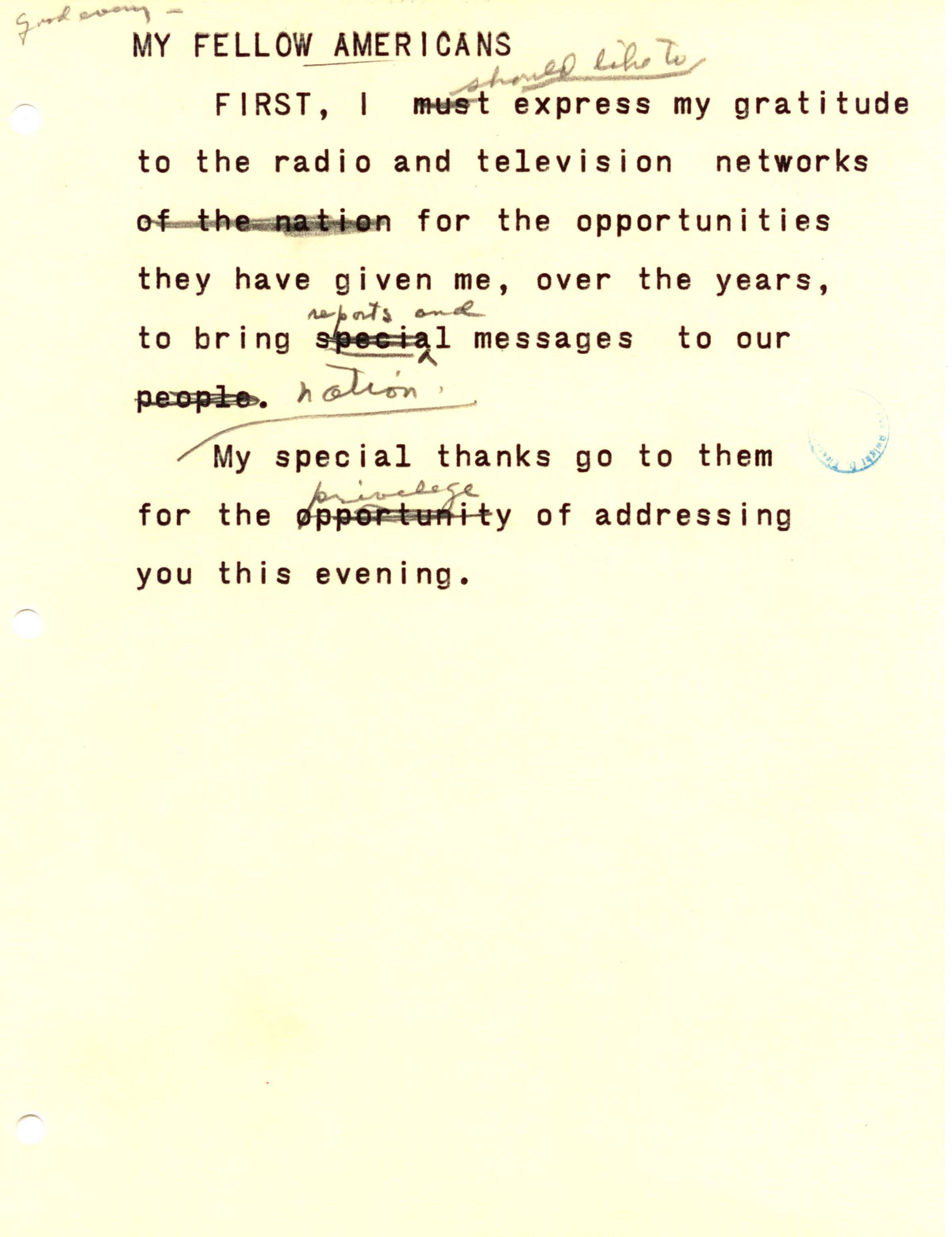
President Dwight D. Eisenhower's Farewell Address
Page 2
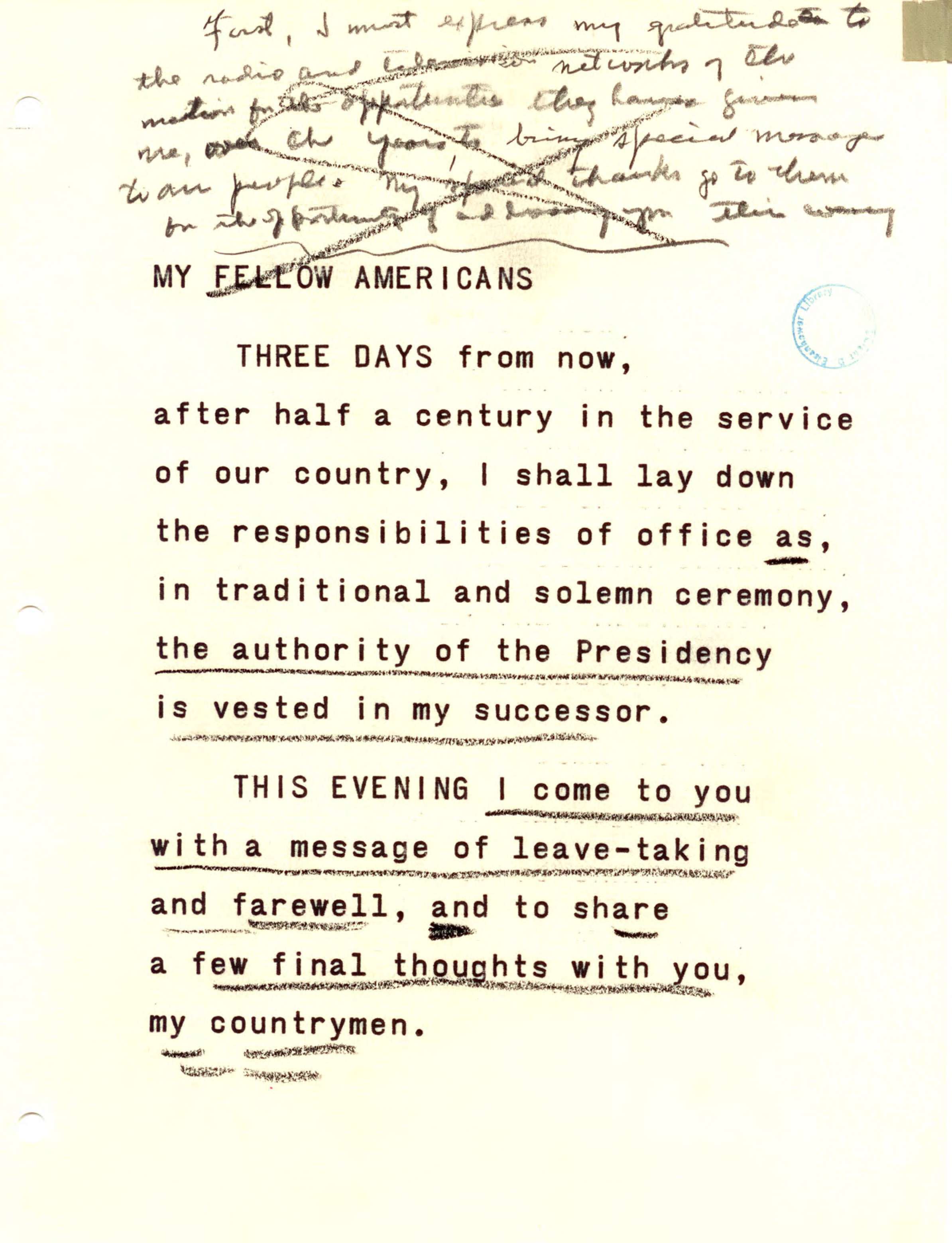
President Dwight D. Eisenhower's Farewell Address
Page 3
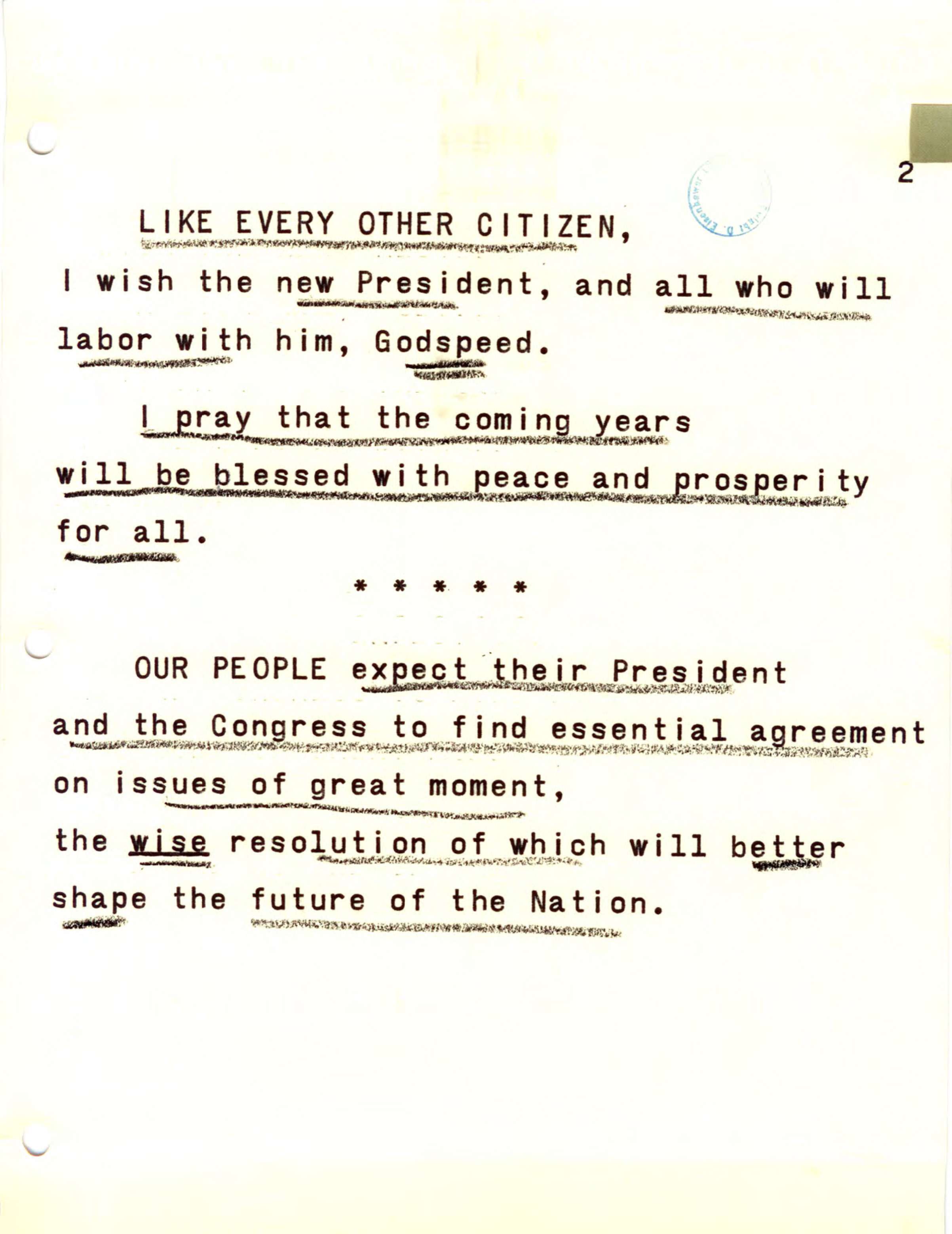
President Dwight D. Eisenhower's Farewell Address
Page 4
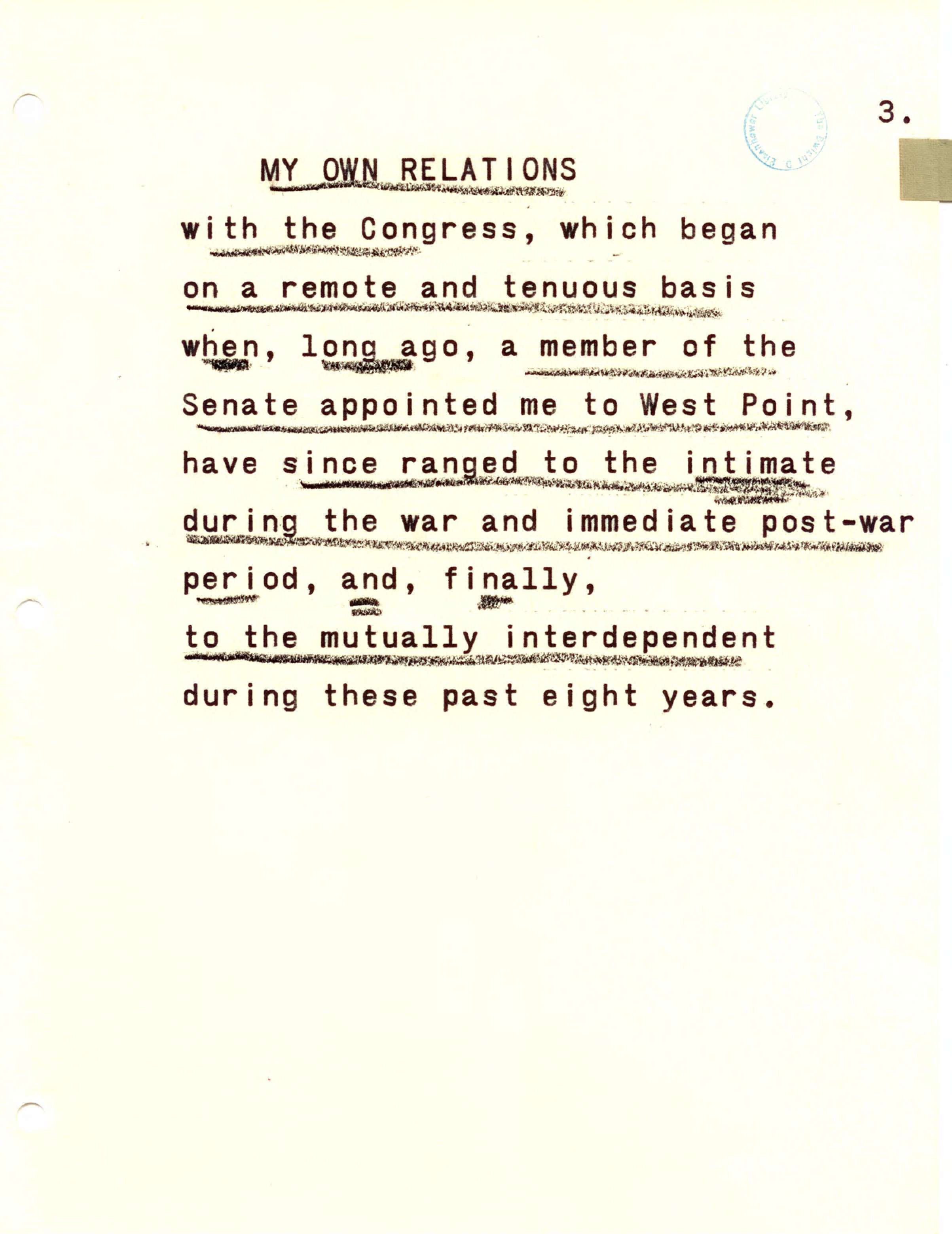
President Dwight D. Eisenhower's Farewell Address
Page 5
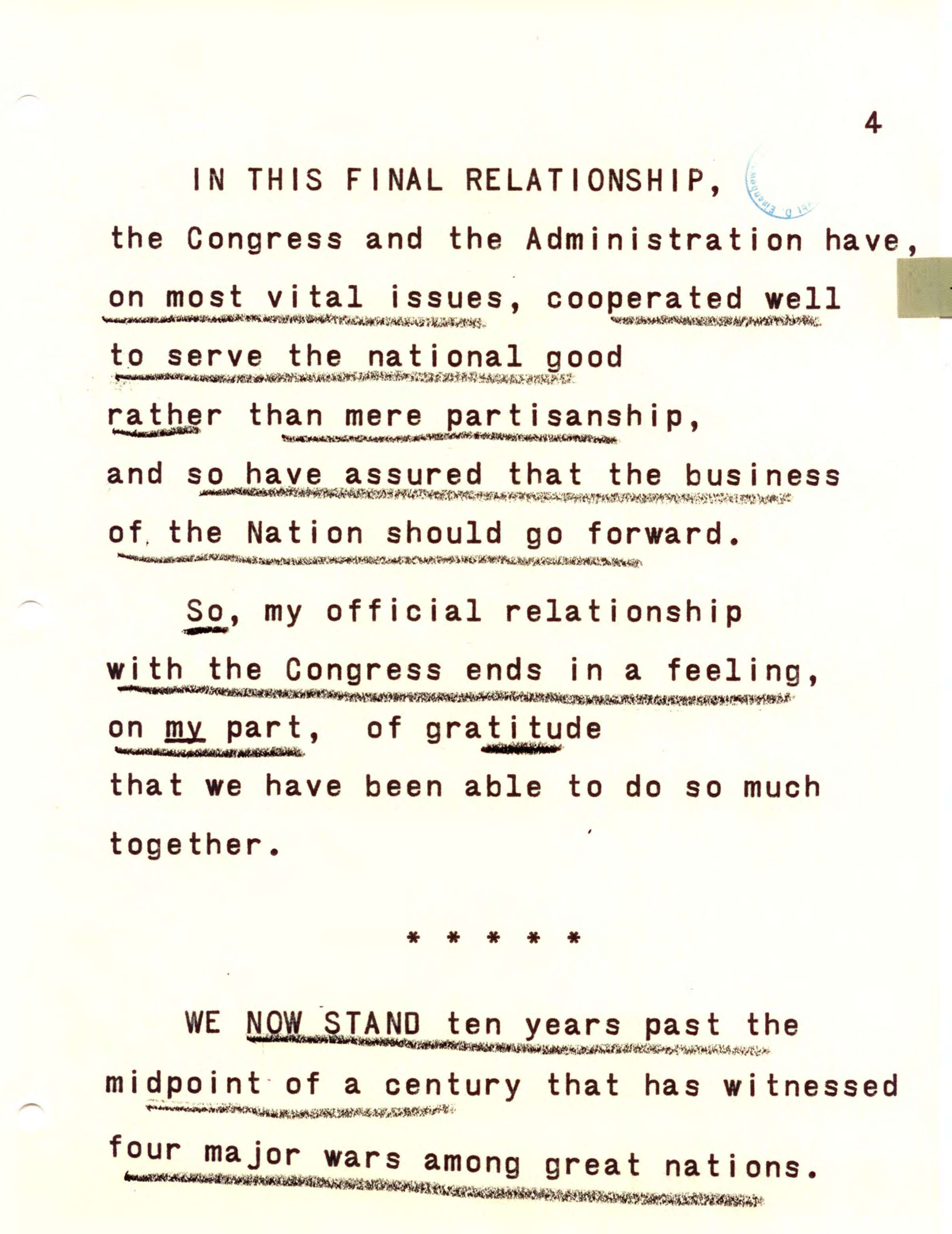
President Dwight D. Eisenhower's Farewell Address
Page 6
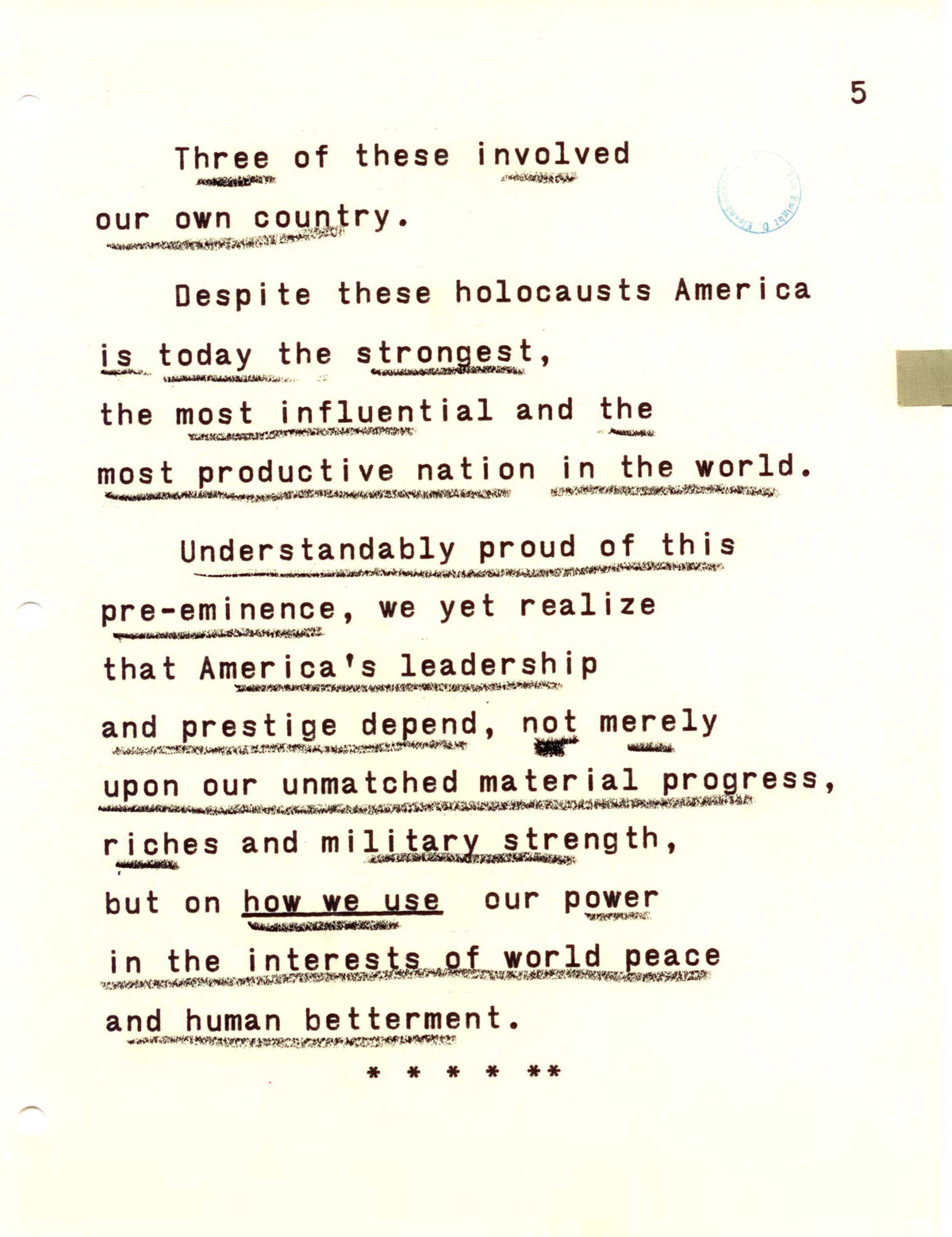
President Dwight D. Eisenhower's Farewell Address
Page 7
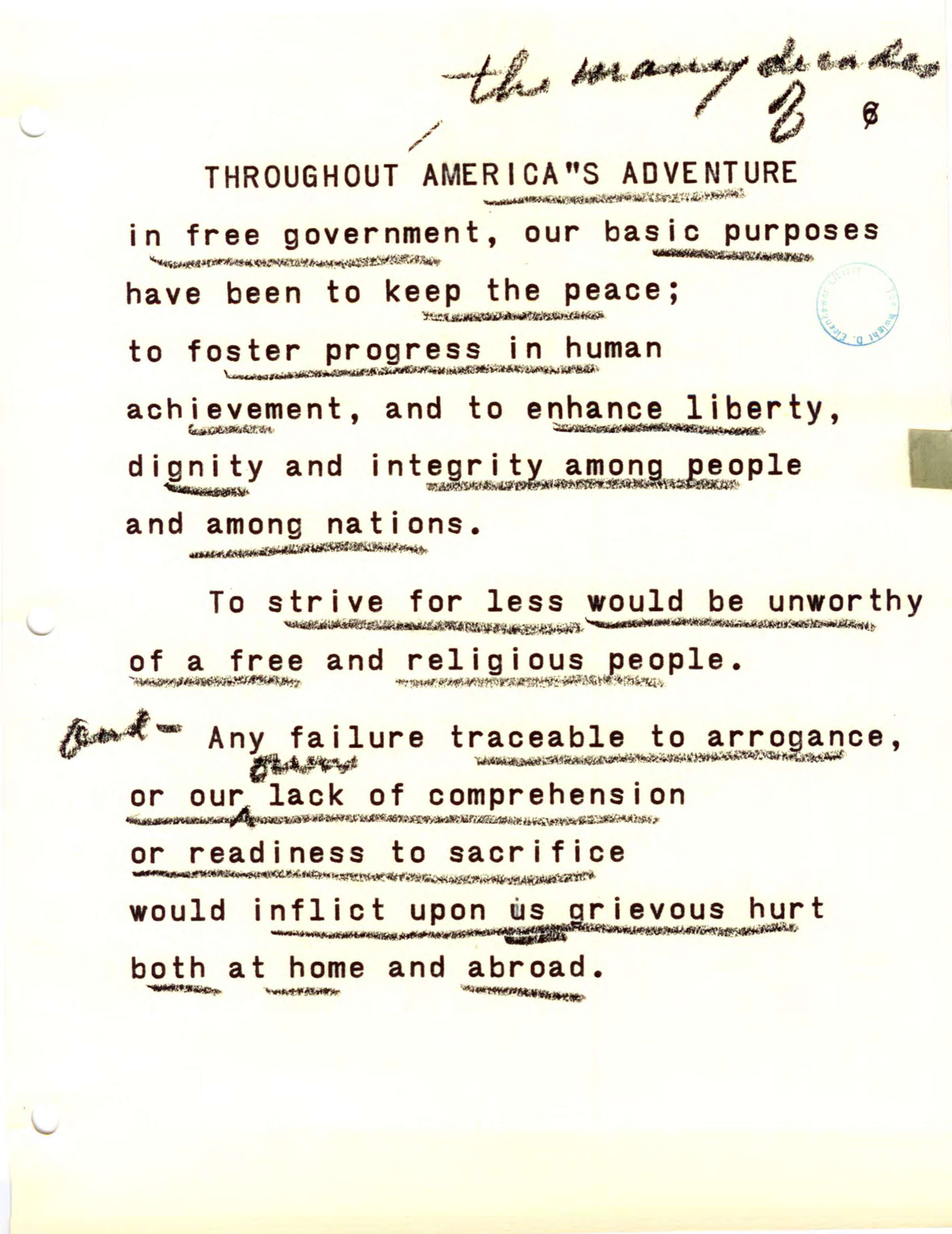
President Dwight D. Eisenhower's Farewell Address
Page 8
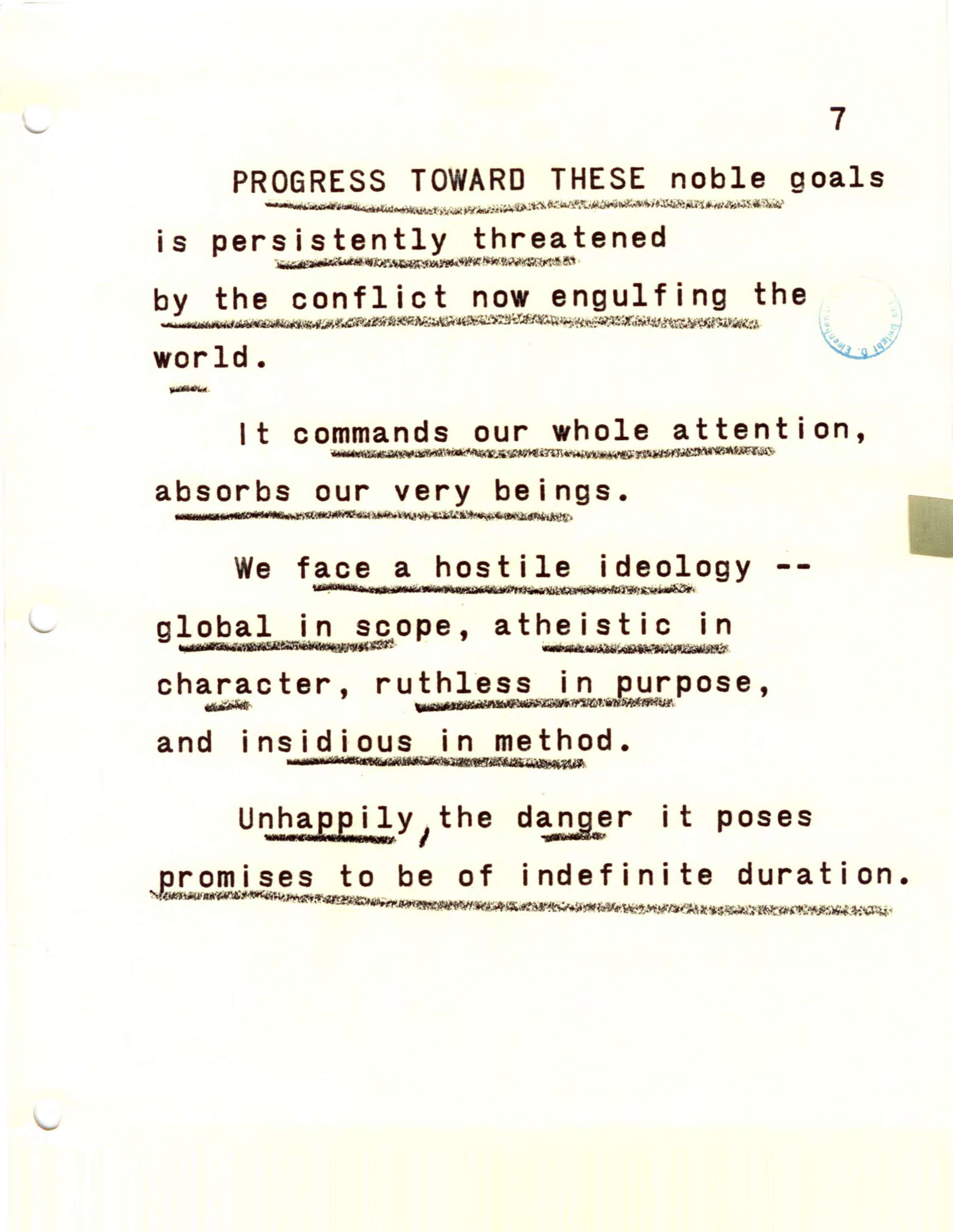
President Dwight D. Eisenhower's Farewell Address
Page 9
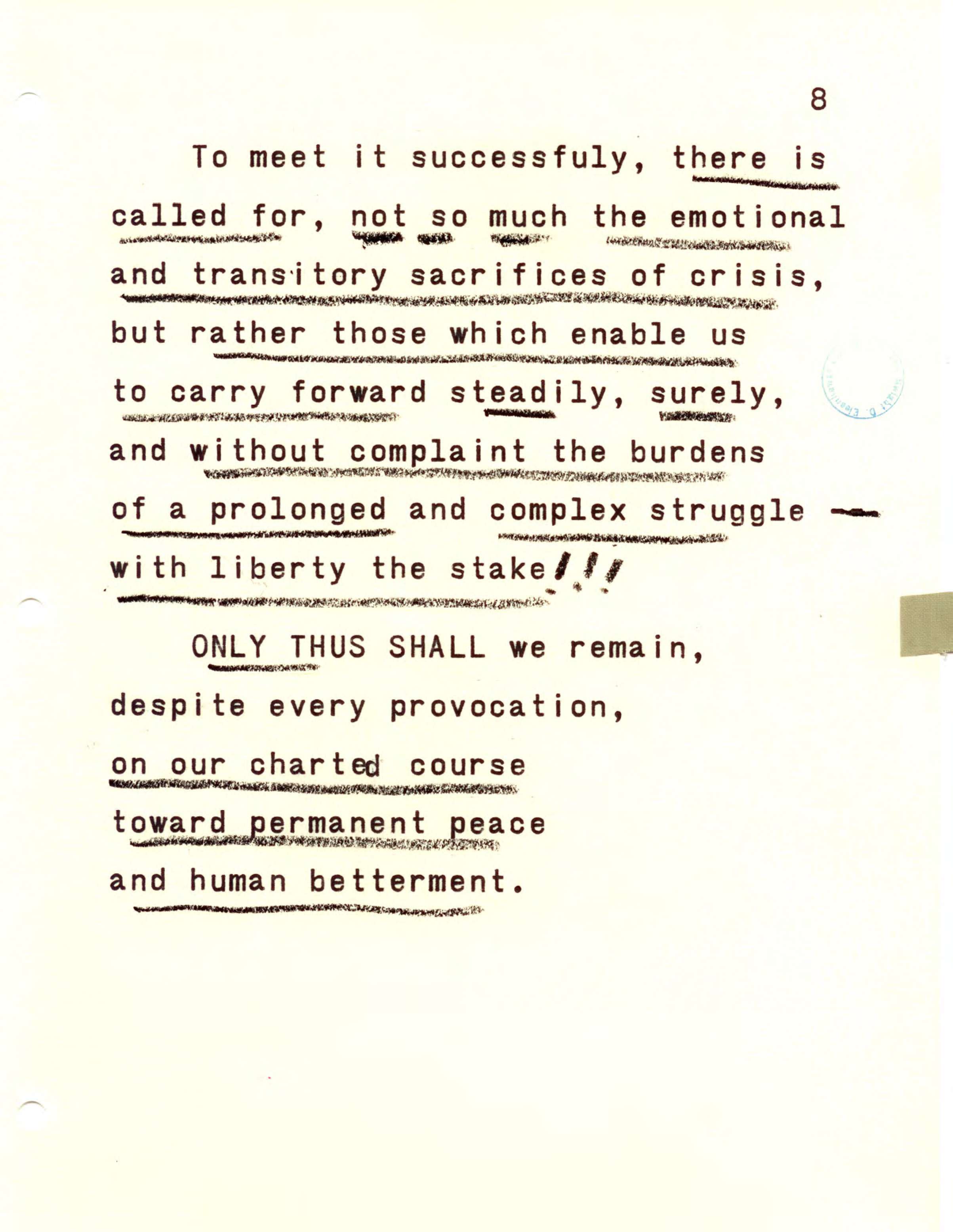
President Dwight D. Eisenhower's Farewell Address
Page 10
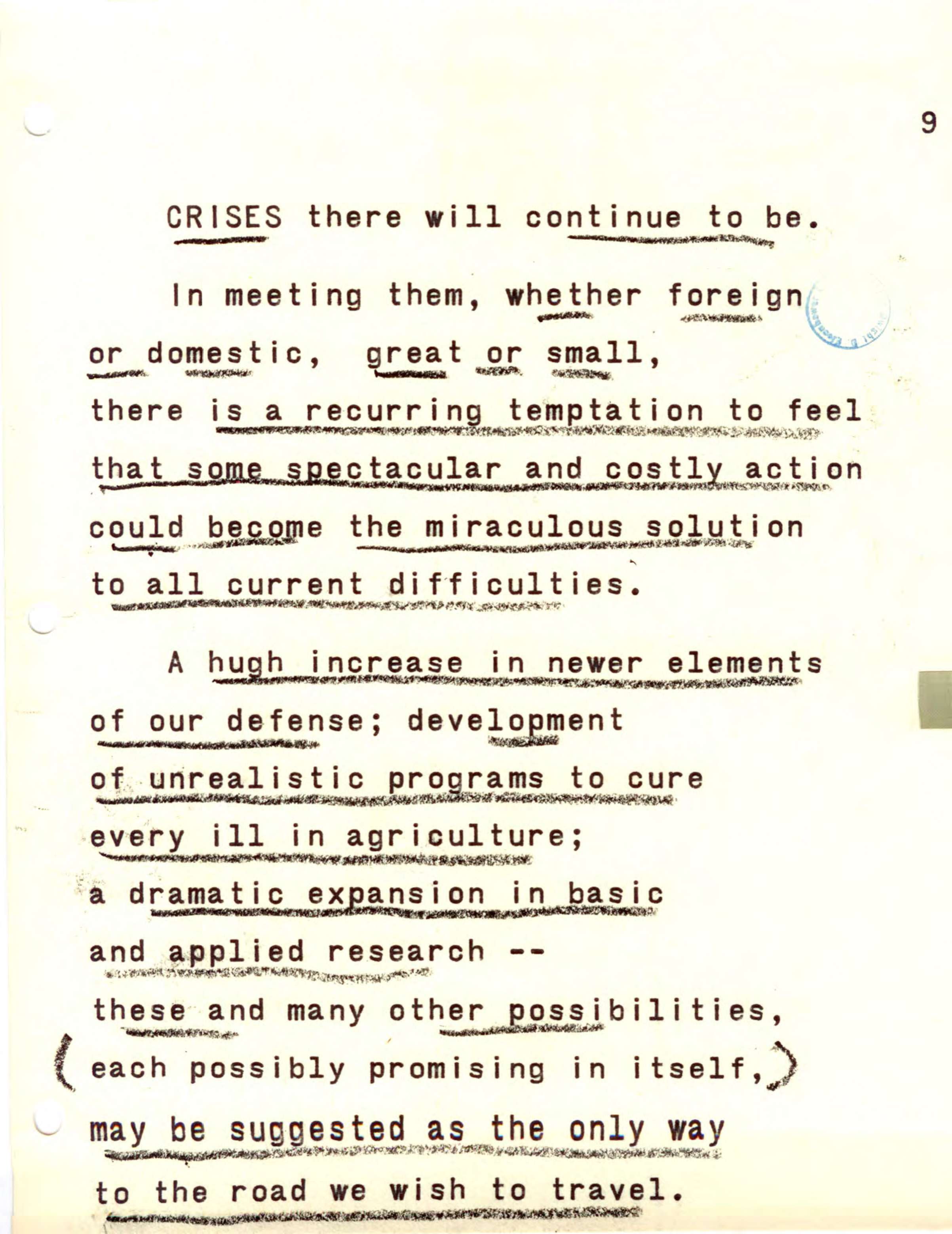
President Dwight D. Eisenhower's Farewell Address
Page 11
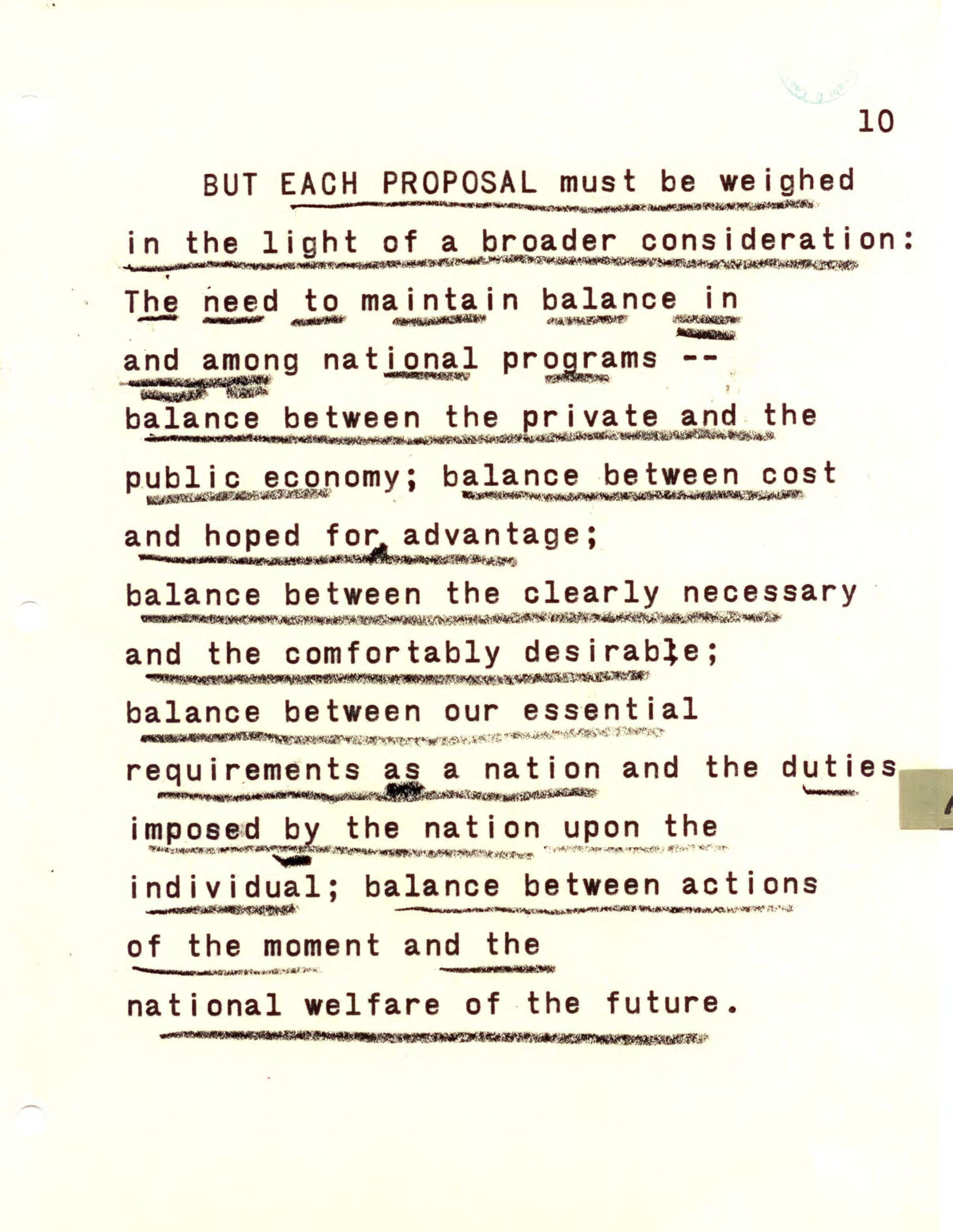
President Dwight D. Eisenhower's Farewell Address
Page 12
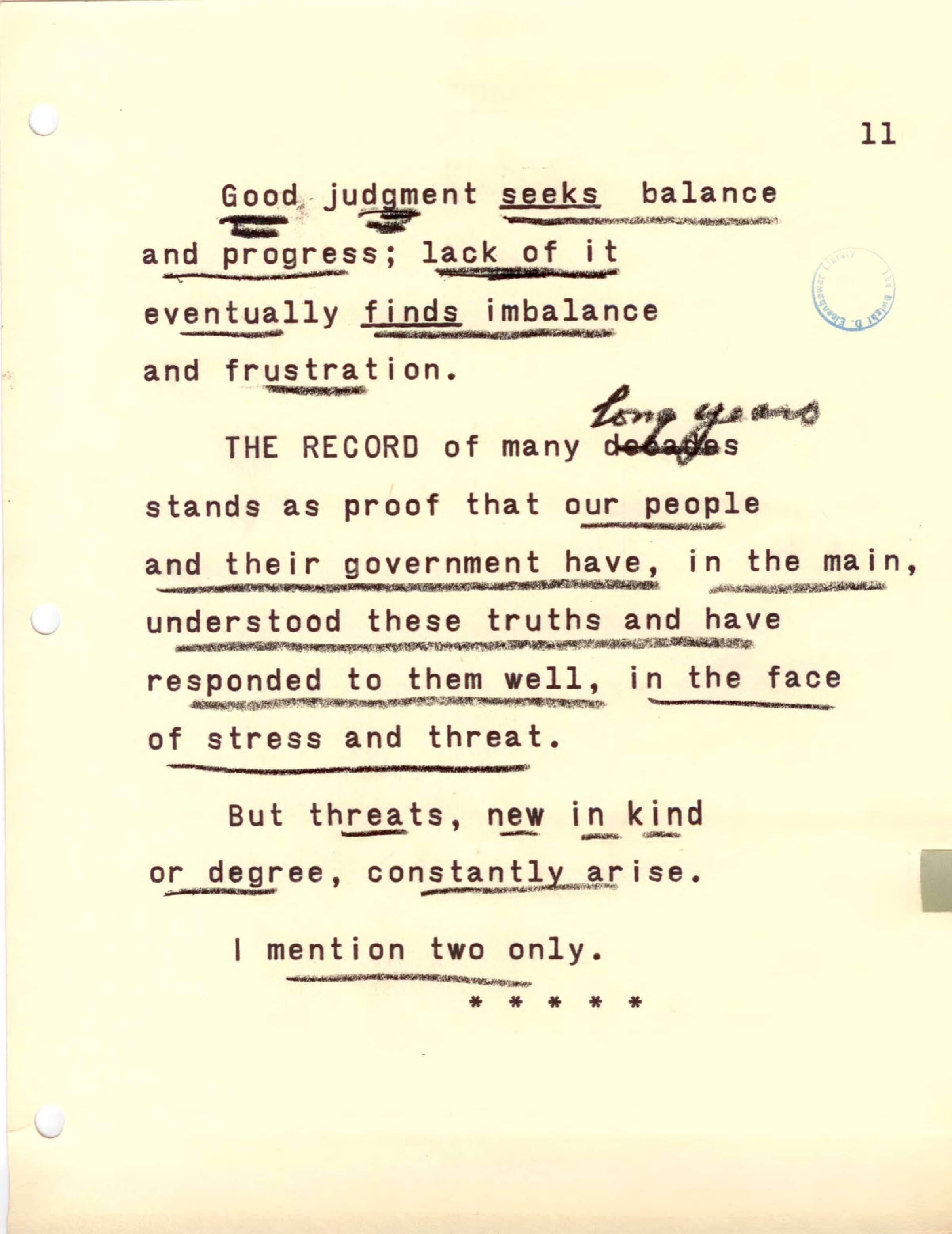
President Dwight D. Eisenhower's Farewell Address
Page 13
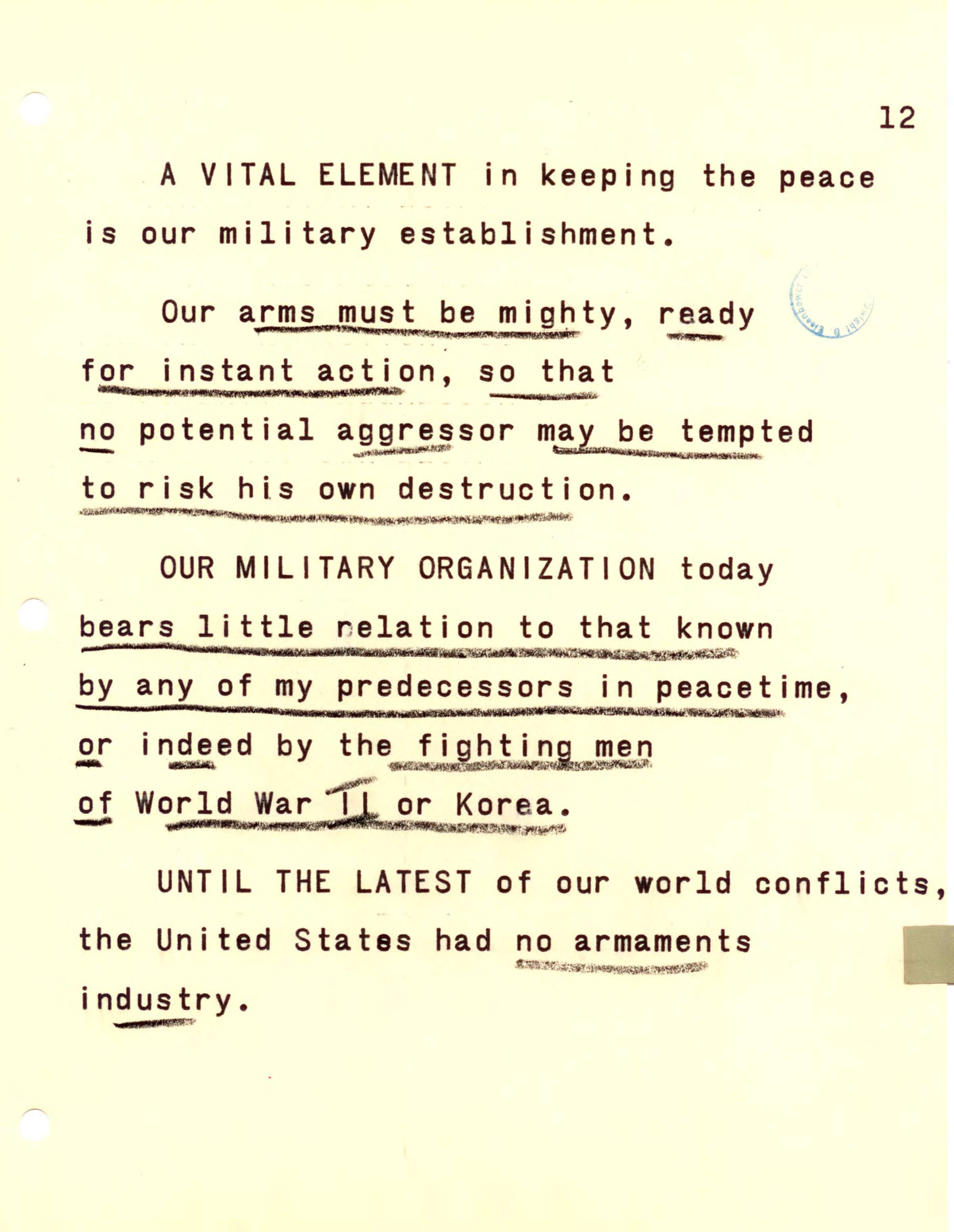
President Dwight D. Eisenhower's Farewell Address
Page 14
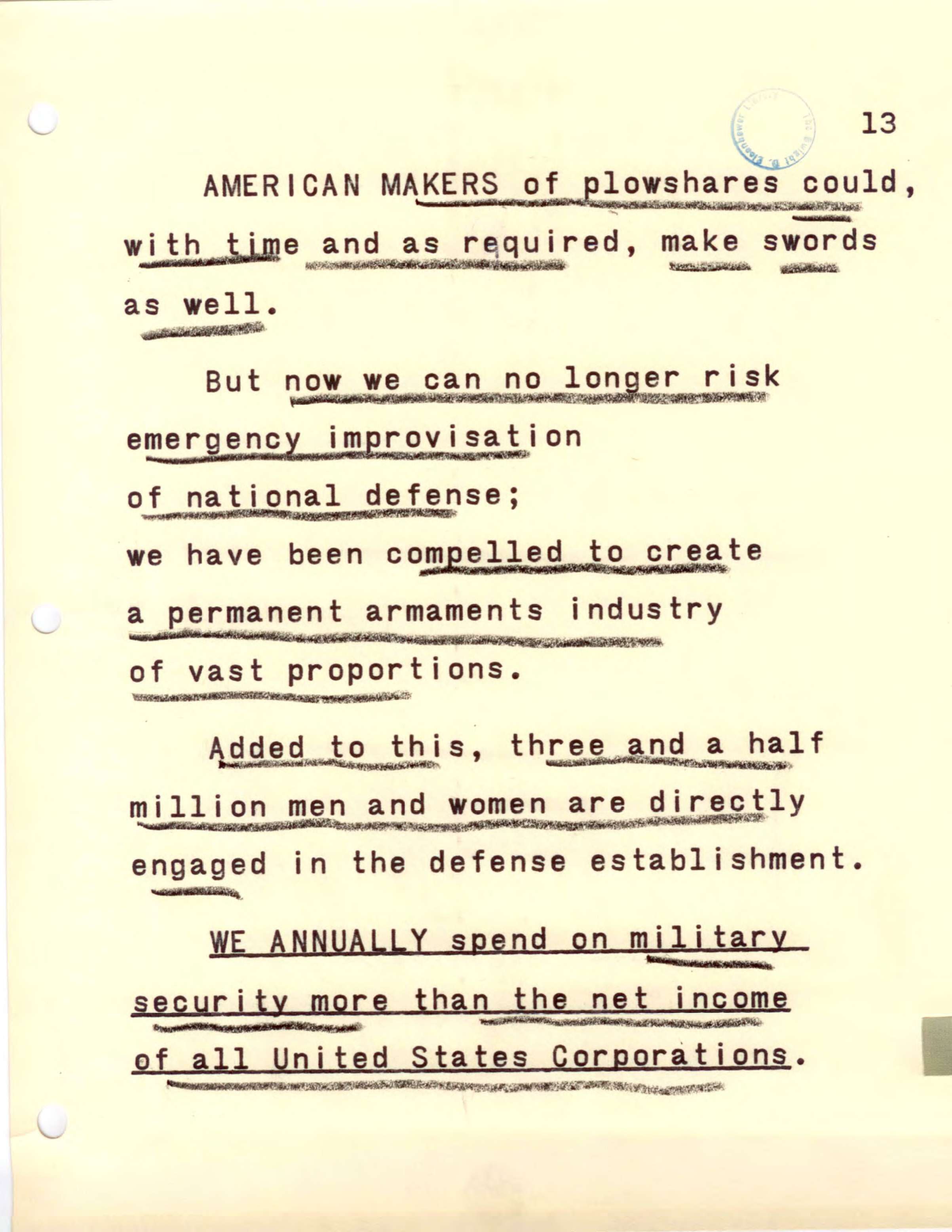
President Dwight D. Eisenhower's Farewell Address
Page 15
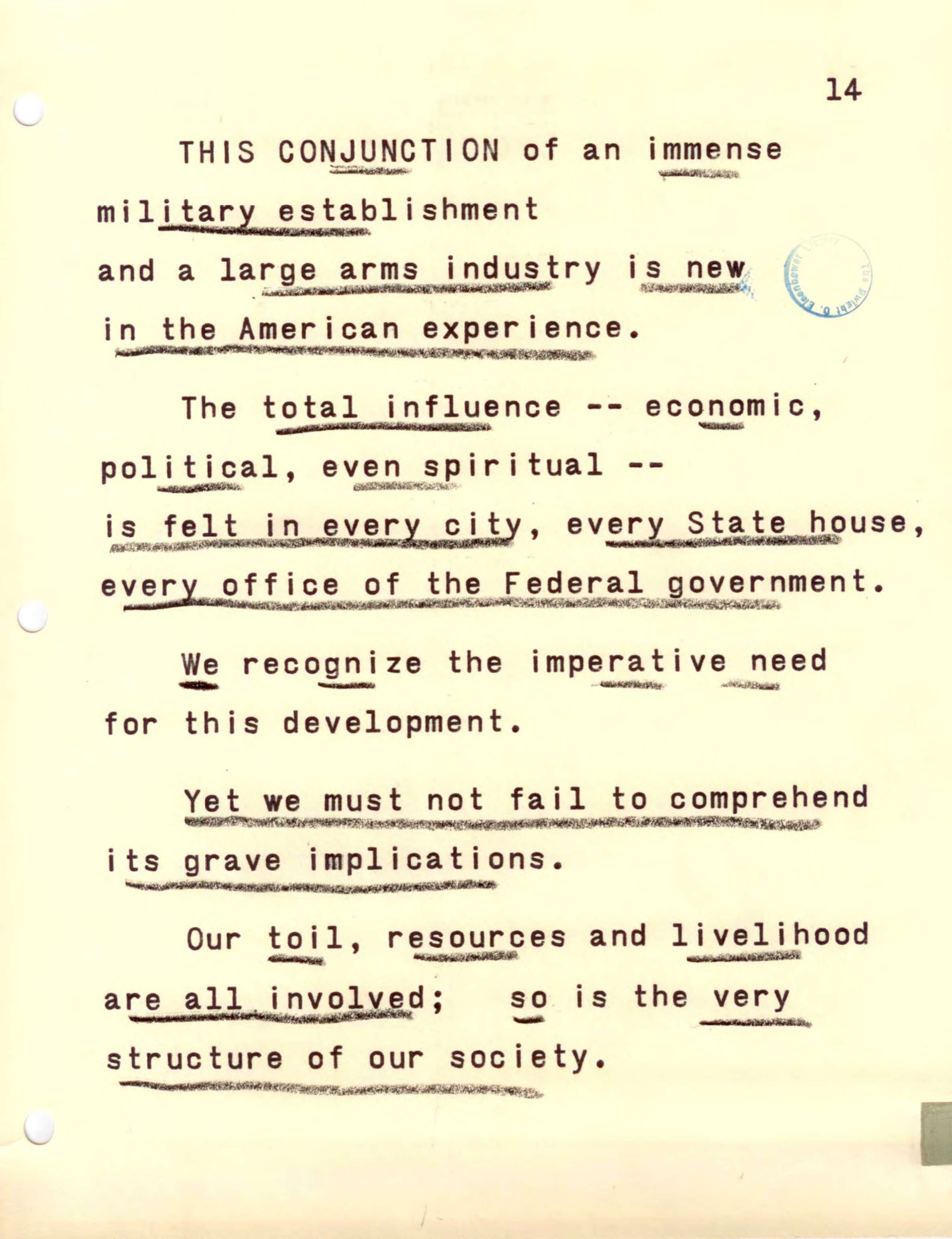
President Dwight D. Eisenhower's Farewell Address
Page 16
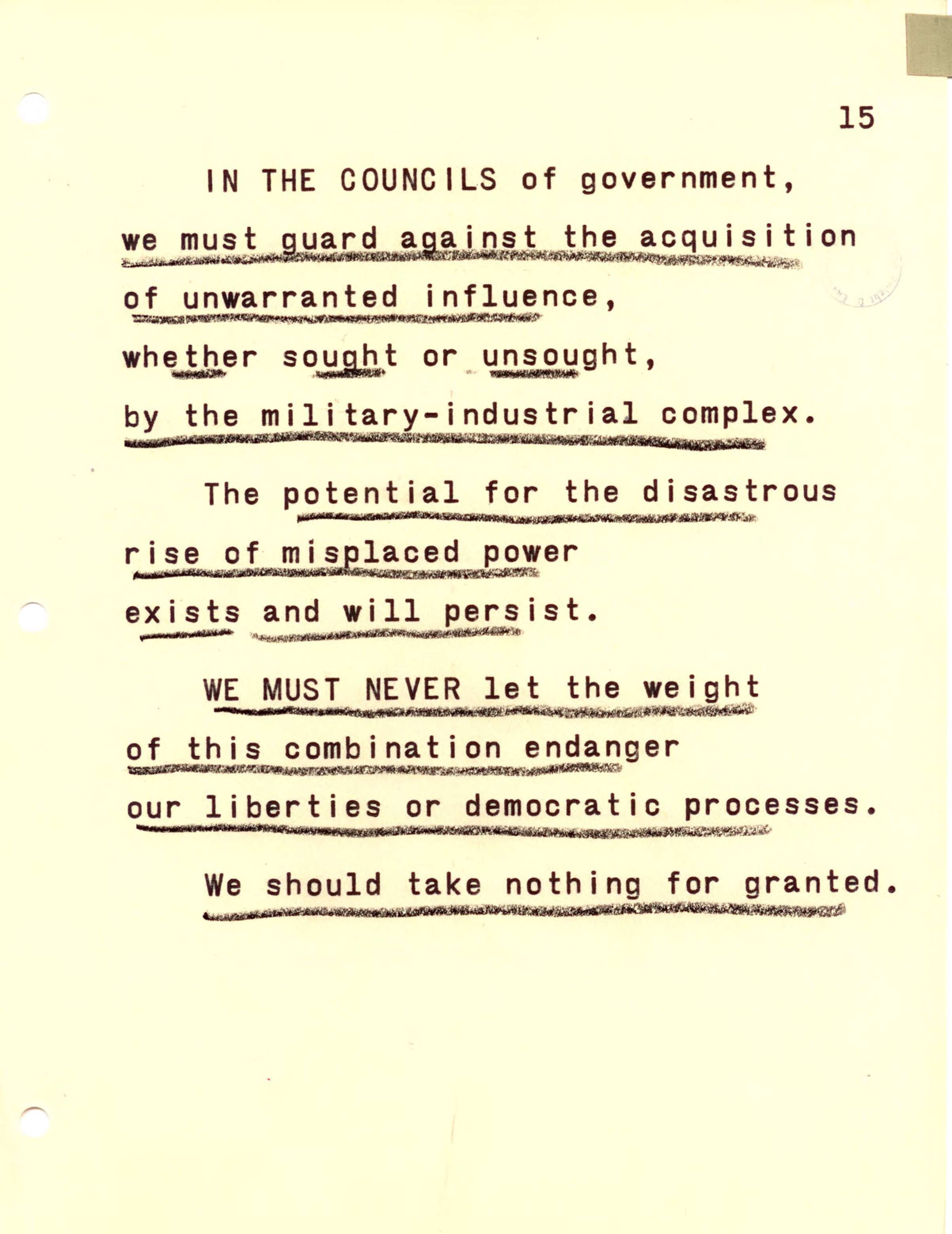
President Dwight D. Eisenhower's Farewell Address
Page 17
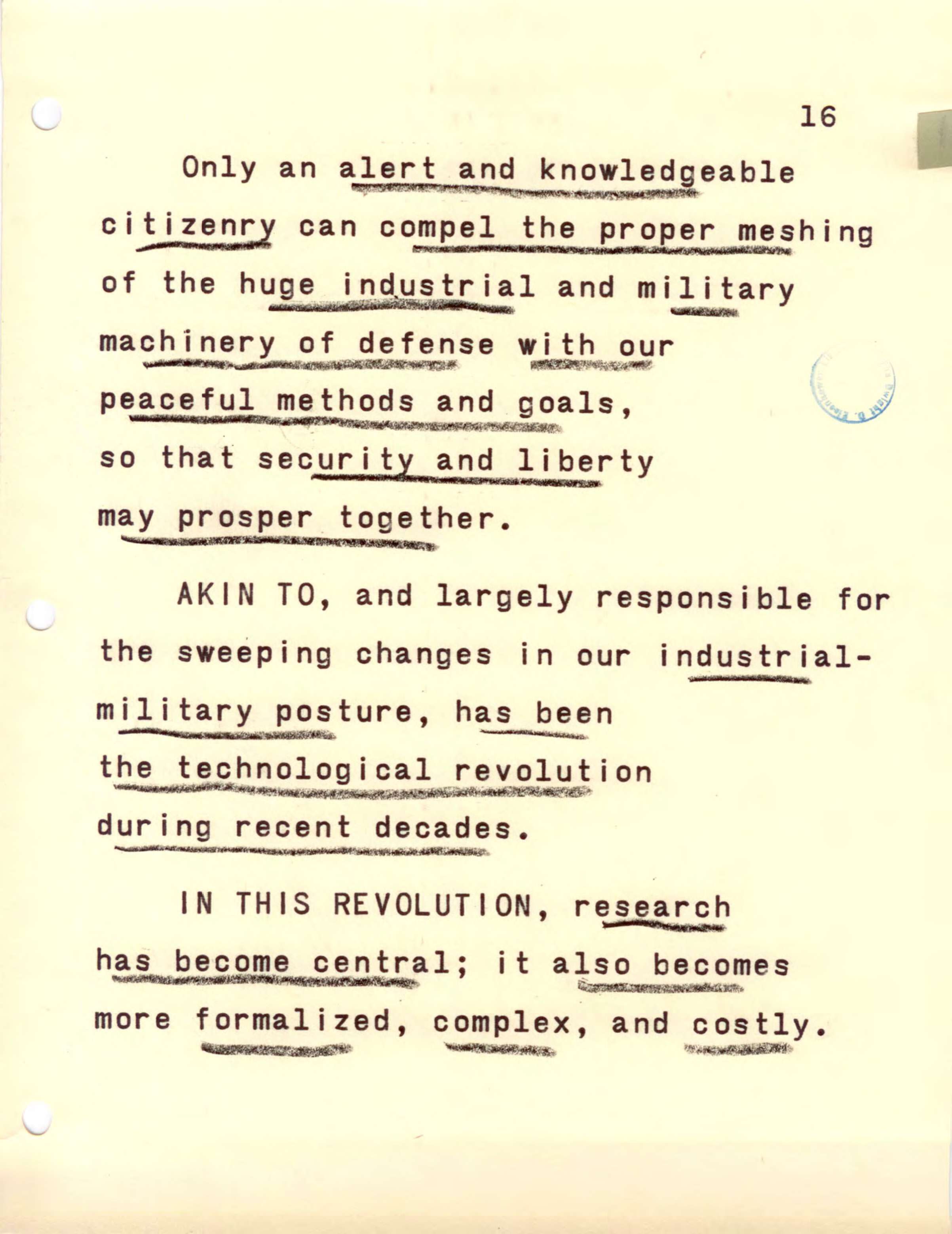
President Dwight D. Eisenhower's Farewell Address
Page 18
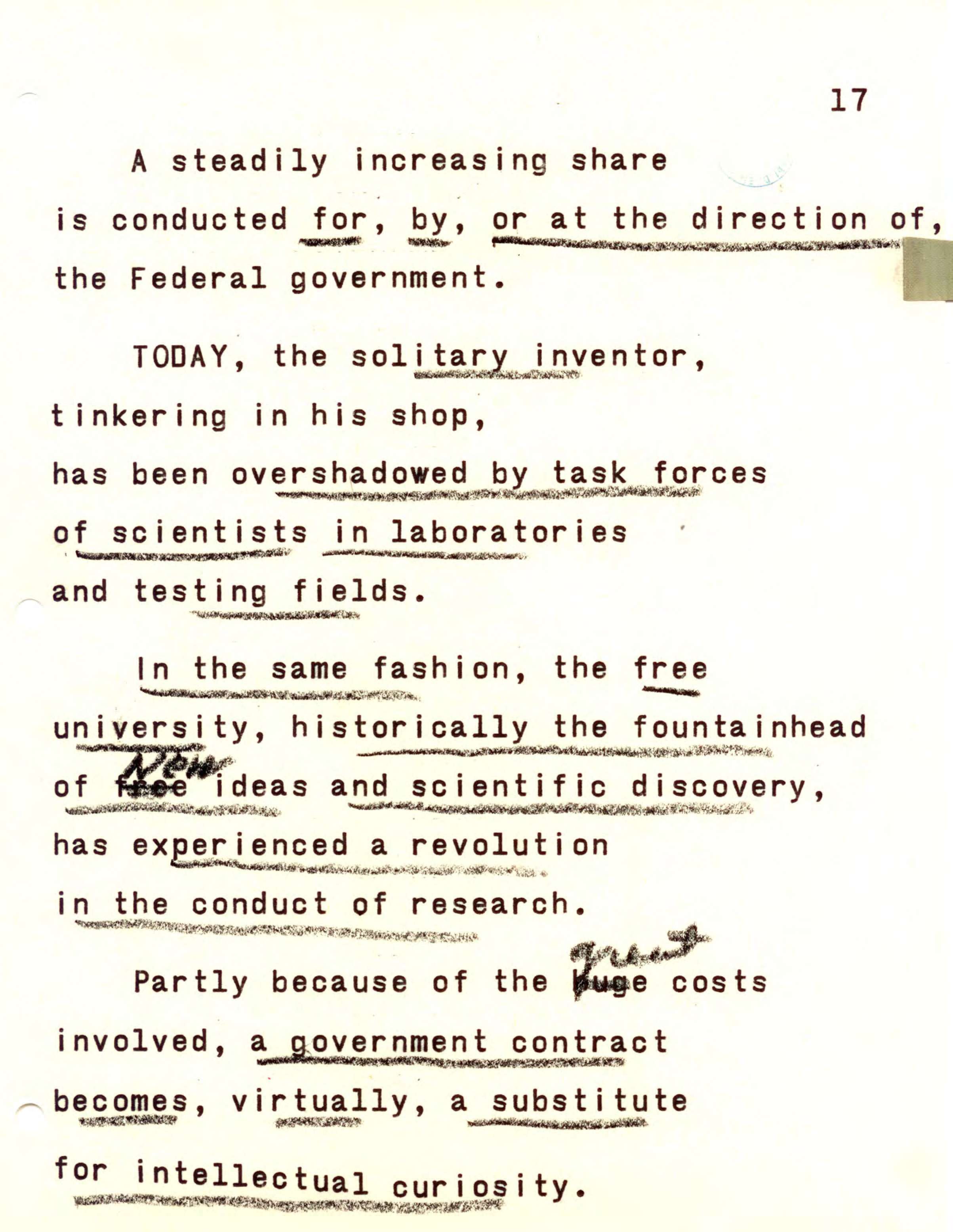
President Dwight D. Eisenhower's Farewell Address
Page 19
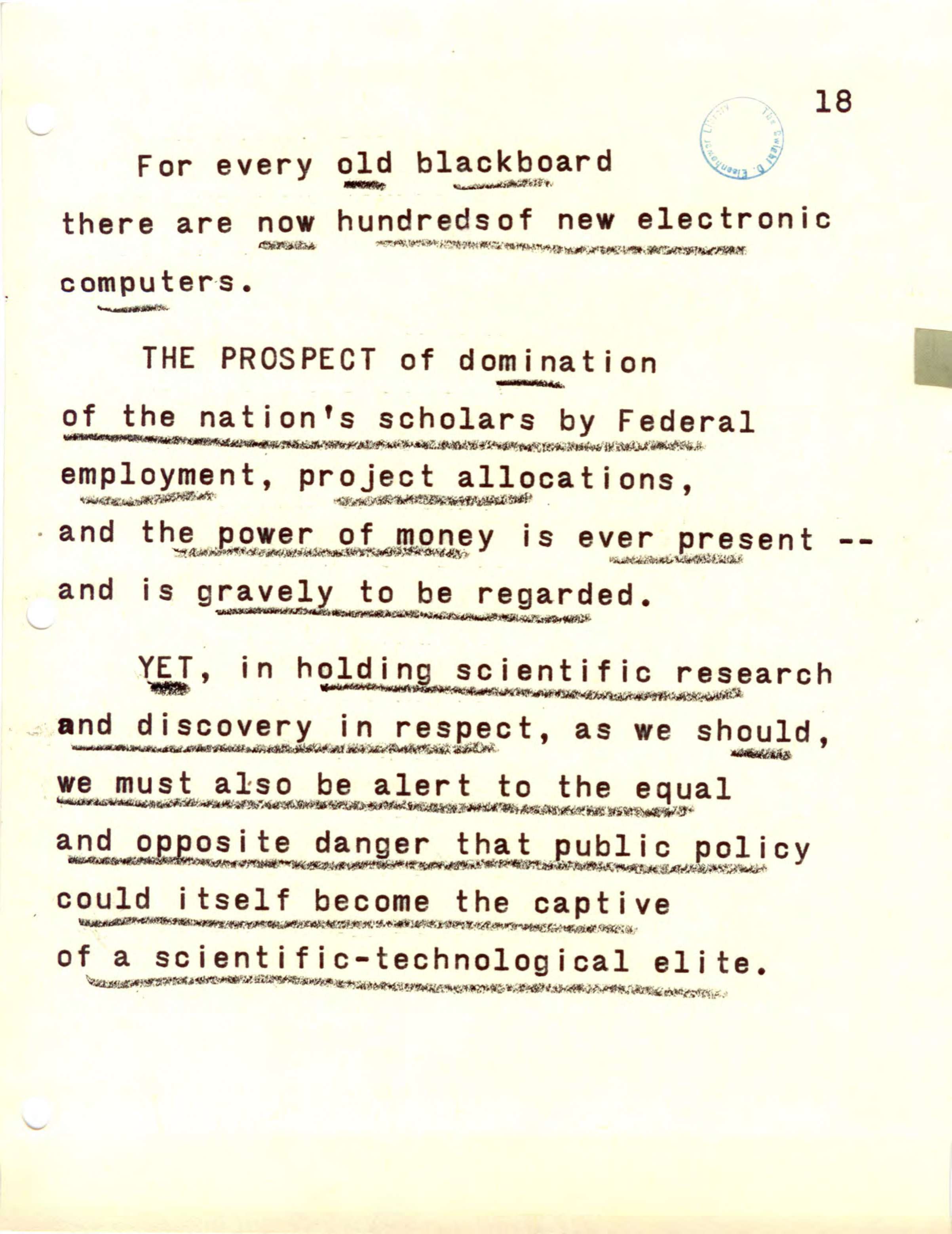
President Dwight D. Eisenhower's Farewell Address
Page 20
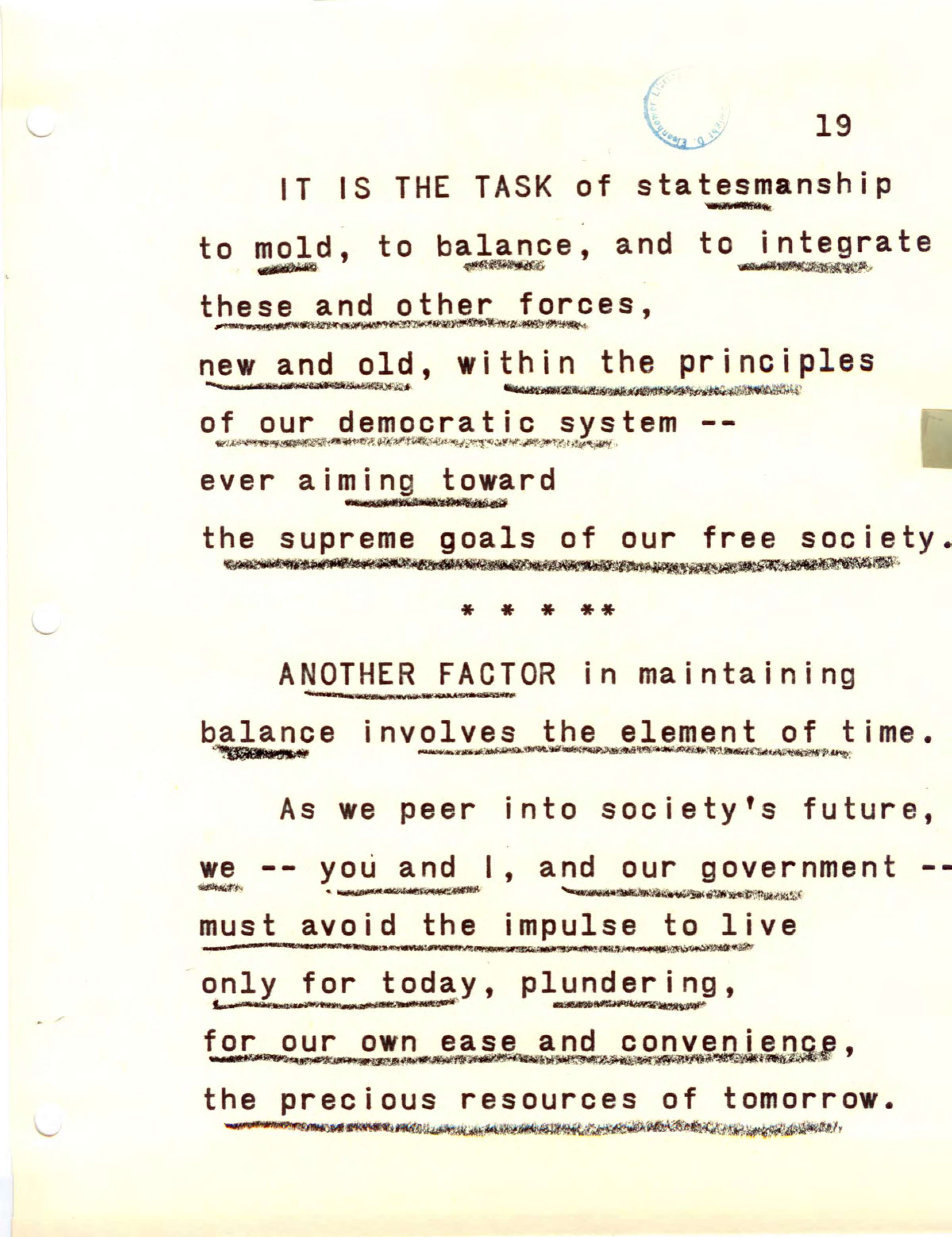
President Dwight D. Eisenhower's Farewell Address
Page 21
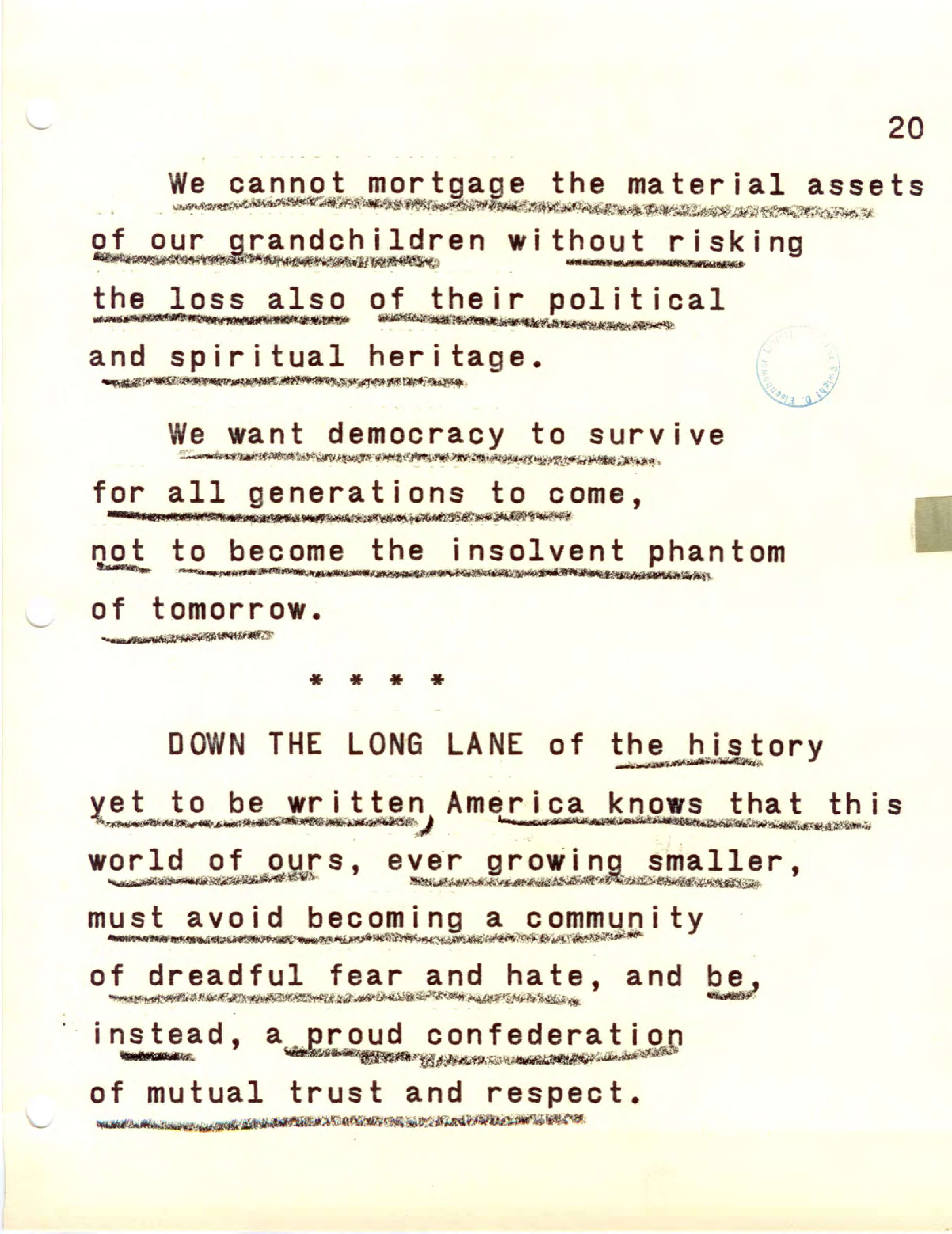
President Dwight D. Eisenhower's Farewell Address
Page 22
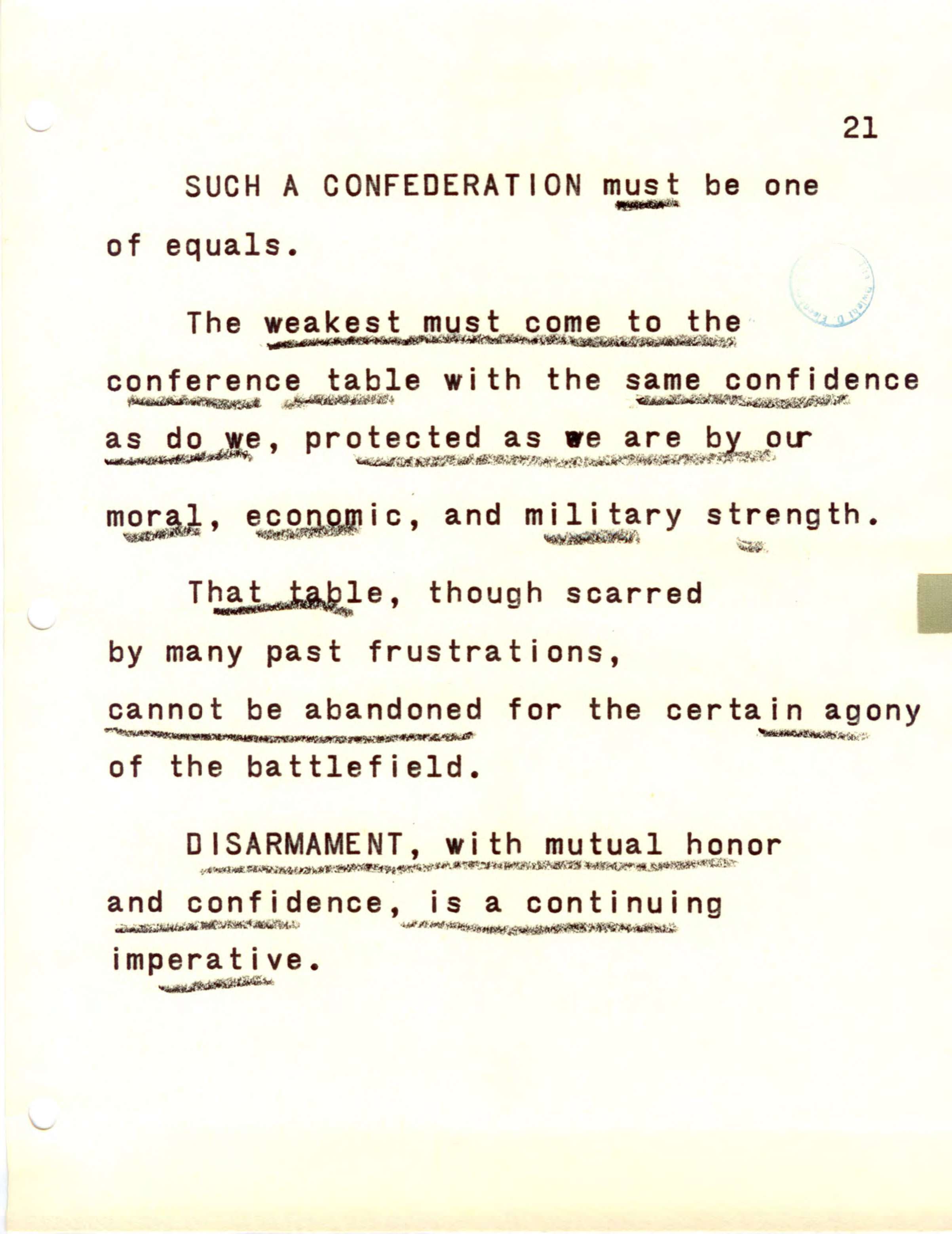
President Dwight D. Eisenhower's Farewell Address
Page 23

President Dwight D. Eisenhower's Farewell Address
Page 24
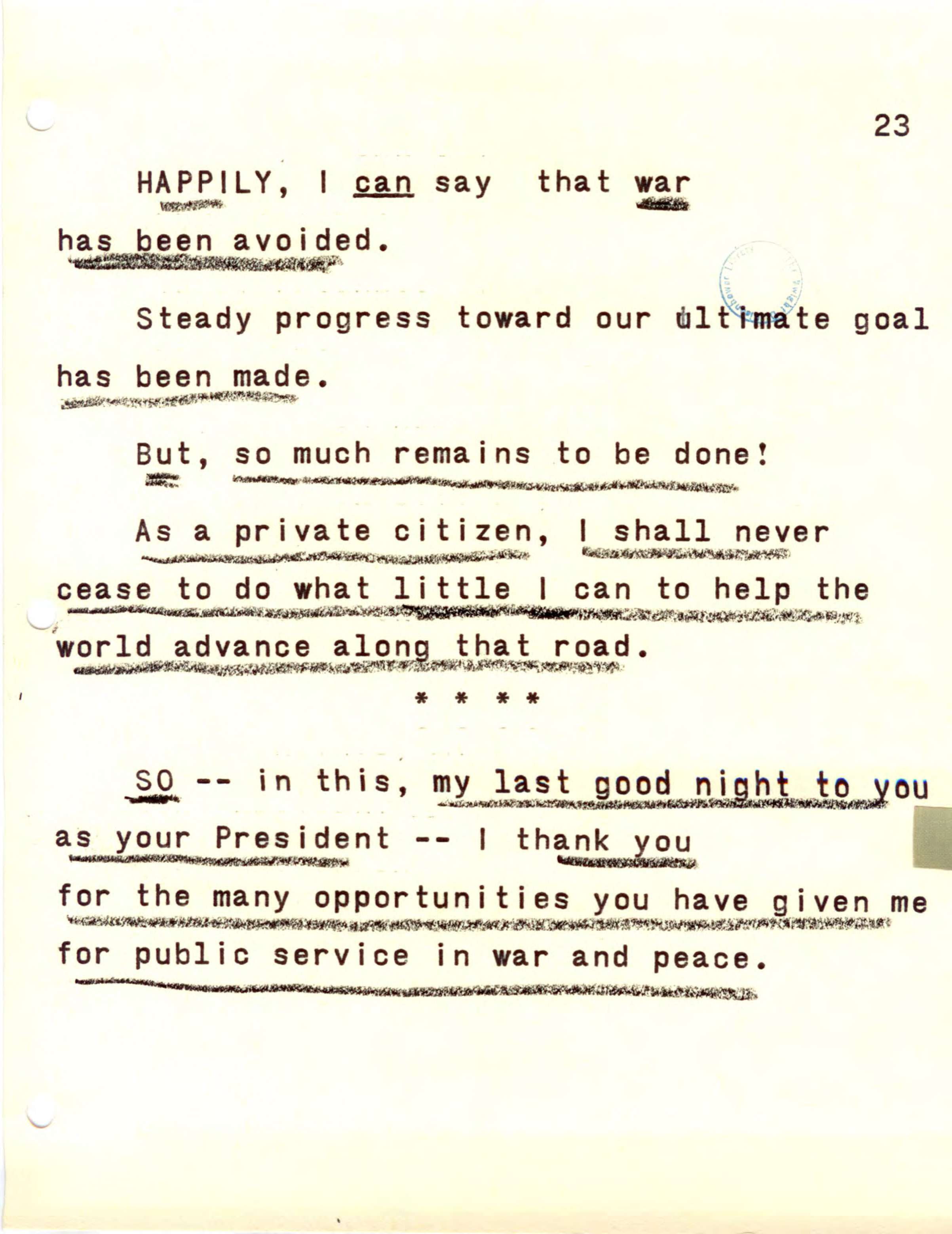
President Dwight D. Eisenhower's Farewell Address
Page 25
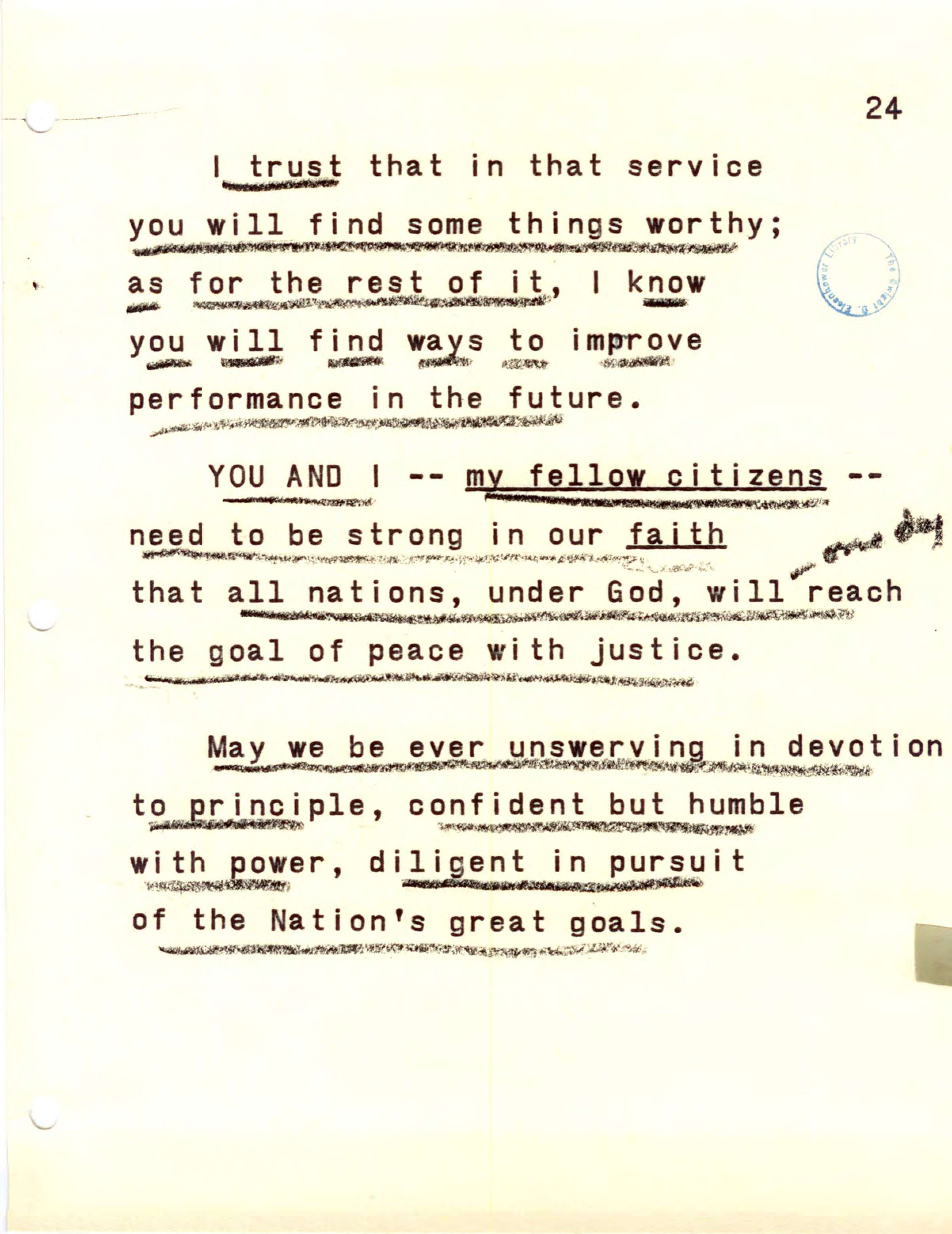
President Dwight D. Eisenhower's Farewell Address
Page 26
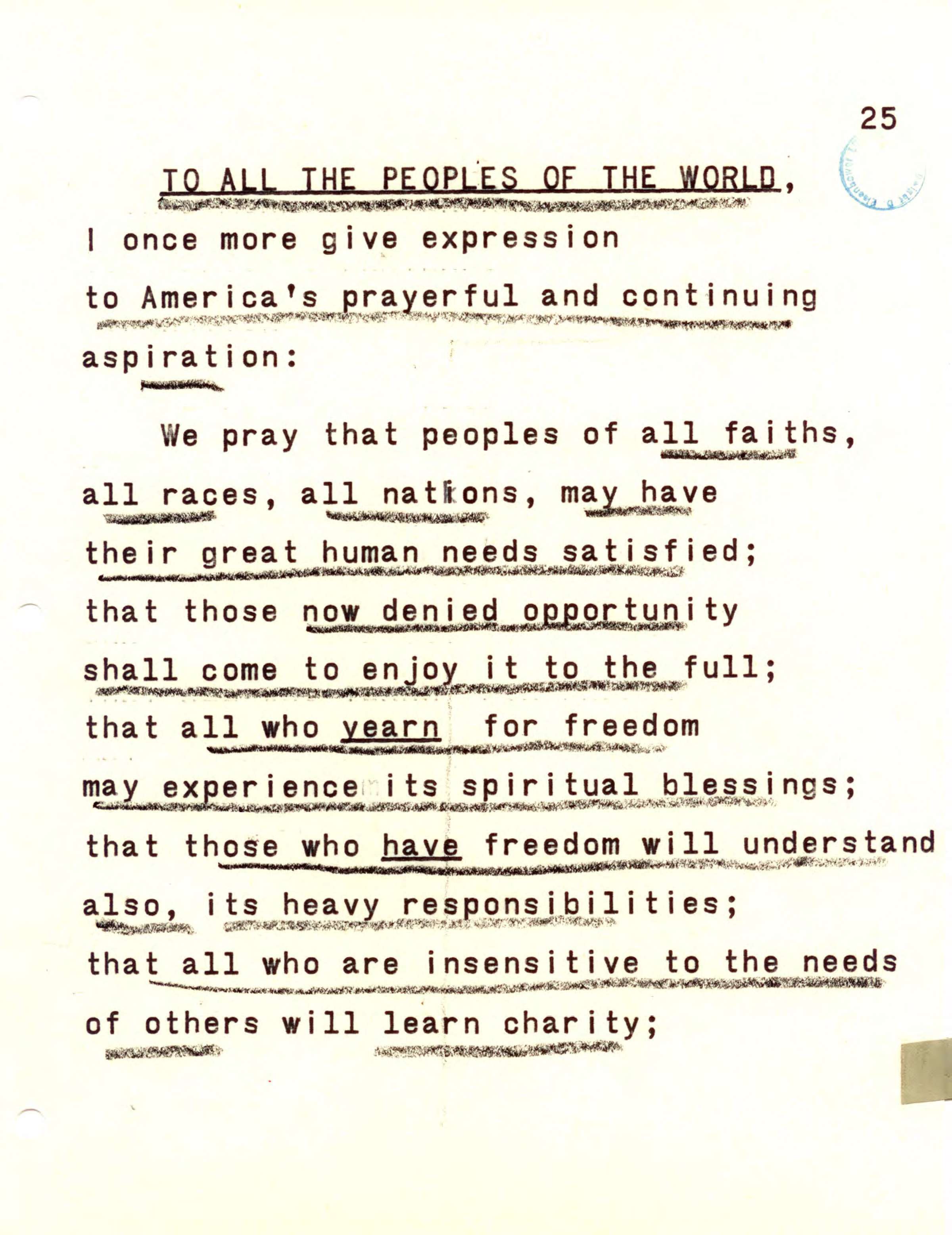
President Dwight D. Eisenhower's Farewell Address
Page 27
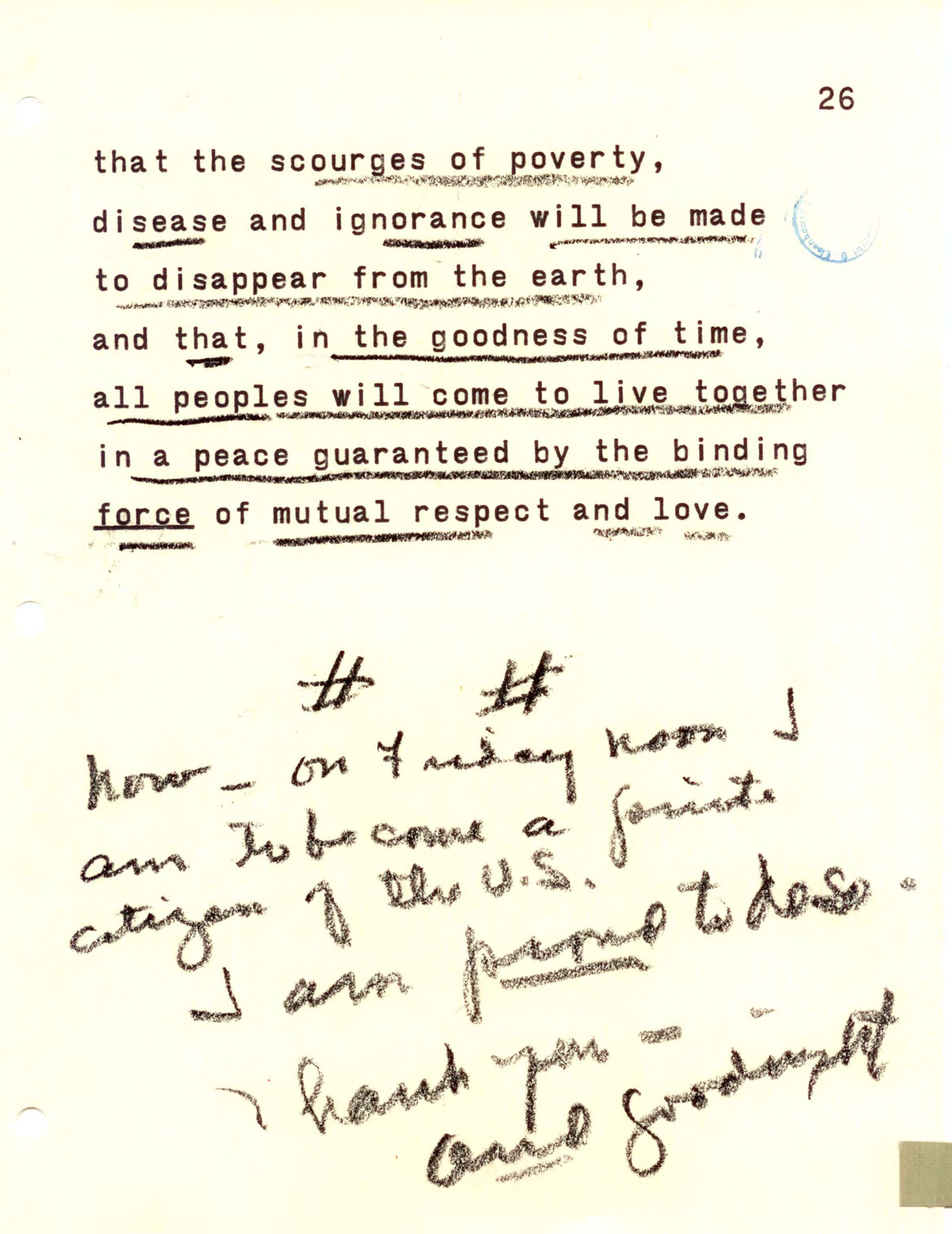
Document
Presidential Proclamation 4311 of September 8, 1974, by President Gerald R. Ford granting a pardon to Richard M. Nixon.
9/8/1974
Gerald Ford was Vice President under President Richard Nixon and took over the Presidency when Nixon resigned. Nixon was under investigation for criminal activity while in office. With this document, Ford pardoned Nixon of any crimes he might have committed while President.
This primary source comes from the General Records of the United States Government.
National Archives Identifier: 299996
Full Citation: Presidential Proclamation 4311 of September 8, 1974, by President Gerald R. Ford granting a pardon to Richard M. Nixon.; 9/8/1974; General Records of the United States Government, . [Online Version, https://docsteach.org/documents/document/presidential-proclamation-4311-of-september-8-1974-by-president-gerald-r-ford-granting-a-pardon-to-richard-m-nixon, April 25, 2024]Presidential Proclamation 4311 of September 8, 1974, by President Gerald R. Ford granting a pardon to Richard M. Nixon.
Page 2
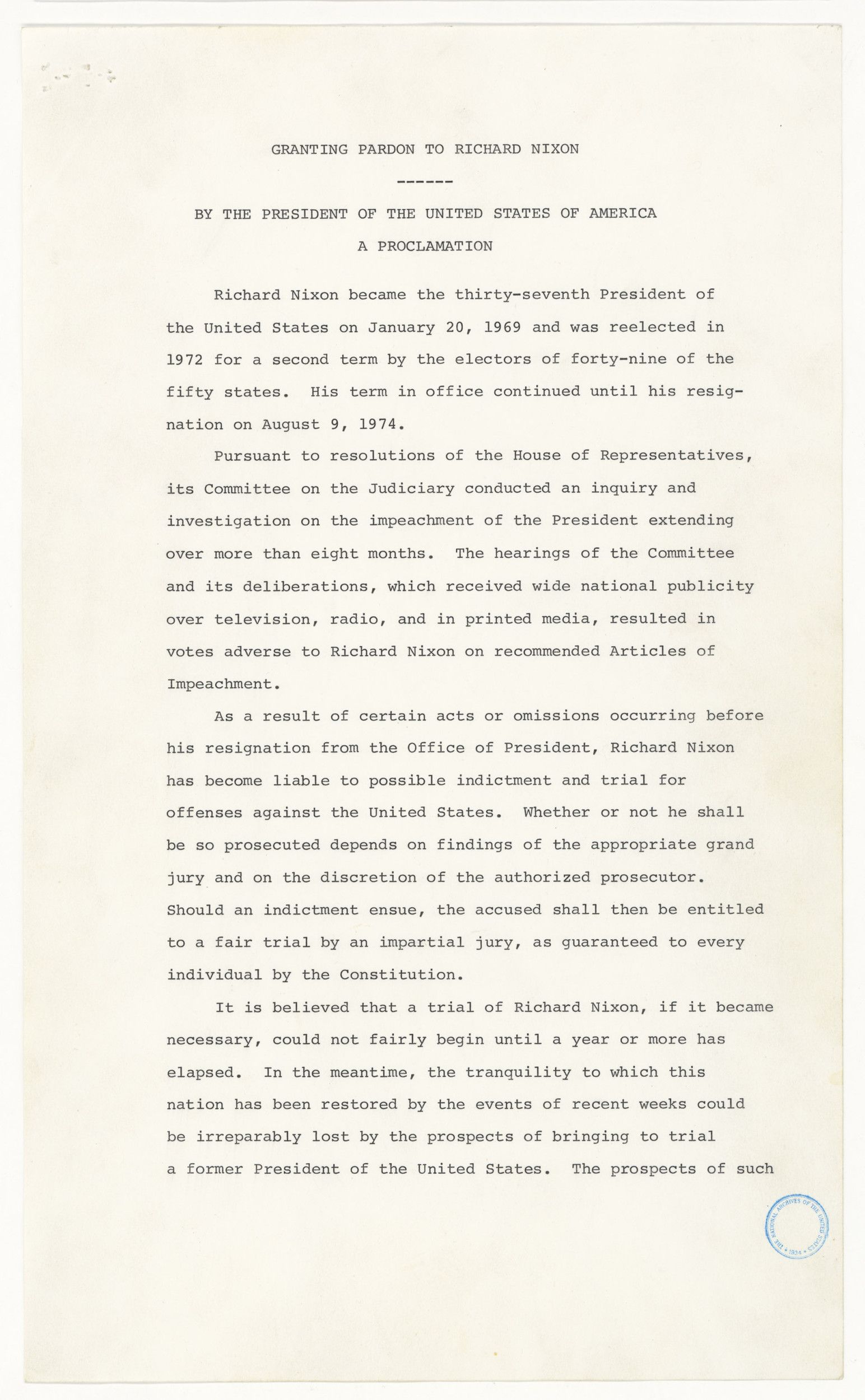
Presidential Proclamation 4311 of September 8, 1974, by President Gerald R. Ford granting a pardon to Richard M. Nixon.
Page 2
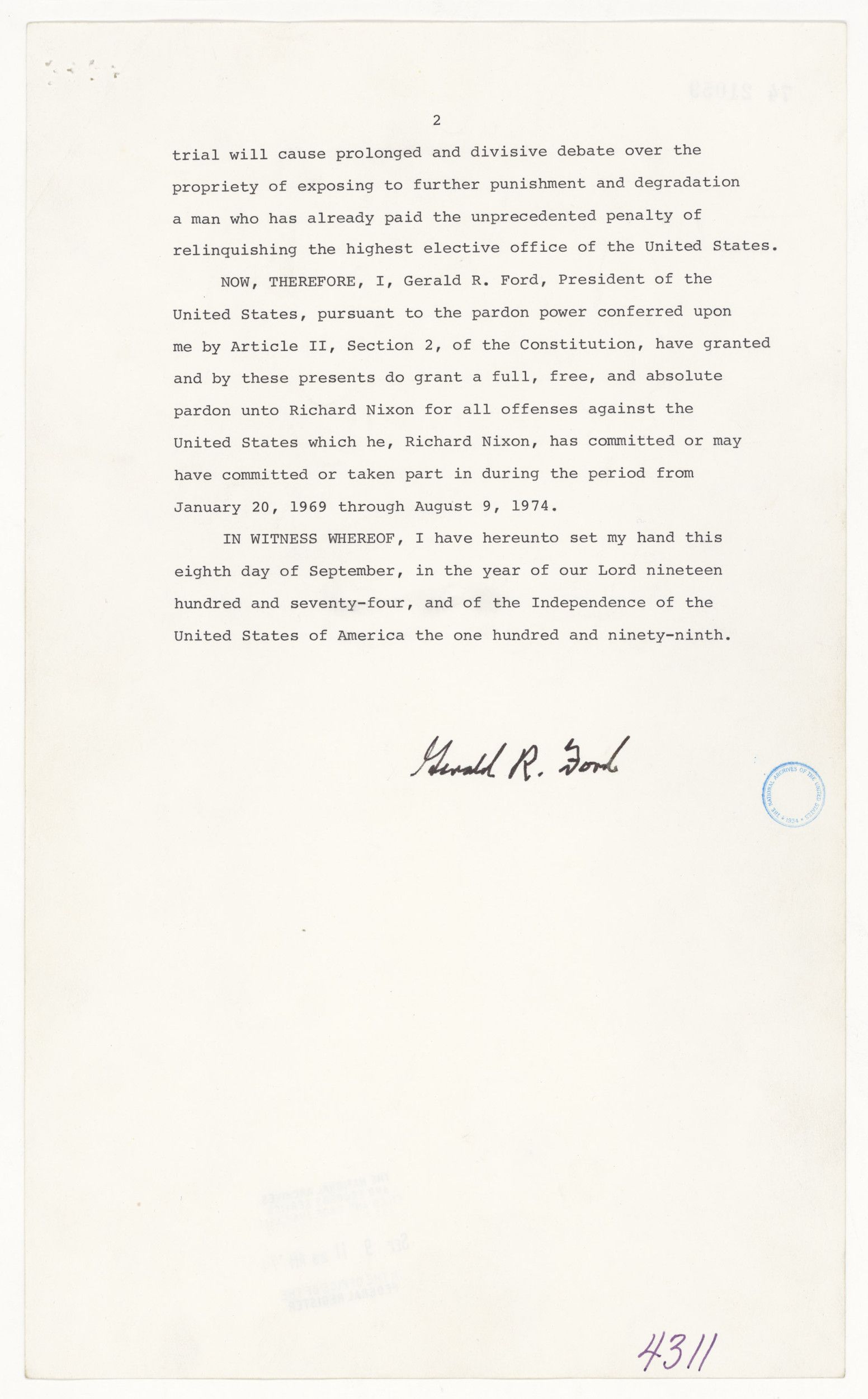
Document
Remarks at Brandenberg Gate, Berlin, Germany [President's Speaking Copy]
6/12/1987
In June 1987, President Ronald Reagan spoke at the Brandenburg Gate in Berlin, Germany. This page from President Reagan’s speaking copy of his remarks includes his call to Soviet President Michael Gorbachev to “Tear down this wall.” Selected pages are shown.
This primary source comes from the White House Office of Records Management File Systems (White House Central Files).
National Archives Identifier: 198491
Full Citation: Remarks at Brandenberg Gate, Berlin, Germany [President's Speaking Copy]; 6/12/1987; White House Office of Records Management File Systems (White House Central Files), . [Online Version, https://docsteach.org/documents/document/remarks-at-brandenberg-gate-berlin-germany-[presidents-speaking-copy], April 25, 2024]Remarks at Brandenberg Gate, Berlin, Germany [President's Speaking Copy]
Page 1
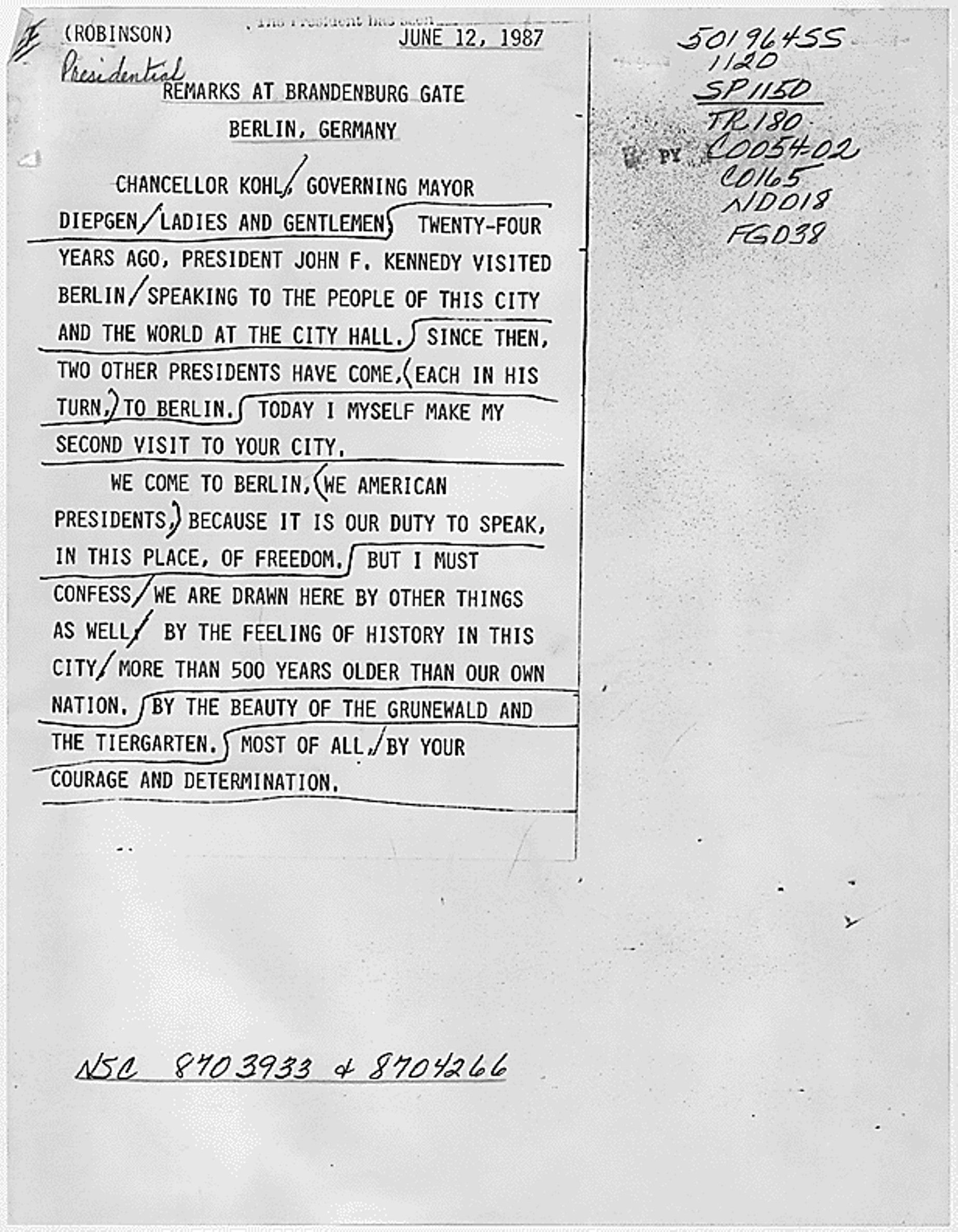
Remarks at Brandenberg Gate, Berlin, Germany [President's Speaking Copy]
Page 2
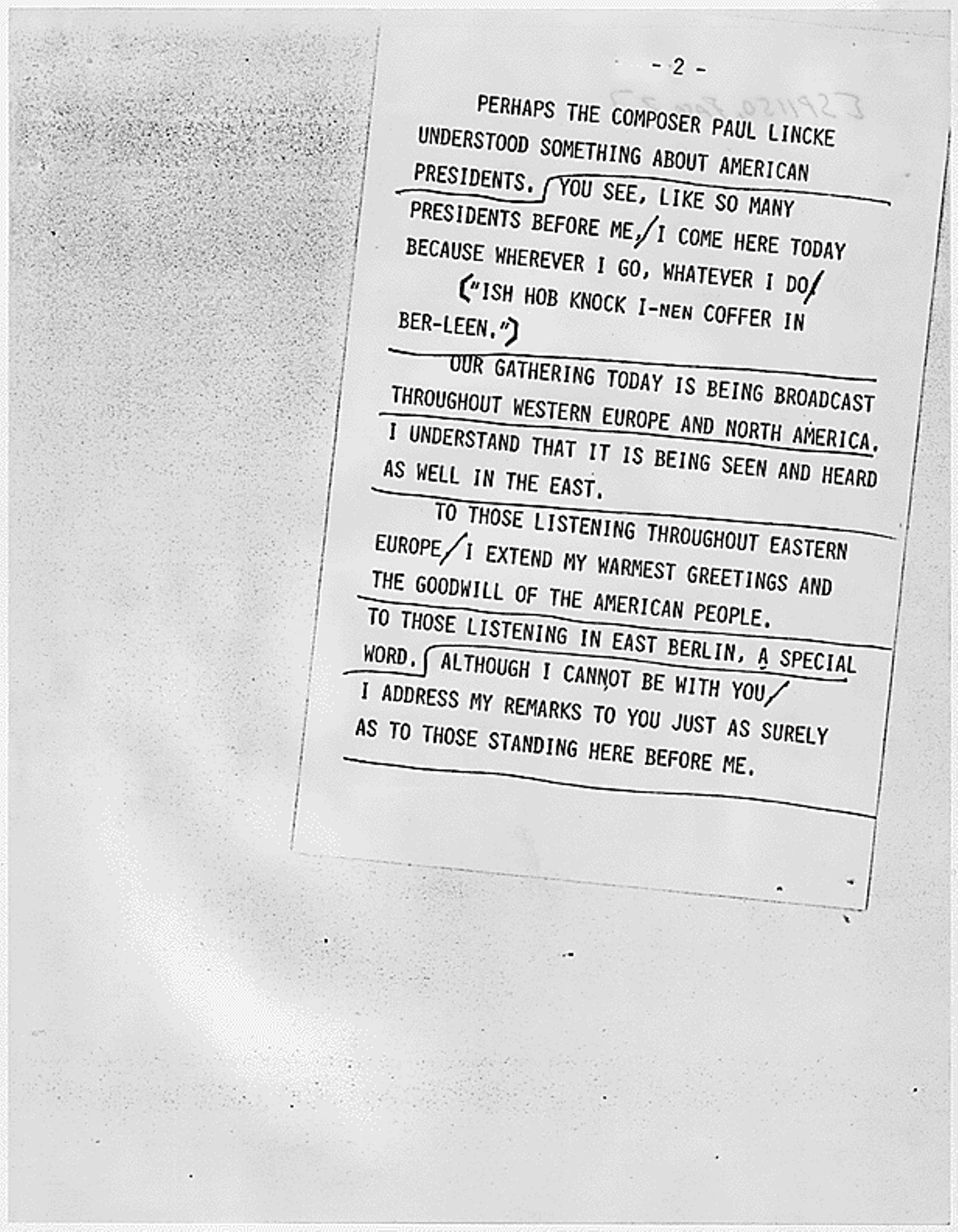
Remarks at Brandenberg Gate, Berlin, Germany [President's Speaking Copy]
Page 3
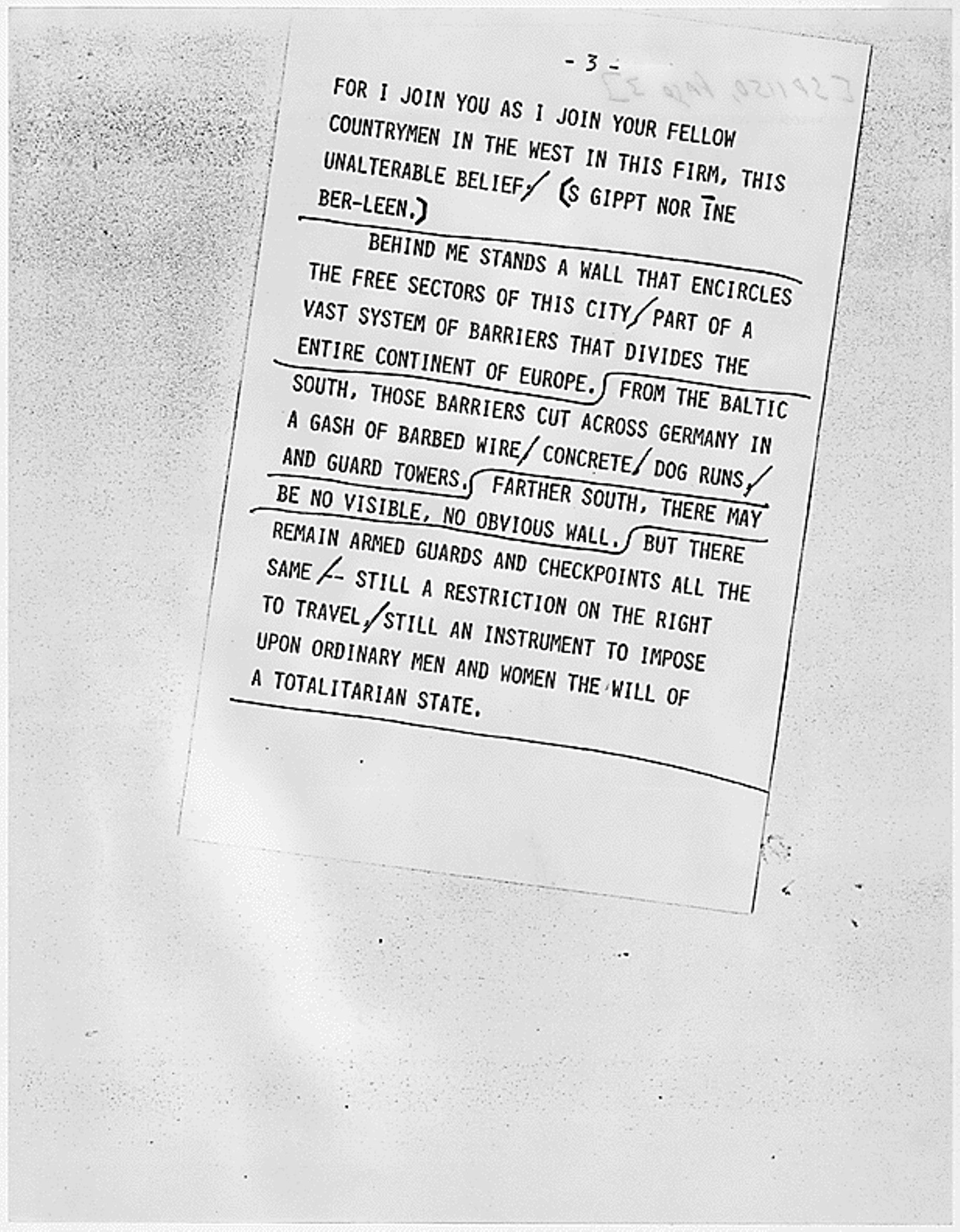
Remarks at Brandenberg Gate, Berlin, Germany [President's Speaking Copy]
Page 4
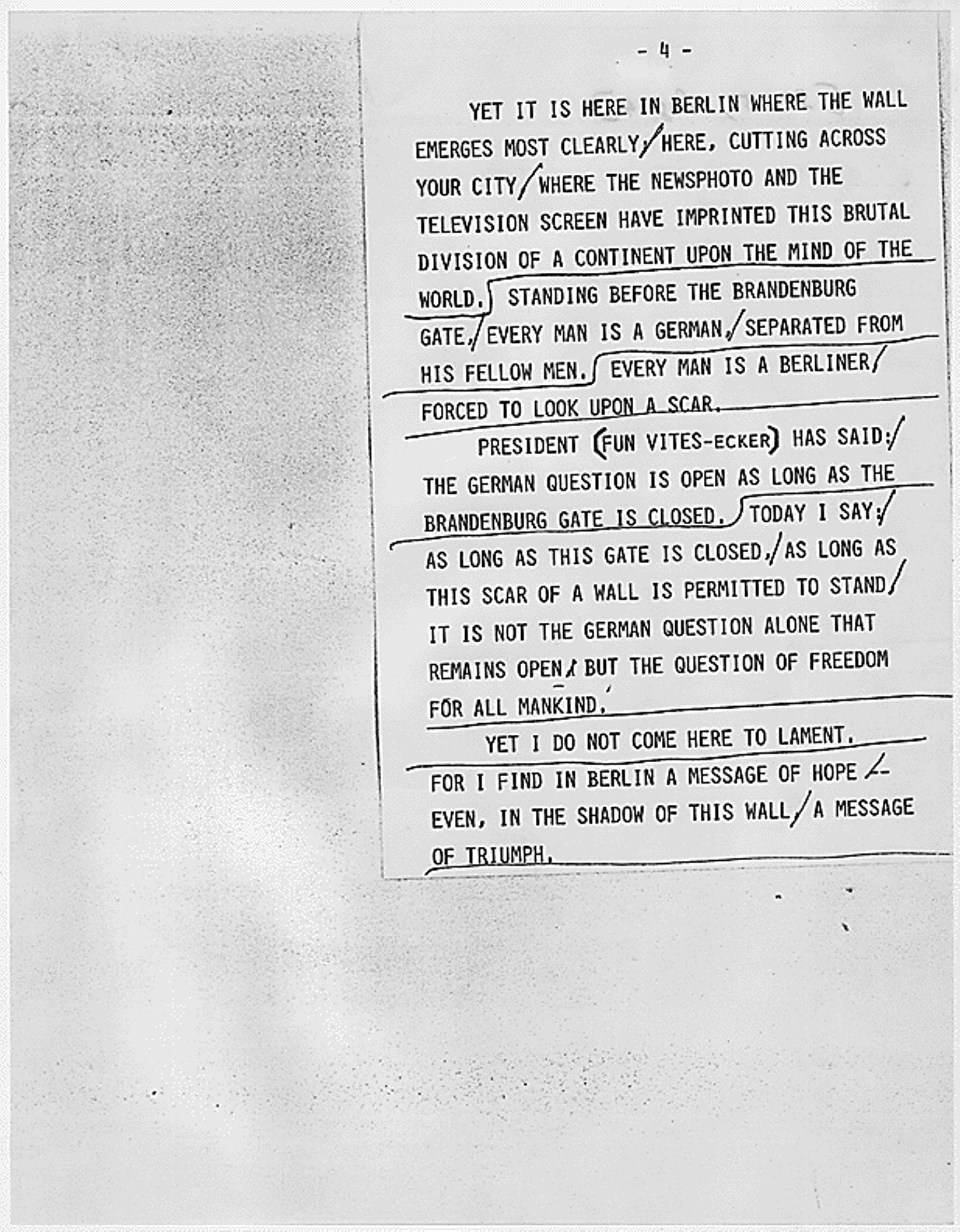
Remarks at Brandenberg Gate, Berlin, Germany [President's Speaking Copy]
Page 5
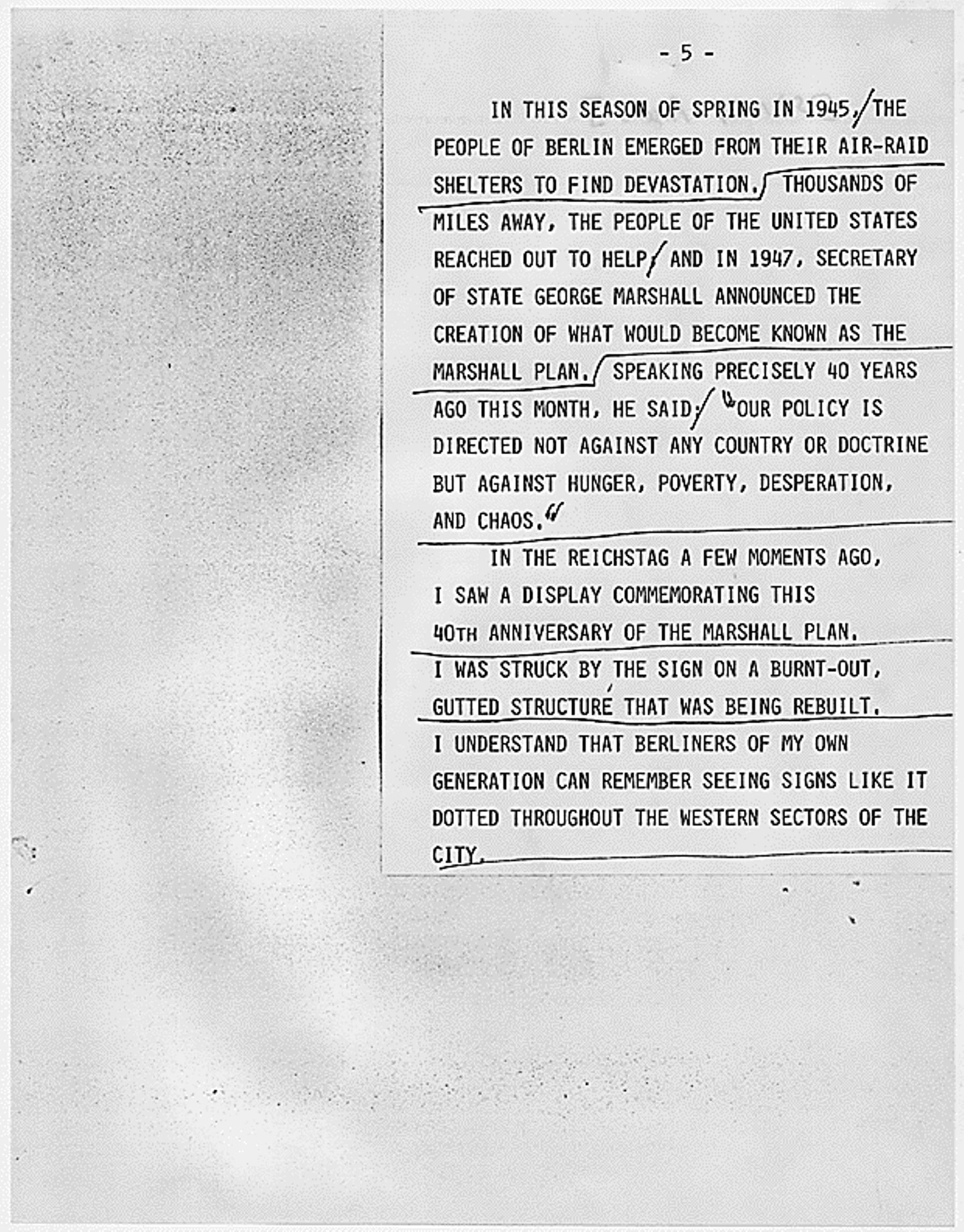
Remarks at Brandenberg Gate, Berlin, Germany [President's Speaking Copy]
Page 6
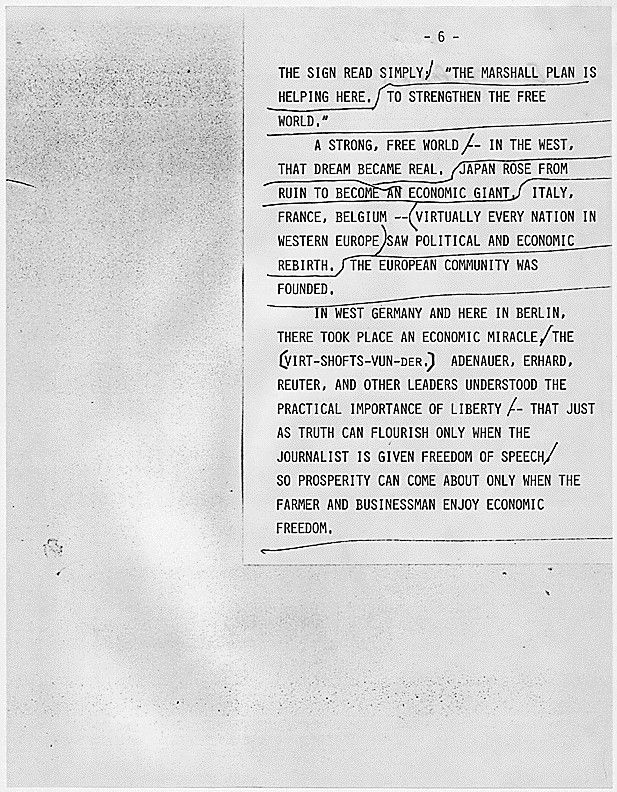
Remarks at Brandenberg Gate, Berlin, Germany [President's Speaking Copy]
Page 7
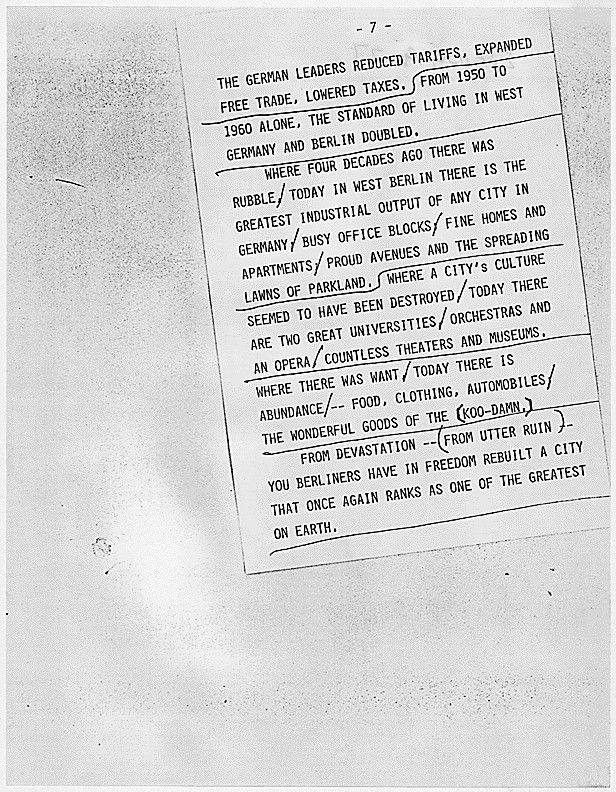
Remarks at Brandenberg Gate, Berlin, Germany [President's Speaking Copy]
Page 8
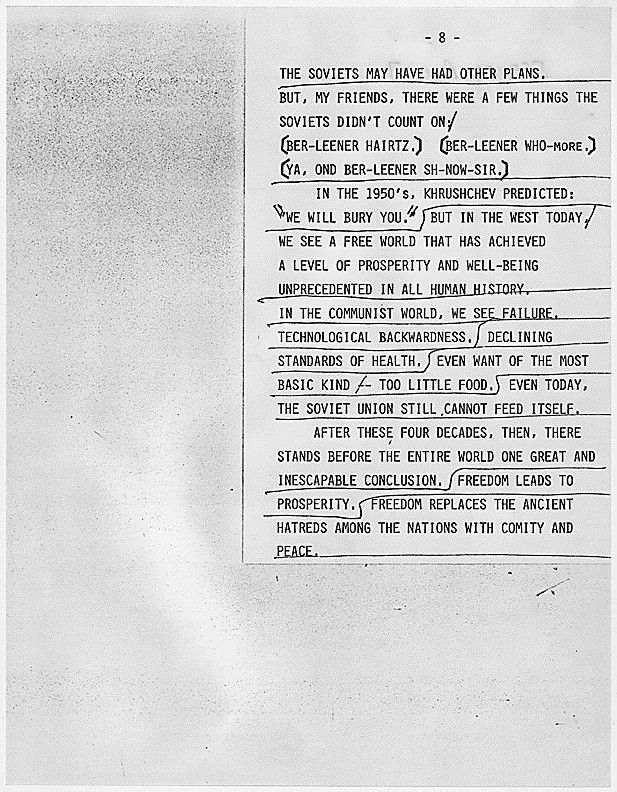
Remarks at Brandenberg Gate, Berlin, Germany [President's Speaking Copy]
Page 9
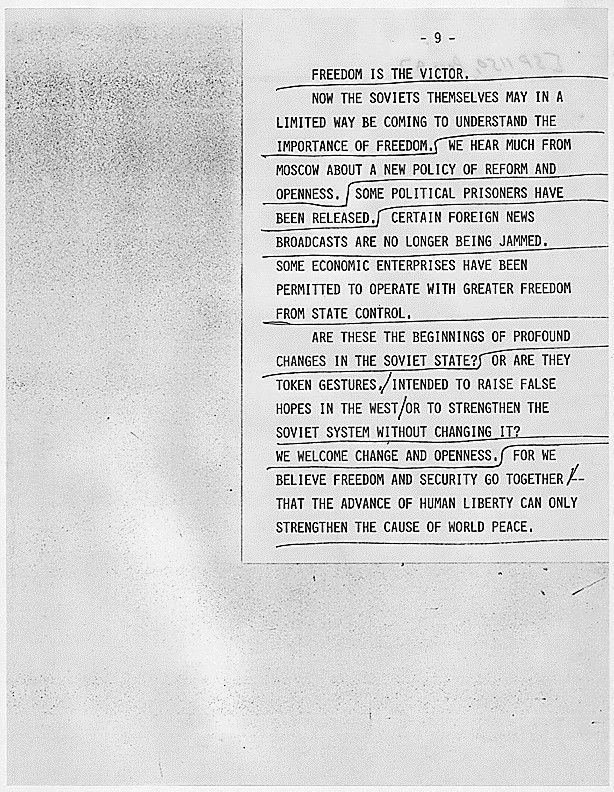
Remarks at Brandenberg Gate, Berlin, Germany [President's Speaking Copy]
Page 10
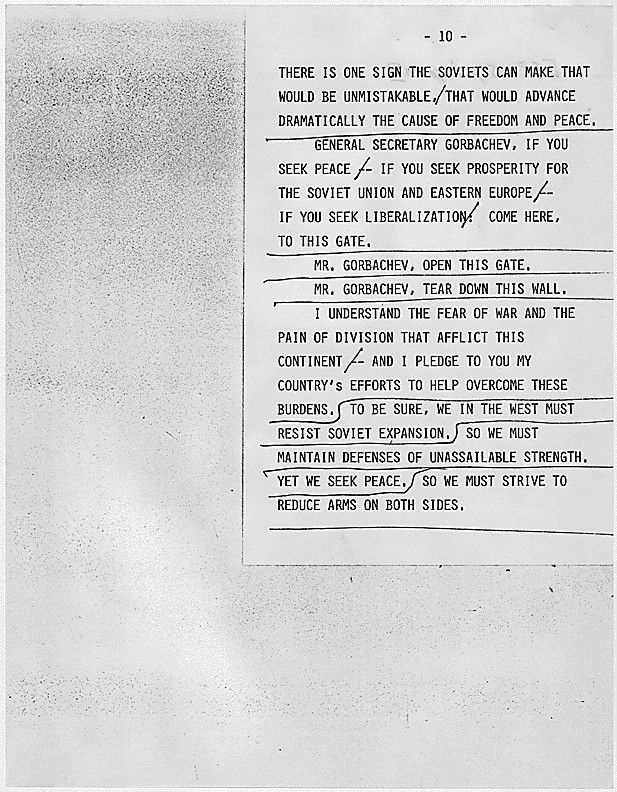
Remarks at Brandenberg Gate, Berlin, Germany [President's Speaking Copy]
Page 11
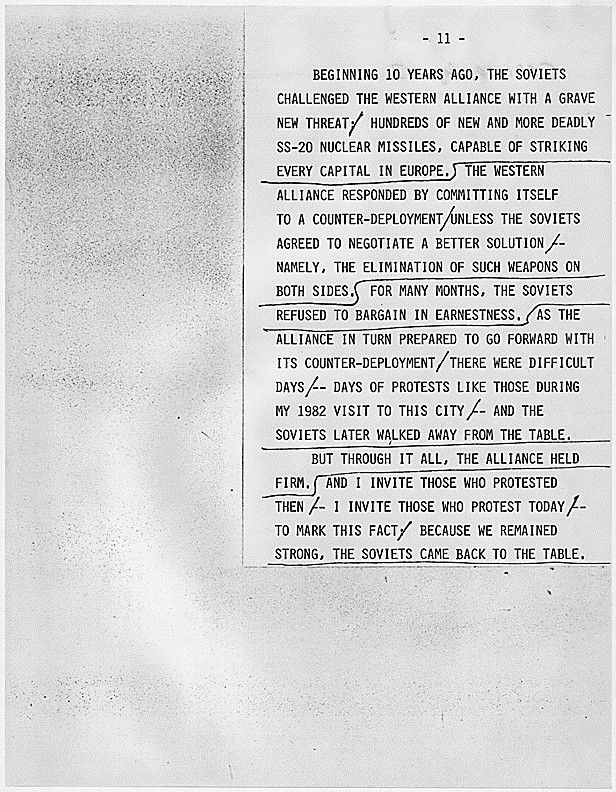
Remarks at Brandenberg Gate, Berlin, Germany [President's Speaking Copy]
Page 12
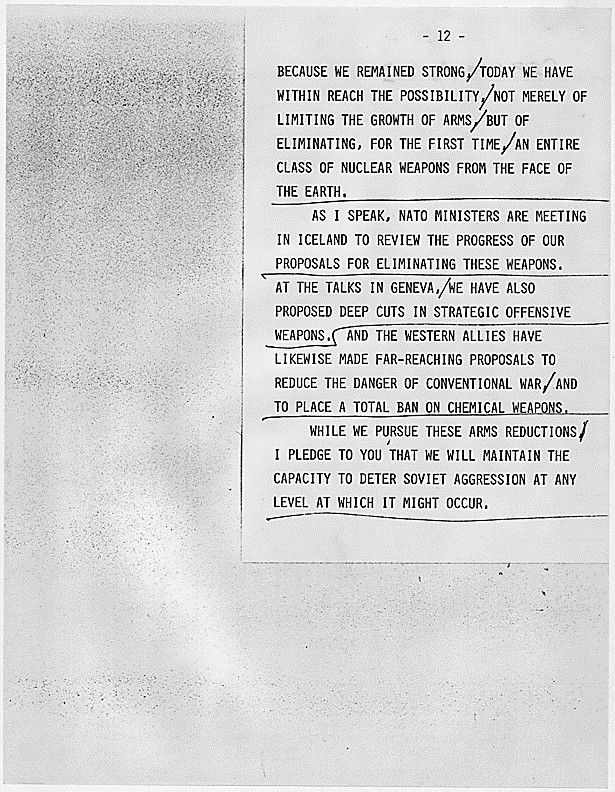
Remarks at Brandenberg Gate, Berlin, Germany [President's Speaking Copy]
Page 13
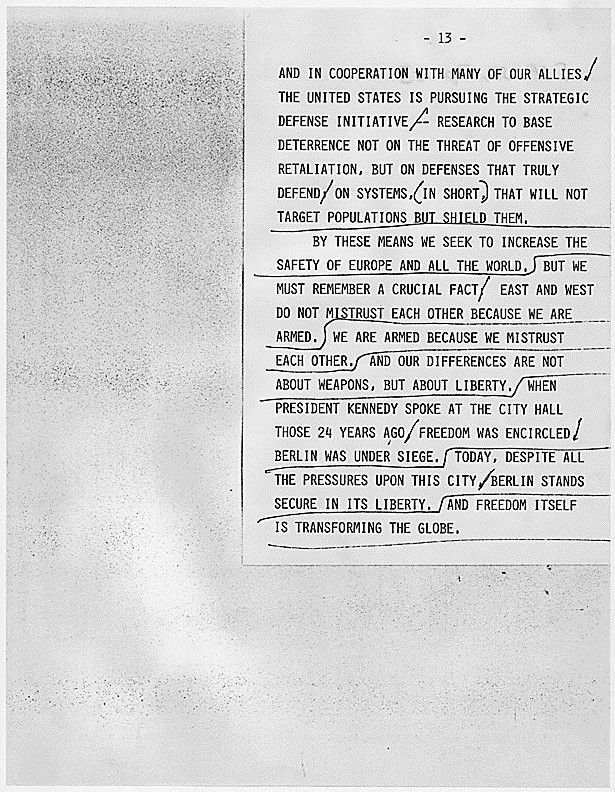
Remarks at Brandenberg Gate, Berlin, Germany [President's Speaking Copy]
Page 14
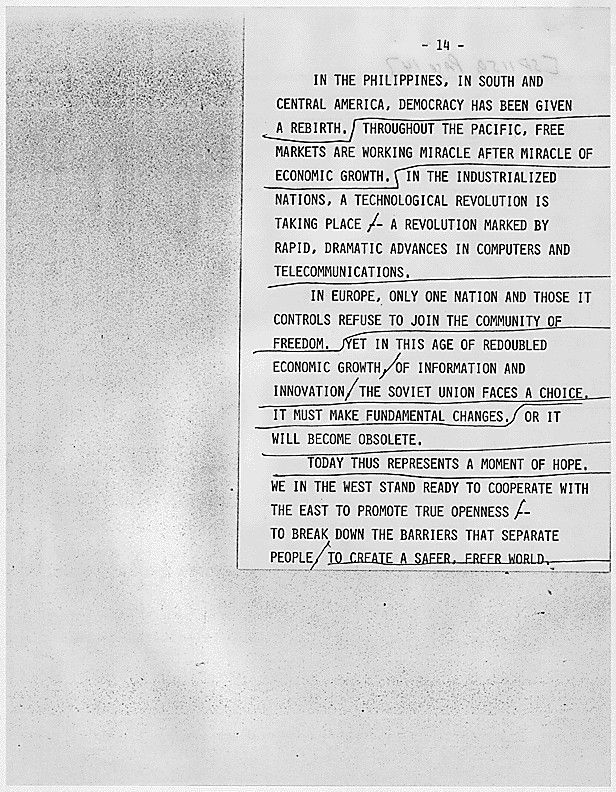
Remarks at Brandenberg Gate, Berlin, Germany [President's Speaking Copy]
Page 15
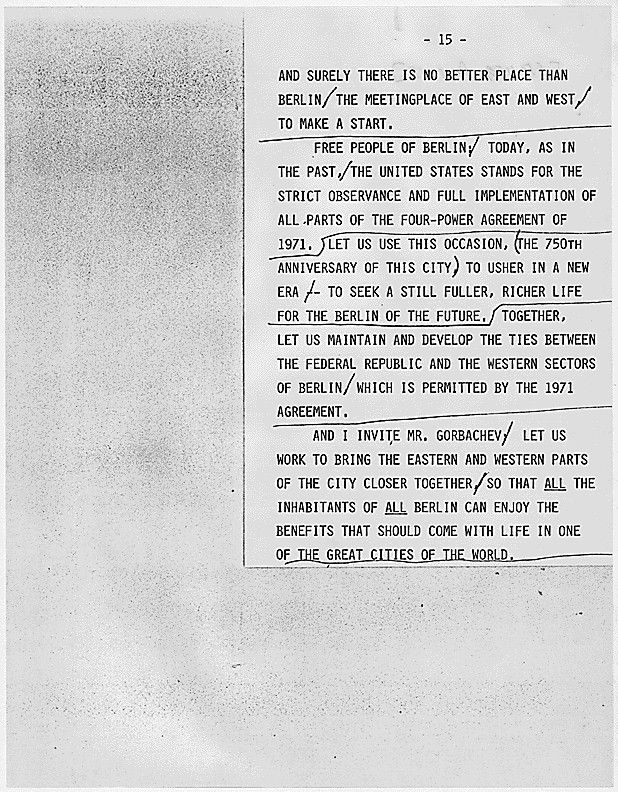
Remarks at Brandenberg Gate, Berlin, Germany [President's Speaking Copy]
Page 16
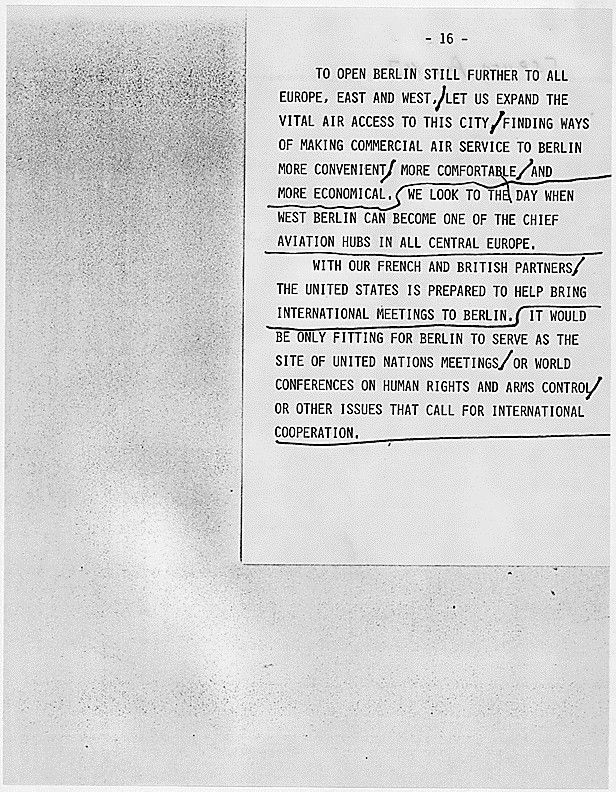
Remarks at Brandenberg Gate, Berlin, Germany [President's Speaking Copy]
Page 17
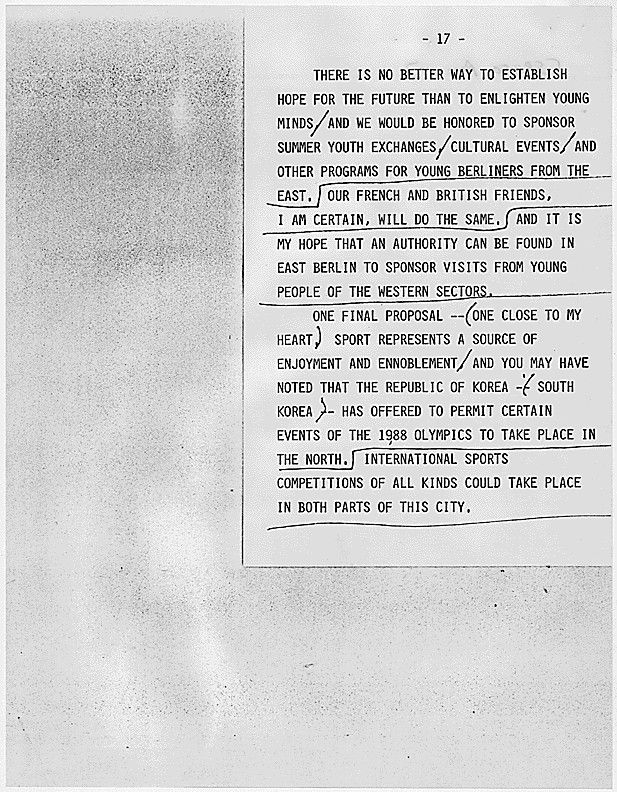
Remarks at Brandenberg Gate, Berlin, Germany [President's Speaking Copy]
Page 18
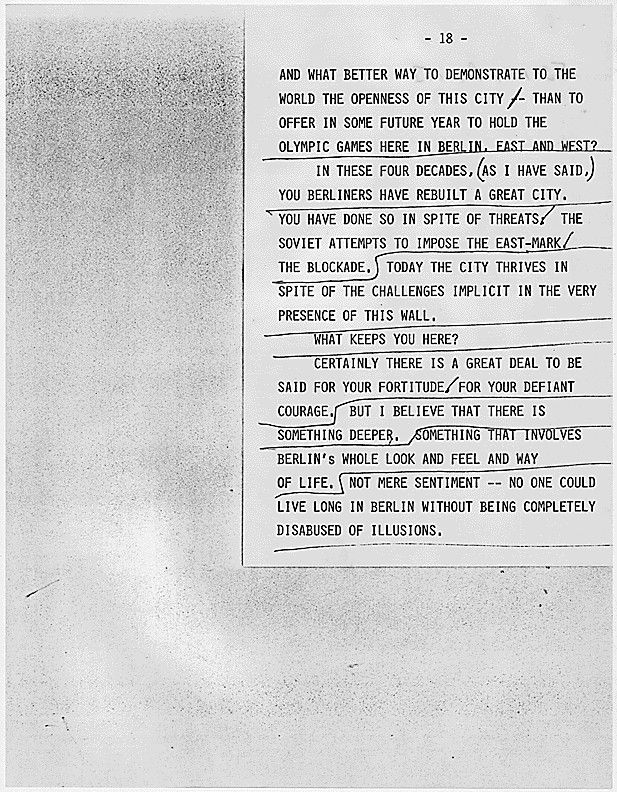
Remarks at Brandenberg Gate, Berlin, Germany [President's Speaking Copy]
Page 19
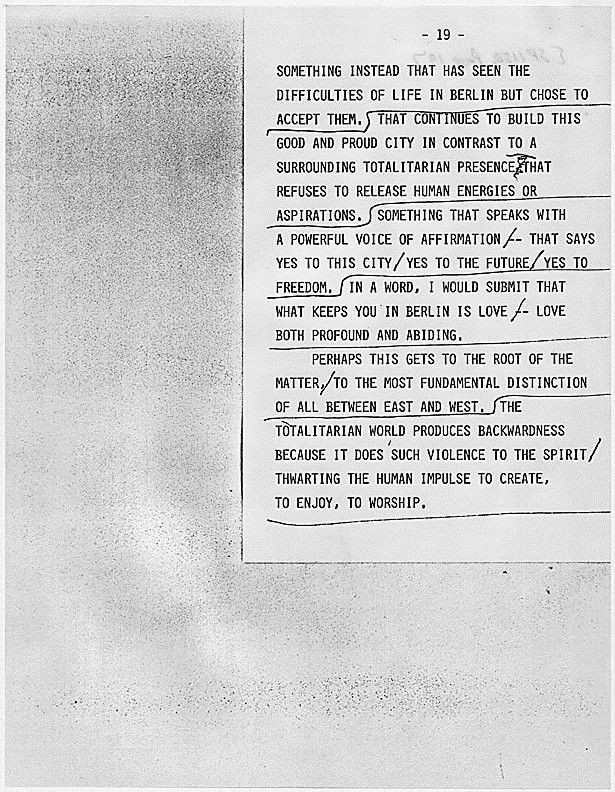
Remarks at Brandenberg Gate, Berlin, Germany [President's Speaking Copy]
Page 20
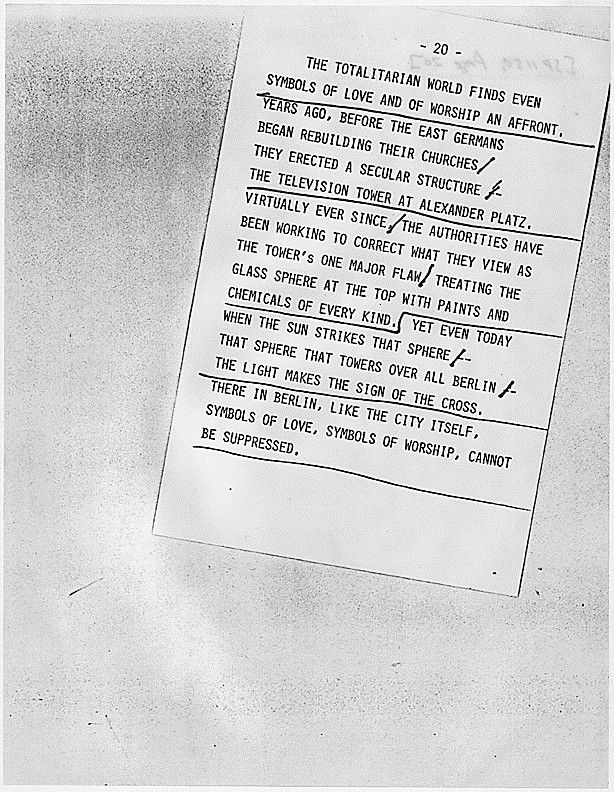
Remarks at Brandenberg Gate, Berlin, Germany [President's Speaking Copy]
Page 21
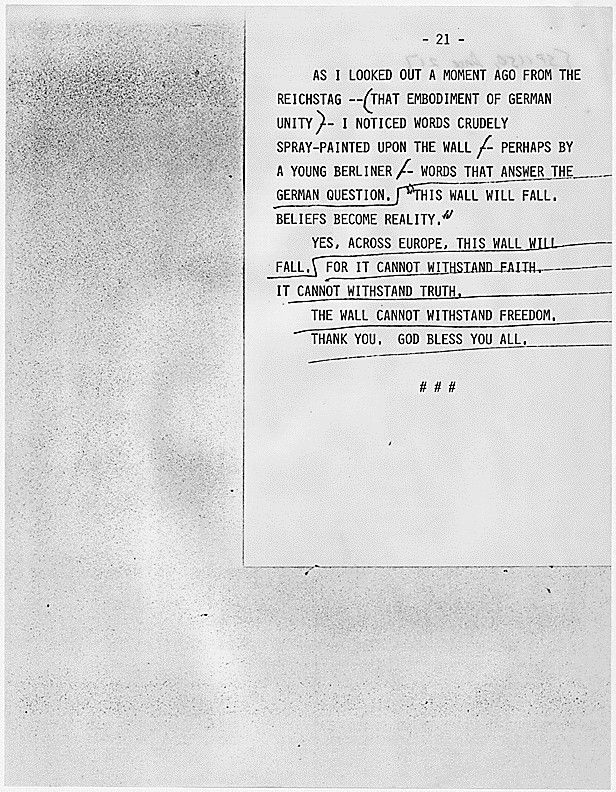
Document
Second Draft of the Address to the Nation on the Gulf War
1/15/1991
On January 16, 1991, President George Bush used national television to announce the commencement of the air campaign to free Kuwait. In this draft of the speech, with changes in the President’s own hand, he lays out the case for war.
This primary source comes from the Collection GB-GBPP:
George H. W. Bush Papers.
National Archives Identifier: 595211
Full Citation: Second Draft of the Address to the Nation on the Gulf War; 1/15/1991; Collection GB-GBPP:
George H. W. Bush Papers, . [Online Version, https://docsteach.org/documents/document/second-draft-of-the-address-to-the-nation-on-the-gulf-war, April 25, 2024]Second Draft of the Address to the Nation on the Gulf War
Page 1
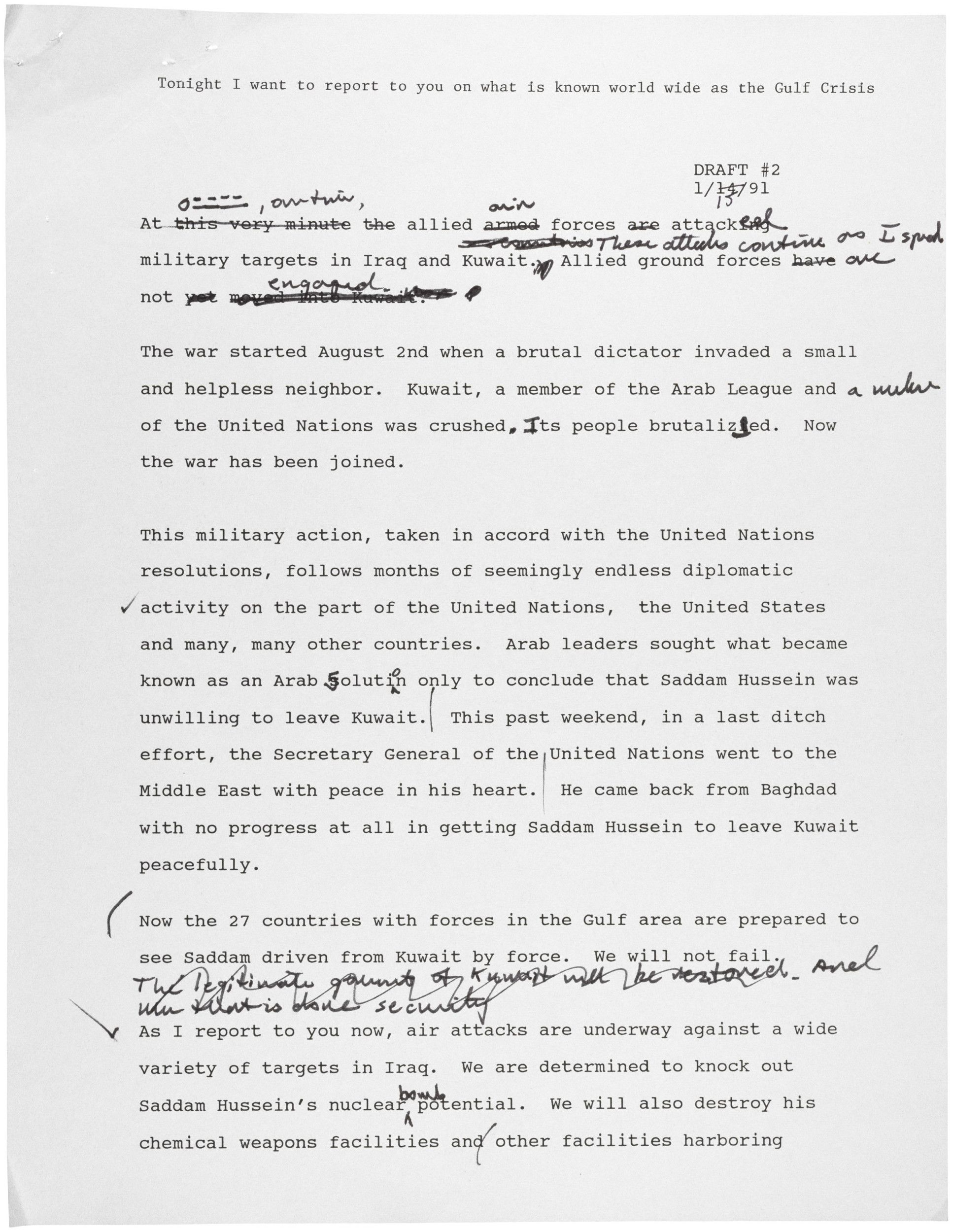
Second Draft of the Address to the Nation on the Gulf War
Page 2
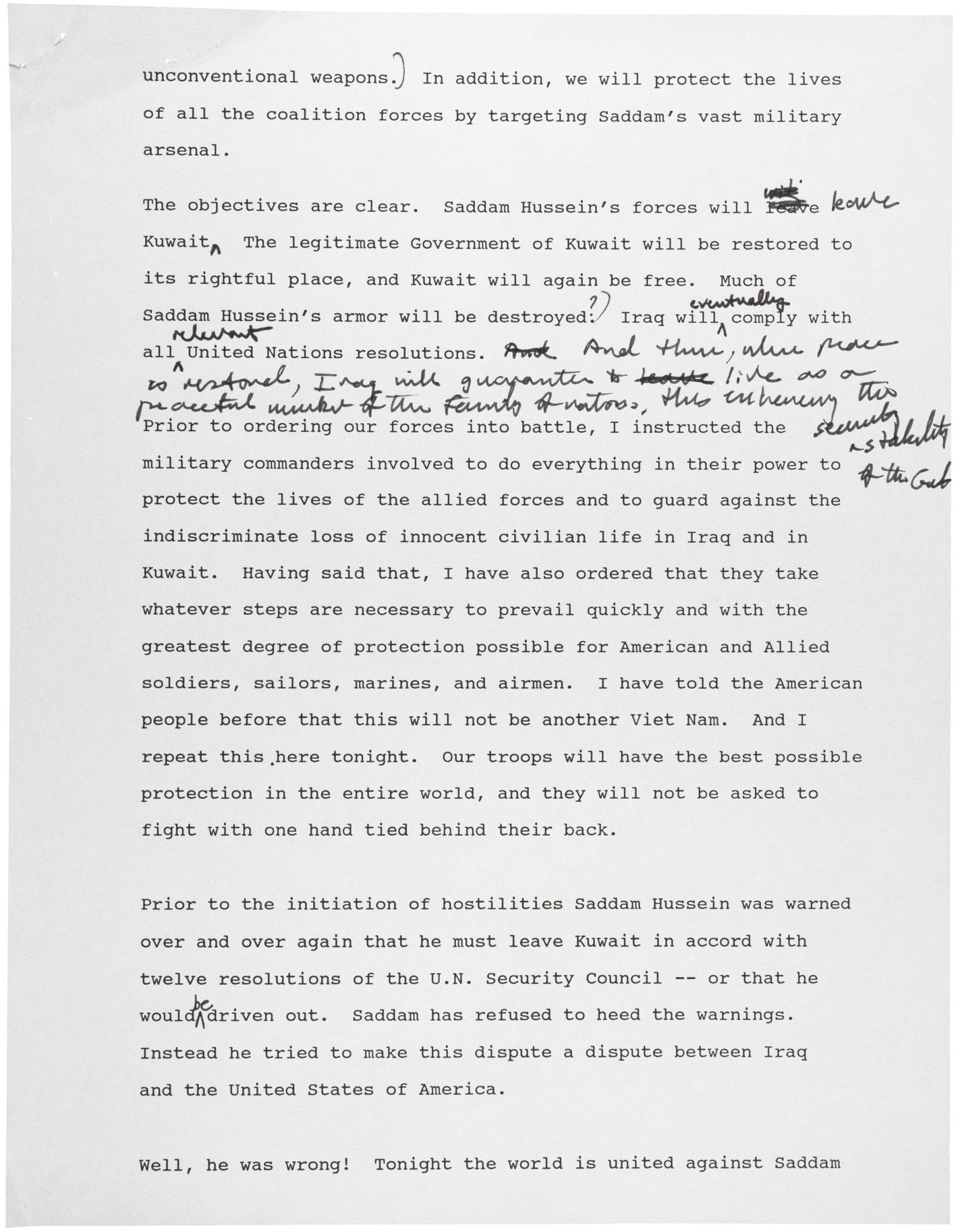
Second Draft of the Address to the Nation on the Gulf War
Page 3
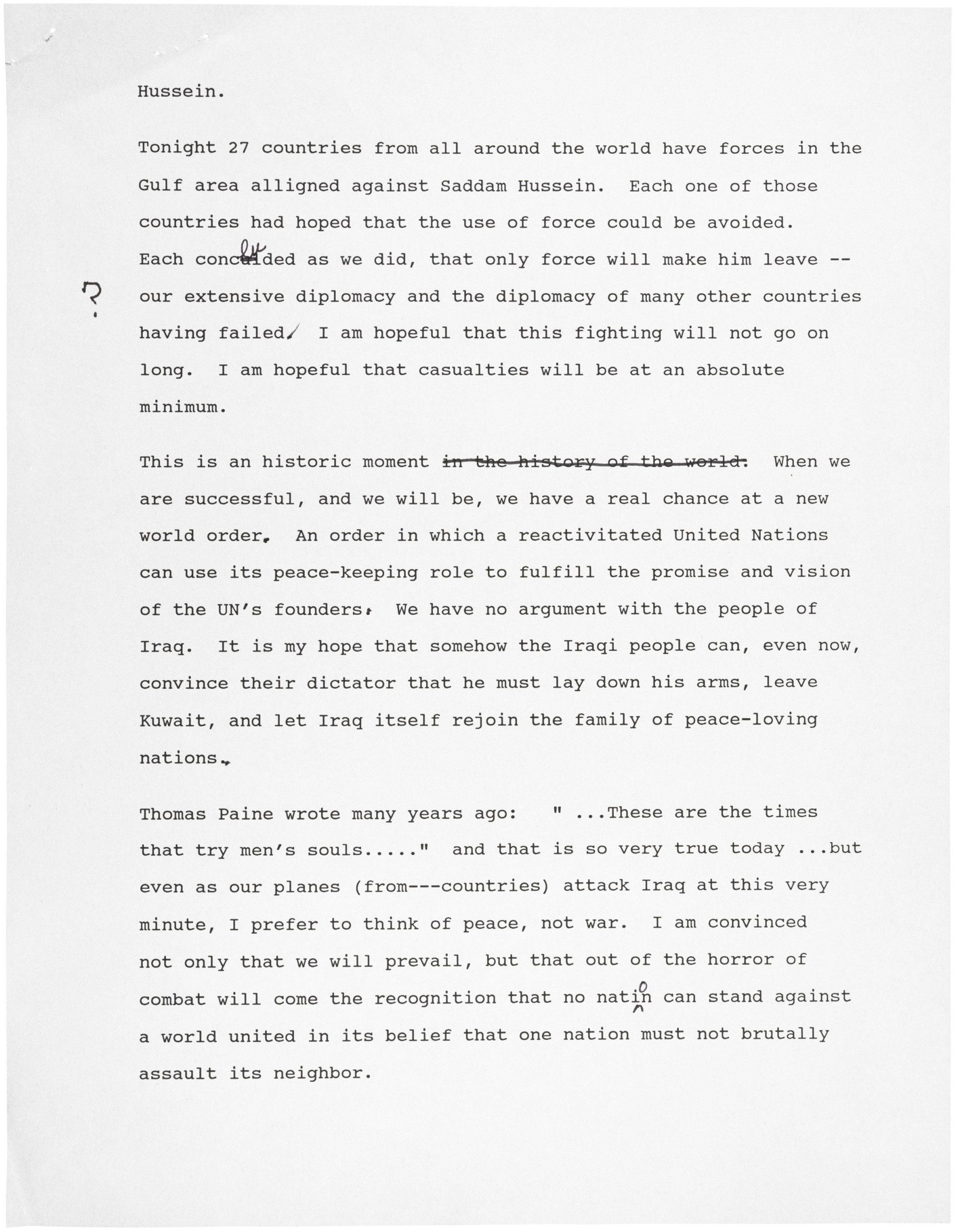
Second Draft of the Address to the Nation on the Gulf War
Page 4
